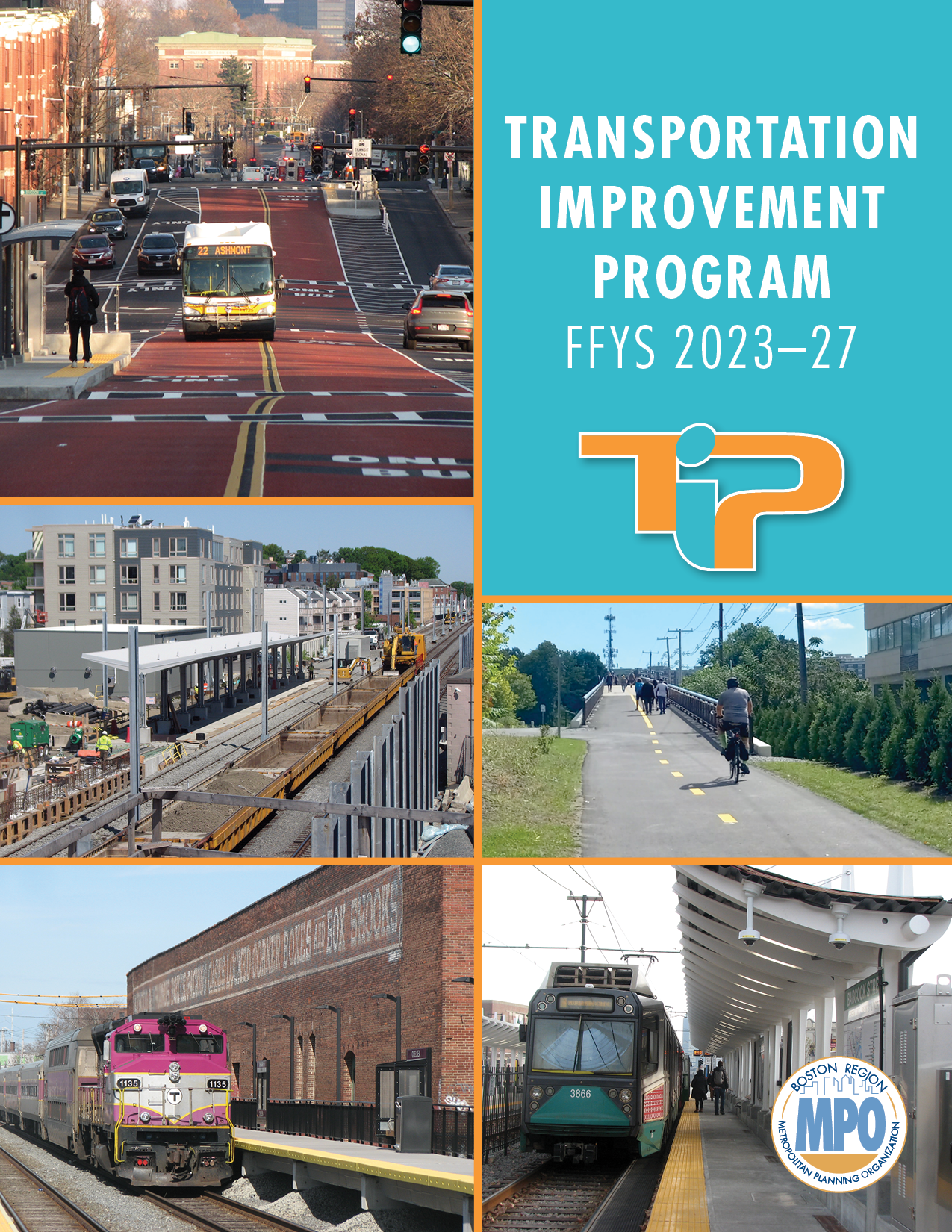

Executive Summary
Chapter 1: 3C Transportation Planning and the Boston Region MPO
Chapter 2: The TIP Process
Chapter 3: Summary of Highway and Transit Programming
Chapter 4: Performance Analysis
Chapter 5: Determination of Air Quality Conformity
Chapter 6: Transportation Equity Performance
Prepared by
The Central Transportation Planning Staff:
Staff to the Boston Region Metropolitan Planning Organization
Directed by the Boston Region Metropolitan Planning Organization,
which is composed of the
Massachusetts Department of Transportation
Metropolitan Area Planning Council
Massachusetts Bay Transportation Authority (MBTA)
MBTA Advisory Board
Massachusetts Port Authority
Regional Transportation Advisory Council
City of Beverly, North Shore Task Force
City of Boston
City of Everett, At-Large City
City of Framingham, MetroWest Regional Collaborative
City of Newton, At-Large City
City of Somerville, Inner Core Committee
Town of Acton, Minuteman Advisory Group on Interlocal Coordination
Town of Arlington, At-Large Town
Town of Brookline, At-Large Town
Town of Burlington, North Suburban Planning Council
Town of Medway, SouthWest Advisory Planning Committee
Town of Norwood, Three Rivers Interlocal Council
Town of Rockland, South Shore Coalition
Federal Highway Administration (nonvoting)
Federal Transit Administration (nonvoting)
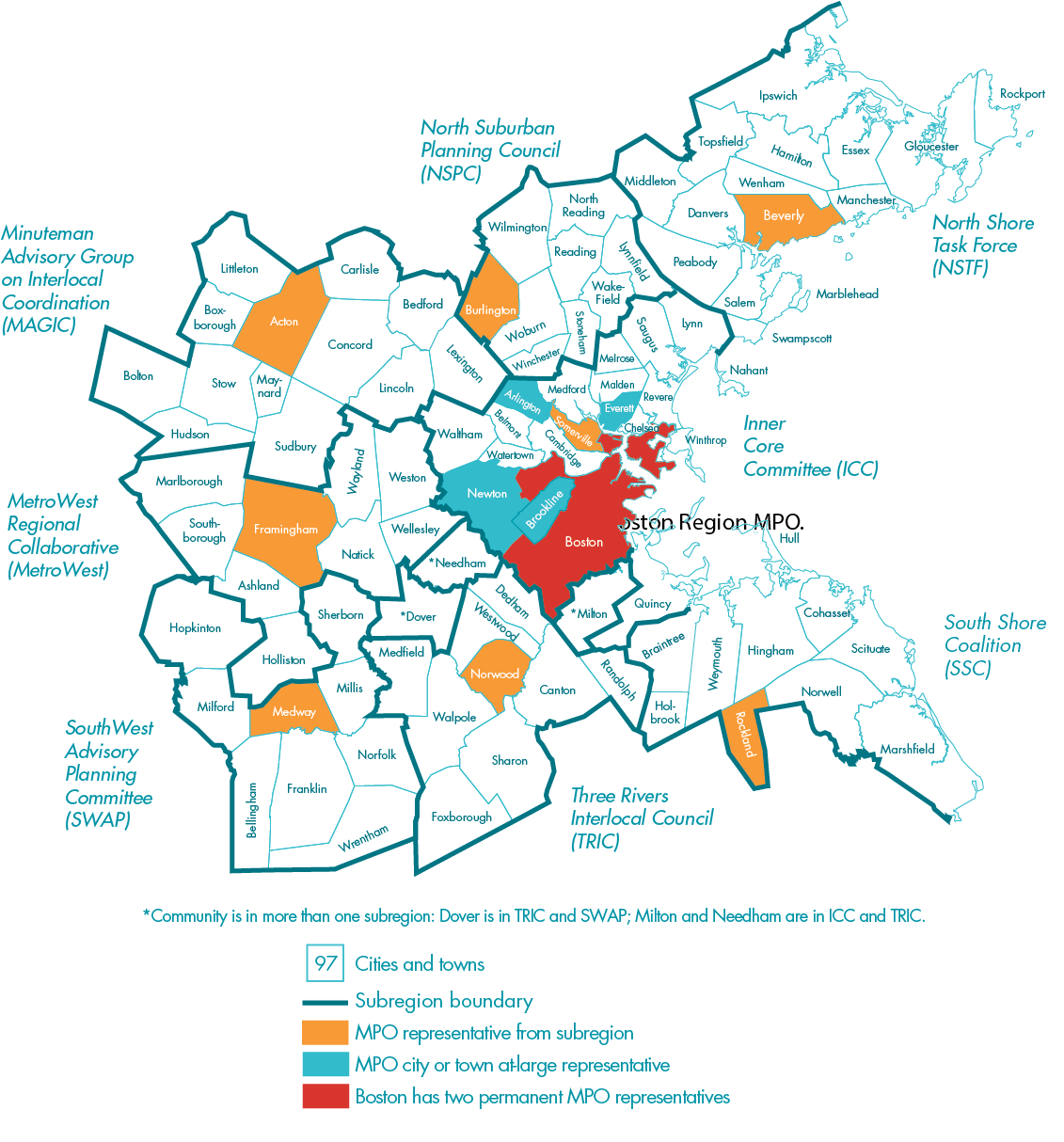
Source: Boston Region MPO.
Meeting locations are accessible to people with disabilities and are near public transportation. Upon request (preferably two weeks in advance of the meeting), every effort will be made to provide accommodations such as assistive listening devices, materials in accessible formats and in languages other than English, and interpreters in American Sign Language and other languages. Please contact the MPO staff at 857.702.3700 (voice), 617.570.9193 (TTY), 617.570.9192 (fax), or eharvey@ctps.org.
The Boston Region Metropolitan Planning Organization (MPO) operates its programs, services, and activities in compliance with federal nondiscrimination laws including Title VI of the Civil Rights Act of 1964 (Title VI), the Civil Rights Restoration Act of 1987, and related statutes and regulations. Title VI prohibits discrimination in federally assisted programs and requires that no person in the United States of America shall, on the grounds of race, color, or national origin (including limited English proficiency), be excluded from participation in, denied the benefits of, or be otherwise subjected to discrimination under any program or activity that receives federal assistance. Related federal nondiscrimination laws administered by the Federal Highway Administration, Federal Transit Administration, or both, prohibit discrimination on the basis of age, sex, and disability. The Boston Region MPO considers these protected populations in its Title VI Programs, consistent with federal interpretation and administration. In addition, the Boston Region MPO provides meaningful access to its programs, services, and activities to individuals with limited English proficiency, in compliance with U.S. Department of Transportation policy and guidance on federal Executive Order 13166.
The Boston Region MPO also complies with the Massachusetts Public Accommodation Law, M.G.L. c 272 sections 92a, 98, 98a, which prohibits making any distinction, discrimination, or restriction in admission to, or treatment in a place of public accommodation based on race, color, religious creed, national origin, sex, sexual orientation, disability, or ancestry. Likewise, the Boston Region MPO complies with the Governor's Executive Order 526, section 4, which requires that all programs, activities, and services provided, performed, licensed, chartered, funded, regulated, or contracted for by the state shall be conducted without unlawful discrimination based on race, color, age, gender, ethnicity, sexual orientation, gender identity or expression, religion, creed, ancestry, national origin, disability, veteran's status (including Vietnam-era veterans), or background.
A complaint form and additional information can be obtained by contacting the MPO or at http://www.bostonmpo.org/mpo_non_discrimination. To request this information in a different language or in an accessible format, please contact
Title VI Specialist
Boston Region MPO
10 Park Plaza, Suite 2150
Boston, MA 02116
civilrights@ctps.org
By telephone:
857.702.3700(voice)
For people with hearing or speaking difficulties, connect through the state MassRelay service:
Relay Using TTY or Hearing Carry-over: 800.439.2370
Relay Using Voice Carry-over: 866.887.6619
Relay Using Text to Speech: 866.645.9870
For more information, including numbers for Spanish speakers, visit https://www.mass.gov/massrelay
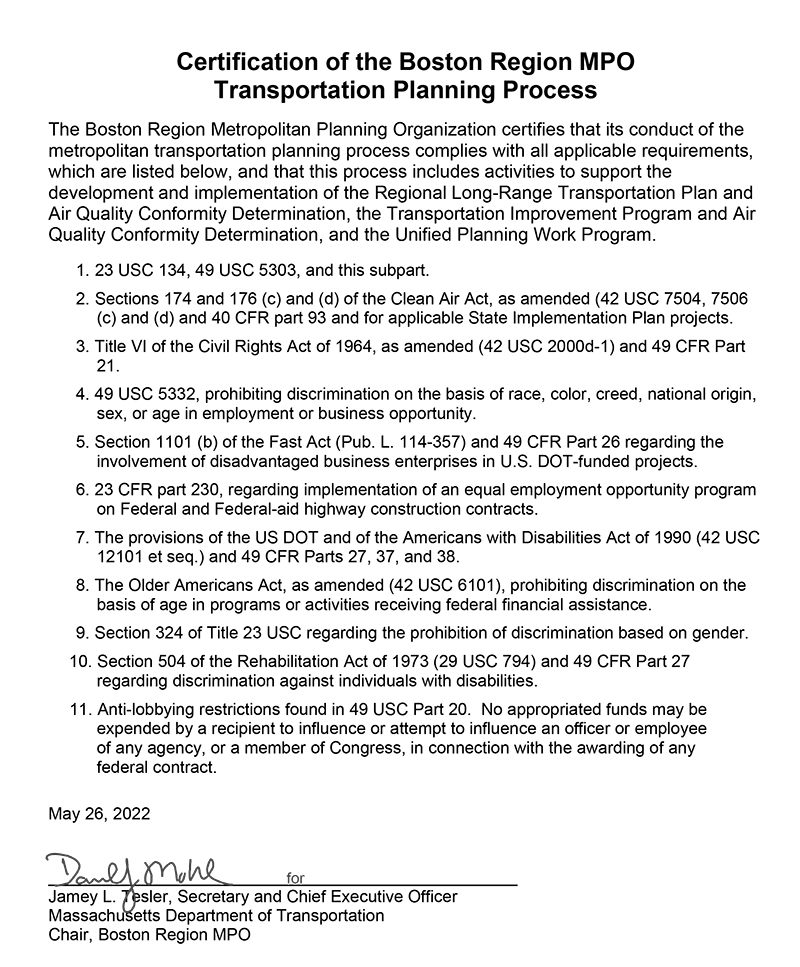
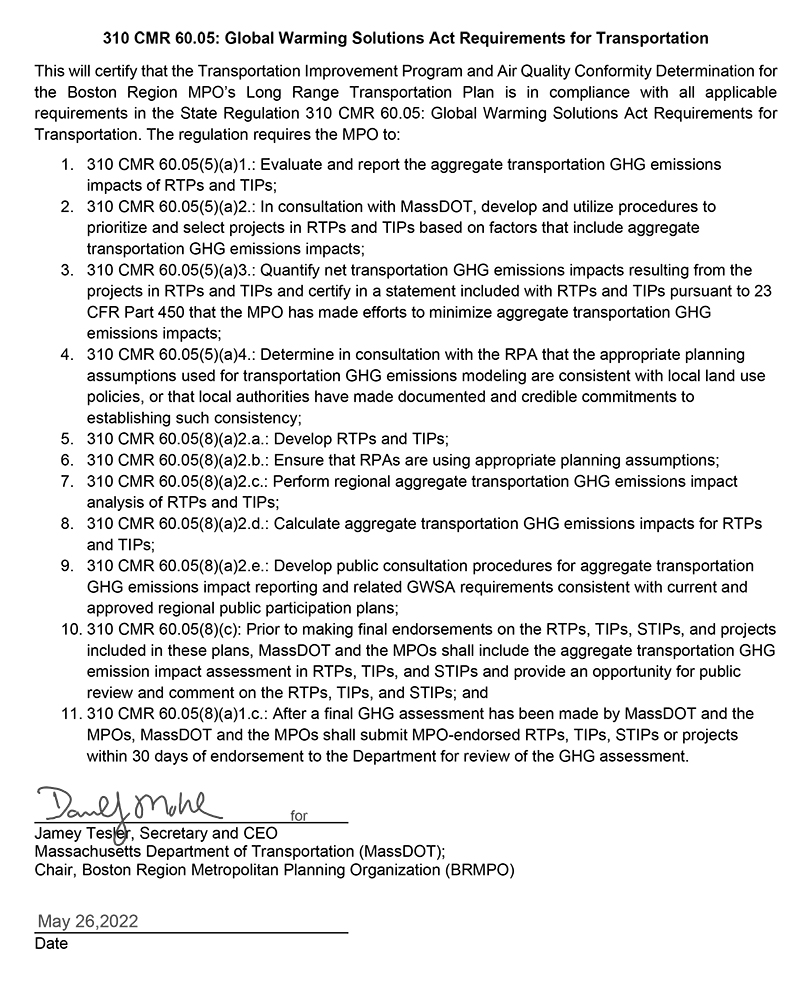
By mail:
Boston Region MPO
Certification Activities Group, Central Transportation Planning Staff
10 Park Plaza, Suite 2150
Boston, MA 02116
By telephone:
857.702.3700 (voice)
For people with hearing or speaking difficulties, connect through the state MassRelay service:
Relay Using TTY or Hearing Carry-over: 800.439.2370
Relay Using Voice Carry-over: 866.887.6619
Relay Using Text to Speech: 866.645.9870
For more information, including numbers for Spanish speakers,
visit https://www.mass.gov/massrelay
By fax:
617.570.9192
By email:
This document was funded in part through grants from the Federal Highway Administration and Federal Transit Administration of the U.S. Department of Transportation. Its contents do not necessarily reflect the official views or policies of the U.S. Department of Transportation.
[Certification Statement]
These pages will list the eleven requirements of the transportation planning process to be conducted by Metropolitan Planning Organizations (MPOs), and certify that the Boston Region MPO complies with these requirements. The certification of the Transportation Planning Process will be signed by the chair of the Boston Rsolution Actegion MPO after the final endorsement of the FFYs 2022–26 TIP.]
[Global Warming Solution Act]These pages will list the eleven requirements of State Regulation 310 CMR 60.05: Global Warming Solutions Act to be conducted by Metropolitan Planning Organizations (MPOs), and certifies that the Boston Region MPO complies with these requirements. The certification of State Regulation 310 CMR 60.05: Global Warming Solutions Act will be signed by the chair of the Boston Region MPO after the final endorsement of the FFYs 2022–26 TIP.
| Abbreviation |
Term |
|---|---|
3C |
continuous, comprehensive, cooperative [metropolitan transportation planning process] |
AAB |
Massachusetts Architectural Access Board |
AADT |
average annual daily traffic |
ABP |
Accelerated Bridge Program [MassDOT program] |
AC |
advance construction |
ACS |
American Community Survey [US Census Bureau data] |
ADA |
Americans with Disabilities Act of 1990 |
AFC |
automated fare collection |
ARPA |
American Rescue Plan Act |
BIL |
Bipartisan Infrastructure Law |
BFP |
Bridge Formula Program [federal funding program] |
BRT |
bus rapid transit |
CA/T |
Central Artery/Tunnel [project also known as “the Big Dig”] |
CAA |
Clean Air Act |
CAAA |
Clean Air Act Amendments |
CARES Act |
Coronavirus Aid, Relief, and Economic Security Act |
CATA |
Cape Ann Transportation Authority |
CECP |
Massachusetts Clean Energy and Climate Plan |
CFR |
Code of Federal Regulations |
CIP |
Capital Investment Plan [MassDOT] |
CMAQ |
Congestion Mitigation and Air Quality [federal funding program] |
CMR |
Code of Massachusetts Regulations |
CMP |
Congestion Management Process |
CNG |
compressed natural gas |
CO |
carbon monoxide |
CO2 |
carbon dioxide |
CPT–HST |
Coordinated Public Transit–Human Services Transportation Plan |
CRRSAA |
Coronavirus Response and Relief Supplemental Appropriations Act |
CTPS |
Central Transportation Planning Staff |
CY |
calendar year |
DCR |
Department of Conservation and Recreation |
DEP |
Department of Environmental Protection [Massachusetts] |
DOD |
United States Department of Defense |
DOT |
department of transportation |
EB |
eastbound |
EDTTT |
excessive delay threshold travel time |
EJ |
environmental justice |
EO |
executive order |
EOEEA |
Massachusetts Executive Office of Energy and Environmental Affairs |
EOHED |
Massachusetts Executive Office of Housing and Economic Development |
EPA |
United States Environmental Protection Agency |
EPDO |
equivalent property damage only [a traffic-related index] |
EV |
electric vehicle |
FARS |
Fatality Analysis and Reporting System [FHWA] |
FAST Act |
Fixing America’s Surface Transportation Act |
FEMA |
Federal Emergency Management Agency |
FFY |
federal fiscal year |
FHWA |
Federal Highway Administration |
FMCB |
MBTA Fiscal and Management Control Board |
FMLA |
Federal Land Management Agency |
FR |
Federal Register |
FTA |
Federal Transit Administration |
GANS |
grant anticipation notes [municipal bond financing] |
GHG |
greenhouse gas |
GWSA |
Global Warming Solutions Act of 2008 [Massachusetts] |
HIP |
Highway Infrastructure Program [federal funding program] |
HOV |
high-occupancy vehicle |
HSIP |
Highway Safety Improvement Program [federal funding program] |
ICC |
Inner Core Committee [MAPC municipal subregion] |
IRI |
International Roughness Index |
ITS |
intelligent transportation systems |
LED |
light-emitting diode |
LEP |
limited English proficiency |
LOTTR |
level of travel time ratio |
LRTP |
Long-Range Transportation Plan [MPO certification document] |
MAGIC |
Minuteman Advisory Group on Interlocal Coordination [MAPC municipal subregion] |
MAP-21 |
Moving Ahead for Progress in the 21st Century Act |
MAPC |
Metropolitan Area Planning Council |
MARPA |
Massachusetts Association of Regional Planning Agencies |
MART |
Montachusett Regional Transit Authority |
MassDOT |
Massachusetts Department of Transportation |
Massport |
Massachusetts Port Authority |
MBTA |
Massachusetts Bay Transportation Authority |
MCRT |
Mass Central Rail Trail |
MOVES |
Motor Vehicle Emissions Simulator [EPA air quality model] |
MPO |
metropolitan planning organization |
MOU |
memorandum of understanding |
MWRC |
MetroWest Regional Collaborative [MAPC municipal subregion] |
MWRTA |
MetroWest Regional Transit Authority |
NAAQS |
National Ambient Air Quality Standards |
NB |
northbound |
NBI |
National Bridge Inventory |
NEVI |
National Electric Vehicle Infrastructure Program [federal funding program] |
NFA |
Non-federal aid |
NGBP |
Next Generation Bridge Program [MassDOT program] |
NH DOT |
New Hampshire Department of Transportation |
NHFP |
National Highway Freight Program [federal funding program] |
NHPP |
National Highway Performance Program [federal funding program] |
NHS |
National Highway System |
NHTSA |
National Highway Traffic Safety Administration |
NMCOG |
Northern Middlesex Council of Governments |
NOx |
nitrogen oxides |
NPMRDS |
National Performance Measure Research Data Set [FHWA] |
NSPC |
North Suburban Planning Council [MAPC municipal subregion] |
NSTF |
North Shore Task Force [MAPC municipal subregion] |
NTD |
National Transit Database |
O&M |
operations and management |
PBPP |
performance-based planning and programming |
PHED |
peak hours of excessive delay |
PL |
metropolitan planning funds [FHWA] or public law funds |
PM |
particulate matter |
PNF |
project need form [MassDOT] |
ppm |
parts per million |
PRC |
Project Review Committee [MassDOT] |
PSAC |
Project Selection Advisory Council [MassDOT] |
PSI |
Pavement Serviceability Index |
PTASP |
Public Transportation Agency Safety Plan |
RITIS |
Regional Integrated Transportation Information System |
RRIF |
Railroad Rehabilitation and Improvement Financing |
RTA |
regional transit authority |
RTAC |
Regional Transportation Advisory Council [of the Boston Region MPO] |
SB |
southbound |
SFY |
state fiscal year |
SHSP |
Strategic Highway Safety Plan |
SIP |
State Implementation Plan |
SMS |
safety management systems |
SOV |
single-occupant vehicle |
SPR |
Statewide Planning and Research |
SRTS |
Safe Routes to School [federal program] |
SSC |
South Shore Coalition [MAPC municipal subregion] |
STRAHNET |
Strategic Highway Network |
STBGP |
Surface Transportation Block Grant Program [federal funding program] |
STIP |
State Transportation Improvement Program |
SWAP |
South West Advisory Planning Committee [MAPC municipal subregion] |
TAM |
Transit Asset Management Plan |
TAMP |
Transportation Asset Management Plan |
TAP |
Transportation Alternatives Program [federal funding program] |
TAZ |
transportation analysis zone |
TBD |
to be determined |
TCM |
transportation control measure |
TE |
transportation equity |
TERM |
Transit Economic Requirements Model [FTA] |
TIFIA |
Transportation Infrastructure and Innovation Act |
TIP |
Transportation Improvement Program [MPO certification document] |
TMA |
transportation management association |
TRIC |
Three Rivers Interlocal Council [MAPC municipal subregion] |
TSP |
transit signal priority |
TTTR |
Truck Travel Time Reliability Index |
ULB |
useful life benchmark |
UPWP |
Unified Planning Work Program [MPO certification document] |
USC |
United States Code |
USDOT |
United States Department of Transportation |
UZA |
urbanized area |
WB |
westbound |
VPI |
virtual public involvement |
VMT |
vehicle-miles traveled |
VOCs |
volatile organic compounds |
VRM |
vehicle revenue-miles |
|
|
|
|
The Boston Region Metropolitan Planning Organization’s (MPO) five-year capital investment plan, the Federal Fiscal Years (FFYs) 2023–27 Transportation Improvement Program (TIP), is the near-term investment program for the region’s transportation system. Guided by the Boston Region MPO’s vision, goals, and objectives, the TIP prioritizes investments that preserve the current transportation system in a state of good repair, provide safe transportation for all modes, enhance livability, promote equity and sustainability, and improve mobility throughout the region. These investments fund arterial roadway and intersection improvements, maintenance and expansion of the public transit system, bicycle path construction, infrastructure improvements for pedestrians, and major highway reconstruction.
The Boston Region MPO is guided by a 22-member board with representatives of state agencies, regional organizations, and municipalities. Its jurisdiction extends roughly from Boston north to Ipswich, south to Marshfield, and west to municipalities along Interstate 495. Each year, the MPO conducts a process to decide how to spend federal transportation funds for capital projects. The Central Transportation Planning Staff (CTPS), which is the staff to the MPO, manages the TIP development process.
MPO staff coordinates the evaluation of project funding requests, proposes programming of current and new projects based on anticipated funding levels, supports the MPO board in developing a draft TIP document, and facilitates a public review of the draft before the MPO board endorses the final document.
The complete TIP program is available in Chapter 3 of this document and online at bostonmpo.org/tip. The TIP tables provide details of how funding is allocated to each programmed project and capital investment program. These tables are organized by federal fiscal year and are grouped by highway and transit programs.
The Highway Program of the TIP funds the priority transportation projects advanced by the Massachusetts Department of Transportation (MassDOT) and the cities and towns within the Boston region. The program is devoted primarily to preserving and modernizing the existing roadway network by reconstructing arterial roadways, resurfacing highways, and replacing bridges.
In Massachusetts, Federal-Aid Highway Program funding is apportioned by MassDOT, which allocates funding to Grant Anticipation Notes (GANs) payments, various statewide programs, and Regional Targets for the state’s MPOs. In the FFYs 2023–27 TIP, roadway, bridge, and bicycle and pedestrian programs account for more than $2.5 billion in funding to the Boston region. The Regional Target funding provided to the MPOs may be programmed for projects at the discretion of each MPO, whereas MassDOT has discretion to propose its recommended projects for statewide programs, such as those related to bridge repairs and interstate highway maintenance.
The Transit Program of the TIP provides funding for projects and programs that address the capital needs prioritized by the three transit authorities in the region: the Massachusetts Bay Transportation Authority (MBTA), the Cape Ann Transportation Authority (CATA), and the MetroWest Regional Transit Authority (MWRTA). The Transit Program is predominantly dedicated to achieving and maintaining a state of good repair for all assets throughout the transit system.
The FFYs 2023–27 TIP includes nearly $4 billion in transit investments by the transit authorities that will support state of good repair, modernize transit systems, and increase access to transit. Additionally, beginning in FFY 2025, the MPO will allocate five percent of its annual Regional Target funds to its new Transit Modernization investment program. This program aims to build on the investments made through the Transit Program by using a portion of Highway Program funding to fulfill unmet transit project needs in the region. The MPO has already begun to fund discrete projects through this program prior to FFY 2025 based on a surplus of available funding in FFYs 2023 and 2024, as detailed below.
During FFYs 2023–27, the Boston Region MPO plans to fund 51 projects with its Regional Target funding. In total, 23 new projects were added to the MPO’s Regional Target program during this TIP cycle. Details on these projects are available in table ES-1.
Table ES-1
New Regional Target Projects Funded in the FFYs 2023–27 TIP
Project Name |
Municipality (Proponent) |
MPO Investment Program |
FFYs of Funding |
Regional Target Dollars Programmed in FFYs 2023–27 |
|
Lynn Station Improvements Phase II |
Lynn (MBTA) |
Transit Modernization |
2023–24 |
$48,100,000 |
|
Rehabilitation of Washington Street |
Brookline |
Complete Streets |
2027 |
$30,030,812 |
|
Bridge Rehabilitation, Commonwealth Avenue (Route 30) over the Charles River |
Newton and Weston (MassDOT) |
Complete Streets |
2024 |
$22,725,820 |
|
Community Path, Belmont Component of the MCRT (Phase 1) |
Belmont |
Bicycle and Pedestrian |
2026 |
$21,034,382 |
|
McGrath Boulevard Construction* |
Somerville (MassDOT) |
Major Infrastructure |
2027 |
$20,000,000 |
|
Reconstruction on Route 30 |
Weston |
Complete Streets |
2026 |
$17,028,272 |
|
Reconstruction of Western Avenue* |
Lynn |
Complete Streets |
2027 |
$15,000,000 |
|
Boston Street Improvements |
Salem |
Complete Streets |
2026 |
$13,977,600 |
|
Park and Pearl Street Reconstruction |
Chelsea |
Complete Streets |
2027 |
$12,123,769 |
|
Rail Trail Construction |
Swampscott |
Bicycle and Pedestrian |
2027 |
$8,932,000 |
|
Forest Hills Station Improvement Project** |
Boston (MBTA) |
Transit Modernization |
2024 |
$6,400,000 |
|
Intersection Improvements at Boston Post Road (Route 20) at Wellesley Street |
Weston |
Intersection Improvements |
2026 |
$2,681,330 |
|
Montachusett RTA Microtransit Service |
Bolton, Boxborough, Littleton, and Stow (MART) |
Community Connections |
2023–25 |
$1,316,061 |
|
Pleasant Street Shuttle Service Expansion |
Watertown |
Community Connections |
2023–25 |
$1,002,198 |
|
NewMo Microtransit Service Expansion |
Newton |
Community Connections |
2023–25 |
$890,574 |
|
CATA On Demand Microtransit Service Expansion |
Gloucester and Rockport (CATA) |
Community Connections |
2023–25 |
$813,291 |
|
Stoneham Shuttle Service |
Stoneham |
Community Connections |
2023–25 |
$796,817 |
|
CatchConnect Microtransit Service Expansion |
Hudson and Marlborough (MWRTA) |
Community Connections |
2023–25 |
$450,163 |
|
Bluebikes Station Replacement and System Expansion |
Cambridge |
Community Connections |
2023 |
$349,608 |
|
Bluebikes System Expansion |
Malden and Medford |
Community Connections |
2023 |
$145,821 |
|
Bluebikes System Expansion |
Salem |
Community Connections |
2023 |
$119,629 |
|
Bicycle Parking along the Bruce Freeman Rail Trail |
Acton |
Community Connections |
2023 |
$8,017 |
|
Chenery Middle School Bicycle Parking |
Belmont |
Community Connections |
2023 |
$4,376 |
|
Total |
N/A |
N/A |
N/A |
$223,930,540 |
|
Note: Funding amounts in this table include both federal and non-federal funds, including matching funds.
*Funding in this table represents the first year of funding, with additional funding anticipated to be allocated to these projects by the Boston Region MPO in future fiscal years.
**Funding in this table represents partial funding. Additional funding sources will be identified for the Forest Hills Station Improvement Project in future fiscal years. The total project cost is $68,000,000.
CATA = Cape Ann Transportation Authority. FFY = federal fiscal year. MART = Montachusett Area Regional Transit. MCRT = Mass Central Rail Trail. MWRTA = MetroWest Regional Transit Authority. N/A = not applicable. RTA = regional transit authority.
Source: Boston Region MPO.
The event that drove the development of the FFYs 2023–27 TIP was the signing of the Bipartisan Infrastructure Law (BIL), on November 15, 2021. The BIL is the new five-year federal funding authorization for transportation projects and programs, replacing the Fixing America’s Surface Transportation Act as the primary governing legislation for the TIP process. The BIL increased the amount of Regional Target funding available to the Boston Region MPO for the development of the FFYs 2023–27 TIP by approximately 20 percent from the funding levels in the FFYs 2022–26 TIP. These additional funds allowed the MPO to program a significantly greater number of new projects in this TIP cycle (23) than in the FFYs 2022–26 TIP cycle (10) or the FFYs 2021–25 TIP cycle (8).
As in most years, the majority of the funding available for allocation by the MPO during the FFYs 2023–27 TIP cycle was in the fifth and final year of the TIP, FFY 2027. Unlike in most years, however, the addition of approximately $20 million in new BIL funding annually beginning in FFY 2023 created new funding surpluses in the early federal fiscal years of the TIP (FFYs 2023 and 2024). These surpluses were compounded by programming delays for two projects already funded by the MPO (project #606453—Improvements on Boylston Street and project #606226—Reconstruction of Rutherford Avenue, both in Boston). Together, these dynamics led to a funding surplus in excess of $90 million in FFYs 2023 and 2024.
The MPO did not have any currently funded Regional Target projects that could be accelerated to make use of these funds, so the MPO worked with MassDOT and the MBTA to identify projects that could be funded in these fiscal years. Jointly, MassDOT and the MBTA brought more than a dozen projects to the MPO for consideration, from which the MPO selected three projects for funding in FFYs 2023 and 2024:
These projects were not formally evaluated using the MPO’s project selection criteria prior to the MPO making draft funding decisions, as MPO staff did not have sufficient time to score the projects prior to the deadline for MPO decision-making. Despite not being scored, the projects generally align well with many of the MPO’s goals, including enhancing bicycle and pedestrian safety and access, and maintaining a state of good repair for the region’s transit system and critical roadways. Scoring information will be included for these projects when it is available.
Several other key decisions were made by the MPO in the drafting of the FFYs 2023–27 Regional Target Program, including the following:
Figure ES-1 shows how the Regional Target funding for FFYs 2023–27 is distributed across the MPO’s investment programs. As the chart shows, the Boston Region MPO’s Regional Target Program is devoted primarily to enhancing mobility and safety for all travel modes through significant investments in Complete Streets projects. A large portion of the MPO’s funding also supports the modernization of key regional roadways and transit infrastructure through investments in Major Infrastructure and Transit Modernization projects. The MPO also elected to leave approximately $23 million unprogrammed, preferring to retain these funds for use in future TIP cycles in support of a more flexible overall program in the coming fiscal years.
Figure ES-1
FFYs 2023–27 TIP Regional Target Funding by MPO Investment Program
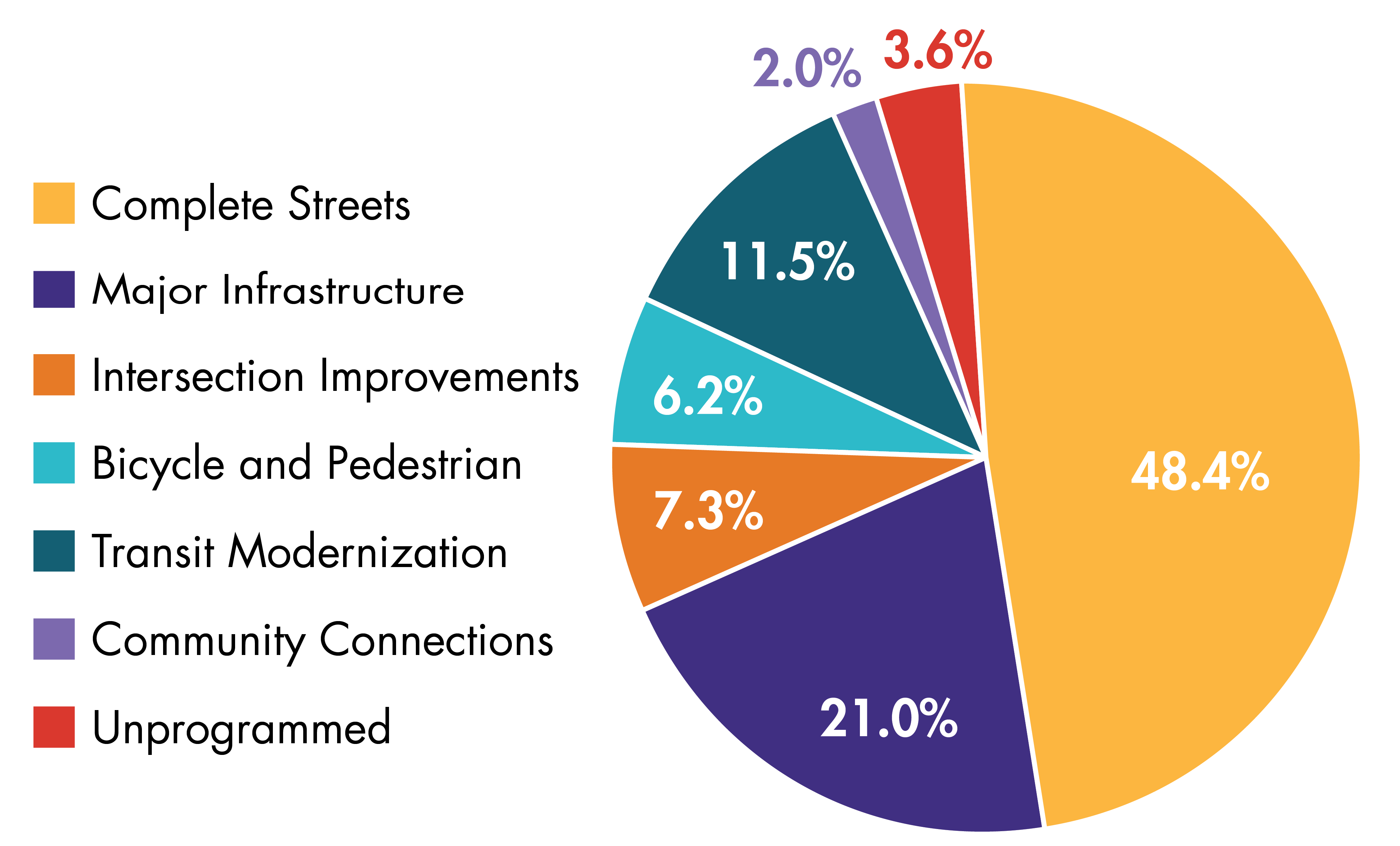
FFY = federal fiscal year. MPO = metropolitan planning organization. TIP = Transportation Improvement Program.
Source: Boston Region MPO.
In addition to the distribution of funding across the MPO’s investment programs listed above, Table ES-2 further details the number of projects and the allocation of funds across each program in the FFYs 2023–27 TIP. As noted in Figure ES-1, the MPO has programmed more than 95 percent of its available funding over five years. More details about every project funded through the MPO’s Regional Target program are available in Chapter 3.
Table ES-2
FFYs 2023–27 Boston Region MPO Regional Target Investment Summary
MPO Investment Program |
Number of Projects |
Regional Target Dollars Programmed |
Bicycle Network and Pedestrian Connections |
4 |
$40,222,704 |
Community Connections (allocated to projects) |
13 |
$6,374,274 |
Community Connections (not yet allocated to projects) |
N/A |
$6,716,799 |
Complete Streets* |
22 |
$312,527,546 |
Intersection Improvements |
7 |
$47,175,058 |
Major Infrastructure—Roadway |
3 |
$135,371,843 |
Transit Modernization (allocated to projects) |
2 |
$54,500,000 |
Transit Modernization (not yet allocated to projects) |
N/A |
$19,500,000 |
Unprogrammed |
N/A |
$22,967,614 |
Total |
51 |
$645,355,838 |
Note: Funding amounts in this table include both federal and non-federal funds, including matching funds.
*One MPO-funded Complete Streets project (608348—Bridge Street) is partially funded through MassDOT’s Earmark Discretionary Program.
FFY = federal fiscal year. MPO = metropolitan planning organization. N/A = not applicable.
Source: Boston Region MPO.
When making decisions about which projects to fund, the MPO considers not only the relative distribution of funds across projects and investment programs, but also how the allocation of funds to each investment program compares to the funding goals outlined in the MPO’s Long-Range Transportation Plan (LRTP), Destination 2040. The investment program sizes set forth in the LRTP reflect the types of projects the MPO seeks to fund to help it achieve its goals and objectives for the region, from enhancing safety for all users to promoting mobility and accessibility across the region. More information on the MPO’s goals and objectives are available in Chapter 1, and a comparison between LRTP investment program sizes and program funding levels in the FFYs 2023–27 TIP is shown in Figure ES-2.
Figure ES-2
FFYs 2023–27 TIP: Regional Target Funding Levels Relative to LRTP Investment Program Goals
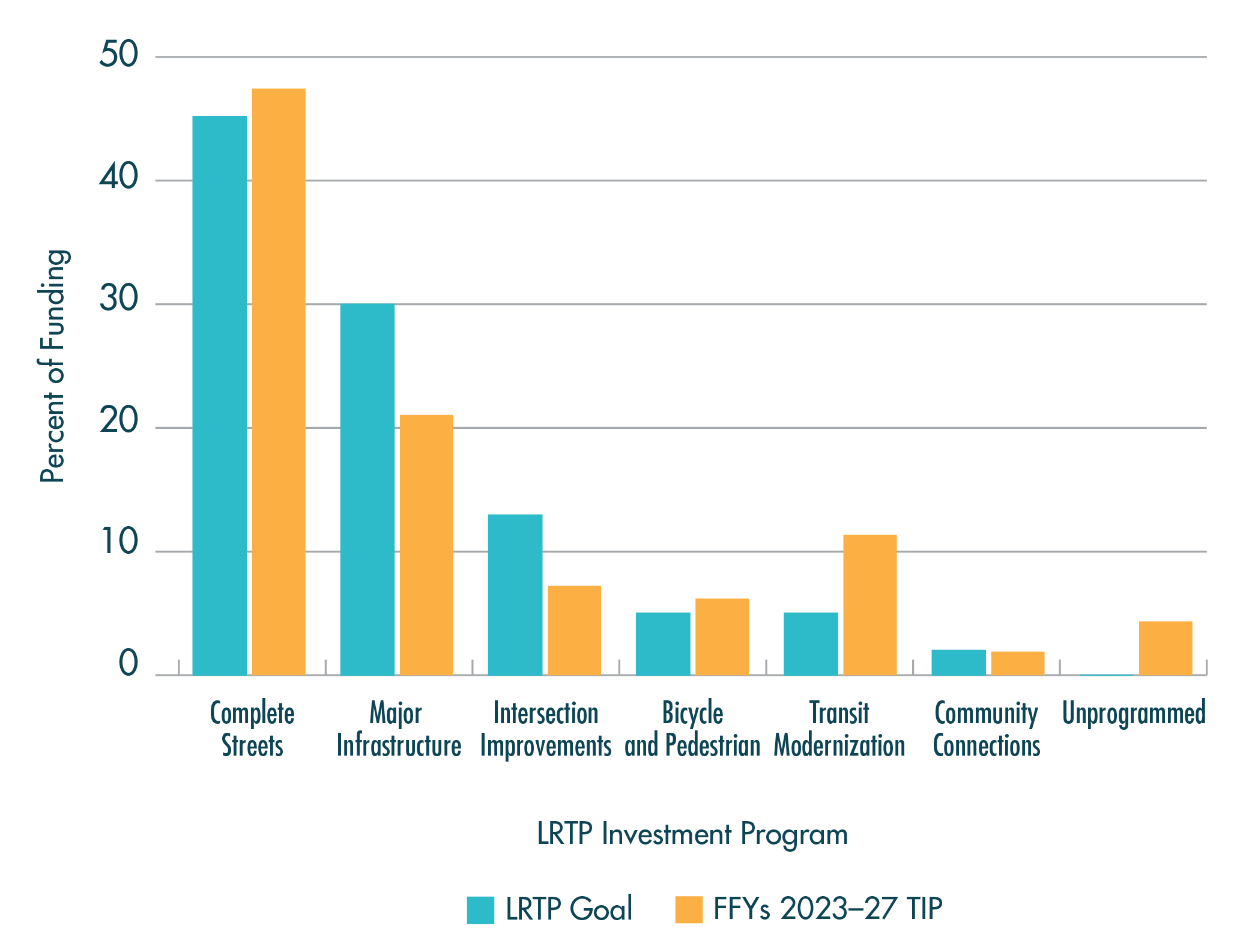
FFY = federal fiscal year. LRTP = Long-Range Transportation Plan. TIP = Transportation Improvement Program.
Source: Boston Region MPO.
The investments made in the FFYs 2023–27 TIP will be implemented in 47 cities and towns throughout the Boston region, ranging from dense inner core communities to developing suburbs further from the urban center. Figure ES-3 illustrates the distribution of Regional Target funding among the eight subregions within the Boston Region MPO’s jurisdiction, as defined by the Metropolitan Area Planning Council (MAPC). This figure also includes information about how the distribution of funds compares to key metrics for measuring the need for funding by subregion, including the percent of regional population, employment, and Federal-Aid roadway miles within each subregion.
Figure ES-3
FFYs 2023–27 TIP: Regional Target Funding Levels Relative to Key Indicators
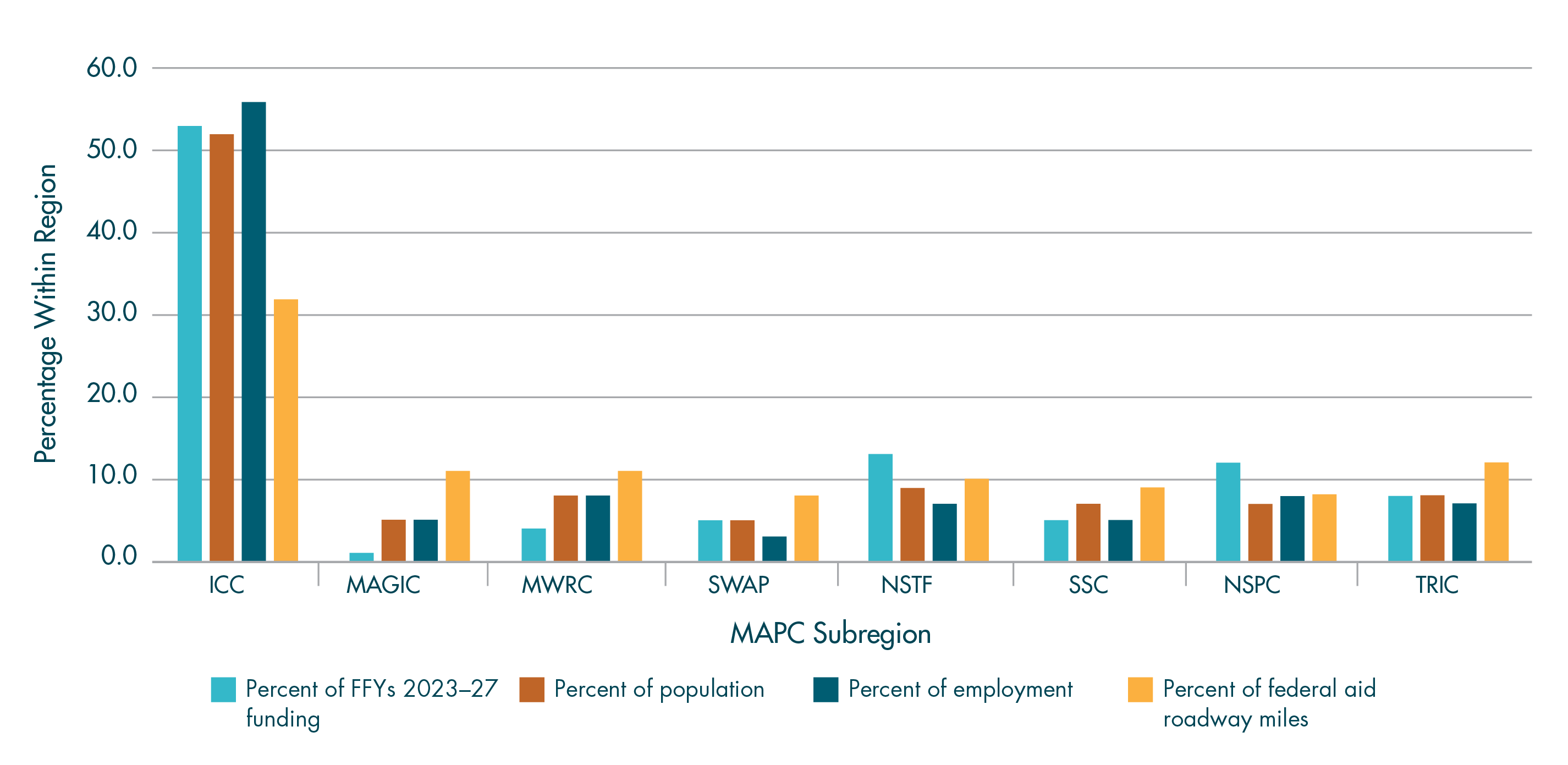
Note: Unprogrammed funds and funds held for the MPO’s Transit Modernization and Community Connections Programs are not included in this figure.
FFY = federal fiscal year. MAGIC = Minuteman Advisory Group on Interlocal Coordination. MAPC = Metropolitan Area Planning Council. MetroWest = MetroWest Regional Collaborative. NSPC = North Suburban Planning Council. NSTF = North Shore Task Force. SSC = South Shore Coalition. SWAP = South West Advisory Committee. TIP = Transportation Improvement Program. TRIC = Three Rivers Interlocal Council.
Source: Boston Region MPO.
Additional information on the geographic distribution of Regional Target funding across the region, including a breakdown of funding by municipality, is included in Appendix D.
The TIP Highway Program was developed with the assumption that federal funding for the state would range between $789 million and $850 million annually over the next five years. These amounts include the funds that would be set aside initially by MassDOT as payments for the Accelerated Bridge Program and exclude required matching funds. The funding levels for the FFYs 2023–27 TIP’s Highway Program represent an increase of approximately 18 percent over those in the FFYs 2022–26 TIP. This is a direct result of the broad increase in federal formula funding resulting from the passage of the BIL in November 2021.
The process of deciding how to use this federal funding in the Boston region follows several steps. First, MassDOT reserves funding for GANs debt service payments for the Accelerated Bridge Program; annual GANs payments range between $89 million and $134 million annually over the five years of this TIP.
The remaining Federal-Aid Highway Program funds are budgeted to support state and regional (i.e., MPO) priorities. In the FFYs 2023–27 TIP, $870 million to $895 million annually was available for programming statewide, including both federal dollars and the local match. MassDOT customarily provides the local match (which can also be provided by other entities); thus, projects are typically funded with 80 percent federal dollars and 20 percent state dollars, depending on the funding program. Costs for project design are borne by the proponent of the project.
Next, MassDOT allocates funding across the following funding categories:
Finally, once these needs have been satisfied, MassDOT allocates the remaining funding among the state’s 13 MPOs for programming. This discretionary funding for MPOs is sub-allocated by formula to determine the Regional Target amounts. The Boston Region MPO receives the largest portion of MPO funding in the state, with approximately 43 percent of Massachusetts’ Regional Target funds allocated to the region. MassDOT develops these targets in consultation with the Massachusetts Association of Regional Planning Agencies (MARPA). This TIP was programmed with the assumption that the Boston Region MPO will have between $129 million and $132 million annually for Regional Target amounts, which consist of federal funding and state funding for the local match.
Each MPO may decide how to prioritize its Regional Target funding. Given that the Regional Target funding is a subset of the Highway Program, the MPO typically programs the majority of funding for roadway projects; however, the MPO has flexed portions of its highway funding to the Transit Program for transit expansion projects and through its Transit Modernization and Community Connections Programs. The TIP Highway Program details the projects that will receive Regional Target funding from the Boston Region MPO and statewide infrastructure projects within the Boston region. Details on these investments are outlined in Chapter 3.
The Federal Transit Administration (FTA) allocates the funds programmed in the TIP Transit Program according to formula. The three regional transit authorities in the Boston Region MPO area that are recipients of these funds are the MBTA, CATA, and MWRTA. The MBTA, with its extensive transit program and infrastructure, is the recipient of the preponderance of the region’s federal transit funds.
As the current federal transportation legislation, the BIL allocates funding to transit projects through the following formula programs:
When determining which projects to fund through the Regional Target funding process, MPO members collaborate with municipalities, state agencies, members of the public, advocacy groups, and other stakeholders. The MPO board uses evaluation criteria in its project selection process to help identify and prioritize projects that advance progress on the MPO’s six goal areas:
Additionally, the MPO has established investment programs, which are designed to direct Regional Target funding towards MPO priority areas over the next 20 years, to help meet these goals. The investment programs are as follows:
Projects that the MPO selects to receive Regional Target funding through the TIP development process are included in one of the six investment programs listed above. More information on the MPO’s investment programs is available in Chapter 2.
In recent years, the MPO has been incorporating performance-based planning and programming (PBPP) practices into its TIP development and other processes. These practices are designed to help direct MPO funds towards achieving specific outcomes for the transportation system. The MPO’s goals and investment programs are key components of its PBPP framework. In FFY 2018, the MPO began to set targets for specific performance measures. Over time, the MPO will more closely link its performance targets, investment decisions, and monitoring and evaluation activities. More information on PBPP is available in Chapter 4 as well as in Appendix A (Table A-2).
The outreach process begins early in the federal fiscal year, when cities and towns designate TIP contacts and begin developing a list of priority projects to be considered for federal funding, and the MPO staff asks the staffs of cities and towns in the region to identify their priority projects. MPO staff compiles the project funding requests into a Universe of Projects, a list of all Bicycle Network and Pedestrian Connections, Complete Streets, Intersection Improvements, and Major Infrastructure projects identified as potential candidates to receive funding through the TIP. Projects seeking funding through the MPO’s Community Connections Program are not included in the Universe, as all projects that apply for this program’s discrete application process are considered for funding. The MPO does not currently list Transit Modernization projects in the Universe, as the project intake process for this program is currently being developed. The Universe includes projects at varying levels of readiness, from those with significant engineering and design work complete to those still early in the conceptual or planning stage. MPO staff collects data on each project in the Universe so that the projects may be evaluated.
MPO staff evaluates projects based on how well they address the MPO’s goals. For MPO staff to conduct a complete project evaluation, Bicycle Network and Pedestrian Connections, Complete Streets, Intersection Improvements, and Major Infrastructure projects must have a functional design report or the project plans must include the level of detail defined in a functional design report, a threshold typically reached when a project nears the 25 percent design stage. To complete an evaluation for projects under consideration through the MPO’s Community Connections Program, project proponents must submit a completed application to MPO staff.
In response to significant cost increases in recent TIP cycles for projects already programmed for funding, the MPO board created a committee in the wake of the FFYs 2022–26 TIP cycle to further explore the causes of project cost increases and devise MPO policy changes to support more reliable project delivery. The TIP Project Cost Ad Hoc Committee began its work in June 2021 and advanced a set of policy recommendations to the full MPO board in September 2021. These changes were formally adopted by the MPO on November 4, 2021, and were in effect for the development of the FFYs 2023–27 TIP.
Among other changes, the MPO elected to codify its policy of requiring that project proponents submit 25 percent designs and obtain an updated cost estimate for their projects prior to being programmed in the TIP. While this new policy was formally in effect for the FFYs 2023–27 TIP cycle, the MPO desired to keep this threshold flexible in its first year of implementation, given that the policy was not adopted until after the start of TIP development. Furthermore, projects may still be scored before reaching the 25 percent design stage in order to provide proponents with a sense for the extent to which their projects align with the MPO’s goals and scoring criteria.
The evaluation results for all projects are presented to the MPO board members for their consideration for programming in the TIP. Draft scores are shared directly with project proponents, at which point proponents are encouraged to review the scores and provide feedback so that MPO staff may make any warranted adjustments to arrive at accurate final results. Once proponents review their scores, final scoring results are posted on the MPO’s website where MPO members, municipal officials, and members of the public may review them.
An important step toward TIP programming takes place midway through the TIP development cycle at a meeting—referred to as TIP Readiness Day—that both MassDOT and MPO staff attend. At this meeting, MassDOT project managers provide updates about cost and schedule changes related to currently programmed projects. These cost and schedule changes must be taken into account as MPO staff helps the MPO board consider updates to the already programmed years of the TIP, as well as the addition of new projects in the outermost year of the TIP.
Among the other new policies advanced by the TIP Project Cost Ad Hoc Committee, the MPO board adopted a policy requiring proponents of projects that experienced a cost increase of 25 percent or more (for projects costing less than $10 million) or $2.5 million or more (for projects costing more than $10 million) to present to the MPO board on the reasons for these cost increases. The MPO would then compare these projects—at the new costs—to other projects based on a cost-effectiveness evaluation before making a decision on whether or not to fund the projects at the higher costs. These cost changes are most often revealed through conversations between MassDOT staff and MPO staff during TIP Readiness Day, making this new policy especially relevant at this stage of TIP development.
Using the evaluation results and information about project readiness (that is, the extent to which a project is fully designed and ready for construction), MPO staff prepares a recommendation or a series of programming scenarios for how to program the Regional Target funding in the TIP. Other considerations, such as whether a project was included in the LRTP, addresses an identified transportation need, or promotes distribution of transportation investments across the region, are also incorporated into these programming scenarios. The staff recommendation is always financially constrained—meaning, subject to available funding. There was approximately $645 million of Regional Target funding available to the Boston Region MPO for FFYs 2023–27. In this TIP cycle, the MPO board members discussed several scenarios for the Regional Target Program for highway projects and selected a preferred program in March 2022.
In addition to prioritizing the Regional Target funding, the MPO board reviews and endorses the statewide highway program that MassDOT recommends for programming. The board also reviews and endorses programming of funds for the MBTA’s, CATA’s, and MWRTA’s transit capital programs.
After selecting a preferred programming scenario, usually in late March, the MPO board votes to release the draft TIP for a 21-day public review period. The comment period typically begins in late April or early May, and during this time the MPO invites members of the public, municipal officials, and other stakeholders in the Boston region to review the proposed program and submit feedback. During the public review period, MPO staff hosts public meetings to discuss the draft TIP document and elicit additional comments.
After the public review period ends, the MPO board reviews all municipal and public comments and may change elements of the document or its programming. The MPO board then endorses the TIP and submits it to the Federal Highway Administration (FHWA) and the Federal Transit Administration (FTA) for approval. MassDOT incorporates the MPO-endorsed TIP into the State Transportation Improvement Program (STIP). The FHWA, FTA, and United States Environmental Protection Agency review the STIP for certification by September 30, the close of the federal fiscal year.
Even after the TIP has been finalized, administrative modifications, amendments, and adjustments often must be introduced because of changes in project schedule, project cost, funding sources, or available revenues. This may necessitate reprogramming a project in a different funding year or programming additional funds for a project.
Notices of administrative modifications and amendments are posted on the MPO’s website. If an amendment is necessary, the MPO notifies affected municipalities, stakeholders, and members of the public via email. The MPO typically holds a 21-day public review period before taking final action on an amendment. In extraordinary circumstances, the MPO may vote to shorten the public comment period to a minimum of 15 days. Administrative modifications and adjustments are minor and usually do not warrant a public review period.
Public engagement is an important aspect of the transportation planning process. Please visit bostonmpo.org for more information about the MPO, to view the entire TIP, and to submit your comments. You also may wish to sign up for email news updates and notices by visiting bostonmpo.org/subscribe and submitting your contact information. To request a copy of the TIP in accessible formats, please contact the MPO staff by any of the following means:
Mail: Boston Region MPO c/o CTPS Certification Activities Group, 10 Park Plaza, Suite 2150, Boston, MA 02116-3968
Telephone: 857.702.3702 (voice)
For people with hearing or speaking difficulties, connect through the state MassRelay service:
Relay Using TTY or Hearing Carry-over: 800.439.2370
Relay Using Voice Carry-over: 866.887.6619
Relay Using Text to Speech: 866.645.9870
Fax: 617.570.9192
Email: publicinfo@ctps.org
The Executive Summary of the FFYs 2022–26 TIP is also available as a translation:
Decisions about how to allocate transportation funds in a metropolitan area are guided by information and ideas gathered from a broad group of people, including elected officials, municipal planners and engineers, transportation advocates, and interested residents. Metropolitan planning organizations (MPO) are the bodies responsible for providing a forum for this decision-making process. Each metropolitan area in the United States with a population of 50,000 or more, also known as an urbanized area, is required by federal legislation to establish an MPO, which decides how to spend federal transportation funds for capital projects and planning studies for the area.
The federal government regulates the funding, planning, and operation of the surface transportation system through the federal transportation program, which was enacted into law through Titles 23 and 49 of the United States Code. Section 134 of Title 23 of the Federal Aid Highway Act, as amended, and Section 5303 of Title 49 of the Federal Transit Act, as amended, require that urbanized areas conduct a transportation planning process, resulting in plans and programs consistent with the planning objectives of the metropolitan area, in order to be eligible for federal funds.
The most recent reauthorization of the federal surface transportation law is the Bipartisan Infrastructure Law (BIL), which has succeeded the Fixing America’s Surface Transportation Act. The BIL sets policies related to metropolitan transportation planning, and requires that all MPOs carry out a continuing, comprehensive, and cooperative (3C) transportation planning process.
The Boston Region MPO is responsible for carrying out the 3C planning process in the Boston region. The MPO has established the following objectives for the process:
More information about the federal, state, and regional guidance governing the transportation planning process, and about the regulatory framework in which the MPO operates can be found in Appendix E.
The Boston Region MPO’s planning area extends across 97 cities and towns from Boston north to Ipswich, south to Marshfield, and west to Interstate 495.
Figure 1-1 shows the map of the Boston Region MPO’s member municipalities.
Figure 1-1
Municipalities in the Boston Region

Source: Boston Region MPO.
The MPO’s board comprises 22 voting members. Several state agencies, regional organizations, and the City of Boston are permanent voting members, while 12 municipalities are elected as voting members for three-year terms. Eight municipal members represent each of the eight subregions of the Boston region, and there are four at-large municipal seats. The Federal Highway Administration (FHWA) and Federal Transit Administration (FTA) participate on the MPO board as advisory (nonvoting) members. More details about the MPO’s permanent members can be found in Appendix F.
Figure 1-2 shows MPO membership and the organization of the Central Transportation Planning Staff, which serves as staff to the MPO.
Figure 1-2
Boston Region MPO Organizational Chart
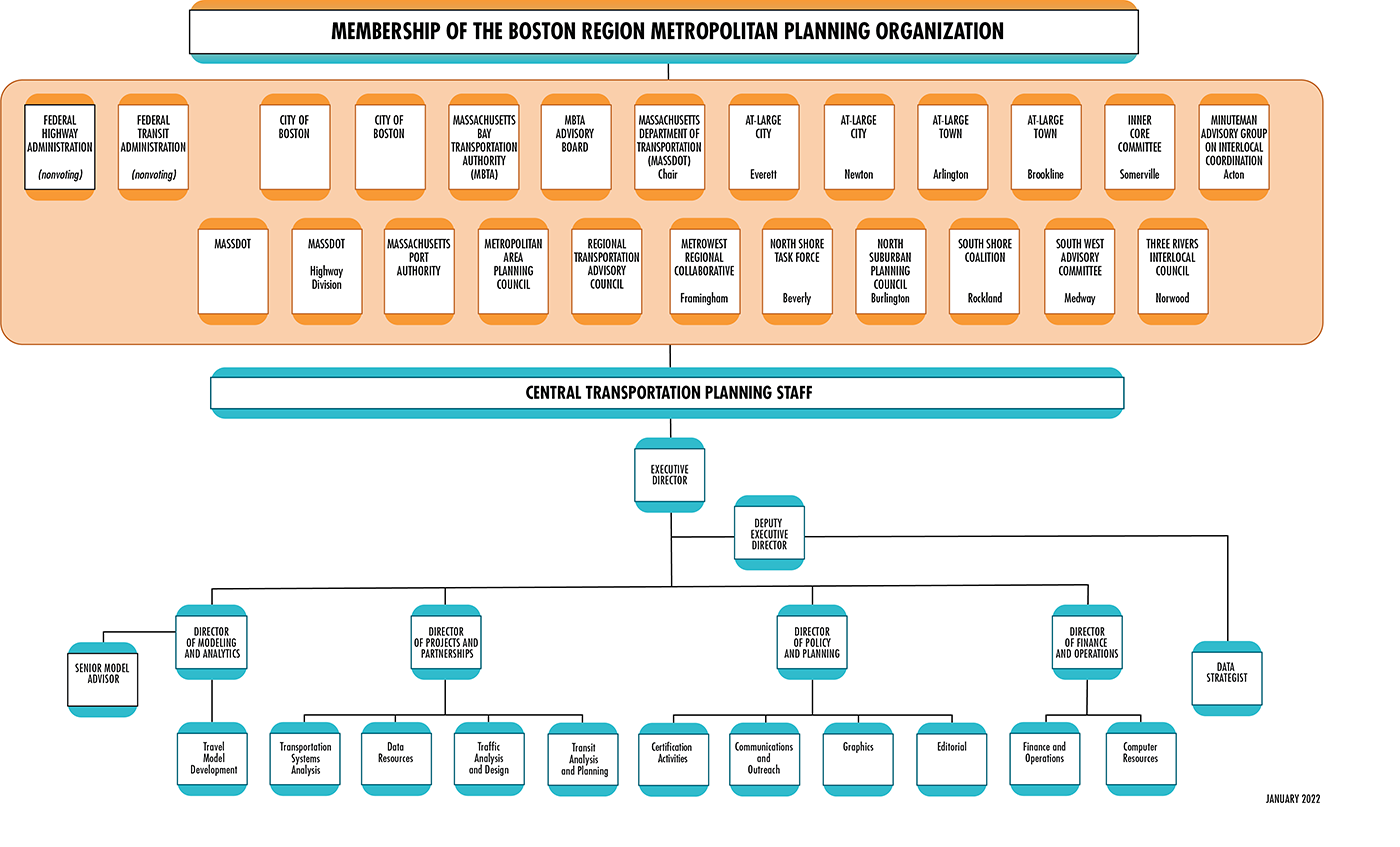
The following paragraph is the MPO’s central vision statement, as adopted in Destination 2040, the MPO’s current Long-Range Transportation Plan (LRTP).
The Boston Region MPO envisions a modern, well-maintained transportation system that supports a sustainable, healthy, livable, and economically vibrant region. To achieve this vision, the transportation system must be safe and resilient; incorporate emerging technologies; and provide equitable access, excellent mobility, and varied transportation options.
This vision statement takes into consideration the significant public input received during the drafting of the Needs Assessment for Destination 2040. This statement also reflects the MPO’s desire to add emphasis to the maintenance and resilience of the transportation system while supporting the MPO’s six core goals: Safety, System Preservation and Modernization, Capacity Management and Mobility, Clean Air and Sustainable Communities, Transportation Equity, and Economic Vitality. More information on the MPO’s vision, goals, and objectives for the transportation system is available in Figure 1-3 below.
As part of its 3C process, the Boston Region MPO annually produces the Transportation Improvement Program (TIP) and the Unified Planning Work Program (UPWP). These documents, along with the quadrennial LRTP, are referred to as certification documents and are required for the federal government to certify the MPO’s planning process. This federal certification is a prerequisite for the MPO to receive federal transportation funds. In addition to the requirement to produce the LRTP, TIP, and UPWP, the MPO must establish and conduct an inclusive public participation process, and maintain transportation models and data resources to support air quality conformity determinations and long- and short-range planning work and initiatives.
The following is a summary of each of the certification documents.
Figure 1-3
LRTP Goals and Objectives
Central Vision Statement
The Boston Region Metropolitan Planning Organization envisions a modern, well-maintained transportation system that supports a sustainable, healthy, livable, and economically vibrant region. To achieve this vision, the transportation system must be safe and resilient; incorporate emerging technologies; and provide equitable access, excellent mobility, and varied transportation options.
| Goals | Objectives |
SAFETY: Transportation by all modes will be safe |
|
SYSTEM PRESERVATION: Maintain and modernize the transportation system and plan for its resiliency |
|
CAPACITY MANAGEMENT AND MOBILITY: Use existing facility capacity more efficiently and increase transportation options |
|
TRANSPORTATION EQUITY: Ensure that all people receive comparable benefits from, and are not disproportionately burdened by, MPO investments, regardless of race, color, national origin, age, income, ability, or sex |
|
CLEAN AIR/SUSTAINABLE COMMUNITIES: Create an environmentally friendly transportation system |
|
ECONOMIC VITALITY: Ensure our transportation network provides a strong foundation for economic vitality |
|
Figure 1-4 depicts the relationship between the three certification documents and the MPO’s performance-based planning and programming process, which is a means to monitor progress towards the MPO’s goals and to evaluate the MPO’s approach to achieving those goals.
Figure 1-4
Relationship between the LRTP, TIP, UPWP, and Performance-Based Planning Process
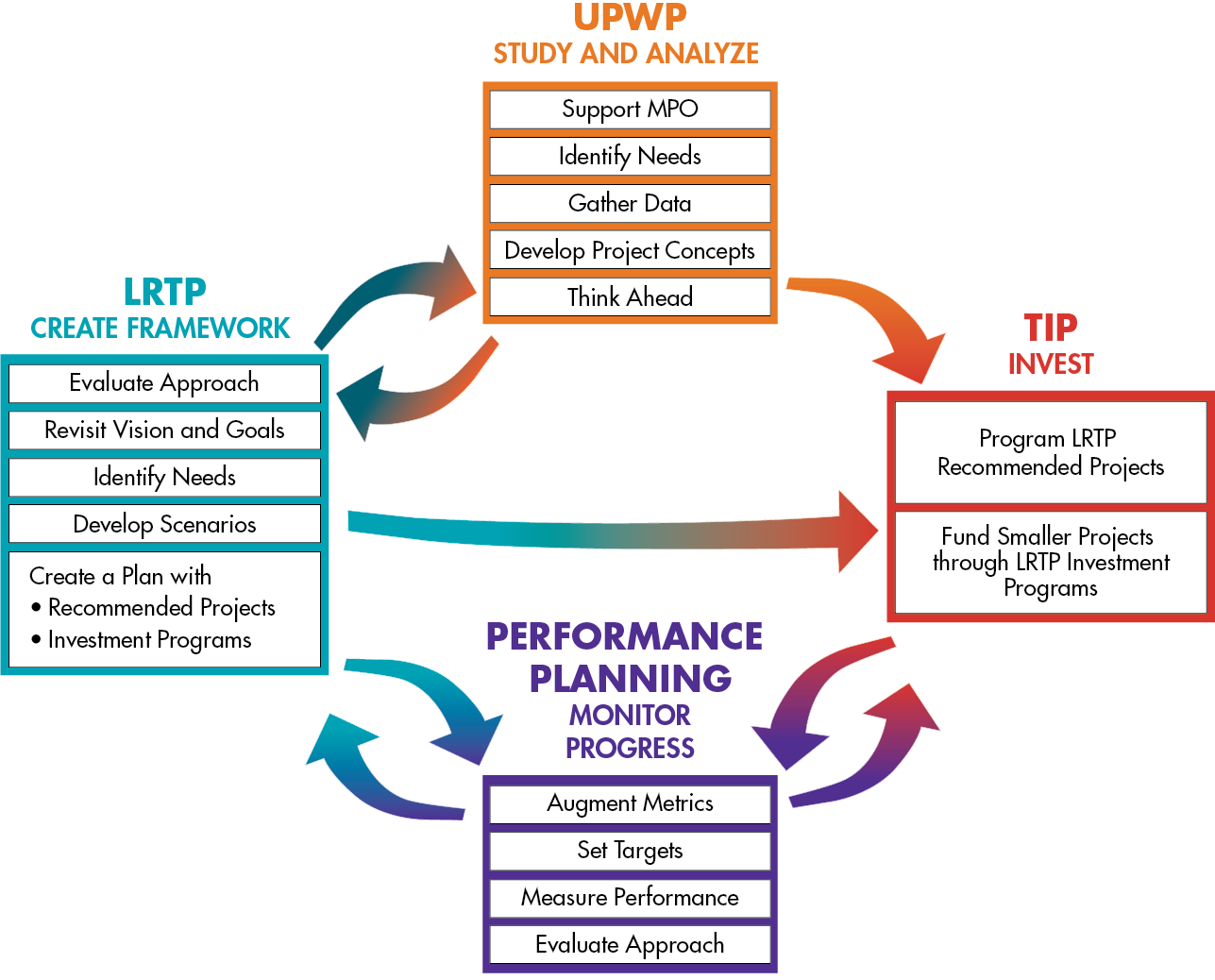
Source: Boston Region MPO.
One of the most important decisions a metropolitan planning organization (MPO) faces is deciding how to allocate limited funds for transportation projects and programs. Transportation improvements are part of the solution to many critical regional, state, national, and even global problems, such as traffic congestion, air pollution, fatalities and injuries on roadways, climate change, and environmental injustice. Because there is not nearly enough funding available for all of the necessary and worthy projects that would address these problems, an MPO’s investment choices must be guided by policies that help identify the most viable and effective solutions.
As described in Chapter 1, the Boston Region MPO develops a Long-Range Transportation Plan (LRTP) and a Transportation Improvement Program (TIP) to prioritize the expenditure of federal funds on transportation projects. The MPO staff manages the development of both plans. The annual development process for the TIP involves evaluating project funding requests from municipalities and state transportation agencies. The MPO staff then proposes a range of alternative scenarios for the programming of new and ongoing projects based on anticipated yearly funding levels, supports the MPO board by creating a draft TIP document, and facilitates a public involvement process that affords the public an opportunity to comment on proposed projects and review the draft TIP before the MPO board endorses the final document.
The first step in allocating federal transportation funds is the passage by the United States Congress of a multi-year act that establishes a maximum level of federal transportation funding per federal fiscal year (FFY). The establishment of this level of funding is referred to as an authorization. The most recent authorization act, the Bipartisan Infrastructure Law (BIL), was signed into law on November 15, 2021. The BIL governs the development of the FFYs 2023–27 TIP, including establishing new formula funding levels, creating new and reauthorizing existing discretionary grant programs, and setting policy priorities. More information about the impacts of the BIL on the development of the FFYs 2023–27 TIP is available throughout this report, with specific guidance on new BIL Planning Emphasis Areas available in Appendix E.
After the authorization level has been established, the United States Department of Transportation annually allocates funding among the states according to various federal formulas. This allocation is referred to as an apportionment. The annual apportionment rarely represents the actual amount of federal funds that are ultimately committed to a state because of federally imposed limitations on spending in a given fiscal year, referred to as the obligation authority. In Massachusetts, TIPs are developed based on the estimated obligation authority.
The FFYs 2023–27 TIP’s Highway Program was developed with the assumption that funding from the Federal-Aid Highway Program for the Commonwealth of Massachusetts would range between approximately $789 million and $850 million annually over the next five years. These amounts include the funds that would be set aside initially by the Massachusetts Department of Transportation (MassDOT) as payments for the Accelerated Bridge Program and exclude required matching funds. The funding levels for the FFYs 2023–27 TIP’s Highway Program represent an increase of approximately 18 percent over those in the FFYs 2022–26 TIP. This is a direct result of the broad increase in federal formula funding resulting from the passage of the BIL in November 2021.
The process of deciding how to use this federal funding in the Boston region follows several steps. MassDOT first reserves funding for Grant Anticipation Notes (GANs) debt service payments for the Accelerated Bridge Program; annual GANs payments range between approximately $89 million and $134 million annually over the five years of this TIP.
The remaining Federal-Aid Highway Program funds are budgeted to support state and regional (i.e., MPO) priorities. In the FFYs 2023–27 TIP, there is a total of approximately $870 million to $895 million assumed to be annually available statewide for programming (these amounts include both federal dollars and the state-provided local match). MassDOT customarily provides the local match (which can also be provided by other entities); thus, the capital costs of projects are typically funded with 80 percent federal dollars and 20 percent state dollars, depending on the funding program. Costs for project design are borne by the proponent of the project.
The Regional Targets are discretionary funds for MPOs, sub-allocated by formula to each metropolitan planning region. The Boston Region MPO receives about 43 percent of the total funds available statewide for Regional Targets. MassDOT developed the target formula for determining this distribution of funds in consultation with the Massachusetts Association of Regional Planning Agencies (MARPA).
Each MPO in the state can decide how to prioritize its Regional Target funding. Given that the Regional Target funding originates from the Federal-Aid Highway Program, the Boston Region MPO board typically programs the majority of its target funding on roadway projects; however, the MPO board has flexed portions of its TIP Highway Program funding to the TIP’s Transit Program, most notably when the MPO board provided funding in support of the Green Line Extension transit expansion project. Additionally, the FFYs 2023–27 TIP includes an annual allotment of funding to the MPO’s Transit Modernization Program beginning in FFY 2025. This represents the MPO’s first formalized effort to flex Federal-Aid Highway funds to transit projects on a yearly basis, an affirmation of the region’s goals to support multimodal transportation options in a meaningful way. More information on the MPO’s investment strategy is discussed later in this chapter.
During the next five years, the Boston Region MPO’s total Regional Target funding will be approximately $645 million, an average of $129 million per year. As with the overall increase in funding for the Highway Program from the BIL, the MPO’s Regional Target funds increased nearly 20 percent per year in the FFYs 2023–27 TIP relative to the levels planned for in the development of the FFYs 2022–26 TIP. To decide how to spend its Regional Target funding, the MPO engages its 97 cities and towns in an annual TIP development process.
The Federal-Aid Highway Program dollars discussed in this chapter come through several Federal Highway Administration (FHWA) funding programs, each of which has unique requirements. Table 2-1 lists these programs, which come from the BIL and fund projects in the FFYs 2023–27 TIP.
Table 2-1
Federal Highway Administration Programs Applicable to the FFYs 2023–27 TIP
BIL Program |
Eligible Uses |
Bridge Formula Program (BFP) |
Efforts to replace, rehabilitate, preserve, protect, and construct highway bridges |
Congestion Mitigation and Air Quality Improvement (CMAQ) |
A wide range of projects to reduce congestion and improve air quality in nonattainment and maintenance areas for ozone, carbon monoxide, and particulate matter |
Highway Safety Improvement Program (HSIP) |
Implementation of infrastructure-related highway safety improvements |
Metropolitan Planning |
Facilities that contribute to an intermodal transportation system, including intercity bus, pedestrian, and bicycle facilities |
National Electric Vehicle Infrastructure (NEVI) Program |
Projects that support the strategic deployment of electric vehicle (EV) charging infrastructure and establish an interconnected EV network to facilitate data collection, access, and reliability |
National Highway Freight Program (NHFP) |
Projects that improve the efficient movement of freight on the National Highway Freight Network |
National Highway Performance Program (NHPP) |
Improvements to interstate routes, major urban and rural arterials, connectors to major intermodal facilities, and the national defense network; replacement or rehabilitation of any public bridge; and resurfacing, restoring, and rehabilitating routes on the Interstate Highway System |
Surface Transportation Block Grant Program (STBGP) |
A broad range of surface transportation capital needs, including roads; transit, sea, and airport access; and vanpool, bicycle, and pedestrian facilities |
Transportation Alternatives Program (TAP) |
A set-aside from the STBGP that funds the construction of infrastructure-related projects (for example, sidewalk, crossing, and on-road bicycle facility improvements) |
BIL = Bipartisan Infrastructure Law.
Source: Federal Highway Administration
Federal aid for public transit authorities is allocated by formula to urbanized areas (UZAs). MassDOT is the recipient of this federal aid in the Boston MA-NH-RI UZA. In UZAs with populations greater than 200,000, such as the Boston MA-NH-RI UZA, the distribution formula factors in passenger-miles traveled, population density, and other factors associated with each transit provider. The three regional transit authorities (RTAs) in the Boston Region MPO area are the Massachusetts Bay Transportation Authority (MBTA), MetroWest Regional Transit Authority (MWRTA), and Cape Ann Transportation Authority (CATA). The MBTA, with its extensive transit program and infrastructure, is the recipient of the preponderance of federal transit funds in the region.
The Federal Transit Administration (FTA) distributes funding to transit agencies through several different programs. Table 2-2 shows FTA programs that come from the BIL and support transit investments in the FFYs 2023–27 TIP.
Table 2-2
Federal Transit Administration Programs Applicable to the FFYs 2023–27 TIP
BIL Program |
Eligible Uses |
Urbanized Area Formula Grants (Section 5307) |
Transit capital and operating assistance in urbanized areas |
Fixed Guideway/Bus (Section 5337) |
Replacement, rehabilitation, and other state-of-good-repair capital projects |
Bus and Bus Facilities (Section 5339) |
Capital projects to replace, rehabilitate, and purchase buses and related equipment, and to construct bus-related facilities |
Enhanced Mobility of Seniors and Individuals with Disabilities (Section 5310) |
Capital expenses that support transportation to meet the special needs of older adults and persons with disabilities |
Fixed-Guideway Capital Investment Grants (Section 5309) |
Grants for new and expanded rail, bus rapid transit, and ferry systems that reflect local priorities to improve transportation options in key corridors |
BIL = Bipartisan Infrastructure Law.
Source: Federal Transit Administration
As mentioned previously, each MPO in the state can decide how to prioritize the Regional Target funding it receives through the processes established by FHWA and MassDOT. The Boston Region MPO’s LRTP defines the investment framework that informs the specific investment decisions made in the TIP by establishing
The MPO’s goals and objectives provide the foundation for the evaluation criteria the MPO board uses when selecting transportation projects to be funded with Regional Target dollars. MPO staff compares candidate projects’ characteristics to these criteria to evaluate whether individual projects can help the MPO advance its various goals. The criteria used to select projects for this TIP are based on the MPO’s goals and objectives, adopted as part of Destination 2040, which is the LRTP the MPO endorsed in August 2019. These goals and objectives are listed in Chapter 1.
In Destination 2040, the MPO strengthened the link between its spending and improvements to transportation performance by revising its investment programs to include a broader range of prospective projects. These investment programs focus on specific types of projects that the MPO expects will help achieve its goals and objectives for the transportation system. The MPO created these programs to give municipalities the confidence that if they design these types of projects the MPO will be willing to fund them through the TIP:
Figure 2-1 provides details about the Destination 2040 investment programs and their relationship to the MPO’s goals. When developing the FFYs 2023–27 TIP, the MPO allocated its Regional Target dollars to these investment programs by assigning them to projects that meet the investment programs’ criteria.
Figure 2-1
Destination 2040 Investment Programs
Funds projects to modernize intersection geometry and signalization to improve safety and mobility.
Improvements may include:
Funds projects that modernize roadways to improve safety and mobility for all users.
Improvements may include:
Funds projects that modernize transit infrastructure and promote the enhanced ridership, accessibility or resiliency of transit services.
Improvements may include:
Funds a variety of project types, including first- and last-mile solutions and other small, nontraditional transportation projects to enhance mobility and improve air quality.
Improvements may include:
Funds projects that enhance major arterials for all users and modernize or expand transit systems to increase capacity. Projects in this program cost more than $50 million; are on major roadways including Interstate Highways, Principal Arterial Freeways and Expressways, or all sections of roadways classified as Principal Arterial “Other” that have fully or partially controlled access; or add new connections to or extend the rail or fixed guideway transit network or the bus rapid transit network. Improvements may include
Funds projects to expand bicycle and pedestrian networks to improve safe access to transit, schools, employment centers, and shopping destinations.
Improvements may include:
S: Safety
SP: System Preservation and Modernization
CM: Capacity Management
CA: Clean Air/Sustainable Communities
TE: Transportation Equity
EV: Economic Vitality
Newly created in Destination 2040, the Transit Modernization Program represents a significant shift in the MPO’s investment strategy, as funding will be allocated to transit projects on an annual basis beginning in FFY 2025. In prior years, the MPO only funded transit projects on a one-off basis when funding was requested for specific projects in the region. By creating the programming infrastructure to flex Regional Target highway funds to transit projects annually, the Boston Region MPO has established itself as a leader among MPOs nationally by crafting an investment strategy that is truly multimodal. The MPO has taken a clear stance that investing in transit is central to improving the region’s broader transportation system. The MPO’s five other investment programs were created during the development of prior LRTPs.2-1
During this TIP cycle, the MPO funded multiple Transit Modernization projects in FFYs 2023 and 2024 in order to make use of funding surpluses in these years. The MPO has also continued to reserve funding in each fiscal year beginning in FFY 2025 for future allocation. In the FFYs 2023–27 TIP, the MPO made the decision to increase the funding allocated to this program from $5.5 million to $6.5 million annually, as the MPO’s overall Regional Target funding increased with the passage of the BIL in November 2021. In the coming years, the MPO will continue to work with municipalities and transit providers in the region to identify transit needs and determine the most effective use of this funding to address those needs.
Destination 2040 also reflects an updated set of priorities for the MPO's Complete Streets investment program, adding dedicated bus lanes and climate resiliency measures to the types of projects targeted for funding through this program. As with the Transit Modernization Program, the MPO will continue to work with municipalities in future TIP cycles to develop and fund projects in these new areas of emphasis.
Finally, while the MPO’s Community Connections investment program was created through the 2015 LRTP, Charting Progress to 2040, the FFYs 2021–25 TIP represented the first TIP cycle that allocated this funding to specific projects. In prior TIP cycles, the $2 million in annual funding for this program was reserved for future use but not allocated, as the development timeline for the first- and last-mile projects funded through this program is much shorter than for other TIP projects. In the FFYs 2023–27 TIP, the MPO built on the success of the first two rounds of the Community Connections Program, funding 11 additional projects on top of the 14 projects funded in the previous two TIP cycles.
Funding for the Community Connections Program continues to be reserved in FFYs 2024–27 for allocation in future TIP cycles. As with the Transit Modernization Program above, the MPO made the decision in the FFYs 2023–27 TIP to increase the funding allocated to the Community Connections Program from $2 million to $2.5 million annually beginning in FFY 2023, as the MPO’s overall Regional Target funding increased with the passage of the BIL in November 2021. More information on the projects selected for funding in each of the MPO’s investment programs can be found in Chapter 3.
When creating investment program guidelines for Destination 2040, the MPO elected to decrease the amount of funding allocated to large-scale projects that would be included in its Major Infrastructure Program in order to focus a larger percentage of funding on lower cost, operations-and-maintenance projects. Such a funding mix will help the MPO address its goals and provide more opportunities for the MPO to distribute federal transportation dollars to projects throughout the region, as opposed to concentrating it on a few large-scale projects.
Early in the development of the FFYs 2022–26 TIP, the MPO reassessed its definition of Major Infrastructure projects, adopting a new definition through sequential votes on August 20, 2020, and October 1, 2020. This revised definition carried through to the development of the FFYs 2023–27 TIP. The MPO previously defined Major Infrastructure projects as those that cost more than $20 million or that add capacity to the transportation network. The MPO’s new definition classifies Major Infrastructure projects as those that meet any of the following criteria:
Under the MPO’s prior Major Infrastructure definition, the relatively low cost threshold caused several large-scale Complete Streets projects to be classified as Major Infrastructure projects although they were more local in nature. The changes outlined above are intended to focus the Major Infrastructure investment program on those projects that are of significant scale or that are truly important for the broader MPO region. This allows the MPO to better compare like projects when conducting project evaluations. Because the MPO considers the five-year distribution of TIP funds across its investment programs relative to the goals set forth in the LRTP (as shown in Figure 2-2), properly categorizing projects is a critical component of the MPO’s decision-making process.
Funding allocation goals like these are some of the LRTP-based guidelines the MPO employs to ensure limited Regional Target funding is programmed in ways that best achieve the MPO’s goals for transportation in the region. As the MPO continues the development of its next LRTP, Destination 2050, it will assess the efficacy of each of its six investment programs to ensure these programs are structured to best support progress on the MPO’s goals and objectives for the region.
Figure 2-2
Destination 2040 Funding Goals by MPO Investment Program
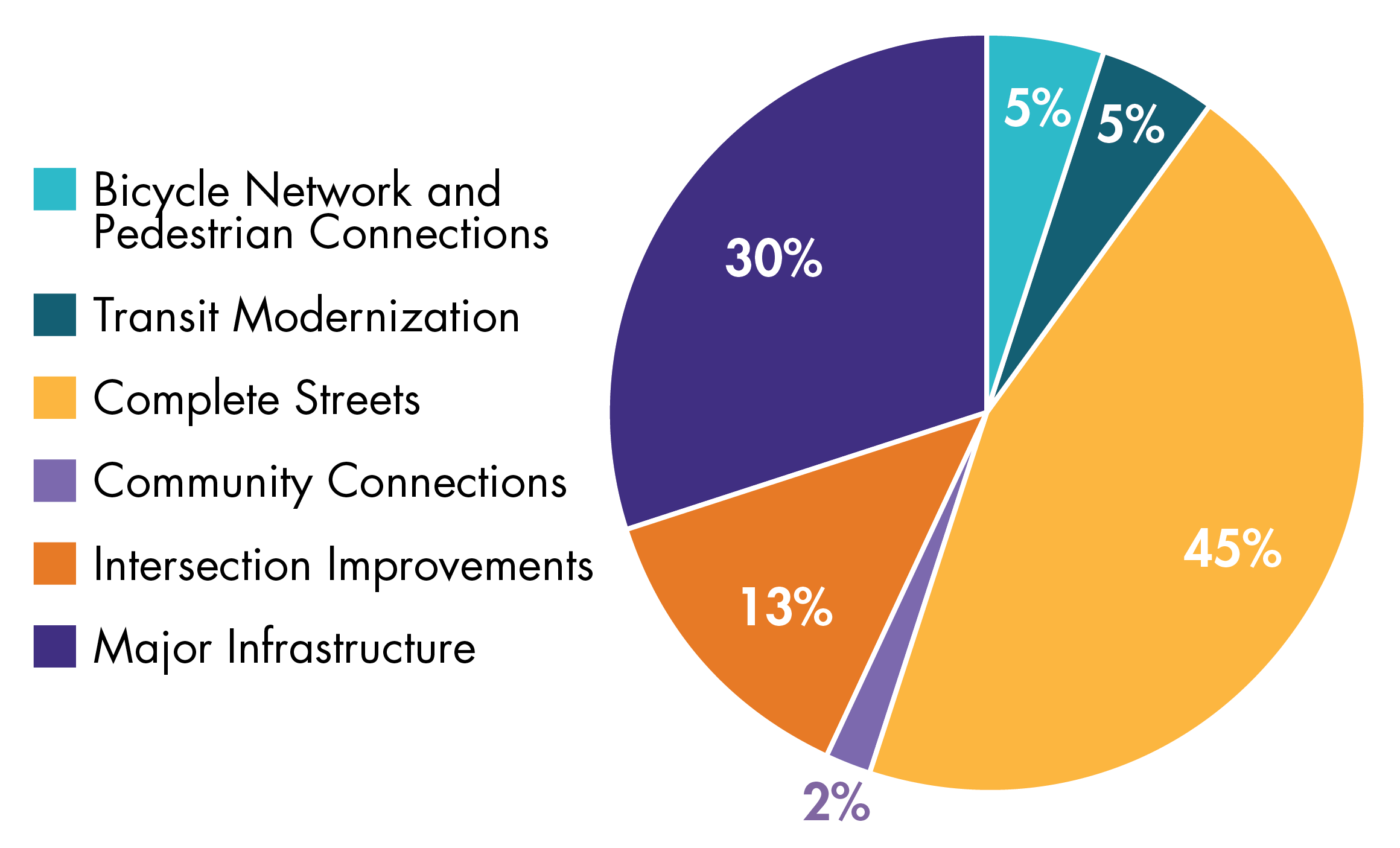
Source: Boston Region MPO.
In addition to evolving policies for specific investment programs, the MPO also made other policy changes prior to the development of the FFYs 2023–27 TIP to guide future funding decisions. Most notably, the MPO elected to codify its policy of requiring that project proponents submit 25 percent designs and obtain an updated cost estimate for their projects prior to being programmed in the TIP. This new standard was set by the MPO as part of a multi-pronged effort to reduce the prevalence of cost increases for projects that have already been selected for funding in the TIP.
This change is part of a larger suite of policy changes recommended by the TIP Project Cost Ad Hoc Committee, which was created in the wake of the FFYs 2022–26 TIP cycle and completed its work in November 2021. While this new policy was formally in effect for the FFYs 2023–27 TIP cycle, the MPO desired to keep this threshold flexible in its first year of implementation, given that the policy was not adopted until after the start of TIP development. More information on the work of this committee is available on the following pages of this chapter.
MassDOT and the MBTA each update their rolling five-year Capital Investment Plans (CIP) on an annual basis. Historically, these agencies have produced a unified CIP, but for the FFYs 2023–27 capital planning cycle, MassDOT and the MBTA have opted to produce separate plans. Though separate, these plans take similar approaches. MassDOT’s CIP identifies priority roadway, bridge, and statewide infrastructure projects for the five MassDOT divisions and includes funding for specific transit projects such as the South Coast Rail and Green Line Extension projects. The MBTA’s CIP outlines the agency’s five-year investment strategy for transit projects in its service area.
Both CIP processes use a similar framework that prioritizes funding according to statewide strategic goals for the transportation system. Reliability is the top priority for MassDOT and the MBTA, followed by modernization and then expansion. Both agencies have created investment programs for their respective CIPs that relate to these strategic goals, and allocate funding to these programs in ways that emphasize their priority. These goals and investment programs are as follows:
The MPO applies its investment framework when developing the TIP. The MPO board’s process for selecting projects to receive highway discretionary—or Regional Target—funding relies on evaluation criteria to help identify and prioritize projects that advance the MPO’s goals. The criteria are based on the MPO’s goals and objectives outlined in the LRTP. All projects are required to show consistency with the LRTP and other statewide and regional plans. Other considerations include the readiness of a project for construction and municipal support for the project. Background information about the TIP project evaluation process is presented in Appendix A.
In the wake of the adoption of Destination 2040 in August 2019, the MPO began the process of revising the TIP evaluation criteria to enhance alignment with the MPO’s updated goals, objectives, and investment programs. These new criteria were adopted by the MPO on October 1, 2020, and were employed during the project selection process for the FFYs 2022–26 and 2023–27 TIPs. The final criteria were the result of a 15-month process that engaged nearly 1,100 members of the public through surveys and focus groups. This process also prioritized the inclusion of significant direct input from MPO members, which was gathered from more than a dozen presentations, discussions, and focus groups. The outcomes of this process are discussed further in the Project Evaluation section on the following pages.
Because of the limitations on in-person gatherings caused by the COVID-19 pandemic, a vast majority of the surveys, focus groups, and presentations discussed above were conducted virtually, with participation options both online and over the telephone. These virtual engagement opportunities allowed MPO staff to pursue new ways of building relationships with members of the public and other key stakeholders in the region. Given the increase in access to the TIP criteria revision process afforded by these virtual events, MPO staff intend to develop a hybrid outreach model that would support both in-person and virtual engagement when it is safe to resume in-person meetings.
In addition to the process outlined above, which focused on developing new criteria for five of the MPO’s investment programs (Bicycle Network and Pedestrian Connections, Complete Streets, Intersection Improvements, Major Infrastructure, and Transit Modernization), the MPO also adjusted the project selection criteria used to evaluate and fund projects through the Community Connections Program in the FFYs 2022–26 and 2023–27 TIPs. These revisions were made based on the lessons learned by MPO staff through the pilot round of this program, which took place during the FFYs 2021–25 TIP cycle. More information on these criteria is available in the Project Evaluation section of this chapter, as well as in Appendix A.
The TIP development process begins early in the federal fiscal year when cities and towns in the region designate staff as TIP contacts and begin developing a list of priority projects to be considered for federal funding. Each fall, the MPO staff asks these TIP contacts to identify their city or town’s priority projects and then MPO staff elicits input from interested parties and members of the general public.
These discussions on municipalities’ priority projects mark the start of a robust dialogue between MPO staff and project proponents that continues through the duration of the TIP cycle. As noted above, the COVID-19 pandemic forced the transition of all of these conversations for the FFYs 2023–27 TIP cycle to take place virtually. During the fall of 2021, MPO staff held two virtual workshops for municipalities in the region to develop an understanding of the TIP process. MPO staff provided additional one-on-one virtual office hours throughout the fall for proponents to ask more detailed questions about advancing specific projects for funding, with several office hour sessions booked for this purpose during the early stages of developing the FFYs 2023–27 TIP.
Once project proponents have decided to pursue federal funding, they must begin the formal project initiation process. All new Bicycle Network and Pedestrian Connections, Complete Streets, Intersection Improvements, and Major Infrastructure projects must be initiated with the MassDOT Highway Division before they can be considered for programming in the TIP. MassDOT details this process on its project initiation webpage, mass.gov/info-details/massdot-highway-initiating-a-project . To be considered for programming, proponents of Community Connections projects must submit an application for funding directly to MPO staff, as these projects do not need to be initiated by MassDOT.
The MPO staff compiles project funding requests for projects into a Universe of Projects list, which consists of all identified projects being advanced for possible funding in the Bicycle Network and Pedestrian Connections, Complete Streets, Intersection Improvements, and Major Infrastructure investment programs. The Universe includes projects that are at advanced stages of project design, those that are undergoing preliminary engineering and design, and projects still in the conceptual planning stage. Those projects that are active municipal priorities and that are feasibly ready to be programmed in the current TIP cycle continue forward into the MPO’s project evaluation process. Projects that are not ready for programming remain in the Universe for consideration in future TIP cycles. A project Universe is not developed for Community Connections projects, as all eligible projects within this program will be considered for funding during the TIP cycle in which project proponents apply.
The MPO staff uses its project evaluation criteria to logically and transparently evaluate and select projects for programming in the TIP that advance the MPO’s vision for transportation in the region. This process favors projects that support the following goals:
As noted previously, the MPO undertook a process of revising the TIP evaluation criteria prior to the launch of the FFYs 2022–26 TIP to enhance the alignment between the TIP project selection process and the MPO’s updated goals, objectives, and investment programs outlined in Destination 2040. In terms of the overall structure of the criteria, this process resulted in the following outcomes:
In addition to these broader structural changes, a number of updates were made to individual criteria to better accomplish the MPO’s goals in the LRTP:
Several other changes were made to the project evaluation criteria, which are detailed in Appendix A. The point distributions, categorized by MPO investment program and LRTP goal area, are also available in Figure 2-4. Projects scored using both sets of criteria are programmed in each of these four investment programs in the FFYs 2023–27 TIP, so both sets of criteria are referenced throughout this document.
Though many of the adjustments listed above were in development prior to the onset of the COVID-19 pandemic, the emerging lessons from this event reinforced the importance of making such changes. These changes include emphasizing criteria that award points to projects that invest in walking, bicycling, and transit infrastructure. Also, the need for new criteria that more directly address existing disparities in health and transportation access for minorities and low-income households has been put into stark relief throughout the pandemic. While the MPO did not elect to rescore any currently programmed projects with these new criteria, the revised criteria will be employed in coming TIP cycles to support the funding of transportation projects that act on the lessons learned from COVID-19.
Prior to the FFYs 2022–26 TIP cycle, the MPO also undertook a parallel process to update its evaluation criteria for the smaller-scale, first- and last-mile projects considered for funding through the Community Connections Program. These adjustments were based on the lessons learned from the pilot round of this program during the FFYs 2021–25 TIP cycle. In these revisions, MPO staff aimed to create a more focused set of criteria that better aligned with the types of projects pursuing funding through this program. Revisions to the Community Connections criteria also addressed the discrepancies between capital and operating projects, as the pilot criteria more heavily favored operating projects. These adjustments resulted in more balanced scores that better reflected the goals of the program when implemented for the FFYs 2022–26 TIP cycle. More information on the scoring areas for these criteria is available in Figure 2-3, and all the criteria are available in Appendix A. Projects scored using both sets of criteria are programmed in the Community Connections Program in the FFYs 2023–27 TIP, so both sets of criteria are referenced throughout this document.
Figure 2-3
TIP Project Evaluation Criteria: Point Distribution for Community Connections Projects
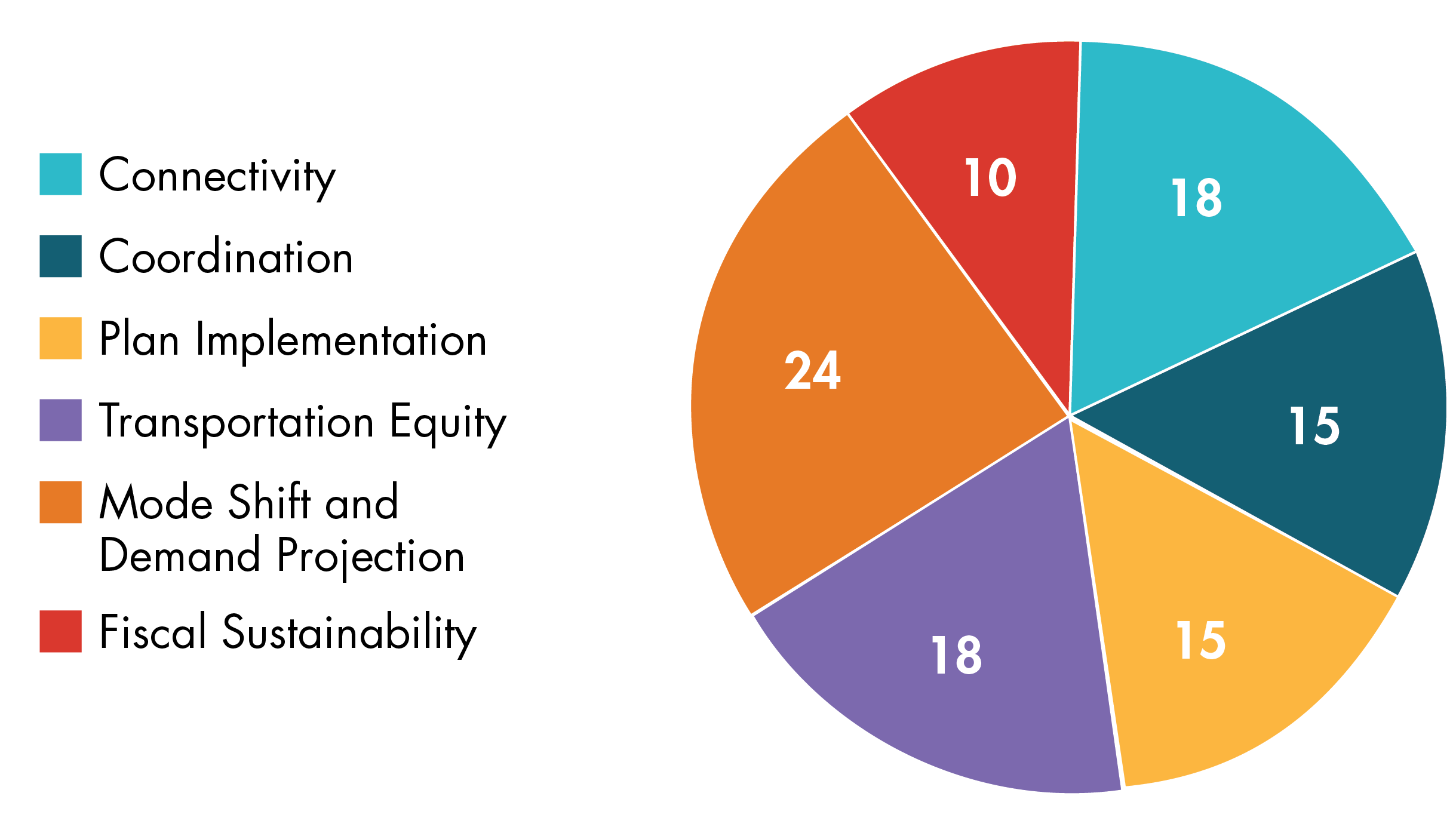
Source: Boston Region MPO.
Figure 2-4
TIP Project Evaluation Criteria: Point Distributions by Project Type (All Other Investment Programs)
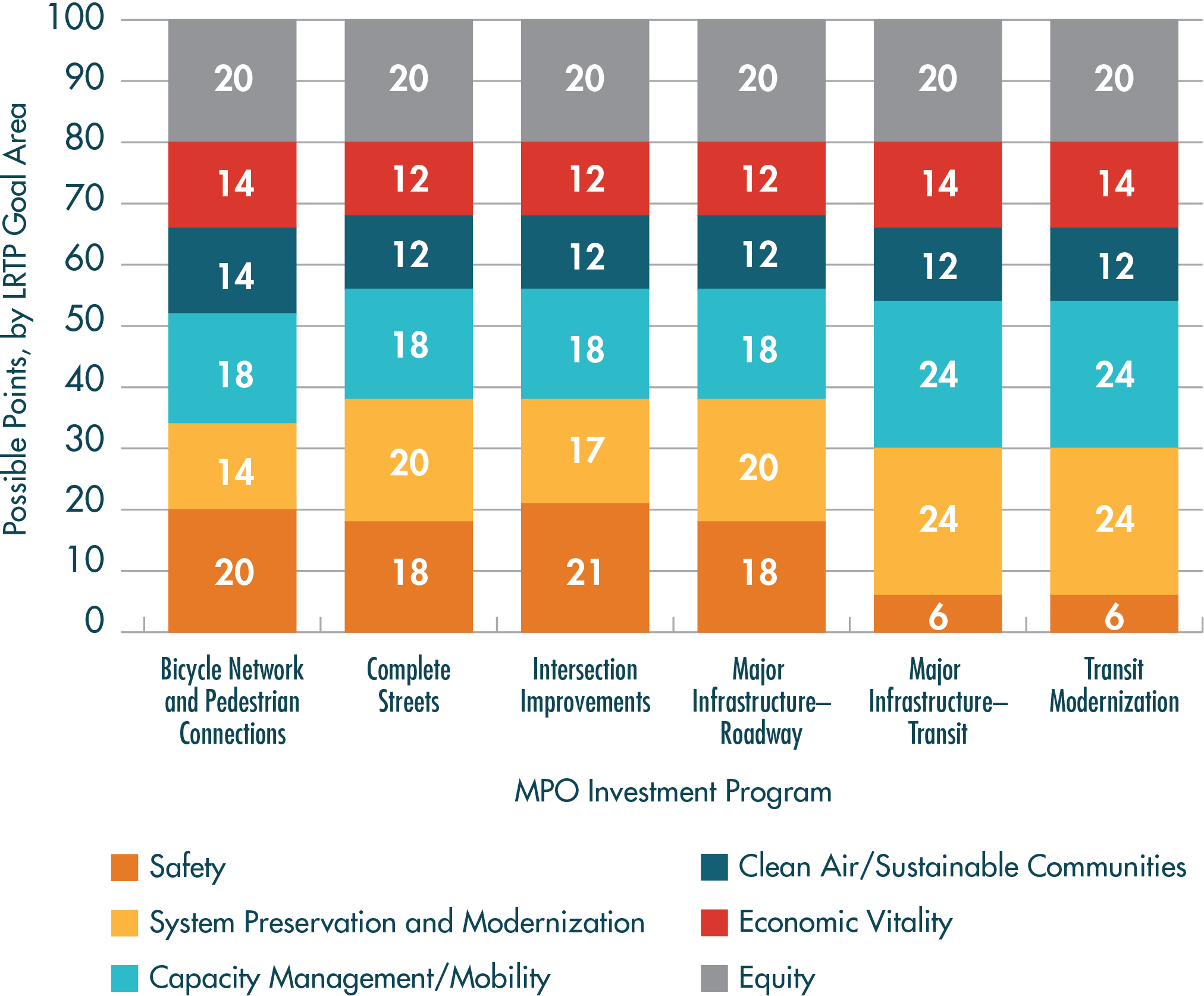
Source: Boston Region MPO
In order for the MPO staff to conduct a complete project evaluation, each project proponent must provide enough information to meaningfully apply the criteria listed above. Bicycle Network and Pedestrian Connections, Complete Streets, Intersection Improvements, and Major Infrastructure projects must have a functional design report or be near the 25 percent design stage, or its plans must include the level of detail defined in a functional design report. (See MassDOT’s Project Development and Design Guide for information about the contents of a functional design report. This guide is available at mass.gov/lists/design-guides-and-manuals.) For Community Connections projects, proponents must submit a complete application to the MPO, including required supporting documentation.
After MPO staff have completed an initial round of project scoring, draft scores are distributed to project proponents for their review. The MPO’s goal is to fairly and accurately assess all projects, making this review a critical component of the TIP process. Proponents are encouraged to submit feedback to MPO staff on their scores if they feel any criteria have been applied inaccurately. Proponents are also encouraged to submit additional supporting documentation on their projects if doing so would help clarify or correct any elements of the draft scoring. MPO staff take all proponent feedback into consideration and make any warranted adjustments to project scores before considering the evaluation process final and preparing the scores for presentation to the MPO.
For more details about the criteria used to score projects and project evaluation results for projects considered for programming in this TIP, see Appendix A.
On TIP Readiness Day, the MPO staff meets with members of the MassDOT Highway Division to review cost and schedule changes related to currently programmed projects, which are undergoing design review, permitting, and right-of-way acquisition. The MPO board then considers these updated project construction costs and changes to the expected dates for construction advertisement when making decisions about changes to TIP programming. These changes have an impact on the ability of the MPO to program its target funds for new projects in the five-year TIP.
Between the development of the FFYs 2021–25 TIP and the FFYs 2022–26 TIP, more than half of the projects programmed by the MPO experienced cost increases, many of which represented significant increases in percentage terms or in absolute cost. These changes placed severe limitations on the MPO’s ability to consider new projects for funding during the FFYs 2022–26 TIP cycle. As a partner to MassDOT’s Highway Division and Office of Transportation Planning, the MPO recognizes its role in supporting the on-time and on-budget delivery of projects by proponents. For this reason, the MPO board created a committee in the wake of the FFYs 2022–26 TIP cycle to further explore the causes of project cost increases and devise MPO policy changes to support more reliable project delivery by all parties.
The TIP Project Cost Ad Hoc Committee began its work in June 2021 and advanced a set of policy recommendations to the full MPO board in September 2021. These changes were formally adopted by the MPO on November 4, 2021, and were in effect for the development of the FFYs 2023–27 TIP. In addition to the requirement that project proponents submit 25 percent design plans and obtain an updated cost estimate for their project prior to obtaining funding in the TIP, as detailed previously, the committee’s work resulted in several other policy changes.
Most notably, the MPO board adopted a policy that proponents of any projects that experienced a cost increase of 25 percent or greater (for projects costing less than $10 million) or of greater than $2.5 million (for projects costing more than $10 million) would be required to present to the MPO board on the reasons for these cost increases. The MPO would then compare this project—at its new cost—to other projects based on a cost-effectiveness evaluation before making a decision on whether or not to fund the project at its higher cost. These cost changes are most often revealed through conversations between MassDOT staff and MPO staff during TIP Readiness Day, making this new policy especially relevant at this stage of TIP development.
Using the evaluation scores and information gathered about project readiness (when a project likely would be fully designed and ready for advertisement) and cost, staff prepares possible TIP project programming scenarios for the MPO’s consideration. When developing these scenarios, MPO staff also considers whether a project was programmed in the LRTP, LRTP-based guidelines for allocating funds to different programs or project types, the distribution of investments across the region, and availability of sufficient funding. The MPO staff gather feedback from board members, project proponents, and the public to inform a final staff recommendation, which is then presented to the MPO for approval before it is included in the draft TIP for public review.
Given the significant increase in Regional Target funding in the FFYs 2023–27 TIP resulting from the passage of the BIL, the MPO selected a significant number of new projects for funding during this TIP cycle, including
In total, the MPO allocated more than $236 million in this TIP cycle to projects not previously funded in the Regional Target program. More information on the projects funded in the FFYs 2023–27 TIP is available in Chapter 3.
As discussed above, the selection of transit, bridge, and statewide infrastructure projects for programming in the TIP draws primarily from the CIPs produced by MassDOT and the MBTA. These agencies evaluate projects for inclusion in CIP programs using criteria established by the independent Project Selection Advisory Council (PSAC). The following criteria from the PSAC process guide project evaluation:
Projects that receive the highest priority are those that meet each agency’s goals for maintaining and improving the overall condition and reliability of the system; modernizing the system to make it safer and more accessible and to accommodate growth; and expanding and diversifying transportation options for communities. These project-prioritization processes may also reflect other planning initiatives, such as Focus40, the MBTA’s 25-year investment plan, or MassDOT’s modal plans. More information on regulatory and planning guidance governing TIP project prioritization is available in Appendix E. Once project prioritization is complete, programming decisions are made based on these evaluations and information regarding project readiness, program sizing, and existing asset management plans.
As discussed above, the transit element of the TIP also includes the Federal-Aid Programs of the other two RTAs in the region, CATA and MWRTA. Once selection processes are complete for all four agencies, these agencies submit their lists of bridge and roadway projects, bicycle and pedestrian improvements, statewide infrastructure items, and transit capital projects to the MPO for review.
The MPO board considers the project evaluation results and staff recommendation when prioritizing projects for Regional Target funding. The board also considers public comments, the regional importance of projects, and other factors. In addition to prioritizing the Regional Target funding, the MPO board reviews MassDOT’s proposed statewide highway programming and the proposed capital programs for the MBTA, CATA, and MWRTA before voting to release a draft TIP for public review.
The MPO board votes to release the draft document for public review and invites members of the public, municipal and elected officials, and other stakeholders in the Boston region to review the proposed TIP. The MPO staff hosts outreach events during the public review period to elicit comments on the draft document. (See Appendix C for a full list of public comments submitted on the draft TIP.)
After the public review period ends, the MPO staff and board review all public comments, and the board may change the programming or the document as appropriate before endorsing the TIP. MassDOT staff incorporates the MPO-endorsed TIP into the State Transportation Improvement Program (STIP) and submits it to the FHWA and FTA for approval. The FHWA, FTA, and US Environmental Protection Agency review the STIP and certify it by September 30, the end of the federal fiscal year.
The TIP is a dynamic program that may be amended and adjusted throughout the year. Administrative modifications and amendments are often introduced because of changes in project status (advertisement readiness), project cost, project design scope, or available revenue. An amendment is a revision that requires public review and a demonstration of fiscal constraint.
Consistent with federal guidelines, the Boston Region MPO must release an amendment if there is (1) a change in project cost of $500,000 or more for projects valued at $5 million or less, or (2) a change of 10 percent or more of the project cost for projects valued greater than $5 million. TIP amendments are also released if there is a proposal to add or remove a project from the TIP, if the programming year of a project is changed, or if a project has a major change in scope. Administrative modifications or adjustments are also undertaken in the event that a project's funding source changes or if there is a minor change in a project's description or scope.
Regardless of the nature of an amendment, all proposed TIP amendments are presented in a public setting at an MPO meeting, and details are posted on the MPO’s website, bostonmpo.org. Public notices are distributed through the MPO’s email contact list, which members of the public may join by signing up on the MPO’s website. Municipal staff who are TIP contacts at the affected municipalities and the public are notified of pending amendments at the start of an amendment’s public review period.
Notices of draft TIP amendments include a summary of the amendment’s contents, dates of the public review period, contact information for submitting a comment to the MPO, and the date, time, and location that the MPO will vote on that amendment. Municipal representatives and members of the public are invited to submit written or oral testimony at the MPO meetings at which amendments are discussed or voted upon.
The MPO typically holds a 21-day public review period before taking final action on an amendment. In extraordinary circumstances, the MPO may vote to shorten the public review period to a minimum of 15 days. (These circumstances are detailed in the MPO’s Public Engagement Plan.)
The MPO’s website is the best place to find current information about the TIP. All changes to the draft TIP and changes to the endorsed TIP, such as amendments and modifications that have been approved by the MPO, are available on the TIP webpage, bostonmpo.org/tip.
Comments or questions about the draft TIP materials may be submitted directly to the MPO staff via the website, email, or US mail, or voiced at MPO meetings and other public MPO events.
2-1 The Community Connections Program was formerly referred to as the Community Transportation/Parking/Clean Air and Mobility Program when it was originally created in the MPO’s 2015 LRTP, Charting Progress to 2040.
The Transportation Improvement Program (TIP) tables included in this chapter present a listing of all the projects and programs funded with federal highway and transit aid in the Boston region during federal fiscal years (FFYs) 2023–27. These funding tables are also included as part of the State Transportation Improvement Program (STIP).
Table 3-1 presents a summary of the Boston Region Metropolitan Planning Organization’s (MPO) share of Regional Target funds from the Federal-Aid Highway Program. The allocation of these funds is constrained by projections of available federal aid. As shown in Table 3-1, the MPO has programmed much of the available discretionary funds within the limits of projected funding for highway funding programs. As such, the FFYs 2023–27 TIP Regional Target Program complies with financial constraint requirements.
Table 3-1
Boston Region MPO Regional Target Program Funding Summary
| FFY 2023 | FFY 2024 | FFY 2025 | FFY 2026 | FFY 2027 | Total | |
Regional Target Obligation Authority |
$128,950,081 |
$130,647,095 |
$128,427,689 |
$125,285,688 |
$132,045,285 |
$645,355,838 |
Regional Target Funds Programmed |
$128,950,081 |
$117,059,590 |
$124,612,902 |
$123,179,070 |
$128,586,581 |
$622,388,224 |
Regional Target Funds Unprogrammed |
$0 |
$13,587,505 |
$3,814,787 |
$2,106,618 |
$3,458,704 |
$22,967,614 |
Source: Boston Region MPO.
As discussed in Chapter 2, the signing of the Bipartisan Infrastructure Law (BIL), on November 15, 2021, increased the amount of Regional Target funding available to the Boston Region MPO for the development of the FFYs 2023–27 TIP by approximately 20 percent from the funding levels in the FFYs 2022–26 TIP. These additional funds allowed the MPO to program a significantly greater number of new projects in this TIP cycle (23) than in the FFYs 2022–26 TIP cycle (10) or the FFYs 2021–25 TIP cycle (8).
In the development of the FFYs 2023–27 TIP, the cost-increase issues for projects already programmed in the TIP were not as pervasive as they were in the development of the prior two TIPs. This allowed the MPO to retain a vast majority of its new funding for the programming of additional projects. The projects selected by the MPO for funding for the first time in the FFYs 2023–27 TIP are listed in Table 3-2.
As in most years, the majority of the funding available for allocation by the MPO during the FFYs 2023–27 TIP cycle was in the fifth and final year of the TIP, FFY 2027. Unlike in most years, however, the addition of approximately $20 million in new BIL funding annually beginning in FFY 2023 created new funding surpluses in the early federal fiscal years of the TIP (FFYs 2023 and 2024). These surpluses were compounded by programming delays for two projects already funded by the MPO (project #606453—Improvements on Boylston Street and project #606226—Reconstruction of Rutherford Avenue, both in Boston). Together, these dynamics led to a funding surplus in excess of $90 million in FFYs 2023 and 2024.
The MPO did not have any currently funded Regional Target projects that could be accelerated to make use of these funds, so the MPO worked with MassDOT and the MBTA to identify projects that could be funded in these fiscal years. Jointly, MassDOT and the MBTA brought more than a dozen projects to the MPO for consideration, from which the MPO selected three projects for funding in FFYs 2023 and 2024:
These projects were not formally evaluated using the MPO’s project selection criteria prior to the MPO making draft funding decisions, as MPO staff did not have sufficient time to score the projects prior to the deadline for MPO decision-making. Despite not being scored, they generally align well with many of the MPO’s goals, including enhancing bicycle and pedestrian safety and access, and maintaining a state of good repair for the region’s transit system and critical roadways. Scoring information will be included for these projects when it is available.
Table 3-2
New Regional Target Projects Funded in the FFYs 2023–27 TIP
| Project Name | Municipality (Proponent) | MPO Investment Program | FFYs of Funding | Regional Target Dollars Programmed in FFYs 2023–27 | |
|---|---|---|---|---|---|
Lynn Station Improvements Phase II |
Lynn (MBTA) |
Transit Modernization |
2023–24 |
$48,100,000 |
|
Rehabilitation of Washington Street |
Brookline |
Complete Streets |
2027 |
$30,030,812 |
|
Bridge Rehabilitation, Commonwealth Avenue (Route 30) over the Charles River |
Newton and Weston (MassDOT) |
Complete Streets |
2024 |
$22,725,820 |
|
Community Path, Belmont Component of the MCRT (Phase 1) |
Belmont |
Bicycle and Pedestrian |
2026 |
$21,034,382 |
|
McGrath Boulevard Construction* |
Somerville (MassDOT) |
Major Infrastructure |
2027 |
$20,000,000 |
|
Reconstruction on Route 30 |
Weston |
Complete Streets |
2026 |
$17,028,272 |
|
Reconstruction of Western Avenue* |
Lynn |
Complete Streets |
2027 |
$15,000,000 |
|
Boston Street Improvements |
Salem |
Complete Streets |
2026 |
$13,977,600 |
|
Park and Pearl Street Reconstruction |
Chelsea |
Complete Streets |
2027 |
$12,123,769 |
|
Rail Trail Construction |
Swampscott |
Bicycle and Pedestrian |
2027 |
$8,932,000 |
|
Forest Hills Station Improvement Project** |
Boston (MBTA) |
Transit Modernization |
2024 |
$6,400,000 |
|
Intersection Improvements at Boston Post Road (Route 20) at Wellesley Street |
Weston |
Intersection Improvements |
2026 |
$2,681,330 |
|
Montachusett RTA Microtransit Service |
Bolton, Boxborough, Littleton, and Stow (MART) |
Community Connections |
2023–25 |
$1,316,061 |
|
Pleasant Street Shuttle Service Expansion |
Watertown |
Community Connections |
2023–25 |
$1,002,198 |
|
NewMo Microtransit Service Expansion |
Newton |
Community Connections |
2023–25 |
$890,574 |
|
CATA On Demand Microtransit Service Expansion |
Gloucester and Rockport (CATA) |
Community Connections |
2023–25 |
$813,291 |
|
Stoneham Shuttle Service |
Stoneham |
Community Connections |
2023–25 |
$796,817 |
|
CatchConnect Microtransit Service Expansion |
Hudson and Marlborough (MWRTA) |
Community Connections |
2023–25 |
$450,163 |
|
Bluebikes Station Replacement and System Expansion |
Cambridge |
Community Connections |
2023 |
$349,608 |
|
Bluebikes System Expansion |
Malden and Medford |
Community Connections |
2023 |
$145,821 |
|
Bluebikes System Expansion |
Salem |
Community Connections |
2023 |
$119,629 |
|
Bicycle Parking along the Bruce Freeman Rail Trail |
Acton |
Community Connections |
2023 |
$8,017 |
|
Chenery Middle School Bicycle Parking |
Belmont |
Community Connections |
2023 |
$4,376 |
|
| Total | N/A | N/A | N/A | $223,930,540 | |
Note: Funding amounts in this table include both federal and non-federal funds, including matching funds.
* Funding in this table represents the first year of funding, with additional funding anticipated to be allocated to these projects by the Boston Region MPO in future fiscal years.
** Funding in this table represents partial funding. Additional funding sources will be identified for the Forest Hills Station Improvement Project in future fiscal years. The total project cost is $68,000,000.
CATA = Cape Ann Transportation Authority. FFY = federal fiscal year. MART = Montachusett Area Regional Transit. MCRT = Mass Central Rail Trail. MWRTA = MetroWest Regional Transit Authority. N/A = not applicable. RTA = regional transit authority.
Source: Boston Region MPO.
In addition to the above, several other key decisions were made by the MPO in the drafting of the FFYs 2023–27 Regional Target Program, including:
Additional details of the specific projects programmed with Regional Target funding are shown in Section 1A of each annual element of the TIP tables (Table 3-7). The other sections in Table 3-7 (Sections 1B, 2A, 2B, 2C, and 3B) list the following:
Tables 3-8, 3-9, 3-10, and 3-11 list the federally funded transit projects and programs in the Boston region that the Massachusetts Bay Transportation Authority (MBTA), MetroWest Regional Transit Authority (MWRTA), and Cape Ann Transportation Authority (CATA) plan to undertake.
The second part of this chapter includes detailed descriptions of projects funded through both the Regional Target and statewide portions of the Highway Program, including evaluation scores (for MPO-funded projects), project proponents, and funding details. The pages are organized alphabetically by the municipality in which each project is located.
This section summarizes the investments made by the Boston Region MPO, Massachusetts Department of Transportation (MassDOT), MBTA, CATA, and MWRTA in the FFYs 2023–27 TIP. Table 3-3 shows the Boston Region MPO’s investments of Regional Target funding—including both the number of projects and the dollar amount—by investment program. These investments are aimed at making progress towards the MPO’s goals for the region, including enhancing safety for all users, preserving and modernizing the transportation system, promoting mobility and reducing congestion, supporting clean air and sustainability, ensuring all have equitable access to the transportation system, and fostering economic vitality in the region through investments in transportation.
Due to the passage of the BIL, the MPO’s Regional Target Program increased in size by approximately $106 million between the FFYs 2022–26 TIP and the FFYs 2023–27 TIP to a total program size of more than $645 million.
Table 3-3
FFYs 2023–27 Boston Region MPO Regional Target Investment Summary
| MPO Investment Program | Number of Projects | Regional Target Dollars Programmed |
|---|---|---|
Bicycle Network and Pedestrian Connections |
4 |
$40,222,704 |
Community Connections (allocated to projects) |
13 |
$6,374,274 |
Community Connections (not yet allocated to projects) |
N/A |
$6,716,799 |
Complete Streets* |
22 |
$306,251,630 |
Intersection Improvements |
7 |
$47,175,058 |
Major Infrastructure—Roadway |
3 |
$135,371,843 |
Transit Modernization (allocated to projects) |
2 |
$54,500,000 |
Transit Modernization (not yet allocated to projects) |
N/A |
$19,500,000 |
| Unprogrammed | N/A | $29,243,530 |
| Total | 51 | $645,355,838 |
Note: Funding amounts in this table include both federal and non-federal funds, including matching funds.
*One MPO-funded Complete Streets project (608348—Bridge Street) is partially funded through MassDOT’s Earmark Discretionary Program.
N/A = not applicable.
Source: Boston Region MPO.
Table 3-4 shows MassDOT’s FFYs 2023–27 TIP investments—including both the number of projects or programs and the dollar amount—organized by MassDOT program. MassDOT’s investments are distributed across a variety of programs and will support bridge and pavement improvements, roadway improvements and reconstruction, new bicycle and pedestrian infrastructure, and safety improvements. More details on these investments are available on the project summary pages that comprise the second section of this chapter.
As detailed above for the MPO’s Regional Target Program, the BIL significantly increased the funding available to MassDOT for programming projects in the statewide Highway Program. Most notably, the BIL’s new Bridge Formula Program allowed MassDOT to more than triple the amount of funding allocated to federal-aid bridge projects in the region. Furthermore, FFY 2026 represents the conclusion of grant anticipation notes (GANS) payments for MassDOT’s Accelerated Bridge Program (ABP). The winding down of this program, combined with the passage of the 2021 Massachusetts Transportation Bond Bill and the new federal funding available through the BIL, allowed for the creation of MassDOT’s Next Generation Bridge Program (NGBP).
Like the ABP, the NGBP will leverage state bonding capacity to accelerate the rehabilitation and replacement of critical or structurally deficient bridges across Massachusetts. In the FFYs 2023–27 TIP, 28 bridge projects are funded by MassDOT through the NGBP using state bond bill funds. These projects are shown in the TIP because the debt payments on these bonds will be paid using future federal formula funding.
In addition to higher levels of investment in bridges, the new funding available through the BIL has also supported increased investment across MassDOT’s other programs in the FFYs 2023–27 TIP, including the Bicycle and Pedestrian Program, the Intersection Improvements Program, the Interstate and Non-Interstate Pavement Programs, the Roadway Reconstruction Program, and the Safety Improvements Program. The passage of the BIL and the addition of new state bonding capacity have collectively supported an increase in MassDOT’s Highway Program of more than $1.1 billion between the FFYs 2022–26 TIP and the FFYs 2023–27 TIP to a total program size of more than $1.8 billion.
Table 3-4
FFYs 2023–27 MassDOT Highway Program Investment Summary
| MassDOT Program | Number of Projects | MassDOT Dollars Programmed |
|---|---|---|
Bicycle and Pedestrian |
9 |
$46,668,222 |
Federal-Aid Bridge Program |
27 |
$544,133,685 |
Next Generation Bridge Program |
28 |
$553,337,190 |
Earmarks or Discretionary Grants* |
6 |
$94,623,709 |
Intersection Improvements† |
7 |
$33,530,370 |
Interstate Pavement |
5 |
$98,117,990 |
Non-Interstate Pavement |
8 |
$98,281,156 |
Roadway Reconstruction |
18 |
$233,829,517 |
Safety Improvements |
8 |
$49,121,035 |
Non-Federal Aid (NFA) |
1 |
$106,720,000 |
| Total | 111 | $1,858,362,874 |
Note: Funding amounts in this table include both federal and non-federal funds, including matching funds.
* Four projects receiving earmark funding are also receiving funding through other sources: 606476—Sumner Tunnel Improvements is funded through MassDOT’s Roadway Reconstruction Program; 608348—Bridge Street is funded through the MPO’s Complete Streets Program; 608562—Mystic Avenue and McGrath Highway is funded through MassDOT’s Intersection Improvements Program; and 607977—Interstates 90/495 Interchange Reconstruction is funded through MassDOT’s Roadway Reconstruction and NFA Programs. Each project is counted in the tally for each funding category but is only counted once in the total number of projects funded.
† Two projects are funded through this program while also receiving funding through MassDOT’s Safety Improvements Program (607748—Intersection and Signal Improvements on Massachusetts Avenue at Piper Road and Taylor Road in Acton and 611969—Intersection Improvements on Route 16 in Everett). These projects are both counted in the tally for the Intersection Improvements and Safety Improvements categories but are each only counted once in the total number of projects funded.
Sources: MassDOT and the Boston Region MPO.
Table 3-5 shows the MBTA’s programs and associated FFYs 2023–27 TIP funding amounts, with additional details on the MBTA’s programs and projects in Tables 3-8 and 3-9 on the following pages. The passage of the BIL has helped support an increase in the MBTA’s federal capital program of nearly $400 million between the FFYs 2022–26 TIP and the FFYs 2023–27 TIP to a total program size of more than $3.9 billion. Investments made through these programs allow the MBTA to continue to maintain and modernize its infrastructure in support of the agency’s role as the largest transit provider in the Commonwealth of Massachusetts.
The MBTA caters to a wide range of needs, serving the Boston region with commuter rail, light rail, subway, fixed-route bus, and paratransit services. The MBTA prioritizes projects that keep the existing transit system in a state of good repair, including the purchase of new rolling stock, accessibility and resiliency improvements to stations, the rehabilitation of bridges and tunnels, and the replacement of tracks and signals to support system-wide reliability. Limited system expansion projects are also undertaken through the MBTA’s federal capital program. Further information on how the MBTA’s investments support system safety and condition is available in Chapter 4.
Table 3-5
FFYs 2023–27 MBTA Transit Program Investment Summary
| Federal Transit Administration Program | MBTA Program | MBTA Dollars Programmed |
Section 5307: Urbanized Area Formula Grants |
Bridge and Tunnel Program |
$50,000,000 |
Section 5307: Urbanized Area Formula Grants |
Revenue Vehicle Program |
$677,862,747 |
Section 5307: Urbanized Area Formula Grants |
Signals/Systems Upgrade Program |
$255,488,653 |
Section 5307: Urbanized Area Formula Grants |
Stations and Facilities Program |
$254,651,320 |
Section 5337: Fixed Guideway/Bus Funds |
Bridge and Tunnel Program |
$478,403,439 |
Section 5337: Fixed Guideway/Bus Funds |
Revenue Vehicle Program |
$240,364,516 |
Section 5337: Fixed Guideway/Bus Funds |
Signals/Systems Upgrade Program |
$215,250,862 |
Section 5337: Fixed Guideway/Bus Funds |
Stations and Facilities Program |
$558,530,687 |
Section 5339: Bus and Bus Facilities Funds |
Bus Program |
$40,418,259 |
Other Federal Funds |
Positive Train Control* |
$469,150,000 |
Other Federal Funds |
RRIF/TIFIA Financing Program† |
$692,500,000 |
| Total | N/A | $3,932,620,483 |
Note: Federal Transit Administration formula funds (Sections 5307, 5337 and 5339) are based on estimated apportionments for FFYs 2023-27. These apportionments include additional funding to be made available through the Bipartisan Infrastructure Law, based on current estimates. TIP programs and projects are based on a preliminary draft CIP as of April 2022. Adjustments will be made to federal projects and budgets as the CIP process is finalized. Funding amounts in this table include both federal and non-federal funds, including matching funds.
* Positive Train Control investments are funded with RRIF funds.
† RRIF/TIFIA financing program funding is an initial estimate and will be refined as projects are identified and loans are finalized with the Build America Bureau.
CIP = Capital Investment Plan. FFY = federal fiscal year. N/A = not applicable. RRIF = Railroad Rehabilitation and Improvement Financing. TIFIA = Transportation Infrastructure Finance and Innovation Act. TIP = Transportation Improvement Program.
Sources: MBTA and the Boston Region MPO.
Table 3-6 summarizes CATA and MWRTA investments included in the FFYs 2023–27 TIP, and more information is available on each agency’s investments in Tables 3-10 and 3-11. Though the MBTA provides commuter rail service to the Cape Ann communities of Rockport and Gloucester, CATA provides additional paratransit and fixed-route bus services to these communities and to Danvers, Peabody, Ipswich, Essex, and Beverly. CATA’s federal capital program supports its role in providing critical transportation alternatives to residents and visitors of the area, including through the replacement of buses, the modernization of facilities, and the maintenance of assets.
MWRTA similarly complements MBTA commuter rail service, operating fixed-route bus, on-demand microtransit, and commuter shuttle services to a number of communities in the MetroWest subregion. MWRTA’s federal capital program supports this mission by funding vehicle replacements, station and facility maintenance and improvements, and operating assistance for paratransit services, among other efforts. Other projects funded in MWRTA’s 2023–27 TIP include the electrification of the agency’s paratransit fleet and investments in technology to support travel training and customer service efforts.
Overall program sizes for CATA and MWRTA are substantially similar in the FFYs 2023–27 TIP to those in the FFYs 2022–26 TIP. These agencies collectively received an approximately $3.2 million increase in funding levels in this TIP for a total program size of more than $55.6 million.
Table 3-6
FFYs 2023–27 CATA and MWRTA Transit Program Investment Summary
| Regional Transit Authority | Federal Transit Administration Program | RTA Dollars Programmed |
CATA |
Section 5307: Urbanized Area Formula Funding |
$4,155,000 |
CATA |
State Transportation Bond Capital Assistance |
$3,065,000 |
CATA
CATA subtotal |
Municipal and Local Assessments
N/A |
$356,250
$7,576,250 |
MWRTA |
Section 5307: Urbanized Area Formula Funding |
$12,339,700 |
MWRTA |
Section 5339: Bus and Bus Facilities |
$3,022,063 |
MWRTA |
State Transportation Bond Capital Assistance |
$3,417,258 |
MWRTA |
Other Federal |
$27,302,259 |
MWRTA
MWRTA subtotal |
Other Non-Federal
N/A |
$2,000,000
$ 48,081,280 |
| Total | N/A | $55,657,530 |
Note: Funding amounts in this table include both federal and non-federal funds, including matching funds.
CATA = Cape Ann Transportation Authority. FFY = federal fiscal year. MWRTA = Metro West Regional Transit Authority. N/A = not applicable. RTA = regional transit administration
Sources: CATA, MWRTA, and the Boston Region MPO.
Note: Funding amounts in this table include both federal and non-federal funds, including matching funds.
CATA = Cape Ann Transportation Authority. FFY = federal fiscal year. MWRTA = Metro West Regional Transit Authority. N/A = not applicable. RTA = regional transit authority
Sources: CATA, MWRTA, and the Boston Region MPO.
Tables 3-7 through 3-11 build on the summary tables listed above by detailing investments made through both the Highway and Transit Programs by project, program, and funding year.
Table 3-7
FFYs 2023-27 TIP Highway Programming
| Year | MassDOT Project ID | MPO | Municipality | MassDOT Project Description | District | Funding Source | Adjusted TFPC | Total Programmed Funds | Federal Funds | Non-Federal Funds | Other Information |
| Federal Fiscal Year 2024 | $387,245,888 | $255,610,411 | $131,635,477 | ||||||||
| Section 1A / Regionally Prioritized Projects | $117,059,590 | $94,447,672 | $22,611,918 | ||||||||
| Bridge On-system NHS | $22,725,820 | $18,180,656 | $4,545,164 | ||||||||
| 2024 | 110980 | Boston Region | Multiple | NEWTON- WESTON- BRIDGE REHABILITATION, N-12-010=W-29-005, COMMONWEALTH AVENUE (ROUTE 30) OVER THE CHARLES RIVER | 6 | NHPP | $22,725,820 | $22,725,820 | $18,180,656 | $4,545,164 | Construction; NHPP Total Cost = $22,725,820; Project not scored by MPO. |
| Roadway Reconstruction | $66,689,333 | $54,151,466 | $12,537,867 | ||||||||
| 2024 | 603739 | Boston Region | Wrentham | WRENTHAM- CONSTRUCTION OF ROUTE I-495/ROUTE 1A RAMPS | 5 | HSIP | $15,587,884 | $2,500,000 | $2,250,000 | $250,000 | Construction; HSIP+STBG+TAP Total Cost = $15,587,884; MPO Evaluation Score = 55; TAP Proponent = MassDOT |
| 2024 | 603739 | Boston Region | Wrentham | WRENTHAM- CONSTRUCTION OF ROUTE I-495/ROUTE 1A RAMPS | 5 | STBG | $15,587,884 | $12,587,884 | $10,070,307 | $2,517,577 | Construction; HSIP+STBG+TAP Total Cost = $15,587,884; MPO Evaluation Score = 55; TAP Proponent = MassDOT |
| 2024 | 603739 | Boston Region | Wrentham | WRENTHAM- CONSTRUCTION OF ROUTE I-495/ROUTE 1A RAMPS | 5 | TAP | $15,587,884 | $500,000 | $400,000 | $100,000 | Construction; HSIP+STBG+TAP Total Cost = $15,587,884; MPO Evaluation Score = 55; TAP Proponent = MassDOT |
| 2024 | 605743 | Boston Region | Ipswich | IPSWICH- RESURFACING & RELATED WORK ON CENTRAL & SOUTH MAIN STREETS | 4 | STBG | $5,490,888 | $4,971,338 | $3,977,070 | $994,268 | Construction; STBG+TAP Total Cost = $5,490,888; MPO Evaluation Score = 47; TAP Proponent = Ipswich |
| 2024 | 605743 | Boston Region | Ipswich | IPSWICH- RESURFACING & RELATED WORK ON CENTRAL & SOUTH MAIN STREETS | 4 | TAP | $5,490,888 | $519,550 | $415,640 | $103,910 | Construction; STBG+TAP Total Cost = $5,490,888; MPO Evaluation Score = 47; TAP Proponent = Ipswich |
| 2024 | 606453 | Boston Region | Boston | BOSTON- IMPROVEMENTS ON BOYLSTON STREET, FROM INTERSECTION OF BROOKLINE AVENUE & PARK DRIVE TO IPSWICH STREET | 6 | CMAQ | $8,665,052 | $5,000,000 | $4,000,000 | $1,000,000 | Construction; CMAQ+TAP+STBG Total Cost = $8,665,052; MPO Evaluation Score = 58; TAP Proponent = Boston. |
| 2024 | 606453 | Boston Region | Boston | BOSTON- IMPROVEMENTS ON BOYLSTON STREET, FROM INTERSECTION OF BROOKLINE AVENUE & PARK DRIVE TO IPSWICH STREET | 6 | STBG | $8,665,052 | $2,852,620 | $2,282,096 | $570,524 | Construction; CMAQ+TAP+STBG Total Cost = $8,665,052; MPO Evaluation Score = 58; TAP Proponent = Boston. |
| 2024 | 606453 | Boston Region | Boston | BOSTON- IMPROVEMENTS ON BOYLSTON STREET, FROM INTERSECTION OF BROOKLINE AVENUE & PARK DRIVE TO IPSWICH STREET | 6 | TAP | $8,665,052 | $812,432 | $649,946 | $162,486 | Construction; CMAQ+TAP+STBG Total Cost = $8,665,052; MPO Evaluation Score = 58; TAP Proponent = Boston. |
| 2024 | 607777 | Boston Region | Watertown | WATERTOWN- REHABILITATION OF MOUNT AUBURN STREET (ROUTE 16) | 6 | STBG | $27,250,087 | $2,841,078 | $2,272,862 | $568,216 | Construction; HSIP+CMAQ+STBG Total Cost = $27,250,087; 2-year AC schedule (2023-2024); MPO Evaluation Score = 75 |
| 2024 | 608007 | Boston Region | Multiple | COHASSET- SCITUATE- CORRIDOR IMPROVEMENTS AND RELATED WORK ON JUSTICE CUSHING HIGHWAY (ROUTE 3A), FROM BEECHWOOD STREET TO HENRY TURNER BAILEY ROAD | 5 | HSIP | $12,509,786 | $1,500,000 | $1,350,000 | $150,000 | Construction; HSIP+STBG+TAP Total Cost = $12,509,786; MPO Evaluation Score = 37; TAP Proponent = MassDOT. |
| 2024 | 608007 | Boston Region | Multiple | COHASSET- SCITUATE- CORRIDOR IMPROVEMENTS AND RELATED WORK ON JUSTICE CUSHING HIGHWAY (ROUTE 3A), FROM BEECHWOOD STREET TO HENRY TURNER BAILEY ROAD | 5 | STBG | $12,509,786 | $10,869,554 | $8,695,643 | $2,173,911 | Construction; HSIP+STBG+TAP Total Cost = $12,509,786; MPO Evaluation Score = 37; TAP Proponent = MassDOT. |
| 2024 | 608007 | Boston Region | Multiple | COHASSET- SCITUATE- CORRIDOR IMPROVEMENTS AND RELATED WORK ON JUSTICE CUSHING HIGHWAY (ROUTE 3A), FROM BEECHWOOD STREET TO HENRY TURNER BAILEY ROAD | 5 | TAP | $12,509,786 | $140,232 | $112,186 | $28,046 | Construction; HSIP+STBG+TAP Total Cost = $12,509,786; MPO Evaluation Score = 37; TAP Proponent = MassDOT. |
| 2024 | 609054 | Boston Region | Littleton | LITTLETON- RECONSTRUCTION OF FOSTER STREET | 3 | CMAQ | $3,992,645 | $1,000,000 | $800,000 | $200,000 | Construction; CMAQ+TAP+STBG Total Cost = $3,992,645; MPO Evaluation Score = 38; TAP Proponent = Littleton. |
| 2024 | 609054 | Boston Region | Littleton | LITTLETON- RECONSTRUCTION OF FOSTER STREET | 3 | STBG | $3,992,645 | $2,492,645 | $1,994,116 | $498,529 | Construction; CMAQ+TAP+STBG Total Cost = $3,992,645; MPO Evaluation Score = 38; TAP Proponent = Littleton. |
| 2024 | 609054 | Boston Region | Littleton | LITTLETON- RECONSTRUCTION OF FOSTER STREET | 3 | TAP | $3,992,645 | $500,000 | $400,000 | $100,000 | Construction; CMAQ+TAP+STBG Total Cost = $3,992,645; MPO Evaluation Score = 38; TAP Proponent = Littleton. |
| 2024 | 609252 | Boston Region | Lynn | LYNN- REHABILITATION OF ESSEX STREET | 4 | CMAQ | $17,602,000 | $9,000,000 | $7,200,000 | $1,800,000 | Construction; CMAQ+HSIP+STBG Total Cost = $17,602,000; MPO Evaluation Score = 66. |
| 2024 | 609252 | Boston Region | Lynn | LYNN- REHABILITATION OF ESSEX STREET | 4 | HSIP | $17,602,000 | $4,000,000 | $3,600,000 | $400,000 | Construction; CMAQ+HSIP+STBG Total Cost = $17,602,000; MPO Evaluation Score = 66. |
| 2024 | 609252 | Boston Region | Lynn | LYNN- REHABILITATION OF ESSEX STREET | 4 | STBG | $17,602,000 | $4,602,000 | $3,681,600 | $920,400 | Construction; CMAQ+HSIP+STBG Total Cost = $17,602,000; MPO Evaluation Score = 66. |
| Intersection Improvements | $1,222,315 | $977,852 | $244,463 | ||||||||
| 2024 | 608436 | Boston Region | ASHLAND- REHABILITATION AND RAIL CROSSING IMPROVEMENTS ON CHERRY STREET | 3 | STBG | $1,222,315 | $1,222,315 | $977,852 | $244,463 | Construction; STBG Total Cost = $1,222,315; MPO Evaluation Score = 38. |
|
| Bicycle and Pedestrian | $3,922,122 | $3,137,698 | $784,424 | ||||||||
| 2024 | 609211 | Boston Region | Peabody | PEABODY- INDEPENDENCE GREENWAY EXTENSION | 4 | CMAQ | $3,922,122 | $2,000,000 | $1,600,000 | $400,000 | Construction; CMAQ+TAP Total Cost = $3,922,122; MPO Evaluation Score = 34; TAP Proponent = Peabody. |
| 2024 | 609211 | Boston Region | Peabody | PEABODY- INDEPENDENCE GREENWAY EXTENSION | 4 | TAP | $3,922,122 | $1,922,122 | $1,537,698 | $384,424 | Construction; CMAQ+TAP Total Cost = $3,922,122; MPO Evaluation Score = 34; TAP Proponent = Peabody. |
| Transit Grant Program | $1,655,156 | $1,324,125 | $331,031 | ||||||||
| 2024 | S12114 | Boston Region | Canton | ROYALL STREET SHUTTLE | CMAQ | $534,820 | $148,542 | $118,834 | $29,708 | Operations; CMAQ Total Cost = $534,820; MPO Evaluation Score = 51; Project funded over three fiscal years (2022-2024) through MPO's Community Connections Program. | |
| 2024 | S12124 | Boston Region | Multiple | COMMUNITY CONNECTIONS PROGRAM | CMAQ | $6,716,799 | $641,495 | $513,196 | $128,299 | Planning, Design, or Construction; Set Aside for LRTP Community Connections Program | |
| 2024 | S12694 | Boston Region | Newton | NEWMO MICROTRANSIT SERVICE EXPANSION | 6 | CMAQ | $890,574 | $268,246 | $214,597 | $53,649 | Operations; CMAQ Total Cost = $890,574; MPO Evaluation Score = 87; Project funded over three fiscal years (2023-2025) through MPO's Community Connections Program. |
| 2024 | S12697 | Boston Region | Watertown | PLEASANT STREET SHUTTLE SERVICE EXPANSION | 6 | CMAQ | $1,002,198 | $335,434 | $268,347 | $67,087 | Operations; CMAQ Total Cost = $1,002,198; MPO Evaluation Score = 78; Project funded over three fiscal years (2023-2025) through MPO's Community Connections Program. |
| 2024 | S12699 | Boston Region | Stoneham | STONEHAM SHUTTLE SERVICE | 4 | CMAQ | $796,817 | $261,439 | $209,151 | $52,288 | Operations; CMAQ Total Cost = $796,817; MPO Evaluation Score = 72; Project funded over three fiscal years (2023-2025) through MPO's Community Connections Program. |
| Flex to FTA | $20,844,844 | $16,675,875 | $4,168,969 | ||||||||
| 2024 | S12700 | Boston Region | Multiple | CATA ON DEMAND MICROTRANSIT SERVICE EXPANSION | 4 | CMAQ | $813,291 | $265,065 | $212,052 | $53,013 | Operations; CMAQ Total Cost = $813,291; MPO Evaluation Score = 61.75; Project funded over three fiscal years (2023-2025) through MPO's Community Connections Program. |
| 2024 | S12701 | Boston Region | Multiple | MWRTA CATCHCONNECT MICROTRANSIT SERVICE EXPANSION | 3 | CMAQ | $450,163 | $149,425 | $119,540 | $29,885 | Operations; CMAQ Total Cost = $450,163; MPO Evaluation Score = 59; Project funded over three fiscal years (2023-2025) through MPO's Community Connections Program. |
| 2024 | S12703 | Boston Region | Multiple | MONTACHUSETT RTA MICROTRANSIT SERVICE | 3 | CMAQ | $1,316,061 | $430,354 | $344,283 | $86,071 | Operations; CMAQ Total Cost = $1,316,061; MPO Evaluation Score = 57; Project funded over three fiscal years (2023-2025) through MPO's Community Connections Program. |
| 2024 | S12705 | Boston Region | Lynn | LYNN STATION IMPROVEMENTS PHASE II | 4 | CRP | $48,100,000 | $13,600,000 | $10,880,000 | $2,720,000 | Construction; STBG+CRP Total Cost = $48,100,000; Project not scored by MPO; Project funded over two fiscal years (2023-2024) through MPO's Transit Modernization Program. Flex to MBTA. |
| 2024 | S12706 | Boston Region | Boston | FOREST HILLS IMPROVEMENT PROJECT | 6 | CRP | $6,400,000 | $6,400,000 | $5,120,000 | $1,280,000 | Construction; CRP Total Cost = $6,400,000; Project not scored by the MPO; Funded through the MPO's Transit Modernization Program. Flex to MBTA. |
| Section 1B / Earmark or Discretionary Grant Funded Projects | $90,859,651 | $82,548,700 | $8,310,951 | ||||||||
| Earmark Discretionary | $75,929,037 | $70,604,209 | $5,324,828 | ||||||||
| 2024 | 605313 | Boston Region | Natick | NATICK- BRIDGE REPLACEMENT, N-03-020, ROUTE 27 (NORTH MAIN STREET) OVER ROUTE 9 (WORCESTER STREET) AND INTERCHANGE IMPROVEMENTS | 3 | CRRSAA | $46,901,244 | $46,901,244 | $46,901,244 | $0 | |
| 2024 | 607977 | Boston Region | Multiple | HOPKINTON- WESTBOROUGH- RECONSTRUCTION OF I-90/I-495 INTERCHANGE | 3 | HIP-BR | $300,942,837 | $25,917,561 | $20,734,049 | $5,183,512 | Construction; HIP+NHPP+NFA+NFP+Other FA = $300,942,837; Project funded over six fiscal years (2022-2027); Funding in this TIP = $274,036,314. |
| 2024 | 608562 | Boston Region | Somerville | SOMERVILLE- SIGNAL AND INTERSECTION IMPROVEMENT ON I-93 AT MYSTIC AVENUE AND MCGRATH HIGHWAY (TOP 200 CRASH LOCATION) | 4 | HPP | $6,122,559 | $706,581 | $565,265 | $141,316 | |
| 2024 | 608955 | Boston Region | Milton | MILTON- INTERSECTION IMPROVEMENTS SQUANTUM STREET @ ADAMS STREET | 6 | CRRSAA | $2,403,651 | $2,403,651 | $2,403,651 | $0 | |
| Bridge On-System NHS NB | $6,644,290 | $5,315,432 | $1,328,858 | ||||||||
| 2024 | 606902 | Boston Region | Boston | BOSTON- BRIDGE RECONSTRUCTION/REHAB, B-16-181, WEST ROXBURY PARKWAY OVER MBTA | 6 | HIP-BR | $6,644,290 | $6,644,290 | $5,315,432 | $1,328,858 | |
| Bridge On-system Non-NHS NB | $8,286,324 | $6,629,059 | $1,657,265 | ||||||||
| 2024 | 608197 | Boston Region | Boston | BOSTON- BRIDGE REHABILITATION, B-16-107, CANTERBURY STREET OVER AMTRAK RAILROAD | 6 | HIP-BR | $4,504,926 | $4,504,926 | $3,603,941 | $900,985 | |
| 2024 | 608522 | Boston Region | Middleton | MIDDLETON- BRIDGE REPLACEMENT, M-20-003, ROUTE 62 (MAPLE STREET) OVER IPSWICH RIVER | 4 | HIP-BR | $3,781,398 | $3,781,398 | $3,025,118 | $756,280 | |
| Section 2A / State Prioritized Reliability Projects | $49,728,959 | $43,096,010 | $6,632,949 | ||||||||
| Bridge On-system NHS | $5,279,051 | $4,223,241 | $1,055,810 | ||||||||
| 2024 | 610782 | Boston Region | Multiple | DANVERS- MIDDLETON- BRIDGE REPLACEMENT, D-03-009=M-20-005, ANDOVER STREET (SR 114) OVER IPSWICH RIVER | 4 | NHPP | $5,279,051 | $5,279,051 | $4,223,241 | $1,055,810 | |
| Interstate Pavement | $29,628,429 | $26,665,586 | $2,962,843 | ||||||||
| 2024 | 612034 | Boston Region | Multiple | BURLINGTON- WOBURN- INTERSTATE MAINTENANCE AND RELATED WORK ON I-95 | 4 | NHPP-I | $12,947,687 | $12,947,687 | $11,652,918 | $1,294,769 | |
| 2024 | 612048 | Boston Region | Waltham | WALTHAM- INTERSTATE MAINTENANCE AND RELATED WORK ON I-95 | 4 | NHPP-I | $16,680,742 | $16,680,742 | $15,012,668 | $1,668,074 | |
| Non-Interstate Pavement | $6,000,522 | $4,800,418 | $1,200,104 | ||||||||
| 2024 | 608498 | Boston Region | Multiple | QUINCY- WEYMOUTH- BRAINTREE- RESURFACING AND RELATED WORK ON ROUTE 53 | 6 | NHPP | $6,000,522 | $6,000,522 | $4,800,418 | $1,200,104 | |
| Bridge Off-system | $5,320,957 | $4,256,766 | $1,064,191 | ||||||||
| 2024 | 609438 | Boston Region | Canton | CANTON- BRIDGE REPLACEMENT, C-02-042, REVERE COURT OVER WEST BRANCH OF THE NEPONSET RIVER | 6 | STBG-BR-Off | $2,185,168 | $2,185,168 | $1,748,134 | $437,034 | |
| 2024 | 609467 | Boston Region | Multiple | HAMILTON- IPSWICH- SUPERSTRUCTURE REPLACEMENT, H-03-002=I-01-006, WINTHROP STREET OVER IPSWICH RIVER | 4 | STBG-BR-Off | $3,135,789 | $3,135,789 | $2,508,631 | $627,158 | |
| Safety Improvements | $3,500,000 | $3,150,000 | $350,000 | ||||||||
| 2024 | S12640 | Boston Region | FRAMINGHAM-HIGH RISK AT-GRADE RAILROAD CROSSING COUNTERMEASURES ON ROUTE 126 | HSIP | $3,500,000 | $3,500,000 | $3,150,000 | $350,000 | |||
| Section 2B / State Prioritized Modernization Projects | $37,059,238 | $31,777,141 | $5,282,097 | ||||||||
| Roadway Reconstruction | $28,563,030 | $24,130,554 | $4,432,477 | ||||||||
| 2024 | 607977 | Boston Region | Multiple | HOPKINTON- WESTBOROUGH- RECONSTRUCTION OF I-90/I-495 INTERCHANGE | 3 | NFP-I | $300,942,837 | $12,801,295 | $11,521,166 | $1,280,130 | Construction; HIP+NHPP+NFA+NFP+Other FA = $300,942,837; Project funded over six fiscal years (2022-2027); Funding in this TIP = $274,036,314. |
| 2024 | 609516 | Boston Region | Burlington | BURLINGTON- IMPROVEMENTS AT I-95 (ROUTE 128)/ROUTE 3 INTERCHANGE | 4 | NHPP | $3,121,560 | $3,121,560 | $2,497,248 | $624,312 | |
| 2024 | 609530 | Boston Region | Medway | MEDWAY- HOLLISTON STREET AND CASSIDY LANE IMPROVEMENTS (SRTS) | 3 | TAP | $2,807,468 | $2,807,468 | $2,245,974 | $561,494 | |
| 2024 | 609531 | Boston Region | Arlington | ARLINGTON- STRATTON SCHOOL IMPROVEMENTS (SRTS) | 4 | TAP | $1,302,209 | $1,302,209 | $1,041,767 | $260,442 | |
| 2024 | 610537 | Boston Region | Boston | BOSTON- ELLIS ELEMENTARY TRAFFIC CALMING (SRTS) | 6 | TAP | $2,361,218 | $2,361,218 | $1,888,974 | $472,244 | |
| 2024 | 610541 | Boston Region | Canton | CANTON- INTERIM INTERCHANGE IMPROVEMENTS AT I-95/ROUTE 128/I-93 | 6 | NHPP | $6,169,280 | $6,169,280 | $4,935,424 | $1,233,856 | |
| Intersection Improvements | $8,496,208 | $7,646,587 | $849,621 | ||||||||
| 2024 | 608562 | Boston Region | Somerville | SOMERVILLE- SIGNAL AND INTERSECTION IMPROVEMENT ON I-93 AT MYSTIC AVENUE AND MCGRATH HIGHWAY (TOP 200 CRASH LOCATION) | 4 | HSIP | $6,122,559 | $5,415,978 | $4,874,380 | $541,598 | |
| 2024 | 608564 | Boston Region | Watertown | WATERTOWN- INTERSECTION IMPROVEMENTS AT ROUTE 16 AND GALEN STREET | 6 | HSIP | $3,080,230 | $3,080,230 | $2,772,207 | $308,023 | |
| Section 2C / State Prioritized Expansion Projects | $4,676,111 | $3,740,889 | $935,222 | ||||||||
| Bicycle and Pedestrian | $4,676,111 | $3,740,889 | $935,222 | ||||||||
| 2024 | 611982 | Boston Region | Medford | MEDFORD- SHARED USE PATH CONNECTION AT THE ROUTE 28/WELLINGTON UNDERPASS | 4 | CMAQ | $4,676,111 | $4,676,111 | $3,740,889 | $935,222 | |
| Section 3B / Non-Federal Aid Funded | $87,862,339 | $0 | $87,862,339 | ||||||||
| Bridge On-system NHS | $49,450,000 | $0 | $49,450,000 | ||||||||
| 2024 | 606496 | Boston Region | Boston | BOSTON- BRIDGE REHABILITATION, B-16-052, BOWKER OVERPASS OVER MASS PIKE, MBTA/CSX, & IPSWICH STREET AND RAMPS (BINS 4FD, 4FG, 4FE, 4FF & 4FJ) | 6 | NGBP | $51,428,000 | $49,450,000 | $0 | $49,450,000 | |
| Bridge On-system Non-NHS | $11,732,339 | $0 | $11,732,339 | ||||||||
| 2024 | 606901 | Boston Region | Boston | BOSTON- BRIDGE REPLACEMENT, B-16-109, RIVER STREET BRIDGE OVER MBTA/AMTRAK | 6 | NGBP | $11,732,339 | $11,732,339 | $0 | $11,732,339 | |
| NFA | $26,680,000 | $0 | $26,680,000 | ||||||||
| 2024 | 607977 | Boston Region | Multiple | HOPKINTON- WESTBOROUGH- RECONSTRUCTION OF I-90/I-495 INTERCHANGE | 3 | NFA | $300,942,837 | $26,680,000 | $0 | $26,680,000 | Construction; HIP+NHPP+NFA+NFP+Other FA = $300,942,837; Project funded over six fiscal years (2022-2027); Funding in this TIP = $274,036,314. |
Table 3-8
FFYs 2023–27 TIP Transit Table (MBTA Federal Capital Program)
| Federal Funding Program | ALI | 2023 | 2024 | 2025 | 2026 | 2027 | FFY23-27 Total (Federal) | FFY23-27 Total (Incl. Match) |
| 5307 | $188,718,272 | $193,663,464 | $197,677,960 | $202,720,389 | $207,622,091 | $990,402,177 | $1,238,002,721 | |
| Bridge & Tunnel Program | 12.24.05 | $0 | $10,000,000 | $10,000,000 | $10,000,000 | $10,000,000 | $40,000,000 | $50,000,000 |
| Revenue Vehicle Program | 12.12.00 | $88,612,555 | $106,661,899 | $110,676,395 | $115,718,824 | $120,620,526 | $542,290,198 | $677,862,747 |
| Signals/Systems Upgrade Program | 12.63.01 | $6,070,405 | $49,580,129 | $49,580,129 | $49,580,129 | $49,580,129 | $204,390,923 | $255,488,653 |
| Stations and Facilities Program | 12.34.00 | $94,035,312 | $27,421,436 | $27,421,436 | $27,421,436 | $27,421,436 | $203,721,056 | $254,651,320 |
| 5337 | $229,289,490 | $234,344,881 | $238,400,903 | $243,546,639 | $248,457,689 | $1,194,039,602 | $1,492,549,503 | |
| Bridge & Tunnel Program | 12.24.05 | $17,263,690 | $84,522,118 | $88,578,140 | $93,723,876 | $98,634,926 | $382,722,751 | $478,403,439 |
| Revenue Vehicle Program | 12.12.00 | $103,904,747 | $21,876,517 | $21,876,517 | $21,876,517 | $22,757,316 | $192,291,613 | $240,364,516 |
| Signals/Systems Upgrade Program | 12.63.01 | $27,746,281 | $36,113,602 | $36,113,602 | $36,113,602 | $36,113,602 | $172,200,689 | $215,250,862 |
| Stations and Facilities Program | 12.34.00 | $80,374,771 | $91,832,644 | $91,832,644 | $91,832,644 | $90,951,845 | $446,824,549 | $558,530,687 |
| 5339 | $6,016,454 | $6,253,263 | $6,445,503 | $6,686,969 | $6,932,418 | $32,334,607 | $40,418,259 | |
| Bus Program | 11.14.00 | $6,016,454 | $6,253,263 | $6,445,503 | $6,686,969 | $6,932,418 | $32,334,607 | $40,418,259 |
| FFY23-27 FTA Formula Funding | $424,024,215 | $434,261,608 | $442,524,367 | $452,953,997 | $463,012,199 | $2,216,776,386 | $2,770,970,483 | |
| Other Federal | $147,500,000 | $147,500,000 | $516,564,667 | $225,085,333 | $125,000,000 | $1,161,650,000 | $1,161,650,000 | |
| RRIF Financing - PTC/ATC/Fiber | 12.63.01 | $0 | $0 | $369,064,667 | $100,085,333 | $0 | $469,150,000 | $469,150,000 |
| RRIF/TIFIA Financing Program | 12.24.05 | $147,500,000 | $147,500,000 | $147,500,000 | $125,000,000 | $125,000,000 | $692,500,000 | $692,500,000 |
| FFY23-27 Total Federal Funding | $571,524,215 | $581,761,608 | $959,089,034 | $678,039,330 | $588,012,199 | $3,378,426,386 | $3,932,620,483 |
Notes:
FTA formula funds (5307, 5337 and 5339) are based on estimated apportionments for FFYs 2023-27. This includes additional funding to be made available through the Bipartisan Infrastructure Law (BIL), based on current estimates.
TIP programs and projects are based on the draft FYs 2023-27 CIP and planned federal obligations as of April 22, 2022. Adjustments will be made to federal projects and budgets as the FYs 2023-27 CIP is finalized.
The Activity Line Item (ALI) codes are preliminary only and generally reflect the bulk of the TIP program. Within a program there may be several different ALI codes used.
RRIF loan funding for the PTC/ATC/Fiber Resiliency project is based on the currently planned drawdown schedule and is subject to change.
RRIF/TIFIA financing program funding is an initial estimate and will be refined as projects are identified and loans are finalized with the Build America Bureau.
Table 3-9
FFYs 2023–27 TIP Transit Table (MBTA Federal Capital Program – Project List and Descriptions [80% Federal Share])
| FTA Formula Funds (5307, 5337, 5339) | |||||||
| 5307 - Bridge and Tunnel | |||||||
| 5307 | Bridge and Tunnel | P0912 | Systemwide Tunnel Flood Mitigation Program | $0 | $40,000,000 | $40,000,000 | Planning, training, and infrastructure improvements to make the tunnel network more resilient to flooding exposures due to storm surge, precipitation, and sea level rise. |
| $0 | $40,000,000 | $40,000,000 | |||||
| 5307 - Revenue Vehicles | |||||||
| 5307 | Revenue Vehicles | P0369 | Green Line Type 10 Light Rail Fleet Replacement | $0 | $264,584,510 | $264,584,510 | Procurement of 102 new fully-accessible light rail vehicles (LRV) fleet to replace the existing Type 7 and Type 8 fleets and increase system capacity. |
| 5307 | Revenue Vehicles | P0618 | Procurement of 40ft Enhanced Electric Hybrid Buses | $154,316,086 | $127,577,551 | $281,893,637 | Procurement of 460 40ft Enhanced Electric Hybrid (EEH) buses to replace 310 40ft diesel buses purchased in 2006-2008 and support more reliable, efficient, and sustainable operations. Includes vehicle testing, warranty, and inspection. |
| 5307 | Revenue Vehicles | P0633 | MBTA Catamaran Overhauls | $0 | $5,773,824 | $5,773,824 | Overhaul of two 149-passenger subchapter "T" ferries. Includes end products as well as capital spare parts, manuals, diagnostic test equipment, tools, training, training aids, warranty, and associated materials, equipment, and services. |
| 5307 | Revenue Vehicles | P0649 | Option Order Procurement of New Flyer Hybrid 40ft Buses | $0 | $7,135,142 | $7,135,142 | Procurement of 194 40ft buses with hybrid propulsion to replace an aging fleet and improve fuel economy. |
| 5307 | Revenue Vehicles | P0652 | Procurement of 100 Bi-Level Commuter Rail Coaches | $0 | $35,076,265 | $35,076,265 | Procurement of 100 Bi-Level Commuter Rail coaches to replace aging single-level coaches, expand capacity from 120 to 180 passengers per coach, reduce number of coaches required, and mitigate operational bottlenecks. |
| 5307 | Revenue Vehicles | P0653 | Procurement of 40ft Battery Electric Buses and Related Infrastructure | $0 | $37,454,168 | $37,454,168 | Purchase of 80 40ft battery electric buses (BEBs) to replace fleets currently running diesel bus service out of Quincy and trolleybus service out of North Cambridge. |
| 5307 | Revenue Vehicles | P0860 | Hybrid Bus Overhaul (New Flyer XDE40 - SR 1881) | $0 | $10,400,000 | $10,400,000 | Midlife overhaul of major systems and components (engine, drive unit, cooling systems, axles, brakes, among others) of 60 40ft BAE Hybrid buses to ensure reliable and safe operations and to meet FTA service life requirements. |
| 5307 | Revenue Vehicles | P0911 | Hybrid and CNG Bus Overhaul | $0 | $20,800,000 | $20,800,000 | Midlife overhaul of major systems and components of 156 40ft hybrid buses, 175 40ft CNG buses, and 45 60ft hybrid buses to ensure reliable and safe operations that meet FTA requirements. |
| 5307 | Revenue Vehicles | P1016 | Mattapan Trolley Select System Upgrade | $0 | $2,768,739 | $2,768,739 | Overhaul of the 75+ year old PCC cars operating on the Mattapan Line to improve reliability of the fleet. Includes work on the propulsion system, trucks, auxiliary electrical power system, wiring, lighting, doors, car body, and paint. |
| 5307 | Revenue Vehicles | P1151 | Blue Line Vehicle Mid-Life Overhaul | $0 | $800,000 | $800,000 | Planning for the midlife overhaul of 94 Blue Line heavy rail vehicles built by Siemens. The project will address systems at or nearing the end of their intended service lives, obsolete components and functional improvements. |
| 5307 | Revenue Vehicles | P1154 | CNG Bus Overhaul (New Flyer XN40 - SR 1982) | $0 | $800,000 | $800,000 | Planning for the midlife overhaul of 175 forty-foot New Flyer CNG buses delivered in 2016-2017. These buses require overhaul of major systems and components to ensure continued reliable and safe operations and to meet FTA service life requirements. |
| 5307 | Revenue Vehicles | P1155 | Hybrid Bus Overhaul (New Flyer XDE40 - SR 2011) | $0 | $800,000 | $800,000 | Planning for the midlife overhaul of 44 sixty-foot New Flyer hybrid buses delivered in 2016-2017. These buses require overhaul of major systems and components to ensure continued reliable and safe operations and to meet FTA service life requirements. |
| 5307 | Revenue Vehicles | P1162 | Reliability Centered Maintenance - Blue, Orange and Red Line | $0 | $28,320,000 | $28,320,000 | Improvements to trucks, brakes, motors, current collectors, propulsion and auxiliary fuses on the Blue Line and improvements to propulsion, brakes, HVAC, and doors on the Red and Orange Lines. |
| $154,316,086 | $542,290,198 | $696,606,284 | |||||
| 5307 - Signals and Systems | |||||||
| 5307 | Signals and Systems | P0285 | Signal Program - Red/Orange Line | $0 | $112,762,427 | $112,762,427 | Replacement and upgrade of signal equipment on the Red and Orange Lines. Includes renewal of track circuit modules using latest digital audio frequency technology and replacement of wayside equipment on the Orange Line south of Haymarket. |
| 5307 | Signals and Systems | P0857 | Mattapan HSL Transformation | $0 | $91,628,495 | $91,628,495 | State of good repair and accessibility improvements, power upgrades, and other infrastructure investments on the Mattapan Line. |
| $0 | $204,390,923 | $204,390,923 | |||||
| 5307 - Stations and Facilities | |||||||
| 5307 | Stations and Facilities | P0075 | Elevator Program Multiple Location Design | $0 | $43,778,268 | $43,778,268 | Design and some construction work for the replacement of elevators and/or addition of new, redundant elevators and related wayfinding amenities at transit stations. |
| 5307 | Stations and Facilities | P0078 | Hingham Ferry Dock Modification | $0 | $6,239,134 | $6,239,134 | Replacement of existing floating dock, access gangway, canopy, and walkways; extension of canopy structure to the Hingham Intermodal Center; and upgraded lighting, safety, and security systems. |
| 5307 | Stations and Facilities | P0631 | Blue Line Infrastructure Improvements | $0 | $21,790,908 | $21,790,908 | Includes rebuilding of the Long Wharf Emergency Egress; track and tunnel infrastructure improvements between Aquarium and Maverick; communication rooms improvements; and Suffolk Downs station reconstruction. |
| 5307 | Stations and Facilities | P0671a | Quincy Bus Facility Modernization | $29,515,360 | $48,437,287 | $77,952,647 | Relocation and replacement of the Quincy bus maintenance facility. The new, modernized facility will expand capacity and include the infrastructure necessary to support the MBTA’s first battery-electric bus fleet (BEBs). |
| 5307 | Stations and Facilities | P0671b | Arborway Bus Facility - Design Funding | $0 | $28,800,000 | $28,800,000 | Design funding to support the construction of a new Arborway bus facility to accommodate battery electric bus (BEB) infrastructure. |
| 5307 | Stations and Facilities | P0671c | North Cambridge Bus Facility Modernization | $0 | $20,000,000 | $20,000,000 | Renovation of North Cambridge facility to support conversion to battery electric bus (BEB) fleets. |
| 5307 | Stations and Facilities | P0679 | Codman Yard Expansion and Improvements | $45,762,897 | $25,555,459 | $71,318,356 | Improvements to Codman Yard including in-kind replacement of existing infrastructure and expansion of storage capacity to support the new Red Line fleet. |
| 5307 | Stations and Facilities | P1113 | Bus Priority Project Construction | $0 | $9,120,000 | $9,120,000 | Funding to support construction of bus priority infrastructure. This may include side or center-running bus lanes, transit signal priority, pavement markings, and stop upgrades. |
| $75,278,257 | $203,721,056 | $278,999,313 | |||||
| 5337 - Bridge and Tunnel | |||||||
| 5337 | Bridge and Tunnel | P0006 | Gloucester Drawbridge Replacement | $12,402,981 | $0 | $12,402,981 | Replacement of Gloucester Drawbridge on the Rockport Line. The new bridge will consist of a moveable bascule span with two independent barrels, two spans of precast concrete box beams, a new steel superstructure, and a new micro-pile abutment. |
| 5337 | Bridge and Tunnel | P0008 | Emergency Bridge Design / Inspection & Rating | $222,194 | $1,975,145 | $2,197,339 | Funding to support emergency design, inspection, and rating of bridges as needed. |
| 5337 | Bridge and Tunnel | P0009 | Bridges - Design | $0 | $8,293,339 | $8,293,339 | Design funding to support the repair, rehabilitation, and replacement of bridges across the system. |
| 5337 | Bridge and Tunnel | P0018 | North Station Draw 1 Bridge Replacement | $0 | $141,131,308 | $141,131,308 | Replacement of North Station Draw 1 bridge structure and control tower. Includes expansion of bridge capacity from 4 to 6 tracks, expansion of station platform capacity from 10 to 12 tracks, and a pedestrian path across the Charles River. |
| 5337 | Bridge and Tunnel | P0037 | Emergency Bridge Repair | $5,014,180 | $0 | $5,014,180 | Funding to support emergency bridge repairs on an on-call basis. |
| 5337 | Bridge and Tunnel | P0182 | Tunnel Rehabilitation | $268,383 | $0 | $268,383 | Construction and professional services relating to tunnel repair and inspection. |
| 5337 | Bridge and Tunnel | P0495 | Bridge Bundling Contract | $47,357,564 | $0 | $47,357,564 | Replacement of six commuter rail bridges at Intervale Rd. in Weston; Bacon St. in Wellesley; High Line Bridge in Somerville; Lynn Fells Parkway in Melrose; Parker St. in Lawrence; and Commercial St. in Lynn. |
| 5337 | Bridge and Tunnel | P0551 | Longfellow Approach | $0 | $151,681,341 | $151,681,341 | Rehabilitation of Longfellow Approach viaduct, Span 1 of the Longfellow Bridge, and station platforms at Charles/MGH Station. Includes new track, power, communication and signal systems, and additional emergency egress and redundant elevators. |
| 5337 | Bridge and Tunnel | P0552 | Dorchester Avenue Bridge | $29,700,062 | $0 | $29,700,062 | Replacement of Dorchester Avenue Bridge and installation of a new tunnel roof beneath the bridge. |
| 5337 | Bridge and Tunnel | P0627 | Systemwide Bridge Inspection and Rating | $15,987,600 | $31,092,600 | $47,080,200 | Program to support in-depth inspection and load rating of MBTA-owned bridges at regular intervals. Load ratings are used to establish a systemwide priority list of bridge repairs, rehabilitation, and replacement. |
| 5337 | Bridge and Tunnel | P0892 | Saugus Drawbridge Replacement | $8,000,000 | $0 | $8,000,000 | Design of Saugus Drawbridge replacement on the Newburyport/Rockport Line. The new bridge would include a widened approach embankment, a new control house, signal upgrades, and relocation of submerged utilities. |
| 5337 | Bridge and Tunnel | P0907 | East Street Bridge Replacement (Dedham) | $0 | $14,400,000 | $14,400,000 | Replacement of East Street bridge carrying the Franklin Line in Dedham. The new bridge will feature improved vertical and horizontal clearance, improved roadway features, and improved pedestrian and vehicle access to East Street. |
| 5337 | Bridge and Tunnel | P1107 | Bridge Program Pipeline - Rehabilitation, Repair and Replacement | $0 | $16,000,000 | $16,000,000 | This program uses information provided through the bridge inspection and load rating program to design and construct prioritized bridge rehabilitation, repair, or replacement projects. |
| 5337 | Bridge and Tunnel | P1115 | South Elm Street Bridge Replacement | $12,154,290 | $0 | $12,154,290 | Replacement of South Elm Street bridge on the Haverhill Line serving Commuter Rail, Downeaster, and Pan Am freight trains. |
| 5337 | Bridge and Tunnel | P1116 | Systemwide Culvert Inspection and Load Rating | $0 | $8,400,000 | $8,400,000 | Inventory, inspection, and load rating of the MBTA's approximately 1,300 culverts supporting in-service structures systemwide. The scope of work includes an initial inspection to establish baseline condition, followed by inspection every five years. |
| 5337 | Bridge and Tunnel | R0074 | Tunnel Inspection Systemwide | $7,130,983 | $9,749,018 | $16,880,000 | Ongoing inspection and rating of Red Line, Orange Line, Green Line, and Blue Line tunnels. |
| $138,238,238 | $382,722,751 | $520,960,989 | |||||
| 5337 - Revenue Vehicles | |||||||
| 5337 | Revenue Vehicles | P0239 | F40 Commuter Rail Locomotive Overhaul | $33,670,671 | $0 | $33,670,671 | Overhaul of 37 F40 Commuter Rail locomotives to improve reliability and reduce risk of unplanned maintenance. |
| 5337 | Revenue Vehicles | P0370 | Green Line Train Protection | $80,100,555 | $13,035,090 | $93,135,645 | Procurement and installation of on-board and wayside equipment for a train protection and information system on the Green Line to mitigate red signal violations, train-to-train collisions, derailments, and intrusions into work zones. |
| 5337 | Revenue Vehicles | P0918 | Future Rolling Stock Fleet | $0 | $40,000,000 | $40,000,000 | Planning funds to support future procurement of 25 electrified or multi-mode Commuter Rail rolling stock to replace the oldest vehicles in the fleet. |
| 5337 | Revenue Vehicles | P0927 | Rolling Stock - Locomotive and Coach State of Good Repair and Resiliency | $0 | $139,256,523 | $139,256,523 | Upgrades to improve system reliability, correct deficiencies, standardize procedures, and increase equipment availability for Commuter Rail rolling stock. Includes vehicle procurement, testing support, service life enhancement, and overhauls. |
| $113,771,226 | $192,291,613 | $306,062,839 | |||||
| 5337 - Signals and Systems | |||||||
| 5337 | Signals and Systems | P0146 | SCADA Upgrades | $1,600,000 | $0 | $1,600,000 | Upgrades to the Power Supervisory Control and Data Acquisition (SCADA) communication network from leased lines to the Security Wide Area Network (SWAN) to provide high-speed ethernet connection at traction power substations and unit substations. |
| 5337 | Signals and Systems | P0212 | North Station Terminal Signal | $4,000,000 | $0 | $4,000,000 | Upgrade of signal system at North Station including new microprocessor technology, nine new signal houses, two new crossovers, and the relocation of critical signal equipment above the 500-year floodplain. |
| 5337 | Signals and Systems | P0261 | Worcester Line Track and Station Accessibility Improvements | $0 | $25,885,743 | $25,885,743 | New third track and realignment of existing tracks on the Framingham and Worcester Commuter Rail lines between Weston and Framingham. Includes upgrades to Wellesley Farms, Wellesley Hills, Wellesley Square, and West Natick Stations. |
| 5337 | Signals and Systems | P0283 | Green Line Central Tunnel Signal - 25 Cycle | $0 | $4,000,000 | $4,000,000 | Replacement of 25Hz track circuits with 100Hz track circuits in the Green Line central tunnel. Includes replacement of track circuit cable, trough, messenger, cases, relays, rectifiers, and signal power equipment. |
| 5337 | Signals and Systems | P0301 | Systemwide Radio | $60,333,511 | $0 | $60,333,511 | Upgrade of the MBTA’s existing two-way radio system used by MBTA Transit Police and operations personnel. This project includes mobile radios for heavy rail, light rail, and bus vehicles. |
| 5337 | Signals and Systems | P0591 | Green Line Central Tunnel Track and Signal Replacement | $10,270,834 | $85,729,166 | $96,000,000 | Rehabilitation and upgrades to signal and track infrastructure within the Green Line Central Tunnel. Includes central instrumentation houses and signal, track, and power systems at Copley, Park Street, and Government Center. |
| 5337 | Signals and Systems | P0675 | Orange Line Southwest Corridor Track Replacement | $0 | $12,500,806 | $12,500,806 | Reconstruction of track and support systems on the Southwest Corridor of the Orange Line between Chinatown and Forest Hills Stations. |
| 5337 | Signals and Systems | P0705 | Power Systems Resiliency Program | $2,689,311 | $8,727,333 | $11,416,644 | Replacement of damaged power cable duct banks that energize areas of the Red, Orange, Blue, and Green Line. Includes excavation, demolition, conduit replacement, manhole replacement, surface restoration, and power cable installation. |
| 5337 | Signals and Systems | P0904 | Systemwide Asset Management Program Phase 3 | $9,107,291 | $0 | $9,107,291 | Implementation of the Asset Management Program in accordance with FTA requirements. Includes professional services, audit, inventory, condition assessments, updates to the National Transit Database (NTD), and Transit Asset Management Plan (TAMP). |
| 5337 | Signals and Systems | P1104 | Traction Power Substation Upgrades | $0 | $5,760,000 | $5,760,000 | Complete replacement of electrical systems and strucural, mechanical, and plumbing improvements at nine aging traction power substations (TPSS). This scope also includes a TPSS Design Guide to standardize future improvements. |
| 5337 | Signals and Systems | P1114 | South Boston to Forest Hills Duct Bank Replacement | $0 | $12,946,281 | $12,946,281 | Replacement of duct banks and cables which carry AC power from the South Boston power complex to Forest Hills. |
| 5337 | Signals and Systems | P1132 | Ashmont Branch Track Replacement | $0 | $4,000,000 | $4,000,000 | Design and construction for partial reconstruction of track and track support systems on the Ashmont Branch of the Red Line.This is part of a series of Red Line track replacement projects. |
| 5337 | Signals and Systems | P1133 | Braintree Line Track Replacement | $0 | $1,200,000 | $1,200,000 | Design and construction for partial reconstruction of track and track support systems on the Braintree Branch of the Red Line. This is part of a series of Red Line track replacement projects. |
| 5337 | Signals and Systems | P1139 | Systemwide Asset Management Program Phase 4 | $0 | $9,600,000 | $9,600,000 | Implementation of the Asset Management Program in accordance with FTA requirements. Includes professional services; audit, inventory, condition assessments, updates to the National Transit Database (NTD), and Transit Asset Management Plan (TAMP). |
| 5337 | Signals and Systems | P1149 | Unit Substation Replacement Project | $0 | $1,851,360 | $1,851,360 | Development of unit substation (USS) Design Guide and replacement of existing power and electrical equipment at unit substation locations (USS), including AC feeder disconnect switches. |
| $88,000,946 | $172,200,689 | $260,201,636 | |||||
| 5337 - Stations and Facilities | |||||||
| 5337 | Stations and Facilities | P0066 | Elevator Program | $0 | $641,008 | $641,008 | This program funds design and construction for elevator improvements on the rapid transit system. Individual elevator projects are separated into child projects once they reach the construction stage. |
| 5337 | Stations and Facilities | P0074 | Downtown Crossing Vertical Transportation Improvements Phase 2 | $0 | $62,208,880 | $62,208,880 | Design and construction of 3 new elevators to provide vertical transfers from the Red Line northbound to the Orange Line southbound platform, and from the Orange Line northbound to the Red Line southbound platform at Downtown Crossing. |
| 5337 | Stations and Facilities | P0076 | Oak Grove Station Vertical Transportation Improvements | $800,000 | $0 | $800,000 | Accessibility upgrades at Oak Grove station including 3 new elevators, replacement of one existing elevator, sidewalk repairs, and wayfinding and station brightening improvements. |
| 5337 | Stations and Facilities | P0078 | Hingham Ferry Dock Modification | $400,000 | $0 | $400,000 | Replacement of existing floating dock, access gangway, canopy, and walkways; extension of canopy structure to the Hingham Intermodal Center; and upgraded lighting, safety, and security systems. |
| 5337 | Stations and Facilities | P0087 | Braintree and Quincy Adams Garage Rehabilitation | $3,396,000 | $0 | $3,396,000 | Repairs to existing Braintree and Quincy Adams station garages. Includes upgrades to mechanical, electrical, plumbing, life safety systems, wayfinding, traffic circulation and parking layout. Also includes two new elevators at the Braintree garage. |
| 5337 | Stations and Facilities | P0129 | Newton Highlands Green Line Station Accessibility Project | $0 | $25,642,762 | $25,642,762 | Accessibility improvements at Newton Highlands on the Green Line D Branch. Includes 3 ramps with canopies, 2 staggered 4-car 300' raised platforms, 2 at-grade pedestrian crossings, site lighting, heated platform shelters, and covered bike racks. |
| 5337 | Stations and Facilities | P0163 | Forest Hills Improvement Project | $0 | $26,089,763 | $26,089,763 | Accessibility and state of good repair improvements at Forest Hills Station. Includes elevator replacement, new elevator/stair tower to connect upper and lower busway, accessibility upgrades, station brightening, wayfinding, and platform repairs. |
| 5337 | Stations and Facilities | P0168 | Symphony Station Improvements | $35,665,778 | $0 | $35,665,778 | Upgrade Symphony Station to a modern and fully accessible passenger facility. Includes construction of four new elevators, raised platforms, accessible restrooms, installation of egress stairs, and upgraded fire alarm systems. |
| 5337 | Stations and Facilities | P0169 | Wollaston Station / Quincy Center Garage Demolition | $473,433 | $0 | $473,433 | Complete modernization of Wollaston Station, demolition of the top 3 levels of the Quincy Center parking garage, replacement of one elevator at Quincy Center, and construction of an accessible walkway to Quincy Center. |
| 5337 | Stations and Facilities | P0179 | Winchester Center Station | $5,145,827 | $0 | $5,145,827 | Renovation of Winchester Station on the Lowell Line to provide code compliant new level-boarding height, fiber resin platforms, lighting system, accessibility ramps, elevators, walkways, variable message signs, public address system and CCTV. |
| 5337 | Stations and Facilities | P0395 | Worcester Union Station Accessibility and Infrastructure Improvements | $2,841,410 | $0 | $2,841,410 | Includes high-level center platform with elevators, ramps, and stairs, replacement and realignment of station tracks, and construction of a new rail crossover to improve accessibility, operations, and service capacity at Worcester Union Station. |
| 5337 | Stations and Facilities | P0496 | Silver Line Gateway - Phase 2 | $4,654,573 | $0 | $4,654,573 | Construction of new Chelsea Commuter Rail station with a direct connection to the Silver Line. Includes new platforms, canopies, foundation systems, signage, track infrastructure, train signals, power cable duct banks, and BRT grade crossings. |
| 5337 | Stations and Facilities | P0856 | Ruggles Station Improvements Phase 2 | $0 | $66,059,036 | $66,059,036 | Continuation of improvements under P0175 focused on travel paths, alternate egress of Orange Line subway and Commuter Rail platforms, accessible restrooms, public address systems, electrical and fire protection upgrades, and roof replacement. |
| 5337 | Stations and Facilities | P0923 | E Branch Accessibility & Capacity Improvements | $0 | $66,050,285 | $66,050,285 | Improvements to surface track and stations on the E-Branch of the Green Line, extending from the Northeastern Station portal to Heath Street Station. |
| 5337 | Stations and Facilities | P0924 | B Branch Accessibility & Capacity Improvements | $0 | $46,269,972 | $46,269,972 | Track realignments, accessibility improvements, potential consolidation, and station and traction power upgrades along the Green Line B Branch, between Blandford St and Warren St stations. |
| 5337 | Stations and Facilities | P1010 | Riverside Vehicle Maintenance Facility Modifications & Upgrades | $0 | $39,480,004 | $39,480,004 | Upgrades to existing hoists, pits, and mezzanines at the Riverside Vehicle Maintenance Facility to accommodate the future Type 10 fleet. |
| 5337 | Stations and Facilities | P1011 | Green Line Extension Vehicle Maintenance Facility Modifications & Upgrades | $0 | $9,943,730 | $9,943,730 | Design and installation of a new hoist at the Green Line Extension (GLX) Vehicle Maintenance Facility to accommodate the future Type 10 fleet. |
| 5337 | Stations and Facilities | P1101 | Lake Street Complex Demolition and Reconfiguration | $0 | $5,242,850 | $5,242,850 | Demolition of the Lake Street facility and reconfiguration into an expanded yard. The site will be designed to maximize train storage, streamline yard operations, and eliminate a sharp curve in anticipation of the larger Type 10 light rail fleet. |
| 5337 | Stations and Facilities | P1103 | Reservoir Yard and Non-Revenue Track Optimization and Reconfiguration | $0 | $23,005,694 | $23,005,694 | Reconfiguration of various track elements at Reservoir including: the lower west yard, East/West Wye, Chestnut Hill Avenue connection, B-Branch connection, and non-revenue track around Cleveland Circle. |
| 5337 | Stations and Facilities | P1144 | Commuter Rail Facilities State of Good Repair | $0 | $62,960,000 | $62,960,000 | Funding to support Commuter Rail facilities improvements including design support contracts, roof and roof equipment replacement, WiFi and IT infrastructure, fluid systems, and maintenance of way facilities. |
| 5337 | Stations and Facilities | R0071 | Lynn Station Improvements Phase II | $0 | $13,230,566 | $13,230,566 | Design funding for new elevators, stairs, platform, canopy, and architectural improvements to the station and the intent to acquire and demolish structures under station's viaduct. Existing parking garage will also be replaced by surface parking. |
| $53,377,021 | $446,824,549 | $500,201,570 | |||||
| 5339 - Bus and Bus Facility | |||||||
| 5339 | Bus and Bus Facilities | P0653 | Procurement of 40ft Battery Electric Buses and Related Infrastructure | $11,155,225 | $32,334,607 | $43,489,832 | Purchase of 80 40ft battery electric buses (BEBs) to replace fleets currently running diesel bus service out of Quincy and trolleybus service out of North Cambridge. |
| $11,155,225 | $32,334,607 | $43,489,832 | |||||
Note: Project descriptions and dollar amounts are preliminary only and are provided for informational purposes. In many cases, the scopes of work and project budgets will become more fully developed as the design process proceeds and is completed. The MBTA may also opt to fund a project from a different FTA funding source based on the timing of projects and the availability of FTA funds.
| RRIF/TIFIA Financing Program | |||
| Projects Potentially Funded by Federal RRIF/TIFIA Loans | |||
| RRIF/TIFIA Financing | P0671a | Bus Facility Modernization Program - Quincy Bus Facility | |
| RRIF/TIFIA Financing | P0952 | Future Regional Rail Layover Planning | |
| RRIF/TIFIA Financing | P0018 | North Station Draw 1 Bridge Replacement | |
| RRIF/TIFIA Financing | P0170 | Newton Commuter Rail Stations | |
| RRIF/TIFIA Financing | P0178 | South Attleboro Station Improvements | |
| RRIF/TIFIA Financing | P0863 | South-Side CR Maintenance Facility | |
Note: The MBTA is exploring the use of federal loans through the Build America Bureau to finance certain capital projects at a lower interest rate than traditional tax-exempt bonds. This includes loans under the Railroad Rehabilitation & Improvement Financing (RRIF) and Transportation Infrastructure Finance and Innovation Act (TIFIA) programs. The projects listed above are being considered for this program, subject to the approval of funding through the CIP process. Additional project and funding information will be provided through a future TIP/Amendment if federal grant funds or loans are utilized.
Table 3-10
FFYs 2023–27 TIP Transit Table (MWRTA)
| Project Number | RTA | Program | Project Name | Notes | Federal Fiscal Year | Total Cost | Bond Cap | State | 100% State | Bond Cap | Match | Federal Transit Discretionary Grant | Federal | FTA | Section 5307 | Federal | FTA | Section 5339 Statewide | Federal | FTA | Federal Transit Discretionary Grant | Operating | Additional State Assistance | State Contract Assistance | Federal | FHWA | Transportation Development Credits |
| FFY 2023 | |||||||||||||
| RTD0011099 | MWRTA | Operating | Operating Assistance Non-Fixed Route ADA Paratransit Service | Operating assistance for non-fixed route ADA paratransit service | 2023 | $2,000,000 | $0 | $0 | $1,600,000 | $0 | $0 | $400,000 | $0 |
| RTD0011100 | MWRTA | Transit | RTA Facility and Vehicle Maintenance | Acquisition of Bus Support Equipment/Facilities | Acquire after-market vehicle accessories (i.e., passenger counters, DVR - vehicle recorders, annunciators) | 2023 | $150,000 | $30,000 | $0 | $120,000 | $0 | $0 | $0 | $0 |
| RTD0011101 | MWRTA | Transit | RTA Facility and System Modernization | Technology Support/Capital Outreach | Mobility management; IT; Call center; Travel training enhancements/improvements; MWRTA applies for competitive funding for this line item and will reduce the RTACAP request upon award of additional federal funds. | 2023 | $200,000 | $40,000 | $0 | $160,000 | $0 | $0 | $0 | $0 |
| RTD0011102 | MWRTA | Transit | RTA Facility and Vehicle Maintenance | Terminal, Intermodal (Transit) - Blandin | MWRTA will utilize these funds to maintain a state-of-good-repair value of at least 3.5 for the operations and administration facility along with all amenities and support equipment located at 15 Blandin Ave, Framingham, MA. | 2023 | $425,000 | $85,000 | $0 | $340,000 | $0 | $0 | $0 | $0 |
| RTD0011108 | MWRTA | Transit | RTA Facility and Vehicle Maintenance | Terminal, Intermodal (Transit) - Framingham Commuter Rail Station (FCRS) | Intermodal at the Framingham Commuter Rail Station (FCRS) enhancements/improvements; MWRTA applies for competitive funding for this line item and will reduce the RTACAP request upon award of additional federal funds. | 2023 | $5,000 | $1,000 | $0 | $4,000 | $0 | $0 | $0 | $0 |
| RTD0011113 | MWRTA | Transit | RTA Vehicle Replacement | 5339 Competitive Revenue Vehicle Replacement - Discretionary | Buy replacement vehicles; 6 D(b)CNGs + 6 E2s Gas | 2023 | $731,500 | $146,300 | $0 | $0 | $0 | $585,200 | $0 | $0 |
| RTD0011127 | MWRTA | Transit | RTA Facility and Vehicle Maintenance | Back Entrance Project - Discretionary | Enlarge the operations center of dispatch, administration offices, and driver training rooms of revenue service contractor. Installation of HVAC ERU (energy recovery unit). | 2023 | $2,000,000 | $0 | $400,000 | $0 | $0 | $1,600,000 | $0 | $0 |
| RTD0011128 | MWRTA | Transit | RTA Facility and System Modernization | Electronic Sign Board | Install electronic sign boards at high demand locations and enhance accessibility of digital rider tools. | 2023 | $200,000 | $40,000 | $0 | $160,000 | $0 | $0 | $0 | $0 |
| RTD0011129 | MWRTA | Transit | RTA Facility and System Modernization | CRT North Framingham Bike/Pedestrian Connectivity - Cochituate Rail Trail North Framingham Feasibility Study - Discretionary | Cochituate Rail Trail North Framingham Feasibility Study - Expand bike/pedestrian connectivity and emerging technologies to support last-mile connections. | 2023 | $95,000 | $0 | $19,000 | $0 | $0 | $76,000 | $0 | $0 |
| RTD0011122 | MWRTA | Transit | RTA Fleet Upgrades | 2023 Electric Vehicle Migration | Modernization fleet electrification - Vehicle migration - Purchase of 5 paratransit (Type A) electric vehicles. MWRTA is seeking an 8-year migration to fully electric vehicles. This request is supported in MWRTA's TAM to maintain useful life benchmarks of the agency's paratransit fleet and is in support of Gov. Baker's 2020 Transportation Climate Initiative (TCI). | 2023 | $100,000 | $20,000 | $0 | $80,000 | $0 | $0 | $0 | $0 |
| RTD0011135 | MWRTA | Transit | RTA Vehicle Replacement | Vehicle Replacement - Cutaways (12) #2 of 2 | FY23 #1 of 2 5339 $330k + RTACAP $165k; FY23 #2 of 2 5307 $330k + RTACAP $165k for 6 D(b) w/CNG + 6 E2s Gasoline. | 2023 | $495,000 | $165,000 | $0 | $0 | $330,000 | $0 | $0 | $0 |
| FFY 2024 | |||||||||||||
| RTD0011103 | MWRTA | Operating | Operating Assistance Non-Fixed Route ADA Paratransit Service | Operating assistance for non-fixed route ADA paratransit service | 2024 | $2,000,000 | $0 | $0 | $1,600,000 | $0 | $0 | $400,000 | $0 |
| RTD0011104 | MWRTA | Transit | RTA Facility and Vehicle Maintenance | Acquisition of Bus Support Equipment/Facilities | Acquire after-market vehicle accessories (i.e., passenger counters, DVR - vehicle recorders, annunciators) | 2024 | $150,000 | $30,000 | $0 | $120,000 | $0 | $0 | $0 | $0 |
| RTD0011105 | MWRTA | Transit | RTA Facility and System Modernization | Technology Support/Capital Outreach | Mobility management; IT; Call center; Travel training enhancements/improvements; MWRTA applies for competitive funding for this line item and will reduce the RTACAP request upon award of additional federal funds. | 2024 | $250,000 | $50,000 | $0 | $200,000 | $0 | $0 | $0 | $0 |
| RTD0011106 | MWRTA | Transit | RTA Facility and Vehicle Maintenance | Terminal, Intermodal (Transit) - Blandin | MWRTA will utilize these funds to maintain a state-of-good-repair value of at least 3.5 for the operations and administration facility along with all amenities and support equipment located at 15 Blandin Ave, Framingham, MA. | 2024 | $500,000 | $100,000 | $0 | $400,000 | $0 | $0 | $0 | $0 |
| RTD0011107 | MWRTA | Transit | RTA Facility and Vehicle Maintenance | Terminal, Intermodal (Transit) - Framingham Commuter Rail Station (FCRS) | Intermodal at the Framingham Commuter Rail Station (FCRS) enhancements/improvements; MWRTA applies for competitive funding for this line item and will reduce the RTACAP request upon award of additional federal funds. | 2024 | $5,000 | $1,000 | $0 | $4,000 | $0 | $0 | $0 | $0 |
| RTD0011114 | MWRTA | Transit | RTA Vehicle Replacement | 5339 Competitive Revenue Vehicle Replacement - Discretionary | Buy replaceent vehicles; 11 D(b) - CNGs + 4 E2s - Gas | 2024 | $627,000 | $0 | $125,400 | $0 | $0 | $501,600 | $0 | $0 |
| RTD0011267 | MWRTA | Transit | RTA Fleet Upgrades | 2027 Electric Vehicle (EV) Additional Electrification Costs | Modernization fleet electrification - vehicle migration | 2024 | $200,000 | $100,000 | $0 | $100,000 | $0 | $0 | $0 | $0 |
| RTD0011123 | MWRTA | Transit | RTA Fleet Upgrades | 5339 Competitive 2024 Electric Vehicle (EV) Infrastructure - Discretionary | Modernization fleet electrification - Vehicle migration - Purchase of 5 electric vehicles | 2024 | $200,000 | $0 | $20,000 | $0 | $0 | $180,000 | $0 | $0 |
| RTD0011130 | MWRTA | Transit | RTA Facility and System Modernization | FCRS Intermodal Hub - Discretionary | Explore opportunities for Framingham Commuter Rail Station (FCRS) for the expansion of Intermodal transportation opportunities. | 2024 | $8,000,000 | $0 | $0 | $0 | $0 | $8,000,000 | $0 | $2,000,000 |
| RTD0011131 | MWRTA | Transit | RTA Facility and System Modernization | East Street Garage Project - Discretionary | Construct two-story garage with solar PV array rooftop panels. | 2024 | $7,000,000 | $0 | $0 | $0 | $0 | $7,000,000 | $0 | $1,750,000 |
| RTD0011132 | MWRTA | Transit | RTA Facility and Vehicle Maintenance | Body Shop - Discretionary | Procure adjacent property to Blandin Hub and construct in-house body shop for the efficient and cost effective repair of vehicles. | 2024 | $3,000,000 | $0 | $0 | $0 | $0 | $3,000,000 | $0 | $750,000 |
| RTD0011136 | MWRTA | Transit | RTA Vehicle Replacement | Vehicle Replacement - Cutaways (15) #2 of 2 | FY24 #1 of 2 5339 $450k + RTACAP $225k; FY24 #2 of 2 5307 $450k + RTACAP $225k for 11 D(b) w/CNG + 4 E2s - Gasoline. | 2024 | $454,037 | $90,807 | $0 | $0 | $363,230 | $0 | $0 | $0 |
| FFY 2025 | |||||||||||||
| RTD0011109 | MWRTA | Transit | RTA Facility and Vehicle Maintenance | Acquisition of Bus Support Equipment/Facilities | Acquire after-market vehicle accessories (i.e., passenger counters, DVR - vehicle recorders, annunciators) | 2025 | $113,750 | $22,750 | $0 | $91,000 | $0 | $0 | $0 | $0 |
| RTD0011110 | MWRTA | Transit | RTA Facility and System Modernization | Technology Support/Capital Outreach | Mobility management; IT; Call center; Travel training enhancements/improvements; MWRTA applies for competitive funding for this line item and will reduce the RTACAP request upon award of additional federal funds. | 2025 | $200,000 | $40,000 | $0 | $160,000 | $0 | $0 | $0 | $0 |
| RTD0011111 | MWRTA | Transit | RTA Facility and Vehicle Maintenance | Terminal, Intermodal (Transit) - Blandin | MWRTA will utilize these funds to maintain a state-of-good-repair value of at least 3.5 for the operations and administration facility along with all amenities and support equipment located at 15 Blandin Ave, Framingham, MA. | 2025 | $562,500 | $112,500 | $0 | $450,000 | $0 | $0 | $0 | $0 |
| RTD0011112 | MWRTA | Operating | Operating Assistance Non-Fixed Route ADA Paratransit Service | Operating assistance for non-fixed route ADA paratransit service | 2025 | $2,000,000 | $0 | $0 | $1,600,000 | $0 | $0 | $400,000 | $0 |
| RTD0011115 | MWRTA | Transit | RTA Vehicle Replacement | 5339 Competitive Revenue Vehicle Replacement - Discretionary | Buy replacement vehicles; 3 D(b) - CNGs + 5 E2s - Gas | 2025 | $641,500 | $0 | $128,300 | $0 | $0 | $513,200 | $0 | $0 |
| RTD0011121 | MWRTA | Transit | RTA Facility and Vehicle Maintenance | Terminal, Intermodal (Transit) - Framingham Commuter Rail Station (FCRS) | Framingham intermodal enhancements/improvements; MWRTA applies for competitive funding for this line item and will reduce the RTACAP request upon award of additional federal funds. | 2025 | $5,000 | $1,000 | $0 | $4,000 | $0 | $0 | $0 | $0 |
| RTD0011124 | MWRTA | Transit | RTA Fleet Upgrades | 5339 Competitive 2025 Electric Vehicle (EV) Additional Electrification Costs - Discretionary | Modernization fleet electrification - Vehicle migration - Purchase of 5 paratransit (Type A) electric vehicles. MWRTA is seeking an 8-year migration to fully electric vehicles. This request is supported in MWRTA's TAM to maintain useful life benchmarks of the agency's paratransit fleet and is in support of Gov. Baker's 2020 Transportation and Climate Initiative (TCI). | 2025 | $300,000 | $0 | $45,000 | $0 | $0 | $255,000 | $0 | $0 |
| RTD0011137 | MWRTA | Transit | RTA Vehicle Replacement | Vehicle Replacement - Cutaways (8) #2 of 2 | FY25 #1 of 2 5339 $250k + RTACAP $125k; FY25 #2 of 2 5307 $250k + RTACAP $125k for 3 D(b) w/CNG + 5 E2s - Gas | 2025 | $471,968 | $94,394 | $0 | $0 | $377,574 | $0 | $0 | $0 |
| RTD0011133 | MWRTA | Transit | RTA Facility and System Modernization | AFC Transition - Mobile Fare Collection Equipment | Develop API to work with CharlieCard 2.0 | 2025 | $100,000 | $50,000 | $0 | $50,000 | $0 | $0 | $0 | $0 |
| RTD0011134 | MWRTA | Transit | RTA Facility and Vehicle Maintenance | Public Restrooms at Blandin & Framingham Commuter Rail Station Hubs - Discretionary | Provide safe, clean, well-ventilated public restrooms at the Blandin Hub and FCRS (Framingham Commuter Rail Station) Intermodal Hub. | 2025 | $200,000 | $0 | $40,000 | $0 | $0 | $160,000 | $0 | $0 |
| FFY 2026 | |||||||||||||
| RTD0011116 | MWRTA | Operating | Operating Assistance Non-Fixed Route ADA Paratransit Service | Operating assistance for non-fixed route ADA paratransit service | 2026 | $2,000,000 | $0 | $0 | $1,600,000 | $0 | $0 | $400,000 | $0 |
| RTD0011117 | MWRTA | Transit | RTA Facility and Vehicle Maintenance | Terminal, Intermodal (Transit) - Blandin | MWRTA will utilize these funds to maintain a state-of-good-repair value of at least 3.5 for the operations and administration facility along with all amenities and support equipment located at 15 Blandin Ave, Framingham, MA. | 2026 | $687,500 | $137,500 | $0 | $550,000 | $0 | $0 | $0 | $0 |
| RTD0011118 | MWRTA | Transit | RTA Facility and System Modernization | Technology Support/Capital Outreach | Mobility management; IT; Call center; Travel training enhancements/improvements; MWRTA applies for competitive funding for this line item and will reduce the RTACAP request upon award of additional federal funds. | 2026 | $200,000 | $40,000 | $0 | $160,000 | $0 | $0 | $0 | $0 |
| RTD0011119 | MWRTA | Transit | RTA Facility and Vehicle Maintenance | Acquisition of Bus Support Equipment/Facilities | Acquire after-market vehicle accessories (i.e., passenger counters, DVR - vehicle recorders, annunciators) | 2026 | $113,750 | $22,750 | $0 | $91,000 | $0 | $0 | $0 | $0 |
| RTD0011120 | MWRTA | Transit | RTA Facility and Vehicle Maintenance | Terminal, Intermodal (Transit) - Framingham Commuter Rail Station (FCRS) | Intermodal at the Framingham Commuter Rail Station (FCRS) enhancements/improvements; MWRTA applies for competitive funding for this line item and will reduce the RTACAP request upon award of additional federal funds. | 2026 | $5,000 | $1,000 | $0 | $4,000 | $0 | $0 | $0 | $0 |
| RTD0011125 | MWRTA | Transit | RTA Fleet Upgrades | 2026 Electric Vehicle (EV) Additional Electrification Costs | Modernization fleet electrification - Vehicle migration - Purchase of 5 paratransit (Type A) electric vehicles. MWRTA is seeking an 8-year migration to fully electric vehicles. This request is supported in MWRTA's TAM to maintain useful life benchmarks of the agency's paratransit fleet and is in support of Gov. Baker's 2020 Transportation and Climate Initiative (TCI). | 2026 | $600,000 | $300,000 | $0 | $0 | $300,000 | $0 | $0 | $0 |
| RTD0011126 | MWRTA | Transit | RTA Vehicle Replacement | 5339 Competitive Revenue Vehicle Replacement - Discretionary | Buy replacement vehicles; 6 D(b) - CNGs + 2 E2s - Gas | 2026 | $573,436 | $0 | $114,688 | $0 | $0 | $458,748 | $0 | $0 |
| RTD0011138 | MWRTA | Transit | RTA Vehicle Replacement | Vehicle Replacement - Cutaways (8) #2 of 2 | FY26 #1 of 2 5339 $250k + RTACAP $125k; FY26 #2 of 2 5307 $250k + RTACAP $125k for 6 D(b) w/CNG + 2 E2s - Gas | 2026 | $573,436 | $114,688 | $0 | $0 | $458,748 | $0 | $0 | $0 |
| FFY 2027 | |||||||||||||
| RTD0011195 | MWRTA | Operating | Operating Assistance Non-Fixed Route ADA Paratransit Service | Operating assistance for non-fixed route ADA paratransit service | 2027 | $2,000,000 | $0 | $0 | $1,600,000 | $0 | $0 | $400,000 | $0 |
| RTD0011196 | MWRTA | Transit | RTA Facility and Vehicle Maintenance | Terminal, Intermodal (Transit) - Blandin | MWRTA will utilize these funds to maintain a state-of-good-repair value of at least 3.5 for the operations and administration facility along with all amenities and support equipment located at 15 Blandin Ave, Framingham, MA. | 2027 | $708,125 | $141,625 | $0 | $566,500 | $0 | $0 | $0 | $0 |
| RTD0011197 | MWRTA | Transit | RTA Facility and Vehicle Maintenance | Technology Support/Capital Outreach | Mobility management; IT; Call center; Travel training enhancements/improvements; MWRTA applies for competitive funding for this line item and will reduce the RTACAP request upon award of additional federal funds. | 2027 | $200,000 | $40,000 | $0 | $160,000 | $0 | $0 | $0 | $0 |
| RTD0011198 | MWRTA | Transit | RTA Facility and Vehicle Maintenance | Acquisition of Bus Support Equipment/Facilities | Acquire after-market vehicle accessories (i.e., passenger counters, DVR - vehicle recorders, annunciators) | 2027 | $450,000 | $90,000 | $0 | $360,000 | $0 | $0 | $0 | $0 |
| RTD0011199 | MWRTA | Transit | RTA Facility and Vehicle Maintenance | Terminal, Intermodal (Transit) - Framingham Commuter Rail Station (FCRS) | Intermodal at the Framingham Commuter Rail Station (FCRS) enhancements/improvements; MWRTA applies for competitive funding for this line item and will reduce the RTACAP request upon award of additional federal funds. | 2027 | $6,500 | $1,300 | $0 | $5,200 | $0 | $0 | $0 | $0 |
| RTD0011200 | MWRTA | Transit | RTA Vehicle Replacement | 5339 Competitive Revenue Vehicle Replacement - Discretionary | Buy replacement vehicles; 5 E2(a)s | 2027 | $590,639 | $0 | $118,128 | $0 | $0 | $472,511 | $0 | $0 |
| RTD0011201 | MWRTA | Transit | RTA Fleet Upgrades | 2027 Electric Vehicle (EV) Additional Electrification Costs | Modernization fleet electrification - vehicle migration - purchase of paratransit (Type A) electric vehicles. MWRTA is seeking an 8-year migration to fully electric vehicles. This request is supported in MWRTA's TAM to maintain useful life benchmarks of the agency's paratransit fleet and is in support of Gov. Baker's 2020 Transportation and Climate Initiative (TCI). | 2027 | $900,000 | $180,000 | $0 | $0 | $720,000 | $0 | $0 | $0 |
| RTD0011202 | MWRTA | Transit | RTA Vehicle Replacement | Vehicle Replacement - Cutaways #2 of 2 | Vehicle replacement - cutaways #2 of 2 | 2027 | $590,639 | $118,128 | $0 | $0 | $472,511 | $0 | $0 | $0 |
Table 3-11
FFYs 2023–27 TIP Transit Table (CATA)
| Project Number | RTA | Program | Project Name | Notes | Federal Fiscal Year | Total Cost | Bond Cap | State | 100% State | Federal | FTA | Section 5307 | Other | Municipal and Local | Transit |
| FFY 2023 | |||||||||
| RTD0010578 | CATA | Transit | RTA Facility and Vehicle Maintenance | Preventive Maintenance | Preventive maintenance | 2023 | $356,250 | $0 | $285,000 | $71,250 |
| RTD0010585 | CATA | Transit | RTA Facility and Vehicle Maintenance | Acquire Shop Equipment/Small Capital Items | IT equipment, shop equipment, etc. | 2023 | $37,500 | $7,500 | $30,000 | $0 |
| RTD0010582 | CATA | Transit | RTA Facility and Vehicle Maintenance | Buy Miscellaneous Small Capital Items | Misc. small capital items | 2023 | $15,000 | $15,000 | $0 | $0 |
| RTD0010589 | CATA | Transit | RTA Vehicle Replacement | Revenue Vehicle Replacement | This project is the replacement of two 2010 30-ft low-floor buses that reached the end of their useful life in 2020 (10-year useful life benchmark), 15GGE2717A1091427 and 15GGE2719A1091428. The vehicles purchased with these fund will be off the 2020 MVRTA Heavy-Duty Bus Procurement, which CATA participated in. The project supports CATA's Transit Asset Management Program by keeping assets in a state of good repair and investing in assets before the asset's condition deteriorates to an unacceptable level. CATA has included a 50/50 5307/RTACAP match for this project. CATA typically receives approximately $500,000 in 5307 funds each year and $285k is programmed for preventive maintenance, leaving a balance of $215,000 for all other capital projects. |
2023 | $1,320,000 | $450,000 | $870,000 | $0 |
| FFY 2024 | |||||||||
| RTD0010579 | CATA | Transit | RTA Facility and Vehicle Maintenance | Preventive Maintenance | Preventive maintenance | 2024 | $356,250 | $0 | $285,000 | $71,250 |
| RTD0010584 | CATA | Transit | RTA Facility and Vehicle Maintenance | Acquire Shop Equipment/Small Capital Items | 2024 | $37,500 | $7,500 | $30,000 | $0 | |
| RTD0010583 | CATA | Transit | RTA Facility and Vehicle Maintenance | Buy Miscellaneous Small Capital Items | Misc. small capital items | 2024 | $15,000 | $15,000 | $0 | $0 |
| RTD0010587 | CATA | Transit | RTA Facility and Vehicle Maintenance | Repave Administration/Operations Facility Parking Lot | Repave parking lot at administration and operations facility. Lot was last paved in the early 2000s during building rehabilitation. | 2024 | $400,000 | $80,000 | $320,000 | $0 |
| FFY 2025 | |||||||||
| RTD0010580 | CATA | Transit | RTA Facility and Vehicle Maintenance | Preventive Maintenance | Preventive maintenance | 2025 | $356,250 | $0 | $285,000 | $71,250 |
| RTD0010586 | CATA | Transit | RTA Facility and Vehicle Maintenance | Acquire Shop Equipment/Small Capital Items | 2025 | $37,500 | $7,500 | $30,000 | $0 | |
| RTD0010588 | CATA | Transit | RTA Vehicle Replacement | Revenue Vehicle Replacement | This project is the replacement of one 2012 30-ft low-floor bus that reached the end of its useful life in 2022 (10-year useful life benchmark). 15GGE271XC1091778. The vehicle purchased with these funds will be off the MVRTA Heavy-Duty Bus Procurement, which CATA participated in. The project supports CATA's Transit Asset Management Program by keeping assets in a state of good repair and investing in assets before the asset's condition deteriorates to an unacceptable level. CATA has included a 50/50 5307/RTACAP match for this project. CATA typically receives approximately $500,000 in 5307 funds each year and $285k are programmed for preventive maintenance, leaving a balance of $215,000 for all other capital projects. |
2025 | $680,000 | $225,000 | $455,000 | $0 |
| RTD0010591 | CATA | Transit | RTA Vehicle Replacement | Revenue Vehicle Replacement | Replacement of 2015 International body-on-chassis vehicles. This project is the replacement of two 2015 29-ft body-on-chassis buses that reached the end of their useful life in 2022 (7 year life) 4DRASAAN2GH103250 and 4DRASAAN9GH090299. CATA has not identified a procurement for the purchase of the vehicles. The project supports CATA's Transit Asset Management Program by keeping assets in a state of good repair and investing in assets before the asset's condition deteriorates to an unacceptable level. CATA has included 100% RTACAP funding for this project as a placeholder until funding availability is more concrete, which depends on CARES Act, SCA, and 5307. CATA typically receives approximately $500,000 in 5307 funds each year and $285,000 is programmed for preventive maintenance, leaving a balance of $215,000 for all other capital projects. |
2025 | $600,000 | $600,000 | $0 | $0 |
| FFY 2026 | |||||||||
| RTD0010581 | CATA | Transit | RTA Facility and Vehicle Maintenance | Preventive Maintenance | Preventive maintenance | 2026 | $356,250 | $0 | $285,000 | $71,250 |
| RTD0010592 | CATA | Transit | RTA Vehicle Replacement | Revenue Vehicle Replacement | Replacement of 2016 International body-on-chassis vehicles. This project is the replacement of four 2016 29-ft body-on-chassis buses that reached the end of their useful life in 2023 (7 year life) 4DRASAAN9GH413718, 4DRASAAN9GH413719, 4DRASAAN7GH413720, 4DRASAAN9GH413721 CATA has not identified a procurement for the purchase of the vehicles. The project supports CATA's Transit Asset Management Program by keeping assets in a state of good repair and investing in assets before the asset's condition deteriorates to an unacceptable level. CATA has included 100% RTACAP funding for this project as a placeholder until funding availability is more concrete, which depends on CARES Act, SCA, and 5307. CATA typically receives approximately $500,000 in 5307 funds each year and $285,000 is programmed for preventive maintenance, leaving a balance of $215,000 for all other capital projects. |
2026 | $1,200,000 | $1,200,000 | $0 | $0 |
| FFY 2027 | |||||||||
| RTD0011158 | CATA | Transit | RTA Facility and Vehicle Maintenance | Preventive Maintenance | Preventive maintenance | 2027 | $356,250 | $0 | $285,000 | $71,250 |
| RTD0011162 | CATA | Transit | RTA Facility and Vehicle Maintenance | Acquire Shop Equipment/Small Capital Items | Misc. small capital items | 2027 | $37,500 | $7,500 | $30,000 | $0 |
Proponent: This field lists the primary advocate for each project, who is responsible for seeing the project through to completion.
ID Number: This number references the project’s identification number in MassDOT’s project-tracking system.
Project Type: This field provides the type of project programmed. For those projects programmed with Regional Target funds (projects listed in Section 1A of the TIP tables), the projects are categorized according to the MPO’s six investment programs (Bicycle and Pedestrian, Complete Streets, Intersection Improvements, Major Infrastructure, Community Connections, and Transit Modernization). For those projects programmed directly by MassDOT (projects listed in Sections 1B, 2A, 2B, 2C, and 3B), MassDOT’s STIP Program categories are applied.
Cost: This figure is the total project cost as programmed in the TIP across all fiscal years, including years outside of FFYs 2023–27.
Funding Source: e funding source indicates whether a project is funded using the MPO’s Regional Target funds or MassDOT’s statewide highway funds.
Scoring Summary: This table shows the number of points awarded to the project across each of the MPO’s project evaluation categories. MPO staff has not evaluated all projects in the TIP; staff only evaluates projects that are being considered for funding with the MPO’s Regional Target funds. The field definitions for the tables are as follows for all projects scored in the MPO’s Bicycle and Pedestrian, Complete Streets, Intersection Improvements, Major Infrastructure, and Transit Modernization investment programs:
Projects within the MPO’s Community Connections Program are scored using different categories, given the unique nature of this program. The field definitions for those tables are as follows:
As mentioned in Chapter 2, the MPO adopted a revised set of project selection criteria in October 2020. These new criteria were used to score new projects under consideration for funding using the MPO’s Regional Target funds for both the FFYs 2022–26 and FFYs 2023–27 TIP cycles. For this reason, the scoring criteria and point allocations vary based on when a project was evaluated for funding and programmed in the TIP. Point allocations are specified for each project, and some project pages feature additional information in this section to provide context for how projects were evaluated. Further details on all of the MPO’s project selection criteria are available in Appendix A.
Project Description: The description of the project is based, in part, on the written description of the project on MassDOT’s Project Information website. In some cases, these descriptions have been modified to clarify the details of the projects. Projects evaluated by the MPO tend to have more detailed descriptions, as more complete project documentation was provided to MPO staff for these projects.
Funding Summary: Funding tables are included for each project and show the following information:
For more information on all projects, please visit MassDOT’s Project Information website, https://hwy.massdot.state.ma.us/projectinfo/projectinfo.asp, the Boston Region MPO’s website, www.bostonmpo.org, or contact Matt Genova, TIP Manager, at TIP@ctps.org.
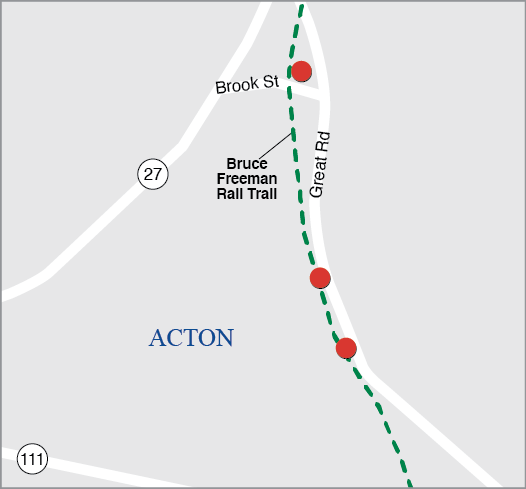
| Category |
Conn |
Coord |
Plan |
TE |
MS/DP |
FS |
Total |
|---|---|---|---|---|---|---|---|
Score |
6 out of 18 |
2 out of 15 |
9 out of 15 |
9 out of 18 |
22 out of 24 |
10 out of 10 |
58 out of 100 |
This project involves the installation of three bicycle racks at key locations along Great Road in Acton, providing parking space for 18 bicycles. These racks will help enhance connections between the adjacent Bruce Freeman Rail Trail and local businesses along Great Road while supporting greater access to open space and transit, including MBTA commuter rail service at South Acton and CrossTown Connect bus service.
| Source |
>(FFY) 2023 |
2024 |
2025 |
2026 |
2027 |
Total |
|---|---|---|---|---|---|---|
Federal Funds |
$6,414 |
--- |
--- |
--- |
--- |
$6,414 |
Non-Federal Funds |
$1,603 |
--- |
--- |
--- |
--- |
$1,603 |
Total Funds |
$8,017 |
--- |
--- |
--- |
--- |
$8,017 |
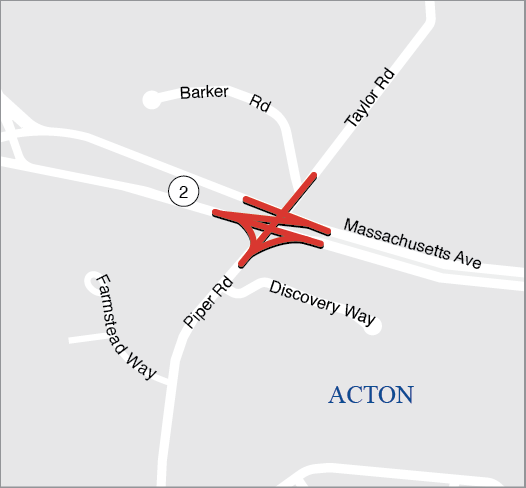
This is a MassDOT-prioritized project and is therefore not directly evaluated using the MPO’s TIP scoring criteria.
The project will make upgrades at the intersection to improve safety. The upgrades will include signs, pavement markings, and traffic signals as identified through a Road Safety Audit process in the Town of Acton.
| Source |
(FFY) 2023 |
2024 |
2025 |
2026 |
2027 |
Total |
|---|---|---|---|---|---|---|
Federal Funds |
--- |
--- |
--- |
$3,808,093 |
--- |
$3,808,093 |
Non-Federal Funds |
--- |
--- |
--- |
$423,121 |
--- |
$423,121 |
Total Funds |
--- |
--- |
--- |
$4,231,214 |
--- |
$4,231,214 |
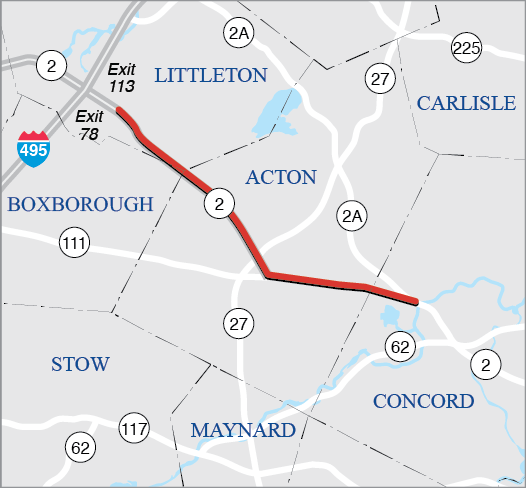
This is a MassDOT-prioritized project and is therefore not directly evaluated using the MPO’s TIP scoring criteria.
This project includes pavement preservation work on Route 2 in Acton, Boxborough, and Littleton.
| Source |
(FFY) 2023 |
2024 |
2025 |
2026 |
2027 |
Total |
|---|---|---|---|---|---|---|
Federal Funds |
--- |
--- |
$6,051,034 |
--- |
--- |
$6,051,034 |
Non-Federal Funds |
--- |
--- |
$1,512,758 |
--- |
--- |
$1,512,758 |
Total Funds |
--- |
--- |
$7,563,792 |
--- |
--- |
$7,563,792 |
-01.png)
This is a MassDOT-prioritized project and is therefore not directly evaluated using the MPO’s TIP scoring criteria.
This project will make upgrades to promote safety along the roadways surrounding Stratton Elementary School in Arlington through the Safe Routes to School program.
Source |
(FFY) 2023 |
2024 |
2025 |
2026 |
2027 |
Total |
|---|---|---|---|---|---|---|
Federal Funds |
--- |
$1,041,767 |
--- |
--- |
--- |
$1,041,767 |
Non-Federal Funds |
--- |
$260,442 |
--- |
--- |
--- |
$260,442 |
Total Funds |
--- |
$1,302,209 |
--- |
--- |
--- |
$1,302,209 |
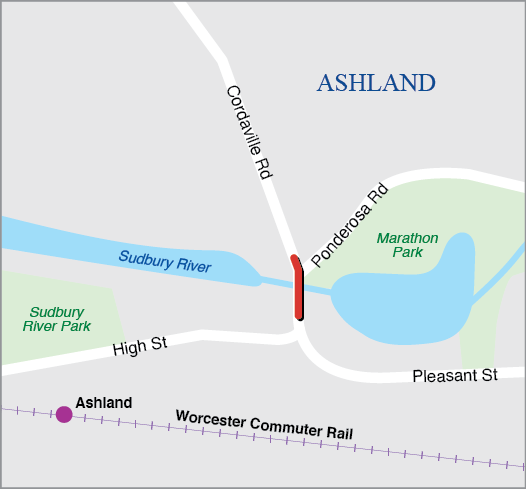
This is a MassDOT-prioritized project and is therefore not directly evaluated using the MPO’s TIP scoring criteria.
This project will replace bridge A-14-006, which carries Cordaville Road over the Sudbury River in Ashland.
| Source |
(FFY) 2023 |
2024 |
2025 |
2026 |
2027 |
Total |
|---|---|---|---|---|---|---|
Federal Funds |
--- |
--- |
--- |
$3,172,378 |
--- |
$3,172,378 |
Non-Federal Funds |
--- |
--- |
--- |
$793,094 |
--- |
$793,094 |
Total Funds |
--- |
--- |
--- |
$3,965,472 |
--- |
$3,965,472 |
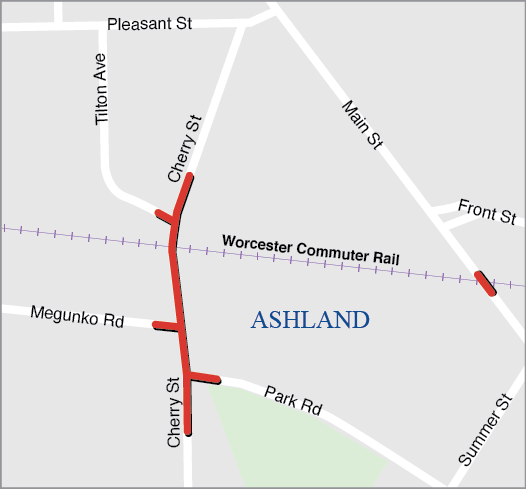
| Category |
Safety |
Sys Pres |
CM/M |
CA/SC |
TE |
EV |
Total |
|---|---|---|---|---|---|---|---|
Score |
12 out of 30 |
10 out of 29 |
5 out of 29 |
2 out of 16 |
1 out of 12 |
8 out of 18 |
38 out of 134 |
The primary purpose of the project is to improve the safety features for the roadway corridors of Cherry Street and Main Street in order to establish a Federal Railroad Administration Quiet Zone surrounding the railroad crossings on those two roadways. This goal will primarily be accomplished through the installation of roadway medians and the enhancement of existing railroad crossing signals and gates. In addition, the project addresses a critical gap in the pedestrian sidewalk network through the construction of new sidewalks. The project’s other goals include improving the existing roadway condition through pavement reconstruction and enhancing stormwater drainage in the project area.
| Source |
(FFY) 2023 |
2024 |
2025 |
2026 |
2027 |
Total |
|---|---|---|---|---|---|---|
Federal Funds |
--- |
$977,852 |
--- |
--- |
--- |
$977,852 |
Non-Federal Funds |
--- |
$244,463 |
--- |
--- |
--- |
$244,463 |
Total Funds |
--- |
$1,222,315 |
--- |
--- |
--- |
$1,222,315 |
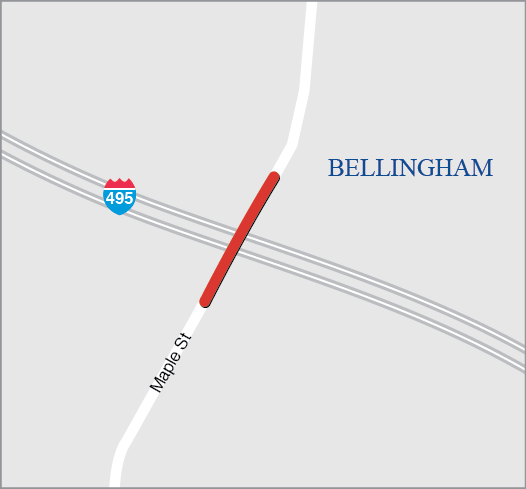
This is a MassDOT-prioritized project and is therefore not directly evaluated using the MPO’s TIP scoring criteria.
This project will replace bridge B-06-022, which carries Maple Street over the Interstate 495 in Bellingham. This bridge is currently listed as structurally deficient. This project is funded through MassDOT’s Next Generation Bridge Program.
| Source |
(FFY) 2023 |
2024 |
2025 |
2026 |
2027 |
Total |
|---|---|---|---|---|---|---|
Federal Funds |
--- |
--- |
$0 |
--- |
--- |
$0 |
Non-Federal Funds |
--- |
--- |
$14,249,535 |
--- |
--- |
$14,249,535 |
Total Funds |
--- |
--- |
$14,249,535 |
--- |
--- |
$14,249,535 |
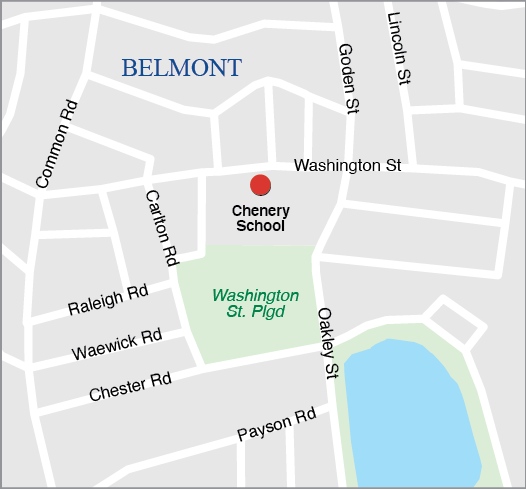
| Category |
Conn |
Coord |
Plan |
TE |
MS/DP |
FS |
Total |
|---|---|---|---|---|---|---|---|
Score |
4.75 out of 18 |
6 out of 15 |
5 out of 15 |
6 out of 18 |
18 out of 24 |
10 out of 10 |
49.75 out of 100 |
This project involves the installation of one shelter for an existing bicycle rack at Chenery Middle School in Belmont, allowing enough space for 12 bicycles to park in a covered location. The goal of the project is to promote year-round bicycling to school for students as a means of decreasing single-occupancy vehicle traffic near the school while enhancing safety. This project supports Belmont’s town-wide effort to promote walking and bicycling as an alternative to driving in order to advance progress on local climate, safety, and public health goals. This project is funded through the third round of grants available through the MPO’s Community Connections Program.
| Source |
(FFY) 2023 |
2024 |
2025 |
2026 |
2027 |
Total |
|---|---|---|---|---|---|---|
Federal Funds |
$3,501 |
--- |
--- |
--- |
--- |
$3,501 |
Non-Federal Funds |
$875 |
--- |
--- |
--- |
--- |
$875 |
Total Funds |
$4,376 |
--- |
--- |
--- |
--- |
$4,376 |
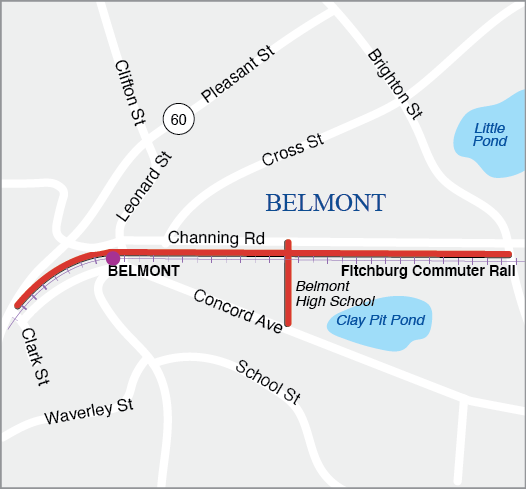
| Category |
Safety |
Sys Pres |
CM/M |
CA/SC |
TE |
EV |
Total |
|---|---|---|---|---|---|---|---|
Score |
15 out of 20 |
8 out of 14 |
18 out of 18 |
7 out of 14 |
7.6 out of 20 |
9 out of 14 |
64.6 out of 100 |
This project will construct the Belmont Community Path between the existing Fitchburg Cutoff Path and Belmont Center, creating a direct off-street connection between the heart of Belmont, the Alewife MBTA station, and destinations beyond in Cambridge, Somerville, and Boston. The project proposes a 12-foot paved facility with two-foot grass shoulders and additional landscaping along the length of the path that will buffer the new facility from the adjacent railroad tracks and neighboring properties. The project includes an underpass beneath the commuter rail tracks at Channing Road and Alexander Avenue to provide a safe connection between the Winnbrook neighborhood that lies on the north side of the tracks with the bike lanes on Concord Avenue and the adjacent new school serving students in grades 7-12.
| Source |
(FFY) 2023 |
2024 |
2025 |
2026 |
2027 |
Total |
|---|---|---|---|---|---|---|
Federal Funds |
--- |
--- |
--- |
$16,827,506 |
--- |
$16,827,506 |
Non-Federal Funds |
--- |
--- |
--- |
$4,206,876 |
--- |
$4,206,876 |
Total Funds |
--- |
--- |
--- |
$21,034,382 |
--- |
$21,034,382 |
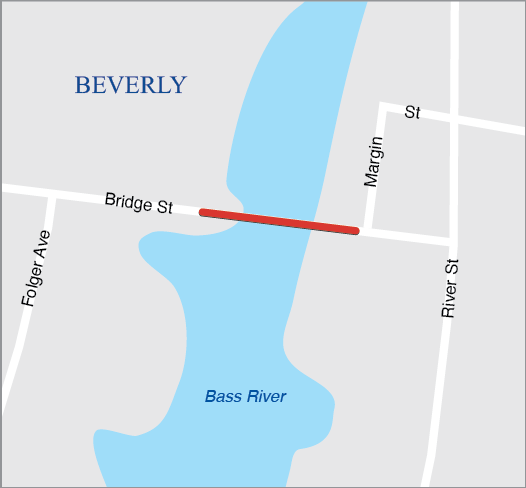
This is a MassDOT-prioritized project and is therefore not directly evaluated using the MPO’s TIP scoring criteria.
This project will replace bridge B-11-001, which carries Bridge Street over the Bass River in Beverly. This bridge is also known as the Hall-Whitaker Drawbridge. This bridge is currently listed as structurally deficient and has load restrictions. This project is funded through MassDOT’s Next Generation Bridge Program.
| Source |
(FFY) 2023 |
2024 |
2025 |
2026 |
2027 |
Total |
|---|---|---|---|---|---|---|
Federal Funds |
--- |
--- |
--- |
--- |
$0 |
$0 |
Non-Federal Funds |
--- |
--- |
--- |
--- |
$40,020,000 |
$40,020,000 |
Total Funds |
--- |
--- |
--- |
--- |
$40,020,000 |
$40,020,000 |
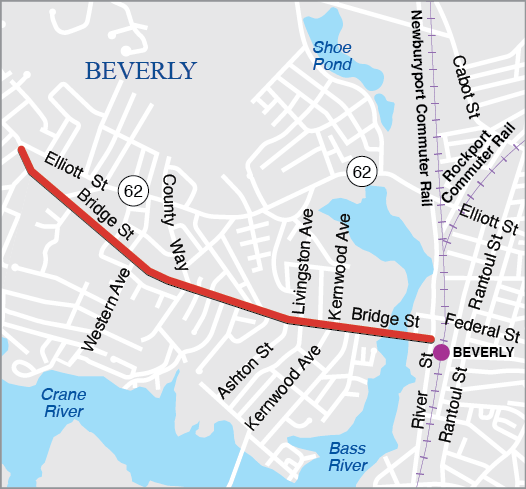
| Category |
Safety |
Sys Pres |
CM/M |
CA/SC |
TE |
EV |
Total |
|---|---|---|---|---|---|---|---|
Score |
13 out of 30 |
14 out of 29 |
16 out of 29 |
9 out of 16 |
4 out of 12 |
10 out of 18 |
66 out of 134 |
The project involves reconstruction of pavement and sidewalks along the Bridge Street corridor from the Danvers town line to River Street, excluding the Hall Whitaker drawbridge. The project includes cross section improvements to accommodate on-street parking and on-street bicycle accommodations. Existing traffic signal equipment at the intersection of Bridge Street at Livingstone Avenue will be upgraded, and new traffic signals will be installed at the intersection of Bridge Street with Kernwood Avenue and the intersection of Bridge Street with River Street. Continuous cement concrete sidewalks with vertical granite curb will be provided along both sides of the roadway for the full length of the project. A seven-foot wide parking shoulder will be provided on the eastbound side of the roadway to prevent vehicles from parking on the sidewalk. In addition, a five-foot wide shoulder for a bicycle lane will be provided along the corridor. Minor realignments will be performed at the intersections of Bridge Street with Cressy Street, County Way/Bates Park Avenue, and Eastern Avenue/Dolloff Avenue.
| Source |
(FFY) 2023 |
2024 |
2025 |
2026 |
2027 |
Total |
|---|---|---|---|---|---|---|
Federal Funds |
$10,075,946 |
--- |
--- |
--- |
--- |
$10,075,946 |
Non-Federal Funds |
$2,518,986 |
--- |
--- |
--- |
--- |
$2,518,986 |
Total Funds |
$12,594,932 |
--- |
--- |
--- |
--- |
$12,594,932 |
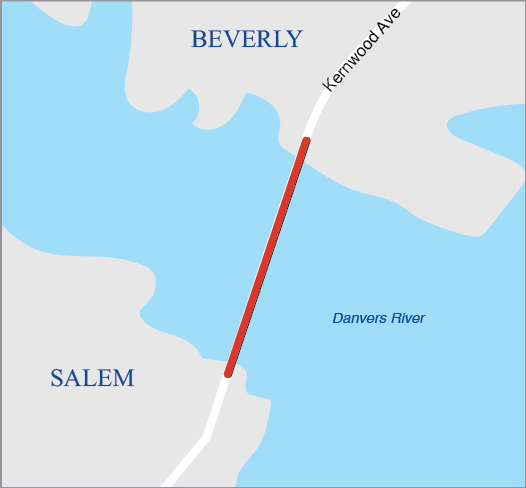
This is a MassDOT-prioritized project and is therefore not directly evaluated using the MPO’s TIP scoring criteria.
This project will rehabilitate or replace bridge B-11-005=S-01-013, which carries Kernwood Avenue over the Danvers River between Beverly and Salem. A preliminary study will determine whether this bridge should be replaced or rehabilitated. If a replacement is pursued, then three options will be explored: a fixed high-span bridge; replacement of only the approach timber spans; and a complete bridge replacement with a movable span and fixed-approach spans. This bridge is currently listed as structurally deficient and has load restrictions. This project is funded through MassDOT’s Next Generation Bridge Program.
| Source |
(FFY) 2023 |
2024 |
2025 |
2026 |
2027 |
Total |
|---|---|---|---|---|---|---|
Federal Funds |
--- |
--- |
--- |
--- |
$0 |
$0 |
Non-Federal Funds |
--- |
--- |
--- |
--- |
$95,383,436 |
$95,383,436 |
Total Funds |
--- |
--- |
--- |
--- |
$95,383,436 |
$95,383,436 |
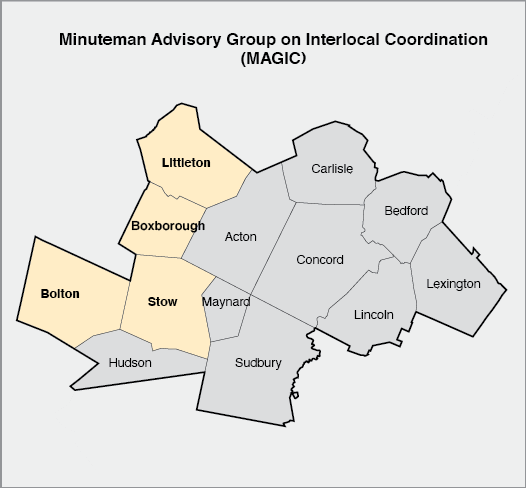
| Category |
Conn |
Coord |
Plan |
TE |
MS/DP |
FS |
Total |
|---|---|---|---|---|---|---|---|
Score |
7 out of 18 |
15 out of 15 |
3 out of 15 |
6 out of 18 |
16 out of 24 |
10 out of 10 |
57 out of 100 |
This project will establish an on-demand microtransit service for the towns of Bolton, Boxborough, Littleton, and Stow, to be operated by the Montachusett Regional Transit Authority (MART). The primary goals of the project are to connect residents to employment centers and activity hubs in the region while providing a low-cost transportation alternative to single-occupancy vehicles. The service will utilize MART’s existing vehicle fleet and will allow riders to book trips through a mobile app. This project is funded through the third round of grants available through the MPO’s Community Connections Program.
| Source |
(FFY) 2023 |
2024 |
2025 |
2026 |
2027 |
Total |
|---|---|---|---|---|---|---|
Federal Funds |
$383,253 |
$344,283 |
$325,313 |
--- |
--- |
$1,052,849 |
Non-Federal Funds |
$95,813 |
$86,071 |
$81,328 |
--- |
--- |
$263,212 |
Total Funds |
$479,066 |
$430,354 |
$406,641 |
--- |
--- |
$1,316,061 |
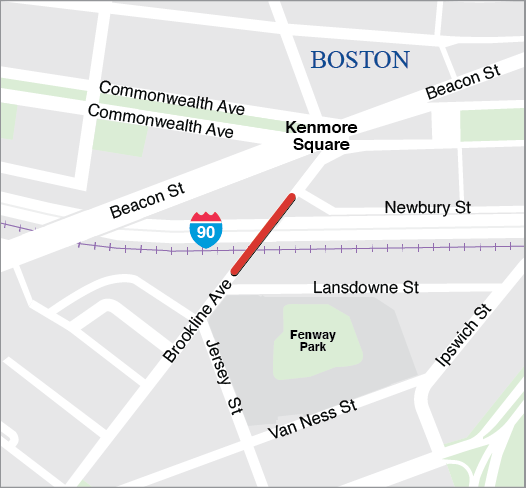
This is a MassDOT-prioritized project and is therefore not directly evaluated using the MPO’s TIP scoring criteria.
This project will rehabilitate bridge B-16-053 (4T3), which carries Brookline Avenue over Interstate 90 and the MBTA Framingham/Worcester commuter rail line in Boston. This bridge is also known as the David Ortiz “Big Papi” Bridge.
| Source |
(FFY) 2023 |
2024 |
2025 |
2026 |
2027 |
Total |
|---|---|---|---|---|---|---|
Federal Funds |
$600,000 |
--- |
--- |
--- |
--- |
$600,000 |
Non-Federal Funds |
$150,000 |
--- |
--- |
--- |
--- |
$150,000 |
Total Funds |
$750,000 |
--- |
--- |
--- |
--- |
$750,000 |
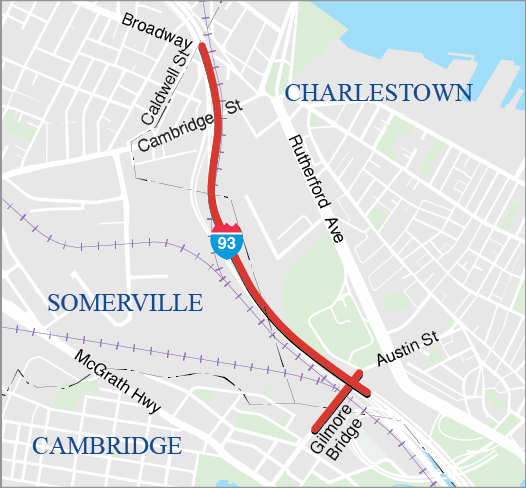
This is a MassDOT-prioritized project and is therefore not directly evaluated using the MPO’s TIP scoring criteria.
This project will rehabilitate bridge B-16-179, which carries Austin Street over and under Interstate 93 in Boston, and bridge B-16-281, which carries Interstate 93 over the MBTA Orange Line near Sullivan Square in Boston.
| Source |
(FFY) 2023 |
2024 |
2025 |
2026 |
2027 |
Total |
|---|---|---|---|---|---|---|
Federal Funds |
$2,800,320 |
--- |
--- |
--- |
--- |
$2,800,320 |
Non-Federal Funds |
$700,080 |
--- |
--- |
--- |
--- |
$700,080 |
Total Funds |
$3,500,400 |
--- |
--- |
--- |
--- |
$3,500,400 |
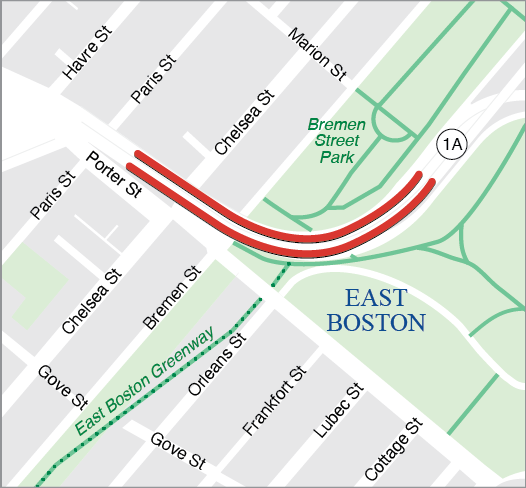
This is a MassDOT-prioritized project and is therefore not directly evaluated using the MPO’s TIP scoring criteria.
This project will rehabilitate bridge B-16-235 (39T and 3A0), which carries Route 1A over Chelsea Street, Bremen Street, and the MBTA Blue Line in East Boston,
| Source |
(FFY) 2023 |
2024 |
2025 |
2026 |
2027 |
Total |
|---|---|---|---|---|---|---|
Federal Funds |
$2,400,000 |
--- |
--- |
--- |
--- |
$2,400,000 |
Non-Federal Funds |
$600,000 |
--- |
--- |
--- |
--- |
$600,000 |
Total Funds |
$3,000,000 |
--- |
--- |
--- |
--- |
$3,000,000 |
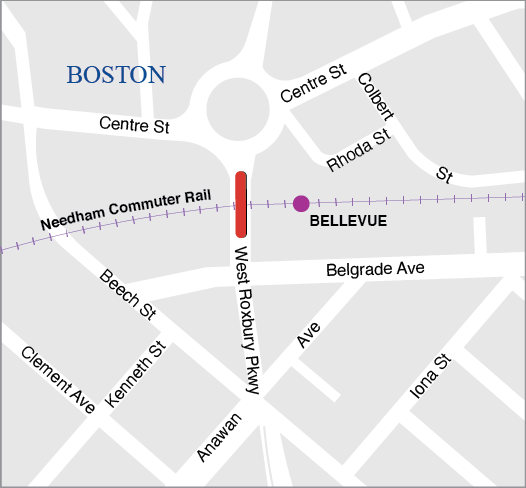
This is a MassDOT-prioritized project and is therefore not directly evaluated using the MPO’s TIP scoring criteria.
This project will involve the reconstruction of bridge B-16-181, which carries West Roxbury Parkway over the MBTA Needham commuter rail line.
| Source |
(FFY) 2023 |
2024 |
2025 |
2026 |
2027 |
Total |
|---|---|---|---|---|---|---|
Federal Funds |
$5,110,992 |
--- |
--- |
--- |
--- |
$5,110,992 |
Non-Federal Funds |
$1,277,748 |
--- |
--- |
--- |
--- |
$1,277,748 |
Total Funds |
$6,388,740 |
--- |
--- |
--- |
--- |
$6,388,740 |
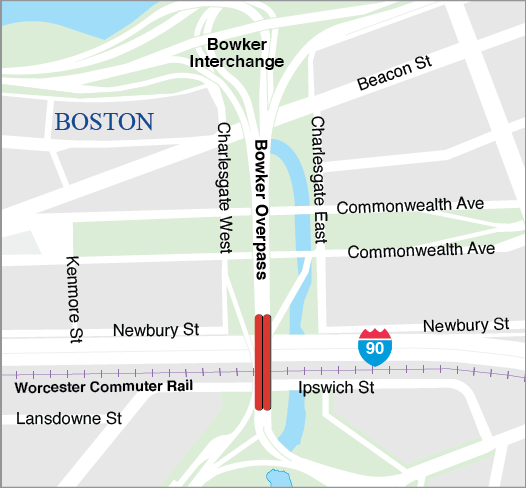
This is a MassDOT-prioritized project and is therefore not directly evaluated using the MPO’s TIP scoring criteria.
This project will rehabilitate bridge B-16-052, which carries the Bowker Overpass over Interstate 90, Ipswich Street, and the MBTA Framingham/Worcester commuter rail line in Boston. This bridge is currently listed as structurally deficient. The project will also include rehabilitation of the adjacent ramps. This project is funded through MassDOT’s Next Generation Bridge Program.
| Source |
(FFY) 2023 |
2024 |
2025 |
2026 |
2027 |
Total |
|---|---|---|---|---|---|---|
Federal Funds |
--- |
$0 |
--- |
--- |
--- |
$0 |
Non-Federal Funds |
--- |
$49,450,000 |
--- |
--- |
--- |
$49,450,000 |
Total Funds |
--- |
$49,450,000 |
--- |
--- |
--- |
$49,450,000 |
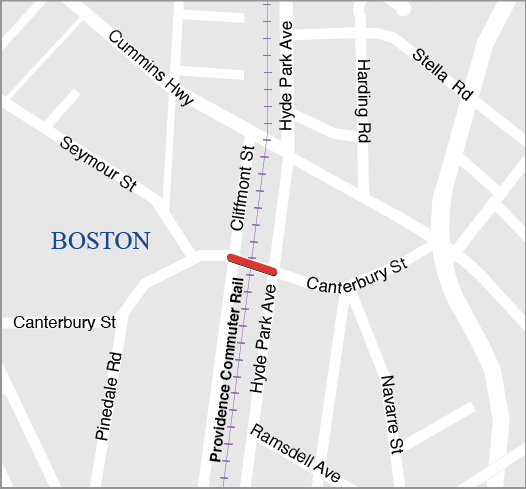
This is a MassDOT-prioritized project and is therefore not directly evaluated using the MPO’s TIP scoring criteria.
This project will replace the superstructure of bridge B-16-107, which carries Canterbury Street over the Amtrak/MBTA tracks.
| Source |
(FFY) 2023 |
2024 |
2025 |
2026 |
2027 |
Total |
|---|---|---|---|---|---|---|
Federal Funds |
--- |
$3,603,941 |
--- |
--- |
--- |
$3,603,941 |
Non-Federal Funds |
--- |
$900,985 |
--- |
--- |
--- |
$900,985 |
Total Funds |
--- |
$4,504,926 |
--- |
--- |
--- |
$4,504,926 |
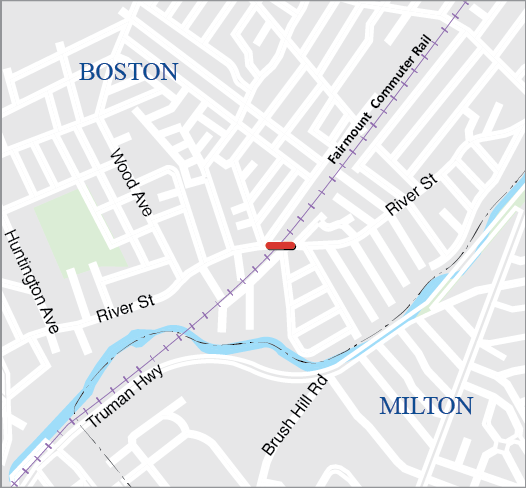
This is a MassDOT-prioritized project and is therefore not directly evaluated using the MPO’s TIP scoring criteria.
This project will rehabilitate bridge B-16-109, which carries River Street the MBTA Franklin and Providence/Stoughton commuter rail line in Boston. This bridge is currently listed as structurally deficient and has posted load restrictions. This project is funded through MassDOT’s Next Generation Bridge Program.
| Source |
(FFY) 2023 |
2024 |
2025 |
2026 |
2027 |
Total |
|---|---|---|---|---|---|---|
Federal Funds |
--- |
$0 |
--- |
--- |
--- |
$0 |
Non-Federal Funds |
--- |
$11,732,339 |
--- |
--- |
--- |
$11,732,339 |
Total Funds |
--- |
$11,732,339 |
--- |
--- |
--- |
$11,732,339 |
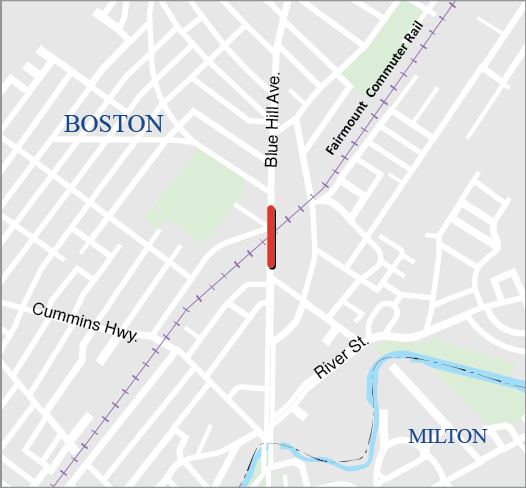
This is a MassDOT-prioritized project and is therefore not directly evaluated using the MPO’s TIP scoring criteria.
This project will replace bridge B-16-165, which carries Blue Hill Avenue over the MBTA Fairmount and Franklin commuter rail lines in Boston.
| Source |
(FFY) 2023 |
2024 |
2025 |
2026 |
2027 |
Total |
|---|---|---|---|---|---|---|
Federal Funds |
--- |
--- |
--- |
--- |
$28,806,148 |
$28,806,148 |
Non-Federal Funds |
--- |
--- |
--- |
--- |
$7,201,537 |
$7,201,537 |
Total Funds |
--- |
--- |
--- |
--- |
$36,007,685 |
$36,007,685 |
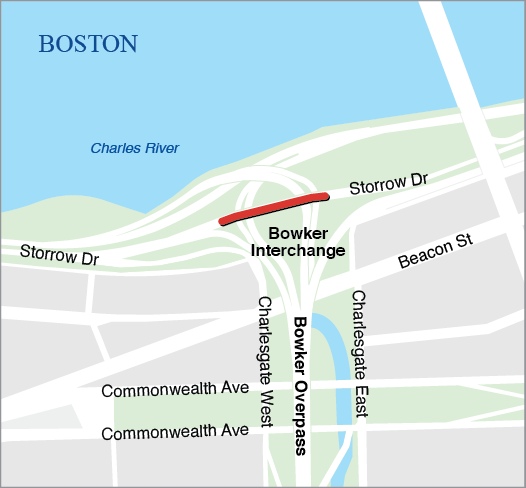
This is a MassDOT-prioritized project and is therefore not directly evaluated using the MPO’s TIP scoring criteria.
This project will replace bridge B-16-365, which carries Storrow Drive over the Bowker Ramps and Muddy River in Boston. This bridge is currently listed as structurally deficient and has posted vehicle weight restrictions due to its poor condition.
| Source |
(FFY) 2023 |
2024 |
2025 |
2026 |
2027 |
Total |
|---|---|---|---|---|---|---|
Federal Funds |
--- |
--- |
--- |
--- |
$92,846,400 |
$92,846,400 |
Non-Federal Funds |
--- |
--- |
--- |
--- |
$23,211,600 |
$23,211,600 |
Total Funds |
--- |
--- |
--- |
--- |
$116,058,000 |
$116,058,000 |
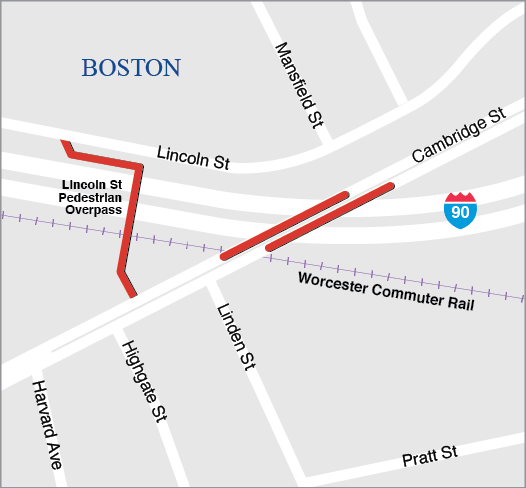
This is a MassDOT-prioritized project and is therefore not directly evaluated using the MPO’s TIP scoring criteria.
This project will replace bridge B-16-056, which carries Cambridge Street over Interstate 90 and the MBTA Framingham/Worcester commuter rail line in Boston. This project will also rehabilitate nearby bridge B-16-057, the Lincoln Street Pedestrian Overpass, which also runs over Interstate 90 and the MBTA commuter rail line. The Cambridge Street bridge is listed as structurally deficient and features partially limited pedestrian access due to its deteriorated condition.
| Source |
(FFY) 2023 |
2024 |
2025 |
2026 |
2027 |
Total |
|---|---|---|---|---|---|---|
Federal Funds |
$23,516,353 |
--- |
--- |
--- |
--- |
$23,516,353 |
Non-Federal Funds |
$5,879,088 |
--- |
--- |
--- |
--- |
$5,879,088 |
Total Funds |
$29,395,441 |
--- |
--- |
--- |
--- |
$29,395,441 |
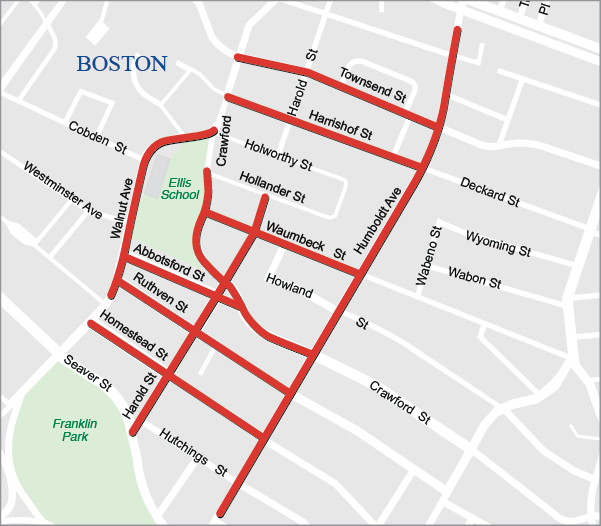
This is a MassDOT-prioritized project and is therefore not directly evaluated using the MPO’s TIP scoring criteria.
This project will make upgrades to promote safety along the roadways surrounding Ellis Elementary School in Boston through the Safe Routes to School program. The project proposes traffic-calming measures throughout the project area, including speed humps and curb extensions at several locations. Along Humboldt Avenue, the project proposes signal timing adjustments, the addition of bicycle lanes, and the installation of bus bulbs and a crosswalk at the intersection of Humboldt Avenue and Monroe Street. Raised intersection treatments are also proposed at three locations along Walnut Avenue.
| Source |
(FFY) 2023 |
2024 |
2025 |
2026 |
2027 |
Total |
|---|---|---|---|---|---|---|
Federal Funds |
--- |
$1,888,974 |
--- |
--- |
--- |
$1,888,974 |
Non-Federal Funds |
--- |
$472,244 |
--- |
--- |
--- |
$472,244 |
Total Funds |
--- |
$2,361,218 |
--- |
--- |
--- |
$2,361,218 |
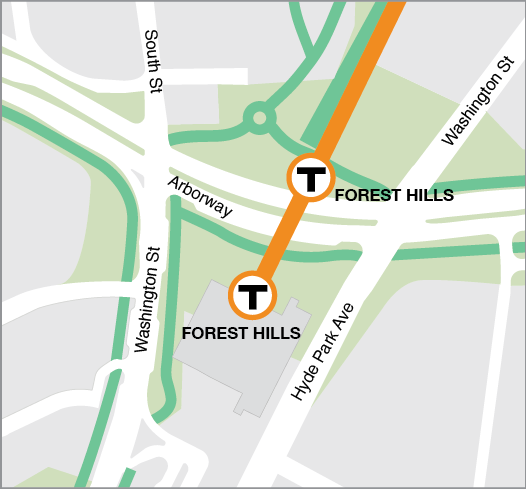
This project was selected for funding by the MPO late in the FFYs 2023–27 TIP development cycle, so it has not yet been scored using the MPO’s project selection criteria. This section will be updated with the project’s final score when it is available.
This project will make a range of improvements to the MBTA Orange Line and commuter rail station in at Forest Hills in Boston, addressing existing accessibility issues within the station. The project will construct one new elevator and replace three existing elevators. Additional accessibility improvements include the installation of ADA-compliant ramps, repairs to the pedestrian path of travel, and the construction of accessible restrooms. This project also includes upgrades to life-safety infrastructure, wayfinding, signage, and the station roof. This project is partially funded by the MPO in FFY 2024, with the MBTA seeking other sources of funding to supplement the MPO’s contribution.
| Source |
(FFY) 2023 |
2024 |
2025 |
2026 |
2027 |
Total |
|---|---|---|---|---|---|---|
Federal Funds |
--- |
$5,120,000 |
--- |
--- |
--- |
$5,120,000 |
Non-Federal Funds |
--- |
$1,280,000 |
--- |
--- |
--- |
$1,280,000 |
Total Funds |
--- |
$6,400,000 |
--- |
--- |
--- |
$6,400,000 |
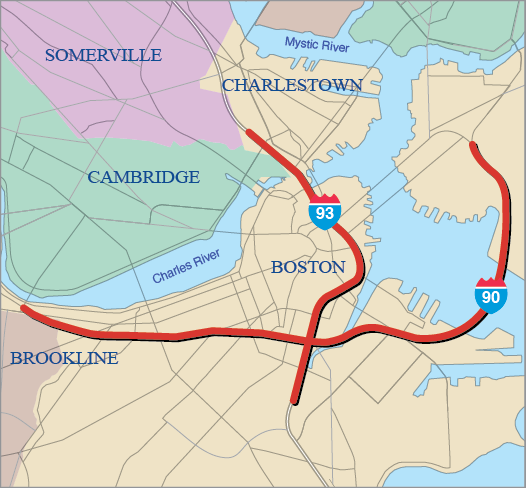
This is a MassDOT-prioritized project and is therefore not directly evaluated using the MPO’s TIP scoring criteria.
This project involves the replacement of guide and traffic signs on Interstate 93 and Interstate 90 within the Central Artery/Tunnel system, including applicable signing on intersecting secondary roadways. The project covers approximately six miles along Interstate 90 (mile markers 132 to 138) and five miles along Interstate 93 (mile markers 15 to 20). The project area includes the Ted Williams Tunnel from the Interstate 90 terminus in East Boston westbound to the Brookline/Boston city line east of St. Mary’s Street. The project area along Interstate 93 runs between Southhampton Street north to the Mystic Avenue off ramp.
| Source |
(FFY) 2023 |
2024 |
2025 |
2026 |
2027 |
Total |
|---|---|---|---|---|---|---|
Federal Funds |
--- |
--- |
--- |
$2,262,154 |
--- |
$2,262,154 |
Non-Federal Funds |
--- |
--- |
--- |
$251,350 |
--- |
$251,350 |
Total Funds |
--- |
--- |
--- |
$2,513,504 |
--- |
$2,513,504 |
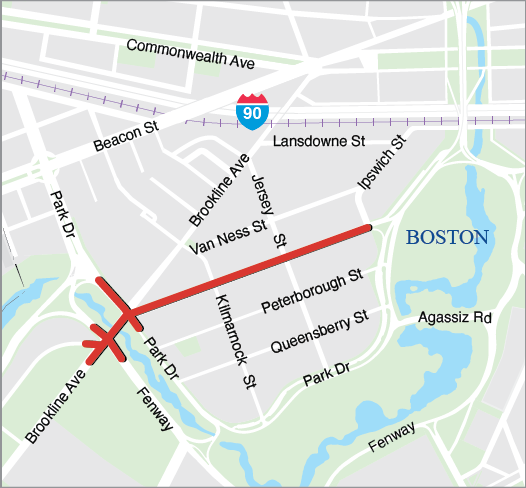
| Category |
Safety |
Sys Pres |
CM/M |
CA/SC |
TE |
EV |
Total |
|---|---|---|---|---|---|---|---|
Score |
7 out of 30 |
6 out of 29 |
15 out of 29 |
12 out of 16 |
8 out of 12 |
12 out of 18 |
60 out of 134 |
This roadway improvement project will enhance pedestrian mobility and safety by providing neck downs at intersections. In addition, exclusive bike lanes in both directions will be established along Boylston Street to encourage local and regional bicycle travel. The project also involves an upgrade of the existing geometric layout and old signal equipment to reduce vehicular congestion and increase overall safety.
| Source |
(FFY) 2023 |
2024 |
2025 |
2026 |
2027 |
Total |
|---|---|---|---|---|---|---|
Federal Funds |
--- |
$6,932,042 |
--- |
--- |
--- |
$6,932,042 |
Non-Federal Funds |
--- |
$1,733,010 |
--- |
--- |
--- |
$1,733,010 |
Total Funds |
--- |
$8,665,052 |
--- |
--- |
--- |
$8,665,052 |
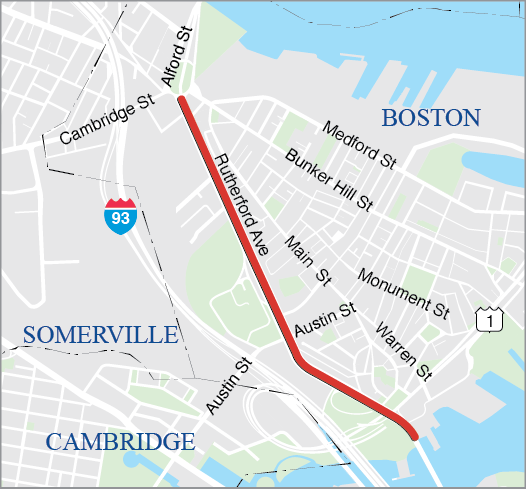
This project is funded using Regional Target funds, but was not scored using the MPO’s TIP project selection criteria. The project was evaluated through the MPO’s Long-Range Transportation Plan process.
The reconstruction of Rutherford Avenue from City Square to Sullivan Square will make the road a multimodal urban boulevard corridor. This project will be funded over five years, starting in FFY 2025. The total project cost is estimated to be $190,696,612, and the total funding in the FFYs 2023-27 TIP is $99,783,959. The City of Boston will contribute $25,000,000 in local funding towards the project, leaving the MPO with a balance of $65,912,653 to be funded in FFYs 2028 and 2029.
| Source |
(FFY) 2023 |
2024 |
2025 |
2026 |
2027 |
Total |
|---|---|---|---|---|---|---|
Federal Funds |
--- |
|
$26,227,167 |
$26,800,000 |
$26,800,000 |
$79,827,167 |
Non-Federal Funds |
--- |
|
$6,556,792 |
$6,700,000 |
$6,700,000 |
$19,956,792 |
Total Funds |
--- |
|
$32,783,959 |
$33,500,000 |
$33,500,000 |
$99,783,959 |
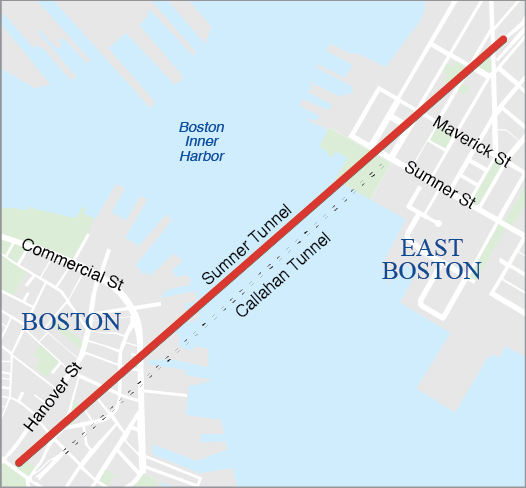
This is a MassDOT-prioritized project and is therefore not directly evaluated using the MPO’s TIP scoring criteria.
This project aims to repair the existing deterioration in Sumner Tunnel by reconstructing the roadway pavement and repairing cracking and corrosion on the tunnel’s walls and ceiling. The total cost of this project is $136,722,750, with $22,115,687 in Regional Target funding allocated to the project. The rest of the project cost is funded using statewide highway funds. This project is funded over three years (FFYs 2021-23), with $119,852,949 in funding allocated in FFYs 2021 and 2022. The remainder of the project’s funding is included in this TIP as shown below.
| Source |
2023 |
2024 |
2025 |
2026 |
2027 |
Total |
|---|---|---|---|---|---|---|
Federal Funds |
$13,495,840 |
--- |
--- |
--- |
--- |
$13,495,840 |
Non-Federal Funds |
$3,373,961 |
--- |
--- |
--- |
--- |
$3,373,961 |
Total Funds |
$16,869,801 |
--- |
--- |
--- |
--- |
$16,869,801 |
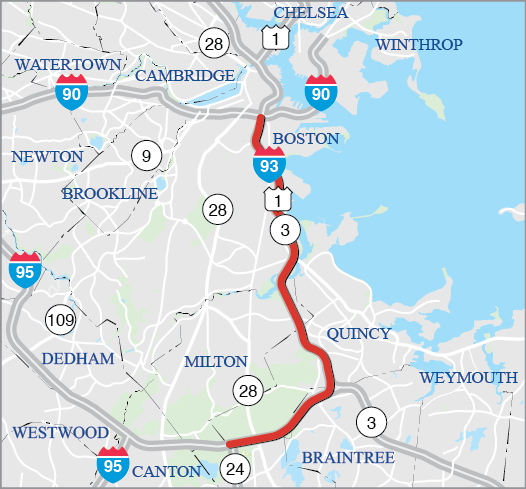
This is a MassDOT-prioritized project and is therefore not directly evaluated using the MPO’s TIP scoring criteria.
The project is an interstate maintenance resurfacing project on the Southeast Expressway. A preservation treatment or thin-bonded overlay is proposed to extend the pavement service life and improve safety.
| Source |
(FFY) 2023 |
2024 |
2025 |
2026 |
2027 |
Total |
|---|---|---|---|---|---|---|
Federal Funds |
$34,114,215 |
--- |
--- |
--- |
--- |
$34,114,215 |
Non-Federal Funds |
$4,557,135 |
--- |
--- |
--- |
--- |
$4,557,135 |
Total Funds |
$38,671,350 |
--- |
--- |
--- |
--- |
$38,671,350 |
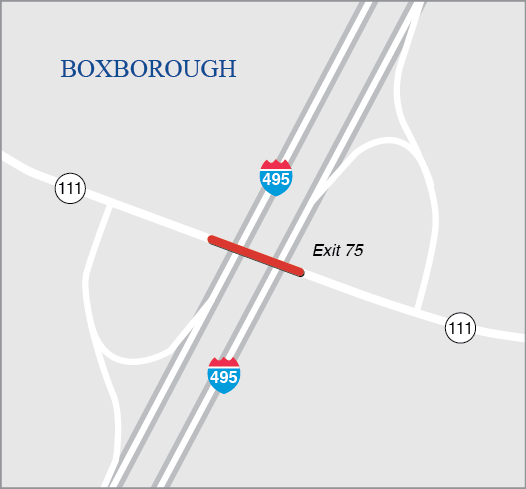
This is a MassDOT-prioritized project and is therefore not directly evaluated using the MPO’s TIP scoring criteria.
This project will replace bridge B-18-002, which carries Route 111 over Interstate 495 in Boxborough. This bridge is currently listed as structurally deficient.
| Source |
(FFY) 2023 |
2024 |
2025 |
2026 |
2027 |
Total |
|---|---|---|---|---|---|---|
Federal Funds |
$10,210,714 |
--- |
--- |
--- |
--- |
$10,210,714 |
Non-Federal Funds |
$2,552,678 |
--- |
--- |
--- |
--- |
$2,552,678 |
Total Funds |
$12,763,392 |
--- |
--- |
--- |
--- |
$12,763,392 |
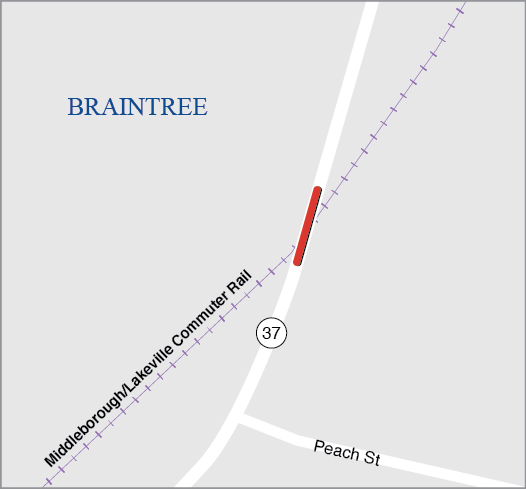
This is a MassDOT-prioritized project and is therefore not directly evaluated using the MPO’s TIP scoring criteria.
This project will replace bridge B-21-017, which carries Washington Street over the MBTA Kingston and Middleborough/Lakeville commuter rail lines in Braintree. This bridge is currently listed as structurally deficient. This project is funded through MassDOT’s Next Generation Bridge Program.
| Source |
(FFY) 2023 |
2024 |
2025 |
2026 |
2027 |
Total |
|---|---|---|---|---|---|---|
Federal Funds |
--- |
--- |
$0 |
--- |
--- |
$0 |
Non-Federal Funds |
--- |
--- |
$7,681,489 |
--- |
--- |
$7,681,489 |
Total Funds |
--- |
--- |
$7,681,489 |
--- |
--- |
$7,681,489 |
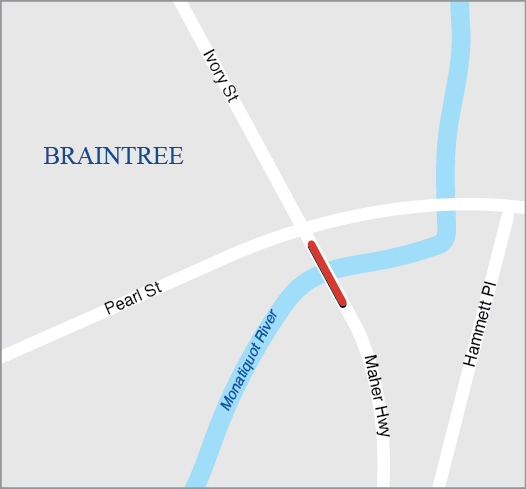
This is a MassDOT-prioritized project and is therefore not directly evaluated using the MPO’s TIP scoring criteria.
This project will replace bridge B-21-067, which carries JW Maher Highway over the Monatiquot River in Braintree. This bridge is currently listed as structurally deficient. This project is funded through MassDOT’s Next Generation Bridge Program.
| Source |
(FFY) 2023 |
2024 |
2025 |
2026 |
2027 |
Total |
|---|---|---|---|---|---|---|
Federal Funds |
--- |
--- |
$0 |
--- |
--- |
$0 |
Non-Federal Funds |
--- |
--- |
$11,867,518 |
--- |
--- |
$11,867,518 |
Total Funds |
--- |
--- |
$11,867,518 |
--- |
--- |
$11,867,518 |
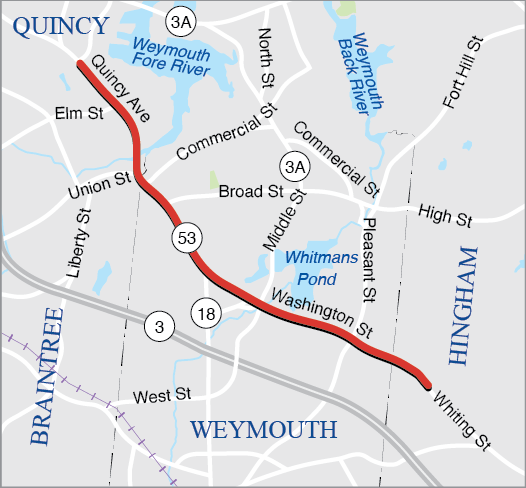
This is a MassDOT-prioritized project and is therefore not directly evaluated using the MPO’s TIP scoring criteria.
This project involves resurfacing and related work on Route 53.
| Source |
(FFY) 2023 |
2024 |
2025 |
2026 |
2027 |
Total |
|---|---|---|---|---|---|---|
Federal Funds |
--- |
$4,800,418 |
--- |
--- |
--- |
$4,800,418 |
Non-Federal Funds |
--- |
$1,200,104 |
--- |
--- |
--- |
$1,200,104 |
Total Funds |
--- |
$6,000,522 |
--- |
--- |
--- |
$6,000,522 |
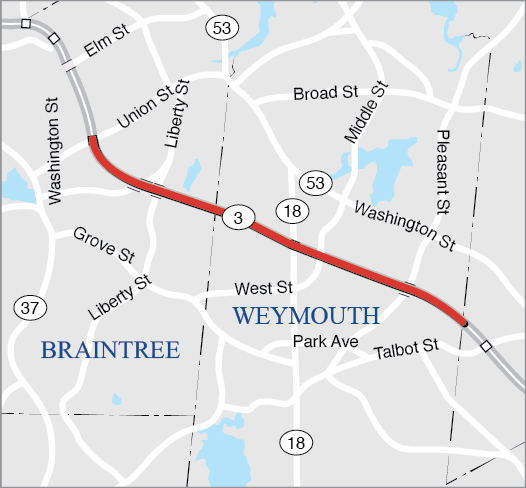
This is a MassDOT-prioritized project and is therefore not directly evaluated using the MPO’s TIP scoring criteria.
This project includes resurfacing and related work on Route 3 in Braintree and Weymouth. The project’s extents run from mile marker 37.7 to mile marker 41.8 for a total of 4.1 miles, or from the Weymouth/Hingham town line to Union Street in Braintree.
| Source |
(FFY) 2023 |
2024 |
2025 |
2026 |
2027 |
Total |
|---|---|---|---|---|---|---|
Federal Funds |
--- |
--- |
--- |
$6,867,616 |
--- |
$6,867,616 |
Non-Federal Funds |
--- |
--- |
--- |
$1,716,904 |
--- |
$1,716,904 |
Total Funds |
--- |
--- |
--- |
$8,584,520 |
--- |
$8,584,520 |
-01.png)
This is a MassDOT-prioritized project and is therefore not directly evaluated using the MPO’s TIP scoring criteria.
This project will make upgrades to promote safety along the roadways surrounding William H. Lincoln School in Brookline through the Safe Routes to School program. The Project will improve pedestrian and bicycle safety and access improvements on the one-way portion of Chestnut Street, including the installation of a two-way protected bike lane, new sidewalks, new ADA-compliant wheelchair ramps, related pavement markings, and signage. On Kennard Road, the project will construct a new raised intersection, crosswalks, ADA-compliant wheelchair ramps, related pavement markings, and signage at the school driveway to reduce motor vehicle speed and improve pedestrian safety and access.
| Source |
(FFY) 2023 |
2024 |
2025 |
2026 |
2027 |
Total |
|---|---|---|---|---|---|---|
Federal Funds |
--- |
--- |
$1,044,658 |
--- |
--- |
$1,044,658 |
Non-Federal Funds |
--- |
--- |
$261,165 |
--- |
--- |
$261,165 |
Total Funds |
--- |
--- |
$1,305,823 |
--- |
--- |
$1,305,823 |
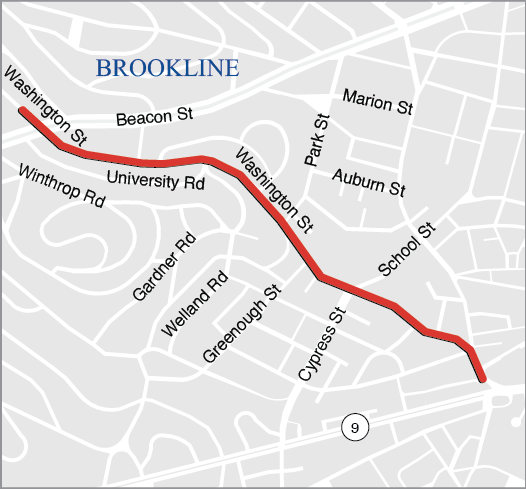
| Category |
Safety |
Sys Pres |
CM/M |
CA/SC |
TE |
EV |
Total |
|---|---|---|---|---|---|---|---|
Score |
14 out of 18 |
13 out of 20 |
11 out of 18 |
7 out of 12 |
7.4 out of 20 |
10 out of 12 |
62.4 out of 100 |
This project will reconstruct Washington Street in Brookline between Boylston Street and Beacon Street. Washington Street is currently constrained, with a narrow right of way that accommodates two lanes of traffic, on-street parking in both directions, bicycling, and significant volumes of pedestrians. Sidewalks are currently in poor condition, and the area contains two HSIP bicycle crash clusters and one pedestrian crash cluster. The project will reconstruct sidewalks along both sides of the entire corridor and will provide protected bicycle facilities in both directions that are separated from vehicular traffic for a vast majority of the corridor. Other multimodal improvements include the provision of dedicated bus pull-out space outside of the travel lanes. The project will also replace the existing signals along Washington Street’s length and will reconstruct the roadway surface.
| Source |
(FFY) 2023 |
2024 |
2025 |
2026 |
2027 |
Total |
|---|---|---|---|---|---|---|
Federal Funds |
--- |
--- |
--- |
--- |
$24,524,650 |
$24,524,650 |
Non-Federal Funds |
--- |
--- |
--- |
--- |
$5.506,162 |
$5.506,162 |
Total Funds |
--- |
--- |
--- |
--- |
$30,030,812 |
$30,030,812 |
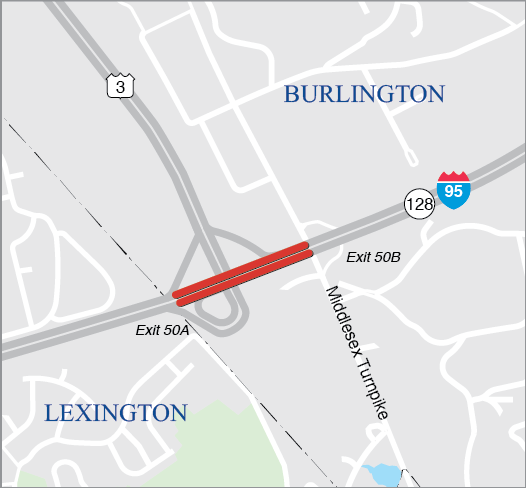
This is a MassDOT-prioritized project and is therefore not directly evaluated using the MPO’s TIP scoring criteria.
This project will make improvements to the interchange at Interstate 95 (Route 128) and Route 3 in Burlington.
| Source |
(FFY) 2023 |
2024 |
2025 |
2026 |
2027 |
Total |
|---|---|---|---|---|---|---|
Federal Funds |
--- |
$2,497,248 |
--- |
--- |
--- |
$2,497,248 |
Non-Federal Funds |
--- |
$624,312 |
--- |
--- |
--- |
$624,312 |
Total Funds |
--- |
$3,121,560 |
--- |
--- |
--- |
$3,121,560 |
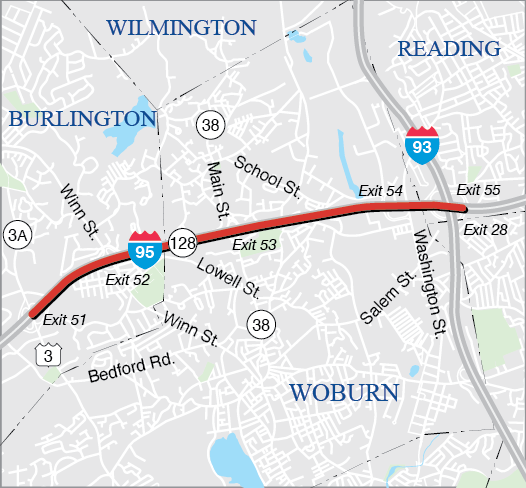
This is a MassDOT-prioritized project and is therefore not directly evaluated using the MPO’s TIP scoring criteria.
This project is a pavement maintenance project that will repave 4.1 miles of Interstate 95 northbound and southbound between the Cambridge Street interchange in Burlington and the Interstate 93 interchange in Woburn.
| Source |
(FFY) 2022 |
2023 |
2024 |
2025 |
2026 |
Total |
|---|---|---|---|---|---|---|
Federal Funds |
--- |
--- |
$11,652,918 |
--- |
--- |
$11,652,918 |
Non-Federal Funds |
--- |
--- |
$1,294,769 |
--- |
--- |
$1,294,769 |
Total Funds |
--- |
--- |
$12,947,687 |
--- |
--- |
$12,947,687 |
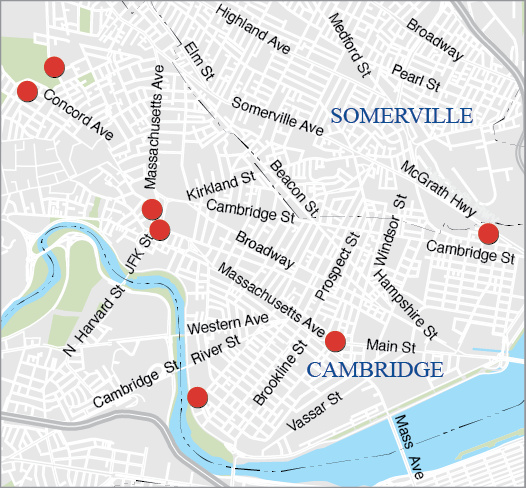
| Category |
Conn |
Coord |
Plan |
TE |
MS/DP |
FS |
Total |
|---|---|---|---|---|---|---|---|
Score |
18 out of 18 |
4.5 out of 15 |
12.5 out of 15 |
9 out of 18 |
24 out of 24 |
10 out of 10 |
78 out of 100 |
This project will install two new Bluebikes stations in Cambridge, including at the Callanan Playground in West Cambridge and in Harvard Square at Church Street. This project will also replace five of Cambridge’s original Bluebikes stations, which are now approximately 10 years old. The replacement of these stations will help to maintain a state of good repair across the system, ensuring these stations continue to function as key nodes in the broader Bluebikes network. This project is funded through the third round of grants available through the MPO’s Community Connections Program.
| Source |
(FFY) 2023 |
2024 |
2025 |
2026 |
2027 |
Total |
|---|---|---|---|---|---|---|
Federal Funds |
$279,686 |
--- |
--- |
--- |
--- |
$279,686 |
Non-Federal Funds |
$69,922 |
--- |
--- |
--- |
--- |
$69,922 |
Total Funds |
$349,608 |
--- |
--- |
--- |
--- |
$349,608 |
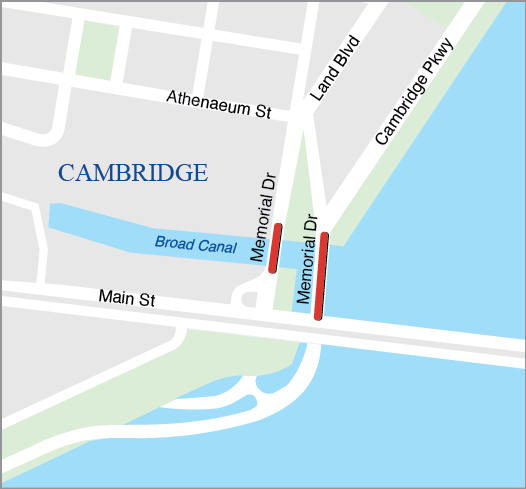
This is a MassDOT-prioritized project and is therefore not directly evaluated using the MPO’s TIP scoring criteria.
This project will replace bridge C-01-008, which carries First Street over Broad Canal, and bridge C-01-040, which carries Land Boulevard over Broad Canal, in Cambridge. Both bridges are currently listed as structurally deficient and has posted load restrictions due to their poor condition.
| Source |
(FFY) 2023 |
2024 |
2025 |
2026 |
2027 |
Total |
|---|---|---|---|---|---|---|
Federal Funds |
--- |
--- |
--- |
$11,916,800 |
--- |
$11,916,800 |
Non-Federal Funds |
--- |
--- |
--- |
$2,979,200 |
--- |
$2,979,200 |
Total Funds |
--- |
--- |
--- |
$14,896,000 |
--- |
$14,896,000 |
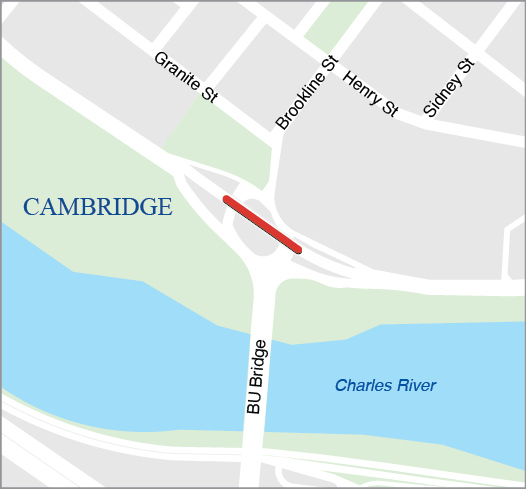
This is a MassDOT-prioritized project and is therefore not directly evaluated using the MPO’s TIP scoring criteria.
This project will replace bridge C-01-026, which carries Memorial Drive over Brookline Street in Cambridge. This bridge is currently listed as structurally deficient. This project is funded through MassDOT’s Next Generation Bridge Program.
| Source |
(FFY) 2023 |
2024 |
2025 |
2026 |
2027 |
Total |
|---|---|---|---|---|---|---|
Federal Funds |
--- |
--- |
--- |
--- |
$0 |
$0 |
Non-Federal Funds |
--- |
--- |
--- |
--- |
$52,933,955 |
$52,933,955 |
Total Funds |
--- |
--- |
--- |
--- |
$52,933,955 |
$52,933,955 |

This is a MassDOT-prioritized project and is therefore not directly evaluated using the MPO’s TIP scoring criteria.
This project will rehabilitate bridge C-01-031 in Cambridge.
| Source |
(FFY) 2023 |
2024 |
2025 |
2026 |
2027 |
Total |
|---|---|---|---|---|---|---|
Federal Funds |
--- |
--- |
$10,739,519 |
--- |
--- |
$10,739,519 |
Non-Federal Funds |
--- |
--- |
$2,684,880 |
--- |
--- |
$2,684,880 |
Total Funds |
--- |
--- |
$13,424,399 |
--- |
--- |
$13,424,399 |
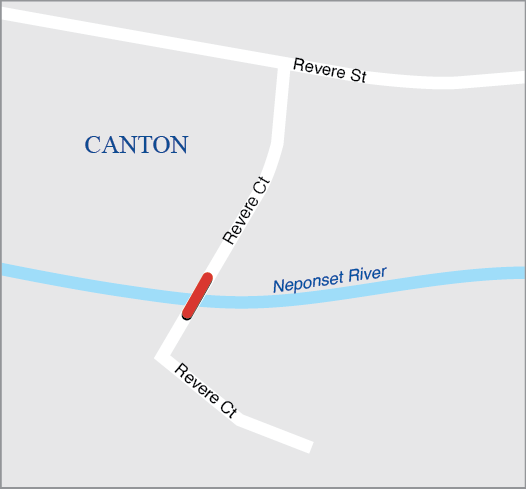
This is a MassDOT-prioritized project and is therefore not directly evaluated using the MPO’s TIP scoring criteria.
This project will replace bridge C-02-042, which carries Revere Court over the west branch of the Neponset River.
| Source |
(FFY) 2023 |
2024 |
2025 |
2026 |
2027 |
Total |
|---|---|---|---|---|---|---|
Federal Funds |
--- |
$1,748,134 |
--- |
--- |
--- |
$1,748,134 |
Non-Federal Funds |
--- |
$437,034 |
--- |
--- |
--- |
$437,034 |
Total Funds |
--- |
$2,185,168 |
--- |
--- |
--- |
$2,185,168 |
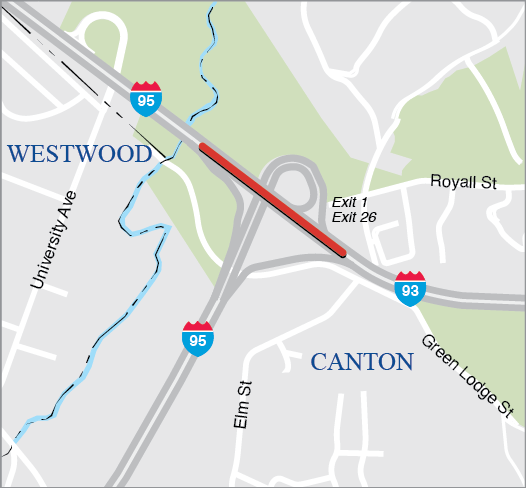
This is a MassDOT-prioritized project and is therefore not directly evaluated using the MPO’s TIP scoring criteria.
This project will make improvements to the interchange at Interstate 95 (Route 128) and Interstate 93 in Canton.
| Source |
(FFY) 2023 |
2024 |
2025 |
2026 |
2027 |
Total |
|---|---|---|---|---|---|---|
Federal Funds |
--- |
$4,935,424 |
--- |
--- |
--- |
$4,935,424 |
Non-Federal Funds |
--- |
$1,233,856 |
--- |
--- |
--- |
$1,233,856 |
Total Funds |
--- |
$6,169,280 |
--- |
--- |
--- |
$6,169,280 |
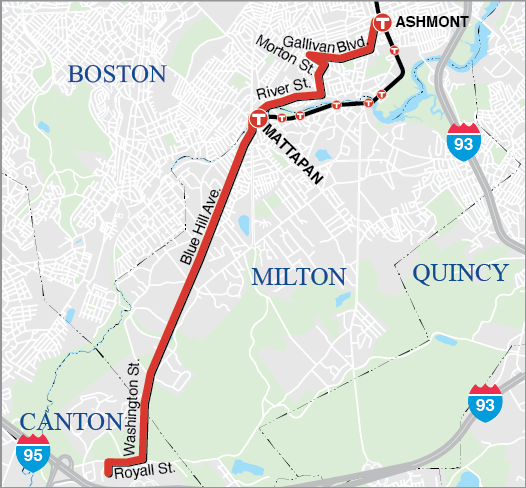
This project received a total score of 51 points when evaluated using the criteria for the pilot round of the MPO’s Community Connections Program. These criteria are listed in Table A-11.
This project will establish a shuttle service connecting Canton’s Royall Street employment cluster with the MBTA Route 128 commuter rail station and Ashmont, Mattapan Trolley, and Quincy Adams rapid transit stations. The goal of the project is to improve access to employment centers and major transit hubs by providing peak hour shuttle services for commuters and residents. The map above shows one of three planned routes for the shuttle, the precise details of which are under development. Funding for this project began in FFY 2022, with $209,101 allocated in that federal fiscal year to begin operations.
| Source |
2023 |
2024 |
2025 |
2026 |
2027 |
Total |
|---|---|---|---|---|---|---|
Federal Funds |
$141,742 |
$118,834 |
--- |
--- |
--- |
$260,576 |
Non-Federal Funds |
$35,435 |
$29,780 |
--- |
--- |
--- |
$65,215 |
Total Funds |
$177,177 |
$148,542 |
--- |
--- |
--- |
$325,791 |
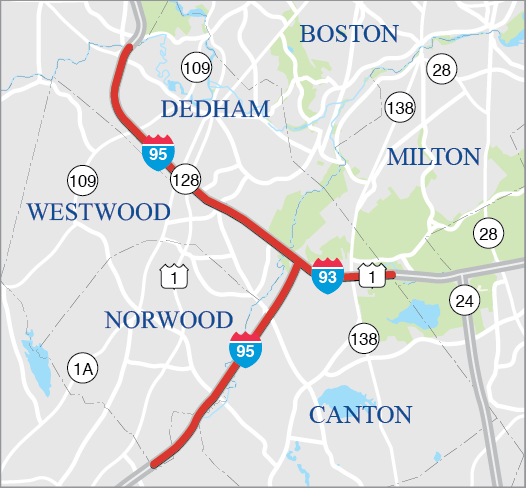
This is a MassDOT-prioritized project and is therefore not directly evaluated using the MPO’s TIP scoring criteria.
This project will make highway lighting improvements on Interstate 93 and Interstate 95/Route 128.
| Source |
(FFY) 2023 |
2024 |
2025 |
2026 |
2027 |
Total |
|---|---|---|---|---|---|---|
Federal Funds |
$3,040,694 |
--- |
--- |
--- |
--- |
$3,040,694 |
Non-Federal Funds |
$760,174 |
--- |
--- |
--- |
--- |
$760,174 |
Total Funds |
$3,800,868 |
--- |
--- |
--- |
--- |
$3,800,868 |
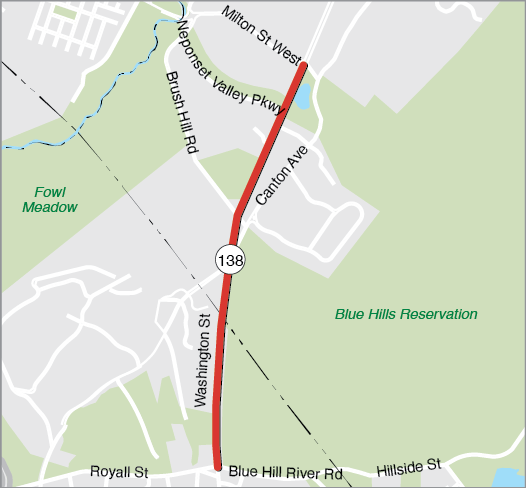
This is a MassDOT-prioritized project and is therefore not directly evaluated using the MPO’s TIP scoring criteria.
This project will make improvements to a 1.7-mile segment of Route 138 between Royall Street in Canton and Dollar Lane in Milton. The primary focus of the project is the addition of a shared-use path along the eastern side of the roadway, along with the reconstructing of existing sidewalks along the western side of the corridor. The intersection at Route 138 and Dollar Lane will be reconstructed to improve turn lanes and signals in an effort to enhance safety, as this location was identified as a 2017–2019 top-200 crash location statewide.
| Source |
(FFY) 2023 |
2024 |
2025 |
2026 |
2027 |
Total |
|---|---|---|---|---|---|---|
Federal Funds |
--- |
--- |
--- |
--- |
$14,688,755 |
$14,688,755 |
Non-Federal Funds |
--- |
--- |
--- |
--- |
$3,672,189 |
$3,672,189 |
Total Funds |
--- |
--- |
--- |
--- |
$18,360,944 |
$18,360,944 |
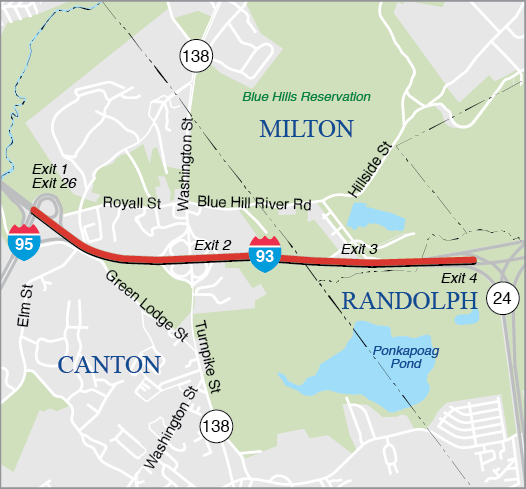
This is a MassDOT-prioritized project and is therefore not directly evaluated using the MPO’s TIP scoring criteria.
This project will conduct pavement maintenance on Interstate 93 in Canton, Milton, and Randolph. The project will resurface the roadway between the Interstate 93/Interstate 95 interchange in Canton and the Interstate 93/Route 24 interchange in Randolph, a distance of approximately three miles.
| Source |
(FFY) 2023 |
2024 |
2025 |
2026 |
2027 |
Total |
|---|---|---|---|---|---|---|
Federal Funds |
--- |
--- |
--- |
--- |
$13,866,930 |
$13,866,930 |
Non-Federal Funds |
--- |
--- |
--- |
--- |
$1,540,770 |
$1,540,770 |
Total Funds |
--- |
--- |
--- |
--- |
$15,407,700 |
$15,407,700 |
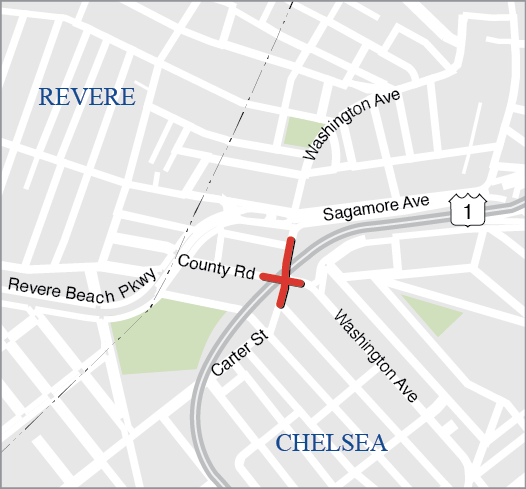
This is a MassDOT-prioritized project and is therefore not directly evaluated using the MPO’s TIP scoring criteria.
This project will replace the superstructure of bridge C-09-013, which carries Washington Avenue, Carter Street, and County Road over Route 1 in Chelsea. This bridge is currently listed as structurally deficient. This project is funded through MassDOT’s Next Generation Bridge Program.
| Source |
(FFY) 2023 |
2024 |
2025 |
2026 |
2027 |
Total |
|---|---|---|---|---|---|---|
Federal Funds |
--- |
--- |
$0 |
--- |
--- |
$0 |
Non-Federal Funds |
--- |
--- |
$10,584,000 |
--- |
--- |
$10,584,000 |
Total Funds |
--- |
--- |
$10,584,000 |
--- |
--- |
$10,584,000 |
-01.png)
This is a MassDOT-prioritized project and is therefore not directly evaluated using the MPO’s TIP scoring criteria.
This project will make upgrades to promote safety along the roadways surrounding Mary C. Burke Elementary School in Chelsea through the Safe Routes to School program. The project will serve the immediate needs of the students and staff by drastically improving pedestrian safety along Eastern Avenue, Stockton Street, and Spencer Avenue. Improvements include the addition of pedestrian signals, rehabilitation of pavement markings and roadway surfaces, construction of new ADA-compliant ramps, and reconstruction of existing traffic signal components. The project will also reduce the number of travel lanes on Eastern Avenue to add a pedestrian refuge. The roadway network will be simplified through the formal closure of a rarely used roadway in the project area, allowing for the creation of new open space in its place.
| Source |
(FFY) 2023 |
2024 |
2025 |
2026 |
2027 |
Total |
|---|---|---|---|---|---|---|
Federal Funds |
--- |
--- |
--- |
$2,322,600 |
--- |
$2,322,600 |
Non-Federal Funds |
--- |
--- |
--- |
$580,650 |
--- |
$580,650 |
Total Funds |
--- |
--- |
--- |
$2,903,250 |
--- |
$2,903,250 |
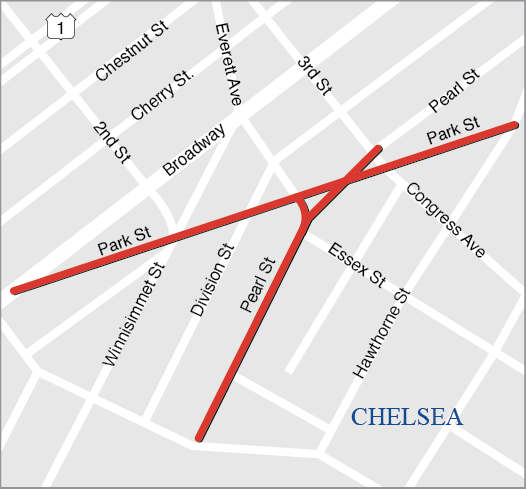
| Safety |
Sys Pres |
CM/M |
CA/SC |
TE |
EV |
Total |
|
|---|---|---|---|---|---|---|---|
Score |
14 out of 18 |
14 out of 20 |
11 out of 18 |
6 out of 12 |
14.9 out of 20 |
10 out of 12 |
69.9 out of 100 |
This project will improve safety along Park and Pearl Streets for all users, with a specific emphasis on improving conditions for people walking and bicycling. Smart signalization and geometric reconstruction will mitigate vehicular congestion while providing clear pedestrian paths of travel and shorter crosswalk distances via newly constructed ramps and sidewalks. This project may implement a priority bus and bike lane, beginning along Park Street at Williams Street up to the eventual surface renovation of Upper Broadway to the Revere City Line, an MPO-funded project in FFY 2022. Signals will allow for preferential movements of safety vehicles and MBTA buses through each intersection.
| Source |
(FFY) 2023 |
2024 |
2025 |
2026 |
2027 |
Total |
|---|---|---|---|---|---|---|
Federal Funds |
--- |
--- |
--- |
--- |
$9,799,015 |
$9,799,015 |
Non-Federal Funds |
--- |
--- |
--- |
--- |
$2,324,754 |
$2,324,754 |
Total Funds |
--- |
--- |
--- |
--- |
$12,123,769 |
$12,123,769 |
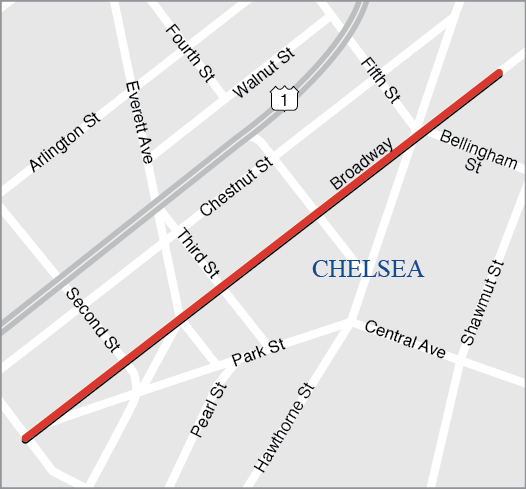
| Category |
Safety |
Sys Pres |
CM/M |
CA/SC |
TE |
EV |
Total |
|---|---|---|---|---|---|---|---|
Score |
23 out of 30 |
18 out of 29 |
14 out of 29 |
4 out of 16 |
10 out of 12 |
14 out of 18 |
83 out of 134 |
This project aims to enhance the safety of all users of Broadway in Chelsea while promoting economic activity along the corridor. Improvements to pedestrian and bicycle infrastructure include the widening of sidewalks, installation of tree boxes, and the implementation of dedicated bike or combined bus and bike lanes with protective barrier options. In addition, the upgrading of signals and pavement markings at each intersection along the corridor will increase safety of pedestrians through higher levels of visual indication while allowing the implementation of transit signal priority for buses and emergency vehicles. This project will upgrade the entire corridor to ADA compliance and allow for more efficient on-boarding and off-boarding of MBTA bus patrons. This project was evaluated using the MPO’s scoring criteria because it was considered for funding using Regional Target Funds. MassDOT funded the project, however.
| Source |
(FFY) 2023 |
2024 |
2025 |
2026 |
2027 |
Total |
|---|---|---|---|---|---|---|
Federal Funds |
--- |
--- |
$5,902,108 |
--- |
--- |
$5,902,108 |
Non-Federal Funds |
--- |
--- |
$655,790 |
--- |
--- |
$655,790 |
Total Funds |
--- |
--- |
$6,557,898 |
--- |
--- |
$6,557,898 |
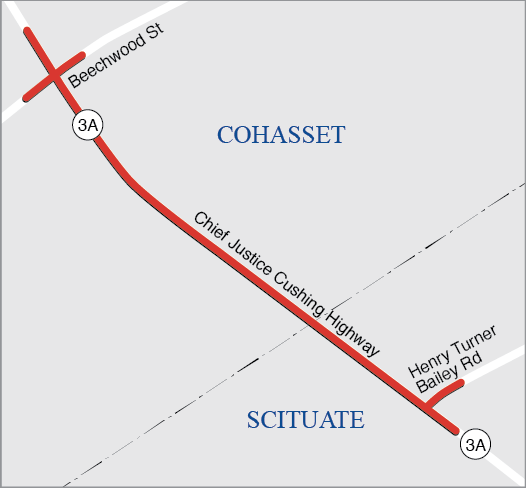
| Category |
Safety |
Sys Pres |
CM/M |
CA/SC |
TE |
EV |
Total |
|---|---|---|---|---|---|---|---|
Score |
16 out of 30 |
4 out of 29 |
8 out of 29 |
5 out of 16 |
1 out of 12 |
3 out of 18 |
37 out of 134 |
Work on this project includes corridor improvements from the Beechwood Street intersection to Henry Turner Bailey Road. The Route 3A/Beechwood Street intersection will be upgraded with new traffic signal equipment as well as minor geometric improvements. The Route 3A/Henry Turner Bailey Road intersection will be reviewed for meeting requirements for traffic signals as well as geometric improvements. Pedestrian and bicycle accommodation will be included along the corridor.
| Source |
(FFY) 2023 |
2024 |
2025 |
2026 |
2027 |
Total |
|---|---|---|---|---|---|---|
Federal Funds |
--- |
$10,157,829 |
--- |
--- |
--- |
$10,157,829 |
Non-Federal Funds |
--- |
$2,351,957 |
--- |
--- |
--- |
$2,351,957 |
Total Funds |
--- |
$12,509,786 |
--- |
--- |
--- |
$12,509,786 |
-01.png)
This is a MassDOT-prioritized project and is therefore not directly evaluated using the MPO’s TIP scoring criteria.
This project will construct a 0.8-mile segment of the Danvers Rail Trail from Spring Street in the east to just west of Maple Street. The eastern end of this project will connect to earlier phases of the Danvers Rail Trail and to the larger Border to Boston Trail system further east.
| Source |
(FFY) 2023 |
2024 |
2025 |
2026 |
2027 |
Total |
|---|---|---|---|---|---|---|
Federal Funds |
--- |
--- |
--- |
$2,630,880 |
--- |
$2,630,880 |
Non-Federal Funds |
--- |
--- |
--- |
$657,720 |
--- |
$657,720 |
Total Funds |
--- |
--- |
--- |
$3,288,600 |
--- |
$3,288,600 |
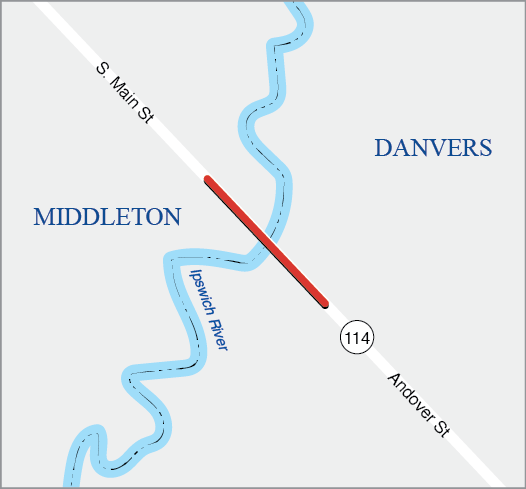
This is a MassDOT-prioritized project and is therefore not directly evaluated using the MPO’s TIP scoring criteria.
This project will fund the replacement of bridge D-03-009=M-20-005, which carries Andover Street over the Ipswich River between Danvers and Middleton.
| Source |
(FFY) 2023 |
2024 |
2025 |
2026 |
2027 |
Total |
|---|---|---|---|---|---|---|
Federal Funds |
--- |
$4,223,241 |
--- |
--- |
--- |
$4,223,241 |
Non-Federal Funds |
--- |
$1,055,810 |
--- |
--- |
--- |
$1,055,810 |
Total Funds |
--- |
$5,279,051 |
--- |
--- |
--- |
$5,279,051 |
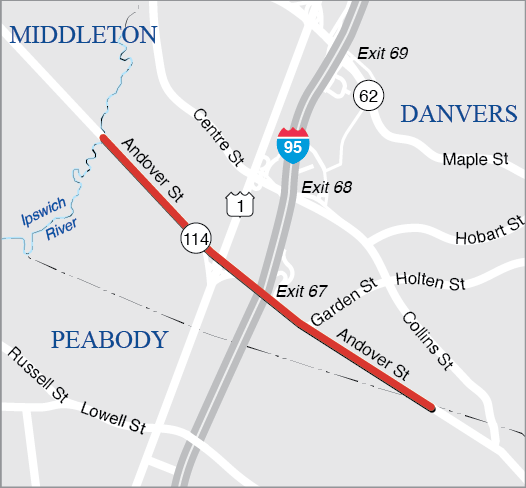
This is a MassDOT-prioritized project and is therefore not directly evaluated using the MPO’s TIP scoring criteria.
The project consists of resurfacing and related work on Route 114.
| Source |
(FFY) 2023 |
2024 |
2025 |
2026 |
2027 |
Total |
|---|---|---|---|---|---|---|
Federal Funds |
$3,340,211 |
--- |
--- |
--- |
--- |
$3,340,211 |
Non-Federal Funds |
$835,053 |
--- |
--- |
--- |
--- |
$835,053 |
Total Funds |
$4,175,264 |
--- |
--- |
--- |
--- |
$4,175,264 |
-01.png)
This is a MassDOT-prioritized project and is therefore not directly evaluated using the MPO’s TIP scoring criteria.
This project will make upgrades to promote safety along the roadways surrounding Avery Elementary School in Dedham through the Safe Routes to School program. The project includes three areas of improvement designed to facilitate safe walking to the Avery campus. The project proposes adding sidewalks and granite curbing on Maverick Street, along with adding new granite curbing along Whiting Avenue. A new crosswalk with rectangular-rapid-flashing beacons is also proposed for installation on Whiting Avenue at Recreation Road. Finally, Hill Avenue is frequently used as a cut-through for students who live East of Avery Elementary, but this route is currently a dead-end road ending in a wooded area with steep grade, a ledge, and fencing. This project proposes formalizing this connection with an ADA-accessible pedestrian walkway ramp to facilitate safe passage in what is currently an unmaintained student made path that is unsafe especially in winter months.
| Source |
(FFY) 2023 |
2024 |
2025 |
2026 |
2027 |
Total |
|---|---|---|---|---|---|---|
Federal Funds |
--- |
--- |
--- |
$1,501,442 |
--- |
$1,501,442 |
Non-Federal Funds |
--- |
--- |
--- |
$375,360 |
--- |
$375,360 |
Total Funds |
--- |
--- |
--- |
$1,876,802 |
--- |
$1,876,802 |
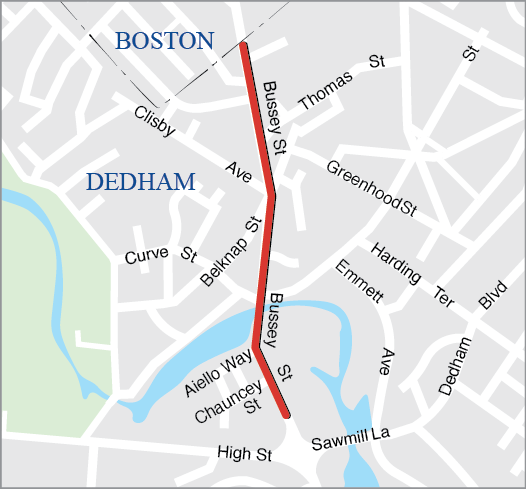
| Category |
Safety |
Sys Pres |
CM/M |
CA/SC |
TE |
EV |
Total |
|---|---|---|---|---|---|---|---|
Score |
5 out of 30 |
8 out of 29 |
5 out of 29 |
5 out of 16 |
7 out of 12 |
5 out of 18 |
35 out of 134 |
Improvements along the Bussey Street corridor will include resetting and setting the curb and reconstructing ADA-compliant sidewalks and ramps on both sides of the roadway. Some pavement reconstruction may be necessary to obtain the necessary curb reveal. Minor geometric improvements are expected at the intersection with Colburn Street and Clisby Avenue to make them more pedestrian friendly, since current conditions include expansive pavement width. Shared bicycle accommodations are planned.
| Source |
(FFY) 2023 |
2024 |
2025 |
2026 |
2027 |
Total |
|---|---|---|---|---|---|---|
Federal Funds |
$5,051,884 |
--- |
--- |
--- |
--- |
$5,051,884 |
Non-Federal Funds |
$1,262,971 |
--- |
--- |
--- |
--- |
$1,262,971 |
Total Funds |
$6,314,855 |
--- |
--- |
--- |
--- |
$6,314,855 |
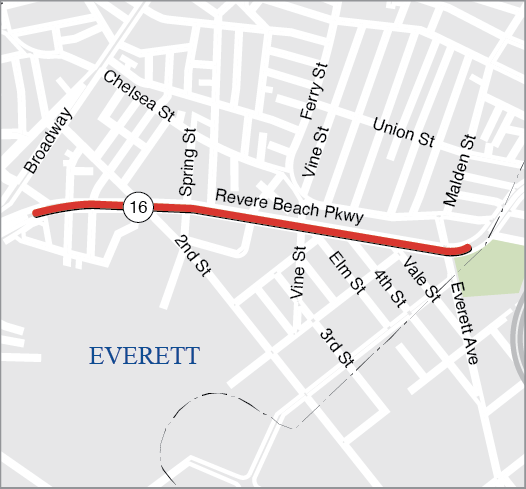
This is a MassDOT-prioritized project and is therefore not directly evaluated using the MPO’s TIP scoring criteria.
This project will make safety improvements at seven intersections along Route 16 in Everett, from Gladstone Street to Everett Avenue. This key regional roadway features three 2017–2019 all-mode crash clusters and three of the state’s top-200 crash locations, making it high-priority safety improvement location. This project includes rehabilitating or reconstructing the traffic signals at each intersection, adding pedestrian signal phases, and making improvements to sidewalks, ramps, crosswalks, and curbing. This project will also explore the feasibility of improved bicycle accommodations during the design phase.
| Source |
(FFY) 2023 |
2024 |
2025 |
2026 |
2027 |
Total |
|---|---|---|---|---|---|---|
Federal Funds |
--- |
--- |
--- |
--- |
$15,523,200 |
$15,523,200 |
Non-Federal Funds |
--- |
--- |
--- |
--- |
$2,224,800 |
$2,224,800 |
Total Funds |
--- |
--- |
--- |
--- |
$17,748,000 |
$17,748,000 |
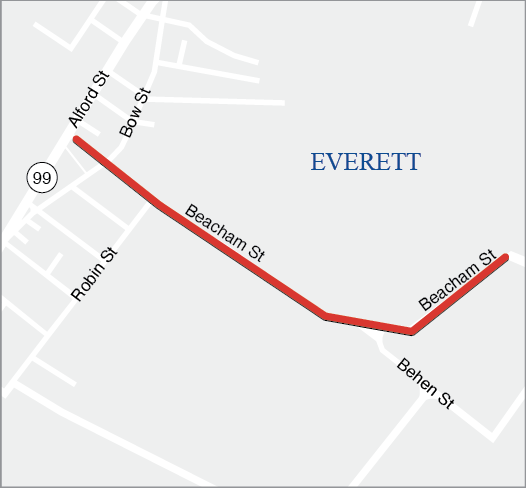
| Category |
Safety |
Sys Pres |
CM/M |
CA/SC |
TE |
EV |
Total |
|---|---|---|---|---|---|---|---|
Score |
19 out of 30 |
10 out of 29 |
13 out of 29 |
4 out of 16 |
7 out of 12 |
1 out of 18 |
54 out of 134 |
This Complete Streets project involves the reconstruction of Beacham Street to reduce vehicular collisions and improve bicycle travel. This project also includes the implementation of a shared-use bike path with a buffer along 0.65 miles of the Beacham Street corridor, a major connection between Boston, Somerville, and Cambridge, and Chelsea and East Boston. To promote pedestrian safety, upgrades to traffic signals, pavement markings, and sidewalk conditions will be incorporated to reduce conflict with vehicular traffic and provide an ADA-compliant travel route.
| Source |
(FFY) 2023 |
2024 |
2025 |
2026 |
2027 |
Total |
|---|---|---|---|---|---|---|
Federal Funds |
--- |
--- |
$8,234,733 |
--- |
--- |
$8,234,733 |
Non-Federal Funds |
--- |
--- |
$1,933,683 |
--- |
--- |
$1,933,683 |
Total Funds |
--- |
--- |
$10,168,416 |
--- |
--- |
$10,168,416 |
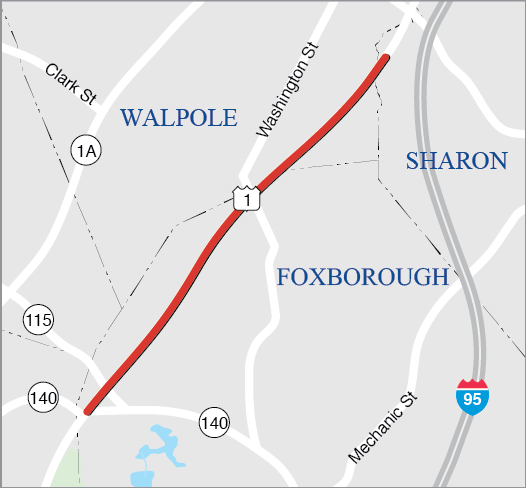
This is a MassDOT-prioritized project and is therefore not directly evaluated using the MPO’s TIP scoring criteria.
The project consists of resurfacing on Route 1 in Foxborough, Sharon, and Walpole.
| Source |
(FFY) 2022 |
2023 |
2024 |
2025 |
2026 |
Total |
|---|---|---|---|---|---|---|
Federal Funds |
--- |
$5,515,264 |
--- |
--- |
--- |
$5,515,264 |
Non-Federal Funds |
--- |
$1,378,816 |
--- |
--- |
--- |
$1,378,816 |
Total Funds |
--- |
$6,894,080 |
--- |
--- |
--- |
$6,894,080 |
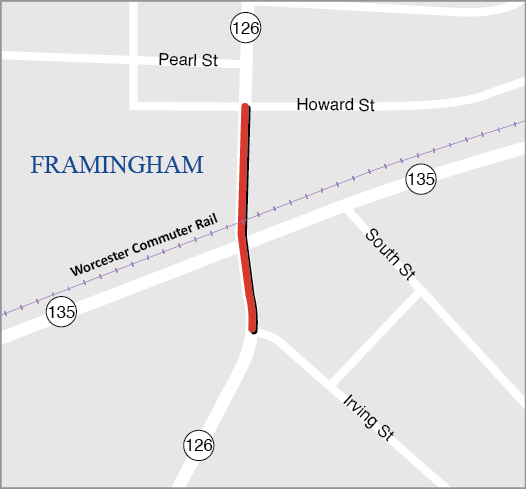
This is a MassDOT-prioritized project and is therefore not directly evaluated using the MPO’s TIP scoring criteria.
This project will make safety improvements at the at-grade railroad crossing in downtown Framingham, where the MBTA Framingham/Worcester commuter rail line crosses over Route 126. This location was identified as a 2017–2019 all-mode crash cluster and a 2010–2019 pedestrian crash cluster, making it a high-priority safety improvement location.
| Source |
(FFY) 2023 |
2024 |
2025 |
2026 |
2027 |
Total |
|---|---|---|---|---|---|---|
Federal Funds |
--- |
$3,150,000 |
--- |
--- |
--- |
$3,150,000 |
Non-Federal Funds |
--- |
$350,000 |
--- |
--- |
--- |
$350,000 |
Total Funds |
--- |
$3,500,000 |
--- |
--- |
--- |
$3,500,000 |
-01.png)
This is a MassDOT-prioritized project and is therefore not directly evaluated using the MPO’s TIP scoring criteria.
This project will make upgrades to promote safety along the roadways surrounding Harmony Grove Elementary School in Framingham through the Safe Routes to School program. This project includes installing new and reconstructing existing sidewalk and curbing on Second Street, from Beaver Street to Waverly Street, and Taralli Terrace, from Second Street to Beaver Park Road. The project will also realign the intersection of Beaver Park Road and Taralli Terrace and install new pavement markings, ADA-compliant curb cuts, crosswalks, and shared bike lanes on Second Street.
| Source |
(FFY) 2023 |
2024 |
2025 |
2026 |
2027 |
Total |
|---|---|---|---|---|---|---|
Federal Funds |
--- |
--- |
--- |
$1,315,316 |
--- |
$1,315,316 |
Non-Federal Funds |
--- |
--- |
--- |
$328,829 |
--- |
$328,829 |
Total Funds |
--- |
--- |
--- |
$1,644,145 |
--- |
$1,644,145 |
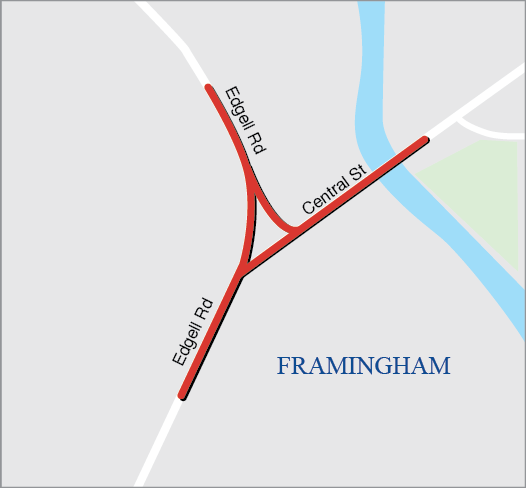
| Category |
Safety |
Sys Pres |
CM/M |
CA/SC |
TE |
EV |
Total |
|---|---|---|---|---|---|---|---|
Score |
9 out of 30 |
10 out of 29 |
7 out of 29 |
9 out of 16 |
2 out of 12 |
4 out of 18 |
41 out of 134 |
This project will improve vehicular operations and safety by installing traffic signals and geometric improvements at the intersection of Edgell Road and Central Street. The geometric improvements include realigning and widening the roadway to provide a southbound left-turn lane and a northbound right-turn lane along Edgell Road. The project also addresses pedestrian and bicyclist safety through the addition of bike lanes, crosswalks, and a new traffic signal. Sidewalks along both sides of all roadways will be ADA/Architectural Access Board (AAB) compliant.
| Source |
(FFY) 2023 |
2024 |
2025 |
2026 |
2027 |
Total |
|---|---|---|---|---|---|---|
Federal Funds |
$1,987,763 |
--- |
--- |
--- |
--- |
$1,987,763 |
Non-Federal Funds |
$496,941 |
--- |
--- |
--- |
--- |
$496,941 |
Total Funds |
$2,484,704 |
--- |
--- |
--- |
--- |
$2,484,704 |
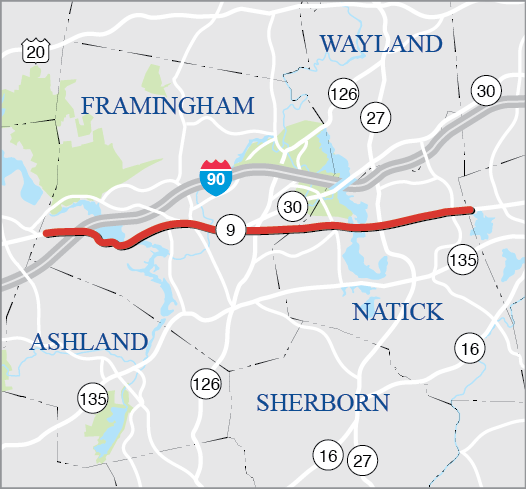
This is a MassDOT-prioritized project and is therefore not directly evaluated using the MPO’s TIP scoring criteria.
This project consists of resurfacing and related work on Route 9.
| Source |
(FFY) 2023 |
2024 |
2025 |
2026 |
2027 |
Total |
|---|---|---|---|---|---|---|
Federal Funds |
--- |
--- |
--- |
--- |
$38,932,291 |
$38,932,291 |
Non-Federal Funds |
--- |
--- |
--- |
--- |
$9,733,073 |
$9,733,073 |
Total Funds |
--- |
--- |
--- |
--- |
$48,665,364 |
$48,665,364 |
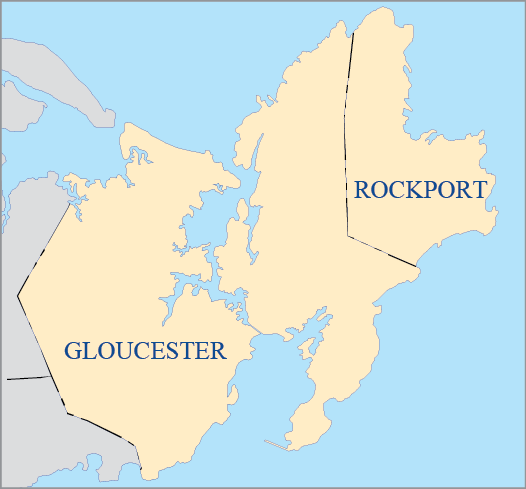
| Category |
Conn |
Coord |
Plan |
TE |
MS/DP |
FS |
Total |
|---|---|---|---|---|---|---|---|
Score |
10.75 out of 18 |
6 out of 15 |
9 out of 15 |
6 out of 18 |
20 out of 24 |
10 out of 10 |
61.75 out of 100 |
This project will expand the existing CATA On Demand microtransit service in Gloucester to include Rockport and the Lanesville neighborhood of Gloucester. The existing operating zone includes two MBTA commuter rail stations, two industrial parks, a hospital, and the waterfront district. The original purpose of CATA On Demand was to address the first- and last-mile gaps for commuters between existing transit and employment centers. The service has evolved, however, to serve a broader group of riders, including students, families, people with disabilities, and older adults. The expansion of the service to include new locations aims to continue to broaden the appeal of CATA On Demand to this wider audience and to better meet their needs when accessing school, medical appointments, grocery stores, and other essential destinations. This project is funded through the third round of grants available through the MPO’s Community Connections Program.
| Source |
(FFY) 2023 |
2024 |
2025 |
2026 |
2027 |
Total |
|---|---|---|---|---|---|---|
Federal Funds |
$266,760 |
$212,052 |
$171,821 |
--- |
--- |
$650,633 |
Non-Federal Funds |
$66,690 |
$53,013 |
$42,955 |
--- |
--- |
$162,658 |
Total Funds |
$333,450 |
$265,065 |
$214,776 |
--- |
--- |
$813,291 |
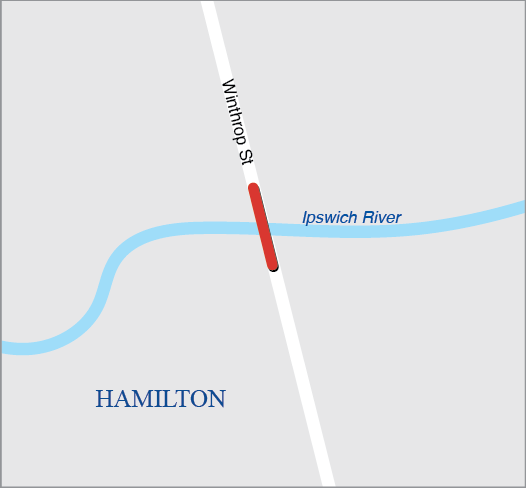
This is a MassDOT-prioritized project and is therefore not directly evaluated using the MPO’s TIP scoring criteria.
This project will replace bridge H-03-002=I-01-006, which carries Winthrop Street over the
Ipswich River.
| Source |
(FFY) 2023 |
2024 |
2025 |
2026 |
2027 |
Total |
|---|---|---|---|---|---|---|
Federal Funds |
--- |
$2,508,631 |
--- |
--- |
--- |
$2,508,631 |
Non-Federal Funds |
--- |
$627,158 |
--- |
--- |
--- |
$627,158 |
Total Funds |
--- |
$3,135,789 |
--- |
--- |
--- |
$3,135,789 |
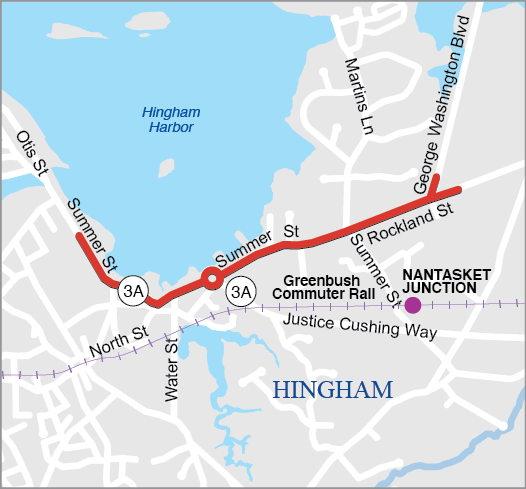
| Category |
Safety |
Sys Pres |
CM/M |
CA/SC |
TE |
EV |
Total |
|---|---|---|---|---|---|---|---|
Score |
10 out of 30 |
16 out of 29 |
17 out of 29 |
10 out of 16 |
0 out of 12 |
2 out of 18 |
55 out of 134 |
The project improves multimodal access between Hingham Center, residential areas, and Hingham Harbor by extending the existing buffered, shared-use bike path from Rockland Street to the Hingham inner harbor. In addition, improvements to reduce vehicular accidents will be incorporated through the establishment of turn lanes and a small roundabout at the intersection of Route 3A and Summer Street.
| Source |
(FFY) 2023 |
2024 |
2025 |
2026 |
2027 |
Total |
|---|---|---|---|---|---|---|
Federal Funds |
--- |
--- |
$12,477,240 |
--- |
--- |
$12,477,240 |
Non-Federal Funds |
--- |
--- |
$3,119,310 |
--- |
--- |
$3,119,310 |
Total Funds |
--- |
--- |
$15,596,550 |
--- |
--- |
$15,596,550 |
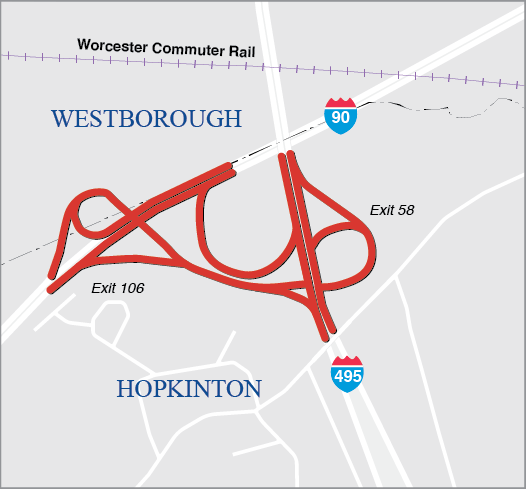
This is a MassDOT-prioritized project and is therefore not directly evaluated using the MPO’s TIP scoring criteria.
The project will improve the interchange of Interstate 90 and Interstate 495. This project is funded over six federal fiscal years (FFYs 2022-27) for a total cost of $300,942,837.
| Source |
(FFY) 2023 |
2024 |
2025 |
2026 |
2027 |
Total |
|---|---|---|---|---|---|---|
Federal Funds |
$11,188,991 |
$11,521,166 |
$63,677,909 |
$41,786,375 |
$37,410,241 |
$165,584,682 |
Non-Federal Funds |
$27,923,221 |
$27,960,130 |
$37,088,657 |
$31,322,931 |
$4,156,693 |
$108,451,632 |
Total Funds |
$39,112,212 |
$39,481,295 |
$100,766,566 |
$73,109,306 |
$41,566,934 |
$274,036,314 |
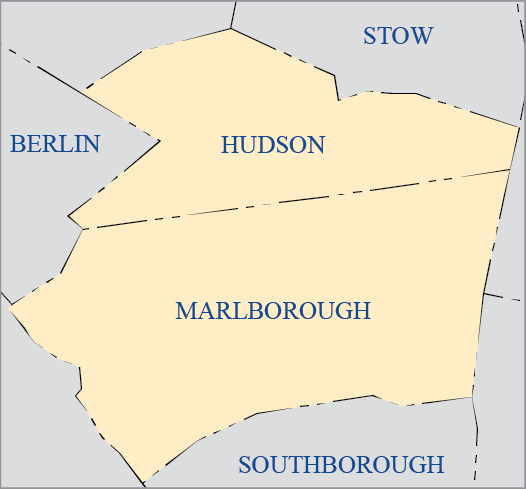
| Category |
Conn |
Coord |
Plan |
TE |
MS/DP |
FS |
Total |
|---|---|---|---|---|---|---|---|
Score |
12 out of 18 |
3 out of 15 |
9 out of 15 |
9 out of 18 |
16 out of 24 |
10 out of 10 |
59 out of 100 |
This project will expand MetroWest RTA’s existing CatchConnect microtransit service in Framingham, Natick, and Wellesley to include the municipalities of Hudson and Marlborough. This added service region will allow consumers to connect to MWRTA fixed-route services in the area, including the Route 7 traveling north and south to Framingham and the Route 7C travelling east and west through downtown Marlborough. CatchConnect service allows riders to book on-demand trips via an existing mobile application or telephone. This project is funded through the third round of grants available through the MPO’s Community Connections Program.
| Source |
(FFY) 2023 |
2024 |
2025 |
2026 |
2027 |
Total |
|---|---|---|---|---|---|---|
Federal Funds |
$113,000 |
$119,540 |
$127,590 |
--- |
--- |
$360,130 |
Non-Federal Funds |
$28,250 |
$29,885 |
$31,898 |
--- |
--- |
$90,033 |
Total Funds |
$141,250 |
$149,425 |
$159,488 |
--- |
--- |
$450,163 |
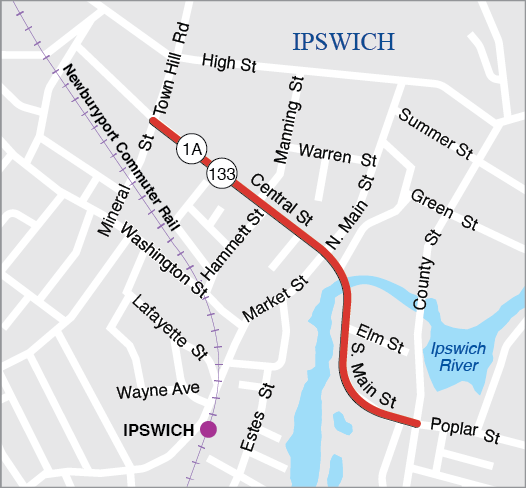
| Category |
Safety |
Sys Pres |
CM/M |
CA/SC |
TE |
EV |
Total |
|---|---|---|---|---|---|---|---|
Score |
11 out of 30 |
10 out of 29 |
10 out of 29 |
6 out of 16 |
2 out of 12 |
8 out of 18 |
47 out of 134 |
In Ipswich, the project will reconstruct the roadway between Mineral Street and Poplar Street (3,200 feet) to improve the roadway surface. Minor geometric improvements at intersection and pedestrian crossings will be included. Sidewalks and wheelchair ramps will be improved in selected areas for ADA compliance. The drainage system is undersized and will be upgraded.
| Source |
(FFY) 2023 |
2024 |
2025 |
2026 |
2027 |
Total |
|---|---|---|---|---|---|---|
Federal Funds |
--- |
$4,392,710 |
--- |
--- |
--- |
$4,392,710 |
Non-Federal Funds |
--- |
$1,098,178 |
--- |
--- |
--- |
$1,098,178 |
Total Funds |
--- |
$5,490,888 |
--- |
--- |
--- |
$5,490,888 |
 over Interstate 95-01.png)
This is a MassDOT-prioritized project and is therefore not directly evaluated using the MPO’s TIP scoring criteria.
This project will replace bridge L-10-010, which carries Route 2A (Marrett Road) over Interstate 95 in Lexington. This bridge is currently listed as structurally deficient and has a posted load restriction due to its deteriorated condition.
| Source |
(FFY) 2023 |
2024 |
2025 |
2026 |
2027 |
Total |
|---|---|---|---|---|---|---|
Federal Funds |
$16,365,010 |
--- |
--- |
--- |
--- |
$16,365,010 |
Non-Federal Funds |
$4,091,252 |
--- |
--- |
--- |
--- |
$4,091,252 |
Total Funds |
$20,456,262 |
--- |
--- |
--- |
--- |
$20,456,262 |
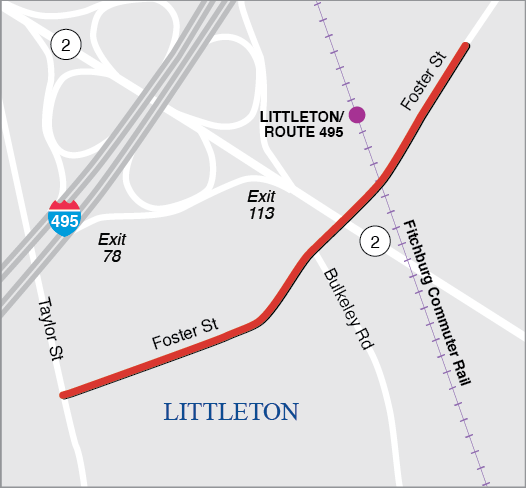
| Category |
Safety |
Sys Pres |
CM/M |
CA/SC |
TE |
EV |
Total |
|---|---|---|---|---|---|---|---|
Score |
12 out of 30 |
3 out of 29 |
11 out of 29 |
5 out of 16 |
1 out of 12 |
6 out of 18 |
38 out of 134 |
This project involves improvements to address traffic congestion and the safety of pedestrians and bicyclists through the addition of turning lanes and the reduction and consolidation of curb cuts. Full accommodations for vehicular, bicycle, and pedestrian travel and upgraded signage and wayfinding will also be established to improve accessibility for all users who travel to and from the nearby businesses.
| Source |
(FFY) 2023 |
2024 |
2025 |
2026 |
2027 |
Total |
|---|---|---|---|---|---|---|
Federal Funds |
--- |
$3,194,116 |
--- |
--- |
--- |
$3,194,116 |
Non-Federal Funds |
--- |
$798,529 |
--- |
--- |
--- |
$798,529 |
Total Funds |
--- |
$3,992,645 |
--- |
--- |
--- |
$3,992,645 |

| Category |
Safety |
Sys Pres |
CM/M |
CA/SC |
TE |
EV |
Total |
|---|---|---|---|---|---|---|---|
Score |
13 out of 30 |
13 out of 29 |
7 out of 29 |
2 out of 16 |
1 out of 12 |
3 out of 18 |
39 out of 134 |
This project involves multimodal safety and operational improvements at two locations on Broadway. Existing sidewalks will be reconstructed with the addition of on-street bicycle facilities close to connections to adjacent facilities. Operational improvements include traffic signal updates at Broadway’s intersections with Euclid Avenue and Jenness and Warwick Streets. Drainage improvements and pavement reconstruction will also be incorporated to improve access to businesses and schools. This project was evaluated using the MPO’s scoring criteria because it was considered for funding using Regional Target funds. MassDOT funded the project, however.
| Source |
(FFY) 2023 |
2024 |
2025 |
2026 |
2027 |
Total |
|---|---|---|---|---|---|---|
Federal Funds |
$4,872,061 |
--- |
--- |
--- |
--- |
$4,872,061 |
Non-Federal Funds |
$541,340 |
--- |
--- |
--- |
--- |
$541,340 |
Total Funds |
$5,413,401 |
--- |
--- |
--- |
--- |
$5,413,401 |
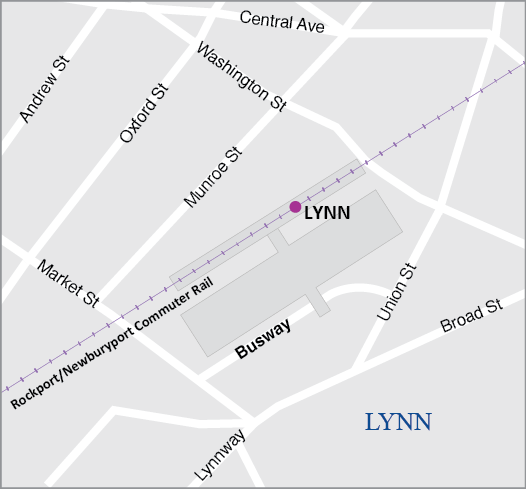
This project was selected for funding by the MPO late in the FFYs 2023–27 TIP development cycle, so it has not yet been scored using the MPO’s project selection criteria. This section will be updated with the project’s final score when it is available.
This project will make a range of improvements to the MBTA commuter rail station in Lynn, addressing the existing deterioration within the station to bring it into a state of good repair. The project will reconstruct the existing platform, construct two new elevators, and rehabilitate existing stairways and lighting throughout the station, among other upgrades. This project also includes waterproofing and structural repairs to the viaduct northeast of the station.
| Source |
(FFY) 2023 |
2024 |
2025 |
2026 |
2027 |
Total |
|---|---|---|---|---|---|---|
Federal Funds |
$27,600,000 |
$10,880,000 |
--- |
--- |
--- |
$38,480,000 |
Non-Federal Funds |
$6,900,000 |
$2,720,000 |
--- |
--- |
--- |
$9,620,000 |
Total Funds |
$34,500,000 |
$13,600,000 |
--- |
--- |
--- |
$48,100,000 |
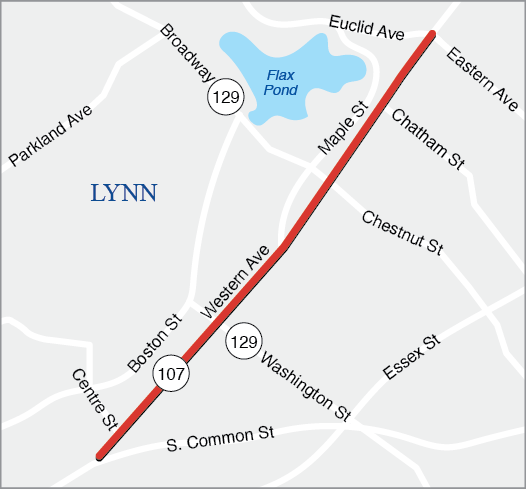
| Category |
Safety |
Sys Pres |
CM/M |
CA/SC |
TE |
EV |
Total |
|---|---|---|---|---|---|---|---|
Score |
18 out of 18 |
14 out of 20 |
10 out of 18 |
11 out of 12 |
11.9 out of 20 |
10 out of 12 |
74.9 out of 100 |
This project will reconstruct 1.9 miles of Western Avenue (Route 107) in Lynn between Centre Street and Eastern Avenue. Work will include roadway pavement reconstruction, drainage improvements, improved design for traffic operations and safety, new signs and pavement markings, and bicycle and ADA-compliant pedestrian improvements. This project includes improvements to bus stop locations throughout the corridor and bus-priority elements will be considered during the design phase. A key goal of this project is to enhance safety along the corridor, as this segment of Western Avenue has three 2017–2019 top-200 crash clusters, four 2017–2019 all-mode crash clusters, one 2010–2019 bicycle crash cluster, and one 2010–2019 pedestrian crash cluster, making it a high-priority safety improvement location statewide. This project is anticipated to be funded over three fiscal years, with funding beginning in FFY 2027.
| Source |
(FFY) 2023 |
2024 |
2025 |
2026 |
2027 |
Total |
|---|---|---|---|---|---|---|
Federal Funds |
--- |
--- |
--- |
--- |
$12,300,000 |
$12,300,000 |
Non-Federal Funds |
--- |
--- |
--- |
--- |
$2,700,000 |
$2,700,000 |
Total Funds |
--- |
--- |
--- |
--- |
$15,000,000 |
$15,000,000 |
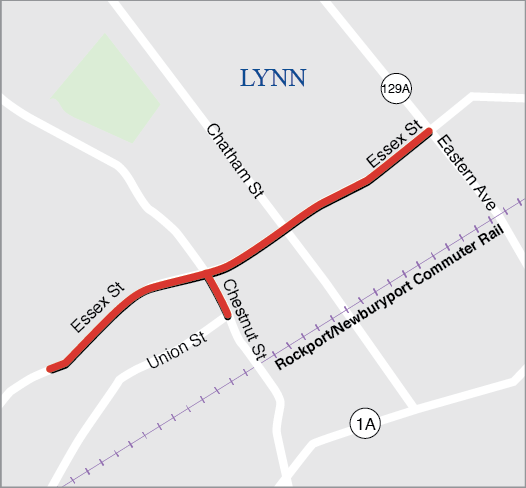
| Category |
Safety |
Sys Pres |
CM/M |
CA/SC |
TE |
EV |
Total |
|---|---|---|---|---|---|---|---|
Score |
19 out of 30 |
17 out of 29 |
9 out of 29 |
8 out of 16 |
10 out of 12 |
3 out of 18 |
66 out of 134 |
This project is focused on making key safety improvements for pedestrians and bicyclists. Existing sidewalks on Essex Street will be reconstructed to ADA/AAB standards and will be complemented by the addition of new on-street bicycle facilities. Pedestrian safety will be improved through the construction of curb bump-outs at intersections to reduce crosswalk length. In addition, operational improvements such as signal updates and pavement markings will be established to enhance safety.
| Source |
(FFY) 2023 |
2024 |
2025 |
2026 |
2027 |
Total |
|---|---|---|---|---|---|---|
Federal Funds |
--- |
$14,481,600 |
--- |
--- |
--- |
$14,481,600 |
Non-Federal Funds |
--- |
$3,120,400 |
--- |
--- |
--- |
$3,120,400 |
Total Funds |
--- |
$17,602,000 |
--- |
--- |
--- |
$17,602,000 |
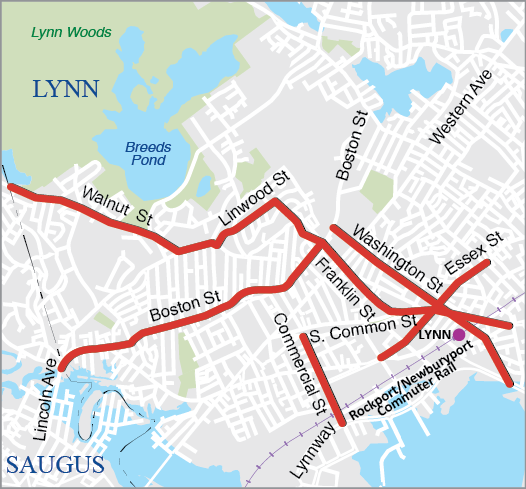
This is a MassDOT-prioritized project and is therefore not directly evaluated using the MPO’s TIP scoring criteria.
This project will implement targeted safety improvements at key locations in Lynn as identified in the Lynn Safe Streets for People Playbook. This multimodal safety plan was created by the City of Lynn in partnership with MassDOT and identified priority streets for improvement and developed strategies to support the creation of a safe network for all users, with an emphasis on walking, biking, and taking transit. The project will involve the implementation of both corridor- and intersection-level treatments and amenities for street users on a systemic basis. The street corridors in this phase will include Walnut Street, Franklin Street, Linwood Street, Washington Street, Boston Street, Essex Street, Liberty Street, Tremont Street, Central Avenue, Exchange Street, and Commercial Street. Corridor treatments will include the installation of protected bicycle lanes, shared streets treatments, and traffic-calming measures such as speed cushions or humps. Intersection treatments will include curb ramps and extensions, geometric adjustments, raised crosswalks, installation of rectangular-rapid-flashing beacons, and signal equipment and timing upgrades. Amenities for street users will include the installation of bicycle parking, improved bus shelters, signage, and benches, floating bus stops, and bus bulbs.
| Source |
(FFY) 2023 |
2024 |
2025 |
2026 |
2027 |
Total |
|---|---|---|---|---|---|---|
Federal Funds |
--- |
--- |
--- |
--- |
$7,650,240 |
$7,650,240 |
Non-Federal Funds |
--- |
--- |
--- |
--- |
$1,287,560 |
$1,287,560 |
Total Funds |
--- |
--- |
--- |
--- |
$8,937,800 |
$8,937,800 |
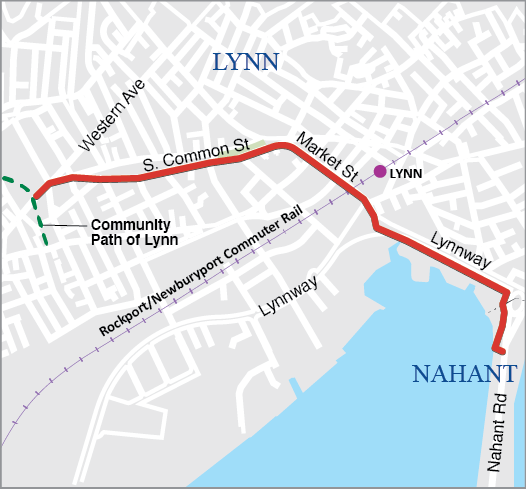
This is a MassDOT-prioritized project and is therefore not directly evaluated using the MPO’s TIP scoring criteria.
This project will extend the Northern Strand trail an additional 1.92 miles from its current terminus at Western Ave in Lynn to Nahant Beach via a separated shared-use facility along existing roads. The proposed project seeks to improve pedestrian and bicycle safety and accessibility along the last segment of this regional trail network. In addition to creating a direct connection to Nahant Beach, the project will also enhance connections for people walking and bicycling to other key destinations, including the Lynn Common, Lynn City Hall, and the Central Square MBTA commuter rail station.
| Source |
(FFY) 2023 |
2024 |
2025 |
2026 |
2027 |
Total |
|---|---|---|---|---|---|---|
Federal Funds |
$7,491,000 |
--- |
--- |
--- |
--- |
$7,491,000 |
Non-Federal Funds |
$1,872,750 |
--- |
--- |
--- |
--- |
$1,872,750 |
Total Funds |
$9,363,750 |
--- |
--- |
--- |
--- |
$9,363,750 |
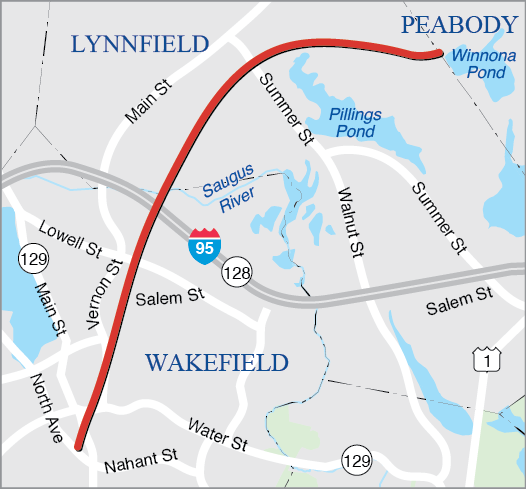
This is a MassDOT-prioritized project and is therefore not directly evaluated using the MPO’s TIP scoring criteria.
The proposed Wakefield/Lynnfield Rail Trail extends from the Galvin Middle School in Wakefield north to the Lynnfield/Peabody town line, a distance of approximately 4.4 miles. Approximately 1.9 miles of the trail is located within Wakefield and 2.5 miles in Lynnfield. The corridor is the southern section of the former Newburyport Railroad and will connect to Peabody and the regional Border to Boston Trail.
| Source |
(FFY) 2023 |
2024 |
2025 |
2026 |
2027 |
Total |
|---|---|---|---|---|---|---|
Federal Funds |
--- |
--- |
--- |
$9,888,540 |
--- |
$9,888,540 |
Non-Federal Funds |
--- |
--- |
--- |
$2,472,135 |
--- |
$2,472,135 |
Total Funds |
--- |
--- |
--- |
$12,360,675 |
--- |
$12,360,675 |
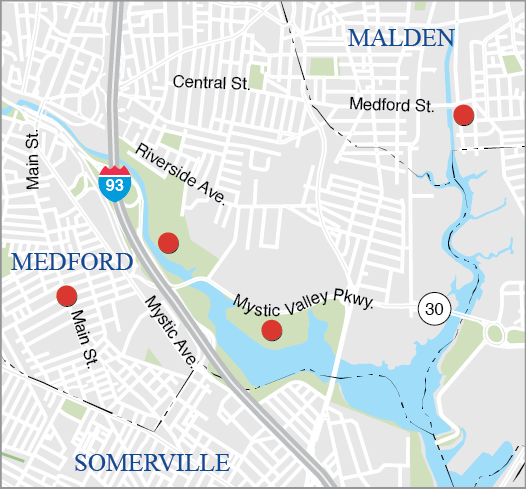
| Category |
Conn |
Coord |
Plan |
TE |
MS/DP |
FS |
Total |
|---|---|---|---|---|---|---|---|
Score |
17 out of 18 |
12 out of 15 |
6 out of 15 |
9 out of 18 |
24 out of 24 |
10 out of 10 |
78 out of 100 |
This project will expand the Bluebikes system in Malden and Medford by adding four new stations, including three stations in Medford and one in Malden. These new stations will build upon the MPO’s FFY 2022 Community Connections grant, which supported the installation of six new Bluebikes stations in these same communities. Tentative station locations include: Medford Street in Malden, adjacent to the Northern Strand Community Trail; Main Street and Harvard Street in Medford, near the forthcoming College Avenue and Ball Square MBTA Green Line stations; and at two locations within the Mystic River State Reservation. These new stations will enhance the role of Medford and Malden in the regional Bluebikes network, supporting better connections across to the neighboring Bluebikes communities of Arlington, Somerville, and Everett. These stations will also create better first- and last-mile connectivity between the robust range of MBTA services in these communities (Orange Line, Green Line, Commuter Rail, and bus service) and key destinations such as Tufts University and local recreation areas. This project is funded through the third round of grants available through the MPO’s Community Connections Program.
| Source |
(FFY) 2023 |
2024 |
2025 |
2026 |
2027 |
Total |
|---|---|---|---|---|---|---|
Federal Funds |
$116,657 |
--- |
--- |
--- |
--- |
$116,657 |
Non-Federal Funds |
$29,164 |
--- |
--- |
--- |
--- |
$29,164 |
Total Funds |
$145,821 |
--- |
--- |
--- |
--- |
$145,821 |
-01.png)
This is a MassDOT-prioritized project and is therefore not directly evaluated using the MPO’s TIP scoring criteria.
This project will make improvements along Route 1 northbound in Malden and Revere over a distance of approximately 0.8 miles north of Squire Road.
| Source |
(FFY) 2023 |
2024 |
2025 |
2026 |
2027 |
Total |
|---|---|---|---|---|---|---|
Federal Funds |
--- |
--- |
--- |
--- |
$6,690,880 |
$6,690,880 |
Non-Federal Funds |
--- |
--- |
--- |
--- |
$1,672,720 |
$1,672,720 |
Total Funds |
--- |
--- |
--- |
--- |
$8,363,600 |
$8,363,600 |
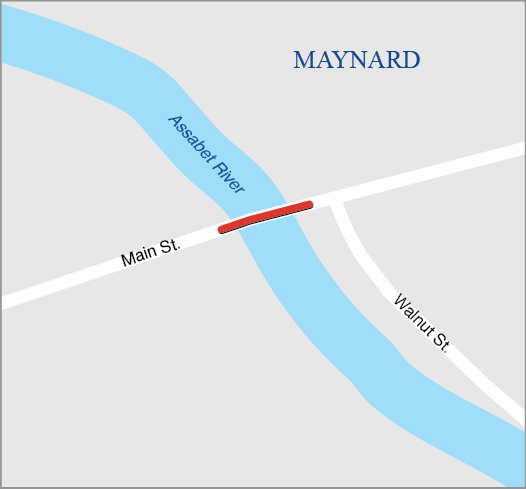
This is a MassDOT-prioritized project and is therefore not directly evaluated using the MPO’s TIP scoring criteria.
This project will replace bridge M-10-004, which carries Route 62 (Main Street) over the Assabet River in Maynard. This bridge is currently listed as structurally deficient. This project is funded through MassDOT’s Next Generation Bridge Program.
| Source |
(FFY) 2023 |
2024 |
2025 |
2026 |
2027 |
Total |
|---|---|---|---|---|---|---|
Federal Funds |
--- |
--- |
$0 |
--- |
--- |
$0 |
Non-Federal Funds |
--- |
--- |
$1,520,953 |
--- |
--- |
$1,520,953 |
Total Funds |
--- |
--- |
$1,520,953 |
--- |
--- |
$1,520,953 |
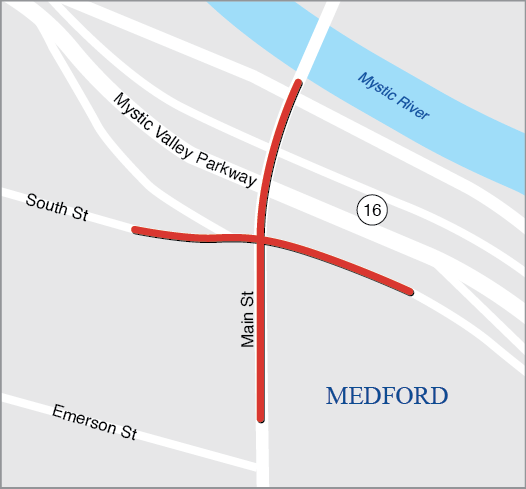
This is a MassDOT-prioritized project and is therefore not directly evaluated using the MPO’s TIP scoring criteria.
This project will make safety improvements to the intersection of Main Street and South Street in Medford. This location has a 2010–2019 pedestrian crash cluster and a 2017–2019 top-200 crash location (statewide), making it a high-priority safety improvement location. The scope of this project involves reconstruction of the intersection either by constructing a roundabout or reconstructing and updating the signal control system and lane assignments. A detailed alternatives analysis will be conducted to identify the preferred traffic control for the intersection, in addition to improvements to accessibility, and bicycle and pedestrian accommodations. This project will build upon the analysis done in the Medford Square Priority Roadways Improvement Study published by the Boston Region MPO in December 2018.
| Source |
(FFY) 2023 |
2024 |
2025 |
2026 |
2027 |
Total |
|---|---|---|---|---|---|---|
Federal Funds |
--- |
--- |
--- |
$8,565,984 |
--- |
$8,565,984 |
Non-Federal Funds |
--- |
--- |
--- |
$951,776 |
--- |
$951,776 |
Total Funds |
--- |
--- |
--- |
$9,517,760 |
--- |
$9,517,760 |
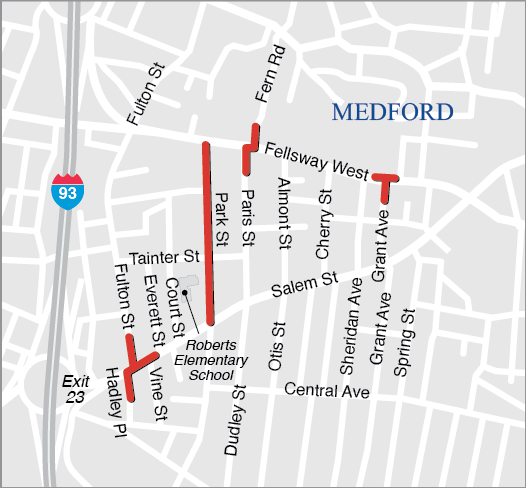
This is a MassDOT-prioritized project and is therefore not directly evaluated using the MPO’s TIP scoring criteria.
This project includes pedestrian improvements at three key intersections for students approaching Roberts Elementary School. Improvements include the following: a full pedestrian signal, curb extensions, and improved lighting at the intersection of Fellsway with Paris Street and Fern Road, and sidewalk improvements from this intersection to the Roberts School along Park Street; pedestrian realignment, curb bump-outs, and pedestrian rapid-flashing beacons at the intersection of Salem Street and Hadley Place; and pedestrian rapid-flashing beacons, curb extensions, and improved lighting at the intersection of Fellsway and Grant Avenue.
| Source |
(FFY) 2023 |
2024 |
2025 |
2026 |
2027 |
Total |
|---|---|---|---|---|---|---|
Federal Funds |
--- |
--- |
$816,683 |
--- |
--- |
$816,683 |
Non-Federal Funds |
--- |
--- |
$204,171 |
--- |
--- |
$204,171 |
Total Funds |
--- |
--- |
$1,020,854 |
--- |
--- |
$1,020,854 |
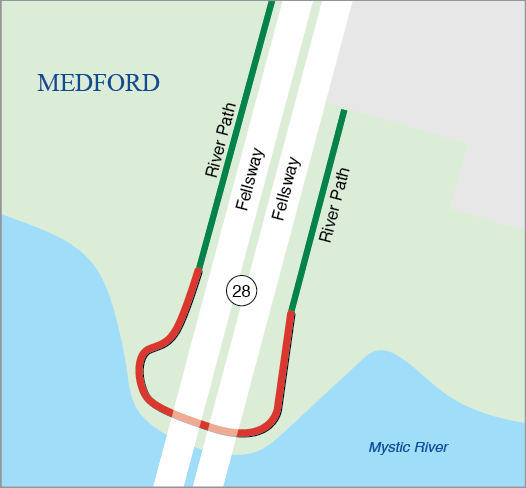
This is a MassDOT-prioritized project and is therefore not directly evaluated using the MPO’s TIP scoring criteria.
This project will enhance bicycle and pedestrian travel in Medford by creating a shared-use path connection under Route 28 (Fellsway) along the Mystic River. This connection will be similar to a shared-use boardwalk on the opposite side of the Mystic River in Somerville, which also runs under Route 28. Once complete, this project will be a critical connection between existing riverfront pathways along the Mystic River in Medford, including the Wellington Greenway on the east side of Route 28 and the path system within the Mystic River State Reservation on the west side of Route 28.
| Source |
(FFY) 2023 |
2024 |
2025 |
2026 |
2027 |
Total |
|---|---|---|---|---|---|---|
Federal Funds |
--- |
$3,740,889 |
--- |
--- |
--- |
$3,740,889 |
Non-Federal Funds |
--- |
$935,222 |
--- |
--- |
--- |
$935,222 |
Total Funds |
--- |
$4,676,111 |
--- |
--- |
--- |
$4,676,111 |
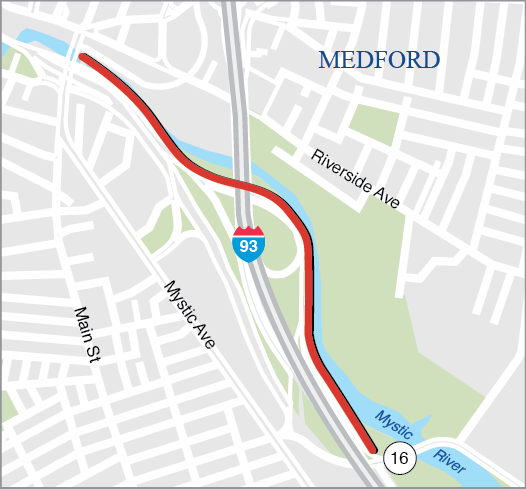
This is a MassDOT-prioritized project and is therefore not directly evaluated using the MPO’s TIP scoring criteria.
This project will enhance bicycle and pedestrian connectivity in Medford by creating a shared-use path along the south side of the Mystic River. This project aims to provide a critical link in the regional transportation network by connecting two existing Department of Conservation and Recreation paths and supporting bicycle commuter access throughout the region. This project will construct an 8- to 10-foot wide pathway approximately one mile long primarily within the existing right of way of Route 16.
| Source |
(FFY) 2023 |
2024 |
2025 |
2026 |
2027 |
Total |
|---|---|---|---|---|---|---|
Federal Funds |
--- |
--- |
--- |
$6,322,993 |
--- |
$6,322,993 |
Non-Federal Funds |
--- |
--- |
--- |
$1,580,748 |
--- |
$1,580,748 |
Total Funds |
--- |
--- |
--- |
$7,903,741 |
--- |
$7,903,741 |

This is a MassDOT-prioritized project and is therefore not directly evaluated using the MPO’s TIP scoring criteria.
This project includes pavement preservation work on Interstate 93 between Medford, Winchester, and Stoneham.
| Source |
(FFY) 2023 |
2024 |
2025 |
2026 |
2027 |
Total |
|---|---|---|---|---|---|---|
Federal Funds |
--- |
--- |
$19,716,76 |
--- |
--- |
$19,716,76 |
Non-Federal Funds |
--- |
--- |
$2,190,751 |
--- |
--- |
$2,190,751 |
Total Funds |
--- |
--- |
$21,907,511 |
--- |
--- |
$21,907,511 |
-01.png)
This is a MassDOT-prioritized project and is therefore not directly evaluated using the MPO’s TIP scoring criteria.
This project will make upgrades to promote safety along Holliston Street and Cassidy Lane in Medway through the Safe Routes to School program. These roadways are adjacent to Francis J. Burke Memorial Elementary School and Medway Middle School.
| Source |
(FFY) 2023 |
2024 |
2025 |
2026 |
2027 |
Total |
|---|---|---|---|---|---|---|
Federal Funds |
--- |
$2,245,974 |
--- |
--- |
--- |
$2,245,974 |
Non-Federal Funds |
--- |
$561,494 |
--- |
--- |
--- |
$561,494 |
Total Funds |
--- |
$2,807,468 |
--- |
--- |
--- |
$2,807,468 |
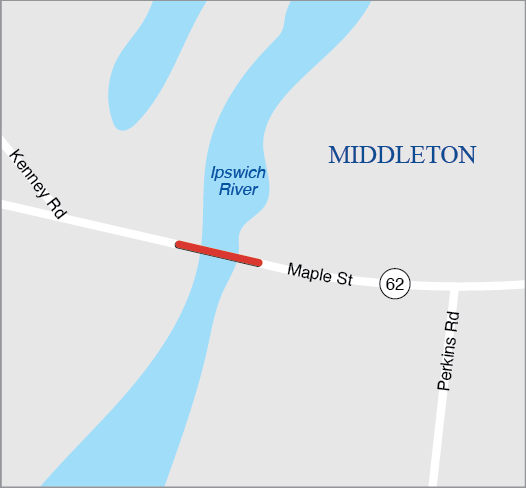
This is a MassDOT-prioritized project and is therefore not directly evaluated using the MPO’s TIP scoring criteria.
The project will replace the bridge that carries Route 62 (Maple Street) over the Ipswich River in Middleton.
| Source |
(FFY) 2023 |
2024 |
2025 |
2026 |
2027 |
Total |
|---|---|---|---|---|---|---|
Federal Funds |
--- |
$3,025,118 |
--- |
--- |
--- |
$3,025,118 |
Non-Federal Funds |
--- |
$756,280 |
--- |
--- |
--- |
$756,280 |
Total Funds |
--- |
$3,781,398 |
--- |
--- |
--- |
$3,781,398 |
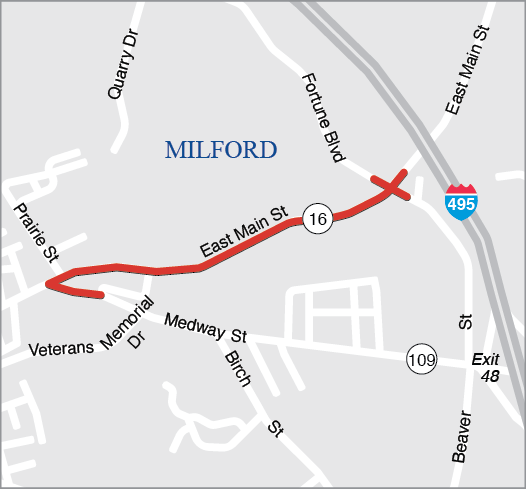
| Category |
Safety |
Sys Pres |
CM/M |
CA/SC |
TE |
EV |
Total |
|---|---|---|---|---|---|---|---|
Score |
20 out of 30 |
7 out of 29 |
9 out of 29 |
-1 out of 16 |
3 out of 12 |
5 out of 18 |
43 out of 134 |
This project supports enhanced vehicular safety and traffic flow through the implementation of a road diet, additional roadway reconstruction, and enhanced signalization on the Route 16 (East Main Street) corridor from Route 109 (Medway Road) to Beaver Street. In addition, the project also addresses pedestrian and bicyclist safety through the addition of pavement markings for shared-use bike lanes and the construction of new six-foot sidewalks along both sides of the roadway.
| Source |
(FFY) 2023 |
2024 |
2025 |
2026 |
2027 |
Total |
|---|---|---|---|---|---|---|
Federal Funds |
--- |
--- |
--- |
$8,195,693 |
--- |
$8,195,693 |
Non-Federal Funds |
--- |
--- |
--- |
$1,923,923 |
--- |
$1,923,923 |
Total Funds |
--- |
--- |
--- |
$10,119,616 |
--- |
$10,119,616 |
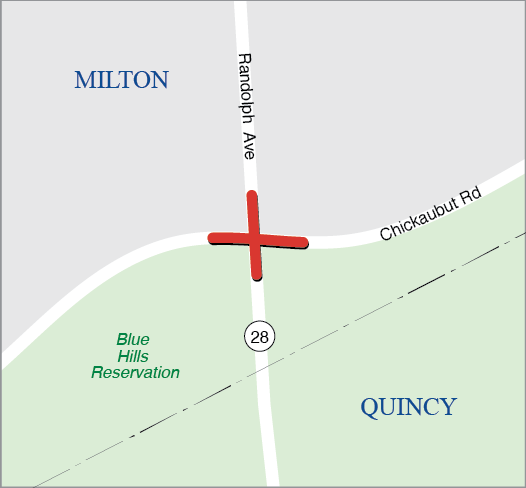
This is a MassDOT-prioritized project and is therefore not directly evaluated using the MPO’s TIP scoring criteria.
This intersection ranked second in the 2008–10 Statewide Top 200 Intersection Crash List. This project addresses the high number and severity of crashes that occur at this intersection.
| Source |
(FFY) 2023 |
2024 |
2025 |
2026 |
2027 |
Total |
|---|---|---|---|---|---|---|
Federal Funds |
$6.356.476 |
--- |
--- |
--- |
--- |
$6.356.476 |
Non-Federal Funds |
$706,275 |
--- |
--- |
--- |
--- |
$706,275 |
Total Funds |
$7,062,751 |
--- |
--- |
--- |
--- |
$7,062,751 |
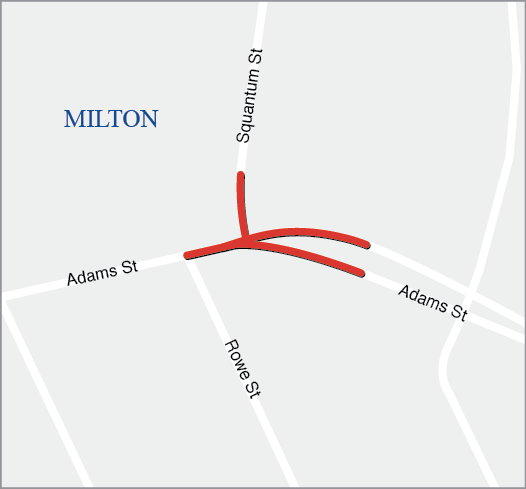
| Category |
Safety |
Sys Pres |
CM/M |
CA/SC |
TE |
EV |
Total |
|---|---|---|---|---|---|---|---|
Score |
9 out of 21 |
8 out of 17 |
5 out of 18 |
4 out of 12 |
4.4 out of 20 |
4 out of 12 |
34.4 out of 100 |
This project aims to improve safety and operations for vehicles, bicyclists, and pedestrians where Adams Street and Squantum Street intersect, consequently reducing congestion and the occurrence of crashes. This project will introduce a traffic signal at the intersection to better regulate traffic flow from Squantum Street onto Adams Street, where significant delays currently exist during peak periods. Improvements will be made to sidewalks and curb ramps to meet ADA/AAB standards and shorter pedestrian crosswalks and restriping will be considered within the project limits. Dedicated bicycle facilities will be included with the project to connect to the existing bicycle network on Adams Street located west of the project area. This project was evaluated using the MPO’s scoring criteria because it was considered for funding using Regional Target Funds. MassDOT funded the project, however.
| Source |
(FFY) 2023 |
2024 |
2025 |
2026 |
2027 |
Total |
|---|---|---|---|---|---|---|
Federal Funds |
--- |
$2,403,651 |
--- |
--- |
--- |
$2,403,651 |
Non-Federal Funds |
--- |
$0 |
--- |
--- |
--- |
$0 |
Total Funds |
--- |
$2,403,651 |
--- |
--- |
--- |
$2,403,651 |
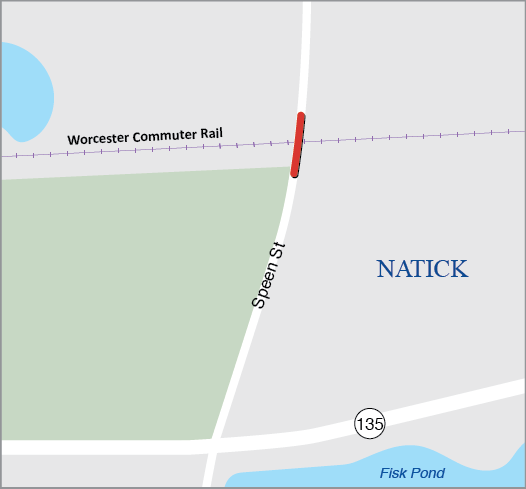
This is a MassDOT-prioritized project and is therefore not directly evaluated using the MPO’s TIP scoring criteria.
This project will replace bridge N-03-010, which carries Speen Street over the MBTA Framingham/Worcester commuter rail line in Natick. This bridge is currently listed as structurally deficient. This project is funded through MassDOT’s Next Generation Bridge Program.
| Source |
(FFY) 2023 |
2024 |
2025 |
2026 |
2027 |
Total |
|---|---|---|---|---|---|---|
Federal Funds |
--- |
--- |
$0 |
--- |
--- |
$0 |
Non-Federal Funds |
--- |
--- |
$6,711,629 |
--- |
--- |
$6,711,629 |
Total Funds |
--- |
--- |
$6,711,629 |
--- |
--- |
$6,711,629 |
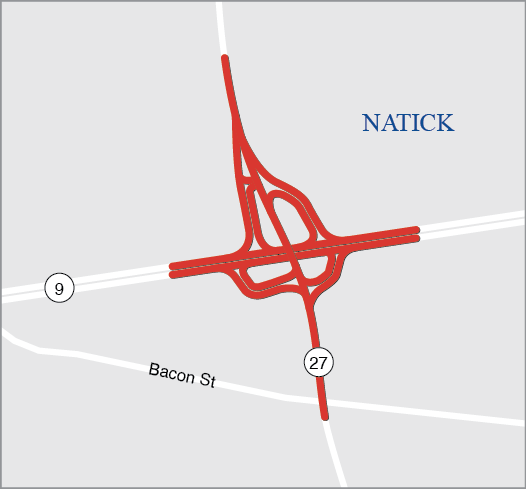
| Category |
Safety |
Sys Pres |
CM/M |
CA/SC |
TE |
EV |
Total |
|---|---|---|---|---|---|---|---|
Score |
13 out of 18 |
13 out of 20 |
11 out of 18 |
8 out of 12 |
6.7 out of 20 |
6 out of 12 |
57.7 out of 100 |
This project will completely reconfigure and reconstruct the bridge that carries Route 27 over Route 9, creating a modified diverging diamond layout that aims to improve traffic flow and roadway geometry while enhancing safety for all users. There are currently no ADA-compliant sidewalks or bike lanes on the bridge. Only one side of the bridge has sidewalks, which are in poor condition. This project will create a dedicated bicycle and pedestrian bridge along with off-road facilities throughout the project area, providing a pedestrian and bicycle link between the neighborhoods north of Route 9 with Natick Center and the Cochituate Rail Trail. Additionally, the Route 27 bridge was built in 1931 and is currently listed as structurally deficient, so this project supports a return of this overpass to a state of good repair. This project was evaluated using the MPO’s scoring criteria because it was considered for funding using Regional Target Funds. MassDOT funded the project, however.
| Source |
(FFY) 2023 |
2024 |
2025 |
2026 |
2027 |
Total |
|---|---|---|---|---|---|---|
Federal Funds |
--- |
$46,901,224 |
--- |
--- |
--- |
$46,901,224 |
Non-Federal Funds |
--- |
$0 |
--- |
--- |
--- |
$0 |
Total Funds |
--- |
$46,901,224 |
--- |
--- |
--- |
$46,901,224 |
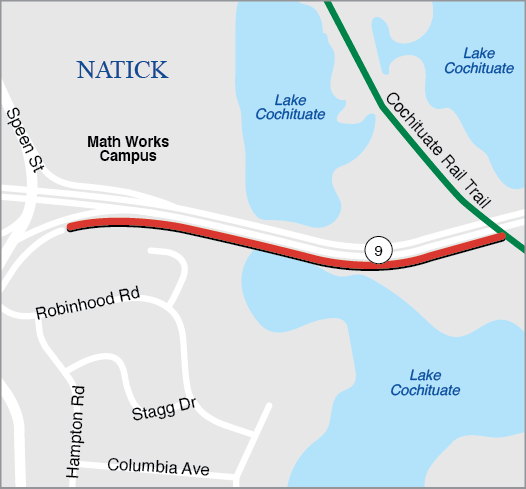
This is a MassDOT-prioritized project and is therefore not directly evaluated using the MPO’s TIP scoring criteria.
This project includes a 0.4-mile segment of shared-used path along Route 9 in Natick. The project limits are from Archer Drive to the Cochituate Rail Trail. No roadway crossings are proposed and the shared-use path will provide a bicycle and pedestrian connection between the Cochituate Rail Trail and the robust residential and commercial area that is located in close proximity to the project’s western terminus, filling a critical gap in the multimodal network.
| Source |
(FFY) 2023 |
2024 |
2025 |
2026 |
2027 |
Total |
|---|---|---|---|---|---|---|
Federal Funds |
--- |
--- |
$2,866,396 |
--- |
--- |
$2,866,396 |
Non-Federal Funds |
--- |
--- |
$716,599 |
--- |
--- |
$716,599 |
Total Funds |
--- |
--- |
$3,582,995 |
--- |
--- |
$3,582,995 |
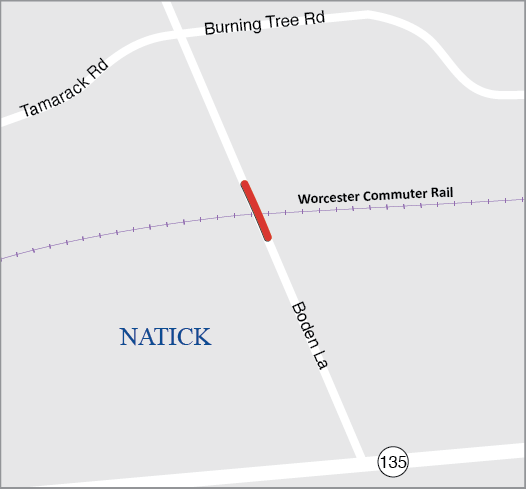
This is a MassDOT-prioritized project and is therefore not directly evaluated using the MPO’s TIP scoring criteria.
This project will replace the superstructure of bridge N-03-012, which carries Boden Lane over the MBTA Framingham/Worcester commuter rail line in Natick. This project is funded through MassDOT’s Next Generation Bridge Program.
| Source |
(FFY) 2023 |
2024 |
2025 |
2026 |
2027 |
Total |
|---|---|---|---|---|---|---|
Federal Funds |
--- |
--- |
--- |
--- |
$0 |
$0 |
Non-Federal Funds |
--- |
--- |
--- |
--- |
$8,270,800 |
$8,270,800 |
Total Funds |
--- |
--- |
--- |
--- |
$8,270,800 |
$8,270,800 |
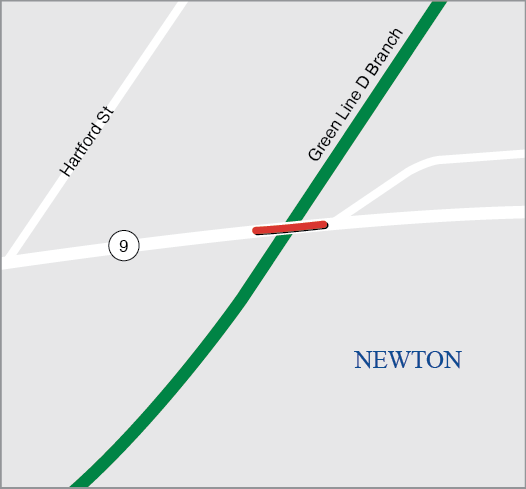
This is a MassDOT-prioritized project and is therefore not directly evaluated using the MPO’s TIP scoring criteria.
This project will replace bridge N-12-040, which carries Boylston Street over the MBTA Green Line in Newton. This bridge is currently listed as structurally deficient. This project is funded through MassDOT’s Next Generation Bridge Program.
| Source |
(FFY) 2023 |
2024 |
2025 |
2026 |
2027 |
Total |
|---|---|---|---|---|---|---|
Federal Funds |
--- |
--- |
$0 |
--- |
--- |
$0 |
Non-Federal Funds |
--- |
--- |
$15,186,854 |
--- |
--- |
$15,186,854 |
Total Funds |
--- |
--- |
$15,186,854 |
--- |
--- |
$15,186,854 |
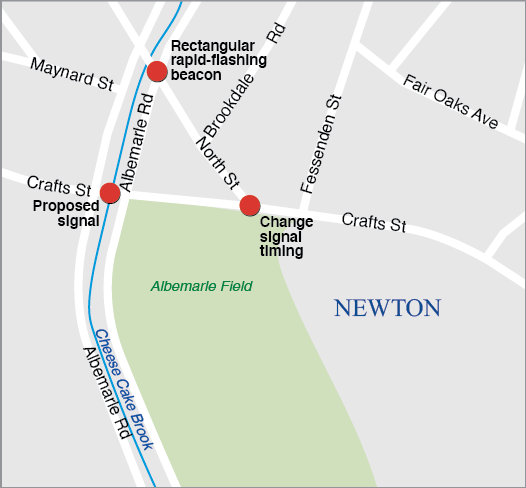
This is a MassDOT-prioritized project and is therefore not directly evaluated using the MPO’s TIP scoring criteria.
This project will upgrade the intersections of Crafts Street and Albemarle Road and Albemarle Road and North Street, to improve bicycle and pedestrian accommodations near the Horace Mann Elementary School, FA Day Middle School, and the Newton Early Childhood Program. The project as proposed includes installing a fully actuated traffic signal at the Crafts Street and Albemarle Road intersection and a rapid-flashing-beacon crosswalk system at the Albemarle Road and North Street intersection. It will also require signal modifications to the existing traffic signal at Crafts Street at North Street.
| Source |
(FFY) 2023 |
2024 |
2025 |
2026 |
2027 |
Total |
|---|---|---|---|---|---|---|
Federal Funds |
--- |
--- |
$689,570 |
--- |
--- |
$689,570 |
Non-Federal Funds |
--- |
--- |
$172,392 |
--- |
--- |
$172,392 |
Total Funds |
--- |
--- |
$861,962 |
--- |
--- |
$861,962 |
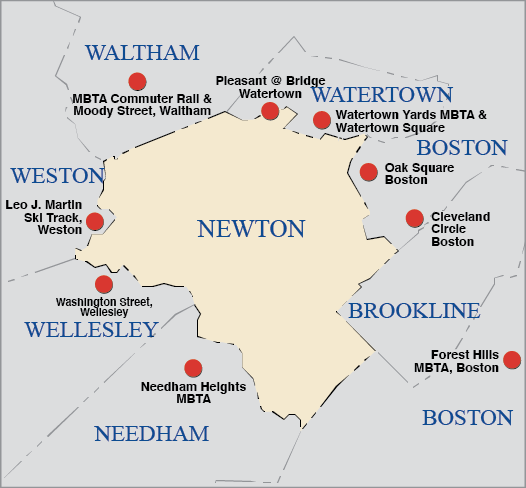
| Category |
Conn |
Coord |
Plan |
TE |
MS/DP |
FS |
Total |
|---|---|---|---|---|---|---|---|
Score |
18 out of 18 |
14 out of 15 |
12 out of 15 |
9 out of 18 |
24 out of 24 |
10 out of 10 |
87 out of 100 |
This project will expand Newton’s existing city-wide microtransit service to include stops in Watertown, Waltham, Weston, Wellesley, Needham, and Boston, with the goal of connecting riders to an expanded network of employment centers, activity hubs, and public transportation options. NewMo is Newton’s on-demand rideshare system, operated by Via. The system uses state-of-the-art technology to cost-effectively deliver dynamically routed, shared rides using microtransit technology. The system is on track to provide 50,000 trips in its first year and sees significant ridership by low-income individuals, commuters, seniors, and students. The Boston Region MPO contributed funding to NewMo’s initial launch, with $727,000 allocated to the project’s first phase in FFYs 2021–23. This second phase is funded through the third round of grants available through the MPO’s Community Connections Program.
| Source |
(FFY) 2023 |
2024 |
2025 |
2026 |
2027 |
Total |
|---|---|---|---|---|---|---|
Federal Funds |
$330,132 |
$214,597 |
$167,730 |
--- |
--- |
$712,459 |
Non-Federal Funds |
$82,533 |
$53,649 |
$41,933 |
--- |
--- |
$178,115 |
Total Funds |
$412,665 |
$268,246 |
$209,663 |
--- |
--- |
$890,574 |
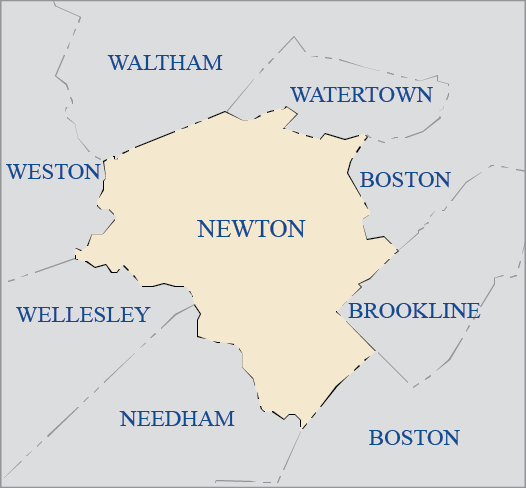
This project received a total score of 53 points when evaluated using the criteria for the pilot round of the MPO’s Community Connections Program. These criteria are listed in table A-11.
This project funds a new technology-enabled transportation service that will serve all residents, students and employees in Newton. The system will provide shared, first- and last-mile rides between three MBTA rail lines and the Wells Avenue Business District before expanding citywide. The City will deliver the service using on-demand, dynamically routed microtransit technology. This system will build on Newton’s NewMo microtransit system, operated by Via, which will provide 25,000 rides to Newton seniors in its first year. This project is funded over three years (FFYs 2021-23) through the MPO’s Community Connections Program.
| Source |
2023 |
2024 |
2025 |
2026 |
2027 |
Total |
|---|---|---|---|---|---|---|
Federal Funds |
$121,600 |
--- |
--- |
--- |
--- |
$121,600 |
Non-Federal Funds |
$30,400 |
--- |
--- |
--- |
--- |
$30,400 |
Total Funds |
$152,000 |
--- |
--- |
--- |
--- |
$152,000 |
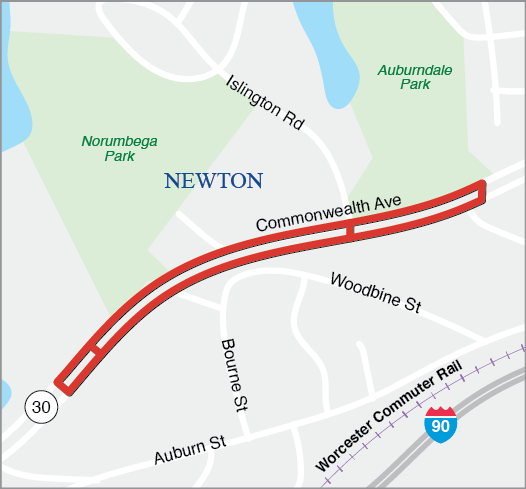
| Category |
Safety |
Sys Pres |
CM/M |
CA/SC |
TE |
EV |
Total |
|---|---|---|---|---|---|---|---|
Score |
7 out of 30 |
16 out of 29 |
13 out of 29 |
6 out of 16 |
1 out of 12 |
8 out of 18 |
51 out of 134 |
The project aims to create safe bicycle and pedestrian facilities to improve the City of Newton’s connectivity to green space, trails, and other recreation opportunities. The proposed improvements to Route 30 and the adjacent carriageway begin just east of Auburn Street and end at Ash Street. For the segment from Auburn Street to Woodbine Street, the project will narrow the existing median and repurpose the space on the north side of the roadway to either a shared-use path or separated bicycle and pedestrian facilities. East of Woodbine Street, the existing 22-foot carriageway will be converted to the shared-use path or separated bicycle and pedestrian facilities. The existing cross section of Route 30 will be maintained, but five-foot shoulders will be striped to allow for on-road bicycling facilities. There will be three mid-block crossings with pedestrian beacons installed at MBTA bus stops and the Blue Heron trail entrance. The intersection at Ash Street will be reconstructed to improve pedestrian and bicycle crossings and address circulation issues at Lyons Field. This project was evaluated using the MPO’s scoring criteria because it was considered for funding using Regional Target Funds. MassDOT funded the project, however.
| Source |
(FFY) 2023 |
2024 |
2025 |
2026 |
2027 |
Total |
|---|---|---|---|---|---|---|
Federal Funds |
$5,237,094 |
--- |
--- |
--- |
--- |
$5,237,094 |
Non-Federal Funds |
$1,309,273 |
--- |
--- |
--- |
--- |
$1,309,273 |
Total Funds |
$6,546,367 |
--- |
--- |
--- |
--- |
$6,546,367 |
-01.png)
This project was selected for funding by the MPO late in the FFYs 2023–27 TIP development cycle, so it has not yet been scored using the MPO’s project selection criteria. This section will be updated with the project’s final score when it is available.
This project will replace bridge N-12-010=W-29-005 that carries Commonwealth Avenue (Route 30) over the Charles River between Newton and Weston. The project aims to improve the existing poor condition of the bridge and improve safety at the interchange while adding new bicycle and pedestrian accommodations to the corridor. These new facilities for people walking and bicycling will connect to facilities being constructed as a part of adjacent projects on Route 30, including improvements in Newton that are funded by MassDOT in FFY 2023 (project number 610674) and the reconstruction of Route 30 in Weston, funded by the MPO in FFY 2026 (project number 608954).
| Source |
(FFY) 2023 |
2024 |
2025 |
2026 |
2027 |
Total |
|---|---|---|---|---|---|---|
Federal Funds |
--- |
$18,180,656 |
--- |
--- |
--- |
$18,180,656 |
Non-Federal Funds |
--- |
$4,545,164 |
--- |
--- |
--- |
$4,545,164 |
Total Funds |
--- |
$22,725,821 |
--- |
--- |
--- |
$22,725,821 |
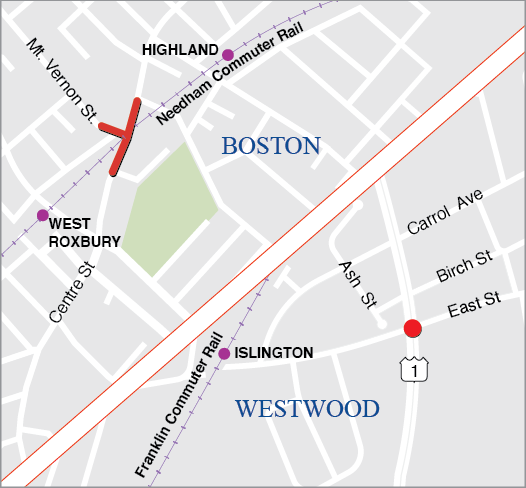
This is a MassDOT-prioritized project and is therefore not directly evaluated using the MPO’s TIP scoring criteria.
The work consists of cleaning and painting of structural steel on bridges N-12-0056 and W-31-006 in Newton and Westwood.
| Source |
(FFY) 2023 |
2024 |
2025 |
2026 |
2027 |
Total |
|---|---|---|---|---|---|---|
Federal Funds |
$1,714,286 |
|
--- |
--- |
--- |
$1,714,286 |
Non-Federal Funds |
$428,571 |
|
--- |
--- |
--- |
$428,571 |
Total Funds |
$2,142,857 |
|
--- |
--- |
--- |
$2,142,857 |
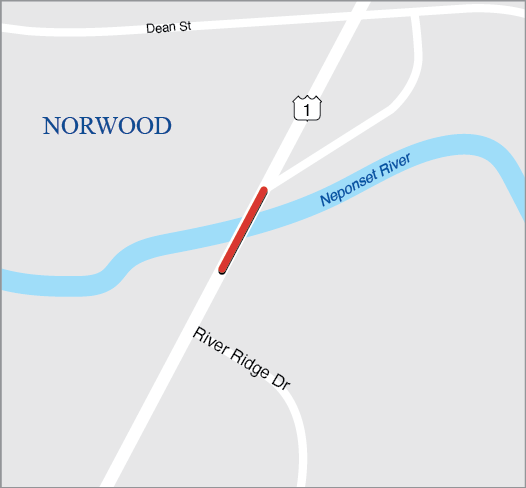
This is a MassDOT-prioritized project and is therefore not directly evaluated using the MPO’s TIP scoring criteria.
This project will rehabilitate bridge N-25-026, which carries Providence Highway (State Route 1) over the Neponset River in Norwood.
| Source |
(FFY) 2023 |
2024 |
2025 |
2026 |
2027 |
Total |
|---|---|---|---|---|---|---|
Federal Funds |
--- |
--- |
--- |
$2,870,741 |
--- |
$2,870,741 |
Non-Federal Funds |
--- |
--- |
--- |
$717,685 |
--- |
$717,685 |
Total Funds |
--- |
--- |
--- |
$3,588,426 |
--- |
$3,588,426 |
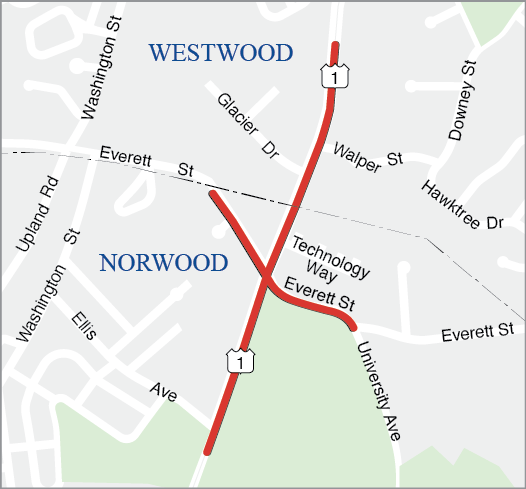
| Category |
Safety |
Sys Pres |
CM/M |
CA/SC |
TE |
EV |
Total |
|---|---|---|---|---|---|---|---|
Score |
11 out of 30 |
12 out of 29 |
15 out of 29 |
11 out of 16 |
2 out of 12 |
4 out of 18 |
55 out of 134 |
This project includes traffic signal upgrades and associated geometric improvements at the intersection of Route 1 with University Avenue and Everett Street. Related improvements include constructing an additional travel lane in each direction on Route 1, upgrading of traffic signals, lengthening of left-turn lanes on Route 1, upgrading of pedestrian crossings at each leg of the intersection, and upgrading of bicycle amenities (loop detectors) at the intersection. Rehabilitation of sidewalks, curbing, median structures, lighting, and guard rails are also proposed.
| Source |
(FFY) 2022 |
2023 |
2024 |
2025 |
2027 |
Total |
|---|---|---|---|---|---|---|
Federal Funds |
--- |
--- |
$7,263,173 |
$12,670,296 |
--- |
$19,933,469 |
Non-Federal Funds |
--- |
--- |
$1,736,827 |
$3,167,574 |
--- |
$4,904,401 |
Total Funds |
--- |
--- |
$9,000,000 |
$15,837,870 |
--- |
$24,837,870 |
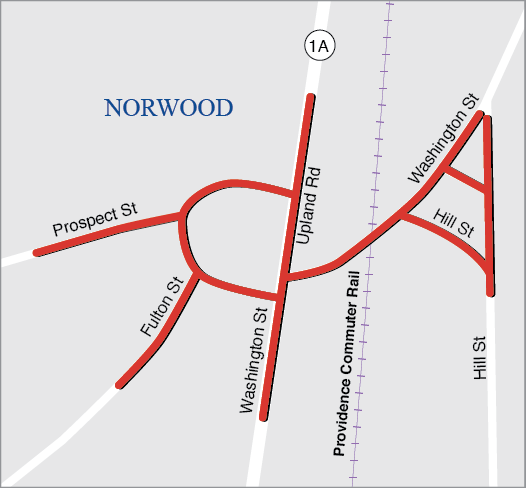
| Category |
Safety |
Sys Pres |
CM/M |
CA/SC |
TE |
EV |
Total |
|---|---|---|---|---|---|---|---|
Score |
13 out of 30 |
7 out of 29 |
14 out of 29 |
3 out of 16 |
3 out of 12 |
7 out of 18 |
47 out of 134 |
This project involves intersection improvements at two locations on Route 1A through the installation of traffic and pedestrian signals to support vehicle flow and roadway safety. In addition, Washington Street and Upland Road will be widened to accommodate turning lanes and existing sidewalks will be reconstructed to meet ADA/AAB standards with upgraded pavement markings.
| Source |
(FFY) 2023 |
2024 |
2025 |
2026 |
2027 |
Total |
|---|---|---|---|---|---|---|
Federal Funds |
$6,361,824 |
--- |
--- |
--- |
--- |
$6,361,824 |
Non-Federal Funds |
$1,590,456 |
--- |
--- |
--- |
--- |
$1,590,456 |
Total Funds |
$7,952,280 |
--- |
--- |
--- |
--- |
$7,952,280 |
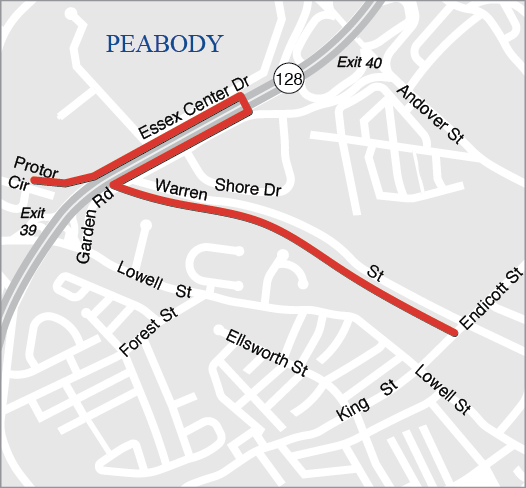
| Category |
Safety |
Sys Pres |
CM/M |
CA/SC |
TE |
EV |
Total |
|---|---|---|---|---|---|---|---|
Score |
9 out of 30 |
4 out of 29 |
9 out of 29 |
4 out of 16 |
4 out of 12 |
4 out of 18 |
34 out of 134 |
This project will extend the Independence Greenway 1.3 miles east from its present terminus at the North Shore Mall to the intersection of the Warren Street Extension and Endicott Street in central Peabody. When complete, the project will bring the greenway’s total length to eight miles. This project makes use of an existing rail corridor as it runs parallel to Lowell Street.
| Source |
(FFY) 2023 |
2024 |
2025 |
2026 |
2027 |
Total |
|---|---|---|---|---|---|---|
Federal Funds |
--- |
$3,137,698 |
--- |
--- |
--- |
$3,137,698 |
Non-Federal Funds |
--- |
$784,424 |
--- |
--- |
--- |
$784,424 |
Total Funds |
--- |
$3,922,122 |
--- |
--- |
--- |
$3,922,122 |
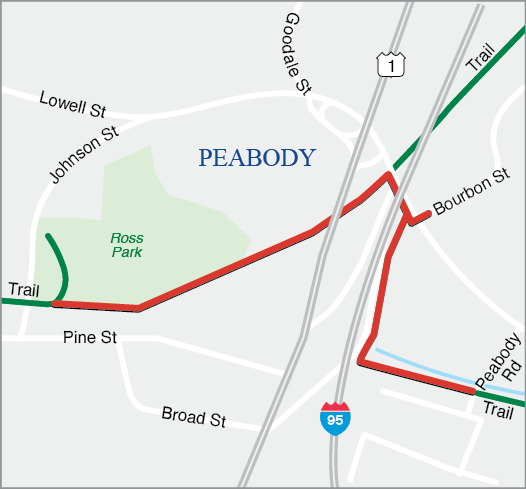
| Category |
Safety |
Sys Pres |
CM/M |
CA/SC |
TE |
EV |
Total |
|---|---|---|---|---|---|---|---|
Score |
15 out of 30 |
13 out of 29 |
11 out of 29 |
4 out of 16 |
4 out of 12 |
6 out of 18 |
53 out of 134 |
The project includes construction of a new 12-foot wide multi-use paved path along the abandoned railbed between two existing segments of the Independence Greenway in Peabody. The project also includes a connection to the existing Border to Boston trailhead at Lowell Street. The work includes full-depth pavement construction, minor drainage improvements, vegetative privacy screening, new and reset granite curb, new cement concrete sidewalk and hot mix asphalt, signal upgrades at the intersections of Lowell and Bourbon Streets and Route 1 northbound and Lowell Street, a new two-span steel pedestrian bridge, and various curb, walking, and parking improvements to the existing parking lot at 215 Newbury Street.
| Source |
(FFY) 2023 |
2024 |
2025 |
2026 |
2027 |
Total |
|---|---|---|---|---|---|---|
Federal Funds |
--- |
--- |
$5,067,360 |
--- |
--- |
$5,067,360 |
Non-Federal Funds |
--- |
--- |
$1,266,840 |
--- |
--- |
$1,266,840 |
Total Funds |
--- |
--- |
$6,334,200 |
--- |
--- |
$6,334,200 |
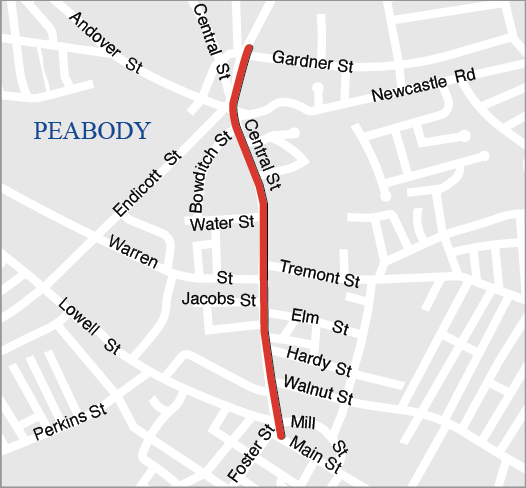
| Category |
Safety |
Sys Pres |
CM/M |
CA/SC |
TE |
EV |
Total |
|---|---|---|---|---|---|---|---|
Score |
21 out of 30 |
17 out of 29 |
9 out of 29 |
3 out of 16 |
7 out of 12 |
4 out of 18 |
61 out of 134 |
Given the condition of the existing pavement based on a visual inspection, as well as the number of utility trenches that have exhibited signs of differential settlement, the project is currently proposed to reconstruct the pavement via full depth pavement reclamation. The project will also include the reconstruction of cement concrete sidewalks and crossings with curb extensions and new granite curbing, addition of dedicated bicycle accommodations (bike lane and/or sharrows), installation of new signage and pavement markings, streetscape enhancements and amenities, and drainage system improvements corridor-wide. For the reconstructed intersections noted, new signal equipment will be provided at all locations. All signal equipment proposed will be NEMA TS2 Type 1, with countdown pedestrian heads, vibrotactile pedestrian push buttons with audible speech messages, optical emergency vehicles preemption, and video vehicle detection.
| Source |
(FFY) 2022 |
2023 |
2024 |
2025 |
2026 |
Total |
|---|---|---|---|---|---|---|
Federal Funds |
$12,325,888 |
--- |
--- |
--- |
--- |
$12,325,888 |
Non-Federal Funds |
$2,893,972 |
--- |
--- |
--- |
--- |
$2,893,972 |
Total Funds |
$15,219,860 |
--- |
--- |
--- |
--- |
$15,219,860 |
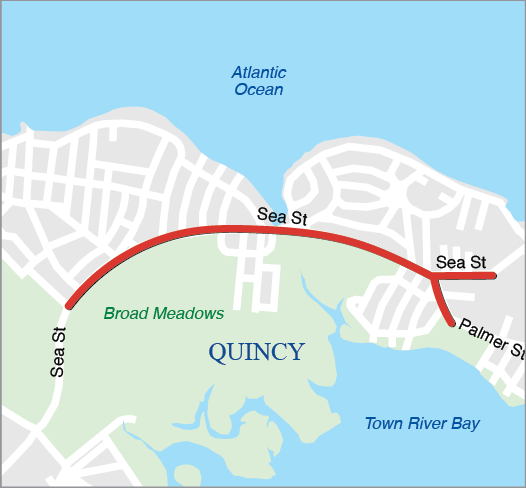
| Category |
Safety |
Sys Pres |
CM/M |
CA/SC |
TE |
EV |
Total |
|---|---|---|---|---|---|---|---|
Score |
10 out of 30 |
16 out of 29 |
7 out of 29 |
4 out of 16 |
2 out of 12 |
1 out of 18 |
40 out of 134 |
This project involves traffic and safety improvements for all users along Sea Street through the reconstruction of sidewalks with ADA-compliant ramps, the provision of bicycle accommodations, and the construction of median islands. Geometric modifications of the roadway and upgraded traffic signal systems will also be established to enhance safety.
| Source |
(FFY) 2023 |
2024 |
2025 |
2026 |
2027 |
Total |
|---|---|---|---|---|---|---|
Federal Funds |
$4,842,049 |
--- |
--- |
--- |
--- |
$9,733,310 |
Non-Federal Funds |
$1,210,513 |
--- |
--- |
--- |
--- |
$2,433,328 |
Total Funds |
$6,052,562 |
--- |
--- |
--- |
--- |
$12,166,638 |
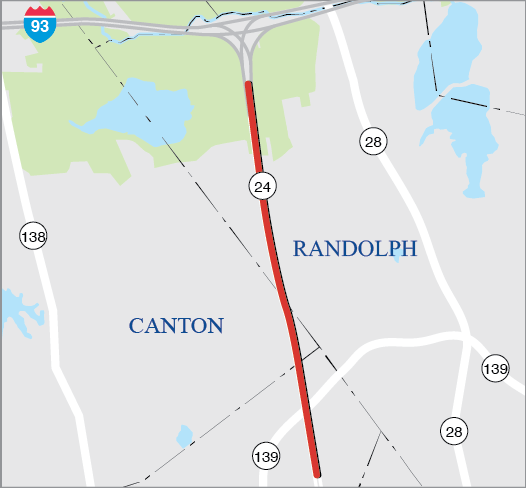
This is a MassDOT-prioritized project and is therefore not directly evaluated using the MPO’s TIP scoring criteria.
This project will improve the pavement condition and make other associated improvements on Route 24 in Randolph between the Route 24 and Interstate 93 interchange and Page Street, a distance of approximately four miles.
| Source |
(FFY) 2023 |
2024 |
2025 |
2026 |
2027 |
Total |
|---|---|---|---|---|---|---|
Federal Funds |
--- |
--- |
--- |
$7,573,440 |
--- |
$7,573,440 |
Non-Federal Funds |
--- |
--- |
--- |
$1,893,360 |
--- |
$1,893,360 |
Total Funds |
--- |
--- |
--- |
$9,466,800 |
--- |
$9,466,800 |
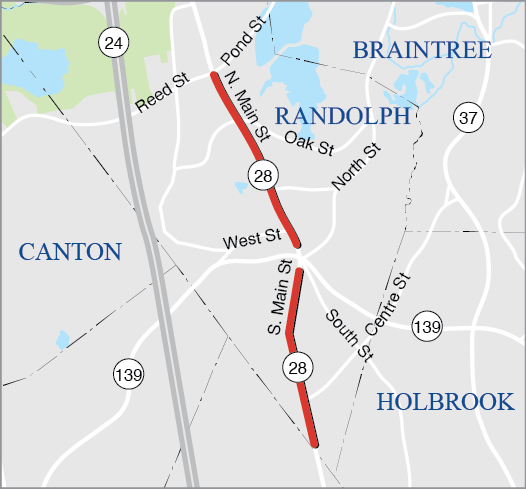
This is a MassDOT-prioritized project and is therefore not directly evaluated using the MPO’s TIP scoring criteria.
This project involves the resurfacing of 13.2 lane miles of Route 28 in Randolph. The project includes two sections of Route 28, from mile marker 105.8 to 107.4 and from mile marker 107.6 to 109.3.
| Source |
(FFY) 2023 |
2024 |
2025 |
2026 |
2027 |
Total |
|---|---|---|---|---|---|---|
Federal Funds |
--- |
--- |
$5,544,651 |
--- |
--- |
$5,544,651 |
Non-Federal Funds |
--- |
--- |
$1,386,163 |
--- |
--- |
$1,386,163 |
Total Funds |
--- |
--- |
$6,930,814 |
--- |
--- |
$6,930,814 |
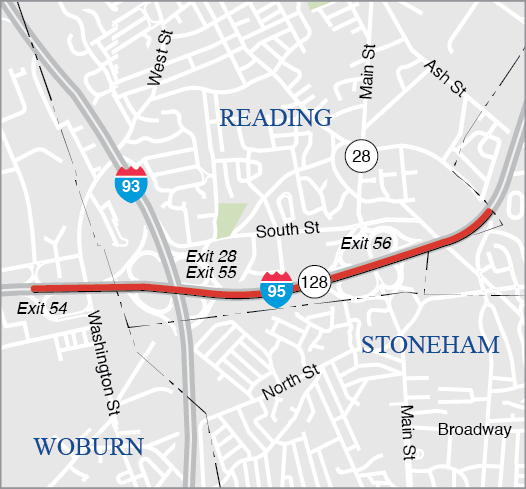
This is a MassDOT-prioritized project and is therefore not directly evaluated using the MPO’s TIP scoring criteria.
This project will improve Interstate 95 in between Commerce Way in Woburn and Ash Street in Reading, a distance of approximately two miles.
| Source |
(FFY) 2023 |
2024 |
2025 |
2026 |
2027 |
Total |
|---|---|---|---|---|---|---|
Federal Funds |
--- |
--- |
--- |
--- |
$13,901,440 |
$13,901,440 |
Non-Federal Funds |
--- |
--- |
--- |
--- |
$3,475,360 |
$3,475,360 |
Total Funds |
--- |
--- |
--- |
--- |
$17,376,800 |
$17,376,800 |
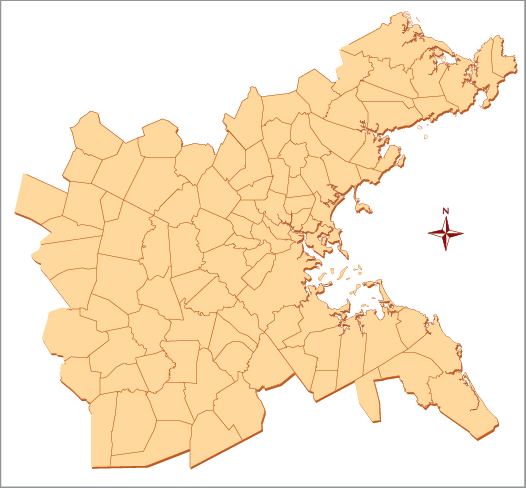
The scoring criteria for the Community Connections Program are listed in Appendix A. Scores for projects funded in the FFYs 2023-27 TIP through this program are available on those projects’ pages within this chapter.
The Community Connections Program is the MPO’s funding program for first- and last-mile solutions, community transportation, and other small, nontraditional transportation projects such as those that update transit technology and improve bicycle and pedestrian facilities. The Community Connections Program is one of the investment programs included in the MPO’s current Long-Range Transportation Plan, Destination 2040. The program was originally funded at a level of $2 million per year in Regional Target funds beginning in FFY 2021. With the increase in funds available to the MPO through the Bipartisan Infrastructure Law, the funding level for this program has been increased to $2.5 million annually beginning in FFY 2023. Thirteen projects are funded in the FFYs 2023-27 TIP through this program, the details of which are available in this chapter. Remaining funding in FFYs 2024 through 2027 will be allocated during future TIP cycles.
| Source |
(FFY) 2023 |
2024 |
2025 |
2026 |
2027 |
Total |
|---|---|---|---|---|---|---|
Federal Funds |
--- |
$513,196 |
$860,243 |
$2,000,000 |
$2,000,000 |
$5,373,439 |
Non-Federal Funds |
--- |
$128,299 |
$215,061 |
$500,000 |
$500,000 |
$1,343,360 |
Total Funds |
--- |
$641,495 |
$1,075,304 |
$2,500,000 |
$2,500,000 |
$6,716,799 |

No projects have yet been scored using the Transit Modernization criteria. Projects will be evaluated by the MPO in future TIP cycles for funding within this investment program.
The MPO’s Transit Modernization Program was established in Destination 2040, the MPO’s current Long-Range Transportation Plan. This program will allocate a portion of the MPO’s Regional Target Highway funds to transit projects that advance the MPO’s goals in the region, including upgrades to stations and facilities and the purchase of vehicles for transit providers. Scoring criteria are being developed for this program and specific projects will be funded through this program during a future TIP cycle. The MPO anticipates allocating
five percent of its funding, or approximately $6,500,000 annually, to this program beginning in FFY 2025.
| Source |
(FFY) 2023 |
2024 |
2025 |
2026 |
2027 |
Total |
|---|---|---|---|---|---|---|
Federal Funds |
--- |
--- |
$5,200,000 |
$5,200,000 |
$5,200,000 |
$15,600,000 |
Non-Federal Funds |
--- |
--- |
$1,300,000 |
$1,300,000 |
$1,300,000 |
$3,900,000 |
Total Funds |
--- |
--- |
$6,500,000 |
$6,500,000 |
$6,500,000 |
$19,500,000 |
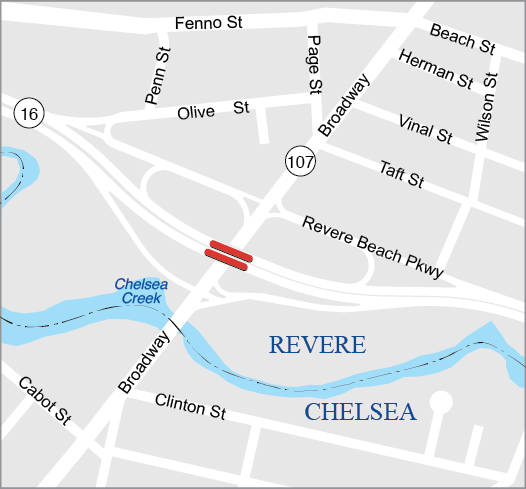
This is a MassDOT-prioritized project and is therefore not directly evaluated using the MPO’s TIP scoring criteria.
This project will replace bridge R-05-015, which carries Revere Beach Parkway over Broadway in Revere. This bridge is currently listed as structurally deficient. This project is funded through MassDOT’s Next Generation Bridge Program.
| Source |
(FFY) 2023 |
2024 |
2025 |
2026 |
2027 |
Total |
|---|---|---|---|---|---|---|
Federal Funds |
--- |
--- |
$0 |
--- |
--- |
$0 |
Non-Federal Funds |
--- |
--- |
$20,243,805 |
--- |
--- |
$20,243,805 |
Total Funds |
--- |
--- |
$20,243,805 |
--- |
--- |
$20,243,805 |
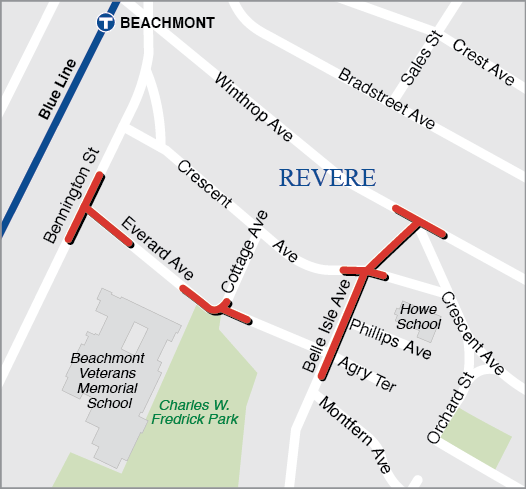
This is a MassDOT-prioritized project and is therefore not directly evaluated using the MPO’s TIP scoring criteria.
This Safe Routes to School project proposes pedestrian improvements at several intersections surrounding Beachmont Veterans Elementary School in Revere. This project will reconstruct sections of sidewalk and curbing, improve markings at several crosswalks, and add tactile warning panels at some locations.
| Source |
(FFY) 2023 |
2024 |
2025 |
2026 |
2027 |
Total |
|---|---|---|---|---|---|---|
Federal Funds |
--- |
--- |
$270,705 |
--- |
--- |
$270,705 |
Non-Federal Funds |
--- |
--- |
$67,676 |
--- |
--- |
$67,676 |
Total Funds |
--- |
--- |
$338,381 |
--- |
--- |
$338,381 |
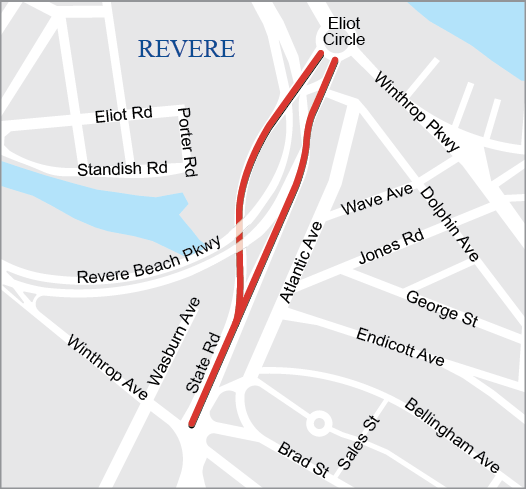
This is a MassDOT-prioritized project and is therefore not directly evaluated using the MPO’s TIP scoring criteria.
The primary goal of this project is to provide a safe path for bicyclists and improve pedestrian and vehicular safety along State Road between Donnelly Square and Eliot Circle in Revere. The proposed scope will reduce both northbound and southbound travel on State Road from two lanes to a single lane to provide bicycle and pedestrian facilities, including a two-way separated bicycle lane on the west side of the corridor and a one-way parking-protected bicycle lane along the east side of the corridor. This project will improve the sidewalk along both sides of State Road, providing a direct connection for pedestrians to the Beachmont MBTA Blue Line station that is comfortable, safe, and accessible. Crosswalks with accessible ramps are proposed across all side streets and there is a proposed crossing of State Road just south of Ocean Avenue that will connect proposed facilities to the existing sidewalk on Revere Beach Parkway.
| Source |
(FFY) 2023 |
2024 |
2025 |
2026 |
2027 |
Total |
|---|---|---|---|---|---|---|
Federal Funds |
--- |
--- |
$4,076,004 |
--- |
--- |
$4,076,004 |
Non-Federal Funds |
--- |
--- |
$1,019,001 |
--- |
--- |
$1,019,001 |
Total Funds |
--- |
--- |
$5,095,005 |
--- |
--- |
$5,095,005 |
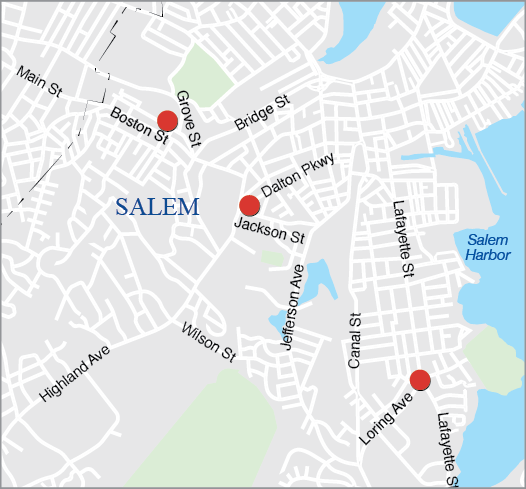
| Category |
Conn |
Coord |
Plan |
TE |
MS/DP |
FS |
Total |
|---|---|---|---|---|---|---|---|
Score |
13 out of 18 |
15 out of 15 |
6 out of 15 |
9 out of 18 |
24 out of 24 |
10 out of 10 |
77 out of 100 |
This project supports the purchase of bikes and stations to expand Salem’s Bluebikes system to reach a critical mass that meets the mobility needs of the community’s residents, employees, students, and visitors. The City launched a 7- station, 44-bike system in June of 2020, funded in part by a MassDOT Shared Streets and Spaces grant, to serve the downtown core and select destinations. This project will add three additional stations at Salem State University—North Campus; Goodhue Street and Grove Street, near the Bridge Street Multi-Use Path; and Essex Street and Dalton Parkway, near Salem’s middle and high schools and Salem Hospital. This project is funded through the third round of grants available through the MPO’s Community Connections Program.
| Source |
(FFY) 2023 |
2024 |
2025 |
2026 |
2027 |
Total |
|---|---|---|---|---|---|---|
Federal Funds |
$95,703 |
--- |
--- |
--- |
--- |
$95,703 |
Non-Federal Funds |
$23,926 |
--- |
--- |
--- |
--- |
$23,926 |
Total Funds |
$119,629 |
--- |
--- |
--- |
--- |
$119,629 |
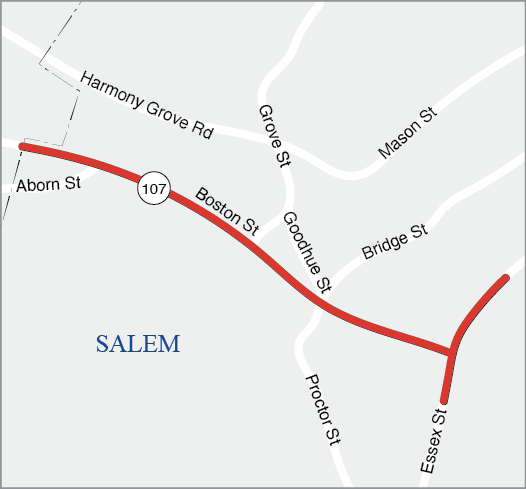
| Category |
Safety |
Sys Pres |
CM/M |
CA/SC |
TE |
EV |
Total |
|---|---|---|---|---|---|---|---|
Score |
12 out of 18 |
15 out of 20 |
11 out of 18 |
8 out of 12 |
10.8 out of 20 |
11 out of 12 |
67.8 out of 100 |
This project aims to improve mobility for vehicles, bicycles, and pedestrians between Salem and Peabody and create separated bicycle facilities between the two municipalities that do not currently exist today. In addition to off-street bicycle facilities, major improvements to the corridor include incorporating Complete Streets design elements such as ADA/AAB-compliant sidewalks, pedestrian ramps, and crosswalks. This project will add a new traffic signal at the intersection of Boston Street and Aborn Street and will upgrade existing traffic signals at the intersections of Boston Street and Essex Street, Boston Street and Bridge Street/Proctor Street/Goodhue Street, and Boston Street and Grove Street/Nichols Street.
| Source |
(FFY) 2023 |
2024 |
2025 |
2026 |
2027 |
Total |
|---|---|---|---|---|---|---|
Federal Funds |
--- |
--- |
--- |
$11,182,080 |
--- |
$11,182,080 |
Non-Federal Funds |
--- |
--- |
--- |
$2,795,520 |
--- |
$2,795,520 |
Total Funds |
--- |
--- |
--- |
$13,977,600 |
--- |
$13,977,600 |
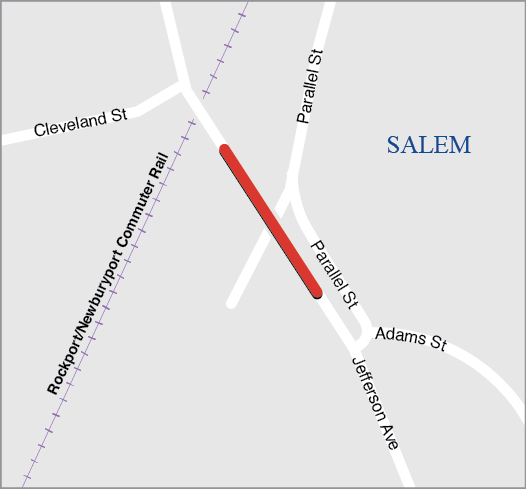
This is a MassDOT-prioritized project and is therefore not directly evaluated using the MPO’s TIP scoring criteria.
This project will replace bridge S-01-024, which carries Jefferson Avenue over Parallel Street in Salem.
| Source |
(FFY) 2023 |
2024 |
2025 |
2026 |
2027 |
Total |
|---|---|---|---|---|---|---|
Federal Funds |
--- |
--- |
--- |
$2,591,232 |
--- |
$2,591,232 |
Non-Federal Funds |
--- |
--- |
--- |
$647,808 |
--- |
$647,808 |
Total Funds |
--- |
--- |
--- |
$3,329,040 |
--- |
$3,329,040 |
-01.png)
This is a MassDOT-prioritized project and is therefore not directly evaluated using the MPO’s TIP scoring criteria.
This project will make upgrades to promote safety along the roadways surrounding Cottage Street Elementary School in Sharon through the Safe Routes to School program. This project proposes to create continuous sidewalks along the entirety of Cottage Street, from Billings Street to Ames Street. Work will involve reconstructing all existing sidewalks and adding new sidewalks where none exist today. The project also proposes the addition of rectangular-rapid-flashing beacons at five crosswalks along Cottage Street.
| Source |
(FFY) 2023 |
2024 |
2025 |
2026 |
2027 |
Total |
|---|---|---|---|---|---|---|
Federal Funds |
--- |
--- |
--- |
$1,149,532 |
--- |
$1,149,532 |
Non-Federal Funds |
--- |
--- |
--- |
$287,383 |
--- |
$287,383 |
Total Funds |
--- |
--- |
--- |
$1,436,915 |
--- |
$1,436,915 |
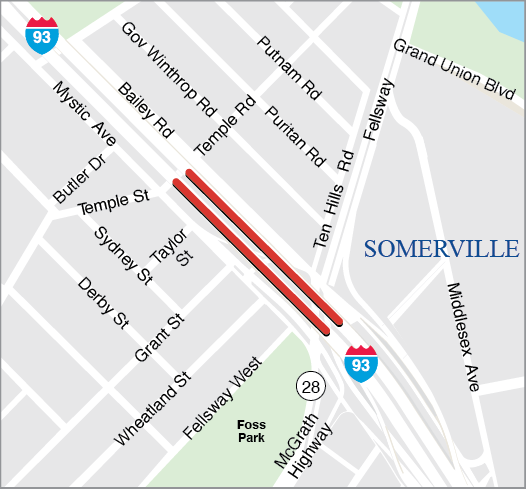
This is a MassDOT-prioritized project and is therefore not directly evaluated using the MPO’s TIP scoring criteria.
This project will rehabilitate bridge S-17-031, which carries an elevated portion of Interstate 93 between Route 28 and Temple Street in Somerville. This is a continuation of a bridge preservation project on the same portion of Interstate 93 (project number 606528), which began construction in late 2021.
| Source |
(FFY) 2023 |
2024 |
2025 |
2026 |
2027 |
Total |
|---|---|---|---|---|---|---|
Federal Funds |
--- |
--- |
--- |
$162,607,408 |
--- |
$162,607,408 |
Non-Federal Funds |
--- |
--- |
--- |
$40,651,852 |
--- |
$40,651,852 |
Total Funds |
--- |
--- |
--- |
$203,259,260 |
--- |
$203,259,260 |
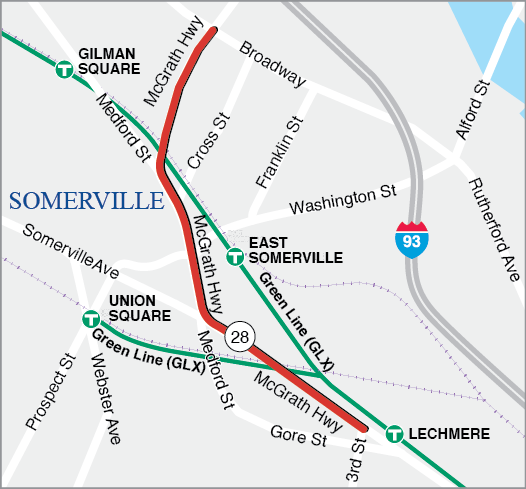
| Category |
Safety |
Sys Pres |
CM/M |
CA/SC |
TE |
EV |
Total |
|---|---|---|---|---|---|---|---|
Score |
13 out of 18 |
19 out of 20 |
13 out of 18 |
8 out of 12 |
9.2 out of 20 |
10 out of 12 |
72.2 out of 100 |
This project will remove the existing McCarthy Viaduct along McGrath Boulevard in Somerville and replace it with an at-grade urban boulevard, approximately 1.5 miles long, from Broadway in the north to Third Street in the south. The project will result in more conventional intersection configurations at Washington Street and Somerville Avenue, which are currently under or next to the viaduct. Removing the viaduct will physically reconnect the neighborhoods of Somerville with more direct vehicle, pedestrian, bicycle, and transit networks. The project will enhance transit access along the corridor, improving bus operations and the bus rider experience with the installation of floating/in-lane bus stops, transit signal priority, and bus queue-jump lanes at key intersections. New sidewalks and bicycle facilities will be provided for the length of the proposed McGrath Boulevard and will connect with the extended Somerville Community Path, creating access to the regional bicycle network. The proposed facilities will provide direct intermodal connections to existing bus routes and the new Green Line station in East Somerville. This project is anticipated to be funded over four fiscal years, with the first year of funding in FFY 2027.
| Source |
(FFY) 2023 |
2024 |
2025 |
2026 |
2027 |
Total |
|---|---|---|---|---|---|---|
Federal Funds |
--- |
--- |
--- |
--- |
$16,000,000 |
$16,000,000 |
Non-Federal Funds |
--- |
--- |
--- |
--- |
$4,000,000 |
$4,000,000 |
Total Funds |
--- |
--- |
--- |
--- |
$20,000,000 |
$20,000,000 |
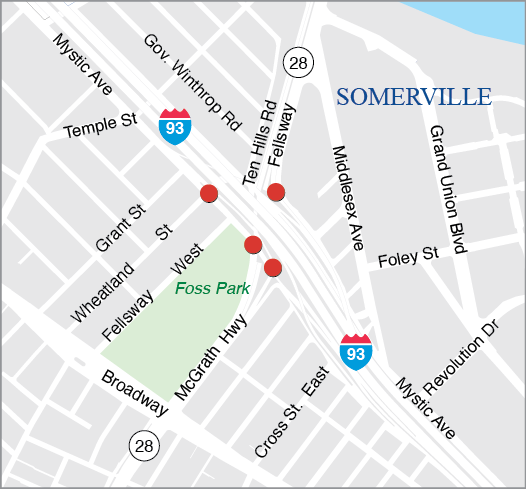
This is a MassDOT-prioritized project and is therefore not directly evaluated using the MPO’s TIP scoring criteria.
The project includes traffic signal upgrades and safety improvements at the following locations: Mystic Avenue northbound and Route 28 (Fellsway); Route 38 (Mystic Avenue) southbound and Route 28 (McGrath Highway) southbound; Route 38 (Mystic Avenue) southbound and Route 28 (McGrath Highway) northbound; and Route 38 (Mystic Avenue) southbound at Wheatland Street.
| Source |
(FFY) 2023 |
2024 |
2025 |
2026 |
2027 |
Total |
|---|---|---|---|---|---|---|
Federal Funds |
--- |
$5,439,645 |
--- |
--- |
--- |
$5,439,645 |
Non-Federal Funds |
--- |
$682,914 |
--- |
--- |
--- |
$682,914 |
Total Funds |
--- |
$6,122,559 |
--- |
--- |
--- |
$6,122,559 |
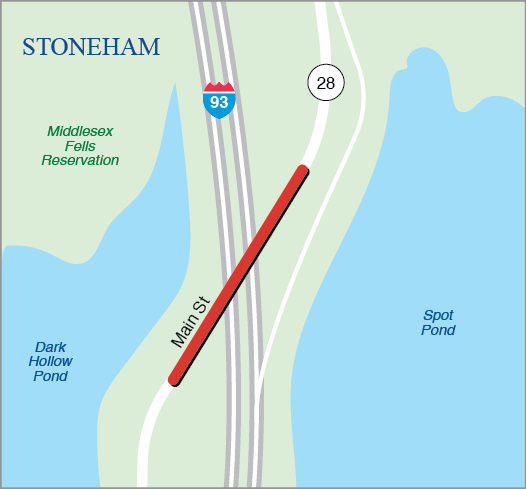
This is a MassDOT-prioritized project and is therefore not directly evaluated using the MPO’s TIP scoring criteria.
This project will replace the bridge deck and repair the superstructure on bridge S-27-006 (2L2), carrying Fellsway West over Interstate 93 in Stoneham. This project is funded through MassDOT’s Next Generation Bridge Program.
| Source |
(FFY) 2023 |
2024 |
2025 |
2026 |
2027 |
Total |
|---|---|---|---|---|---|---|
Federal Funds |
--- |
--- |
$0 |
--- |
--- |
%0 |
Non-Federal Funds |
--- |
--- |
$3,240,000 |
--- |
--- |
$3,240,000 |
Total Funds |
--- |
--- |
$3,240,000 |
--- |
--- |
$3,240,000 |
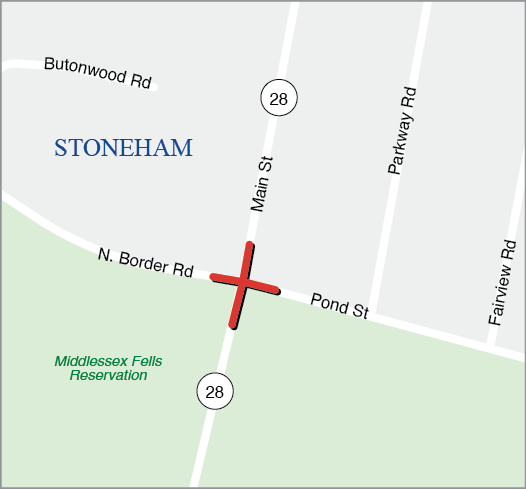
This is a MassDOT-prioritized project and is therefore not directly evaluated using the MPO’s TIP scoring criteria.
This project will make intersection improvements at Route 28 (Main Street), North Border Road, and South Street in Stoneham.
| Source |
(FFY) 2023 |
2024 |
2025 |
2026 |
2027 |
Total |
|---|---|---|---|---|---|---|
Federal Funds |
--- |
--- |
--- |
$4,384,801 |
--- |
$4,384,801 |
Non-Federal Funds |
--- |
--- |
--- |
$487,200 |
--- |
$487,200 |
Total Funds |
--- |
--- |
--- |
$4,872,001 |
--- |
$4,872,001 |
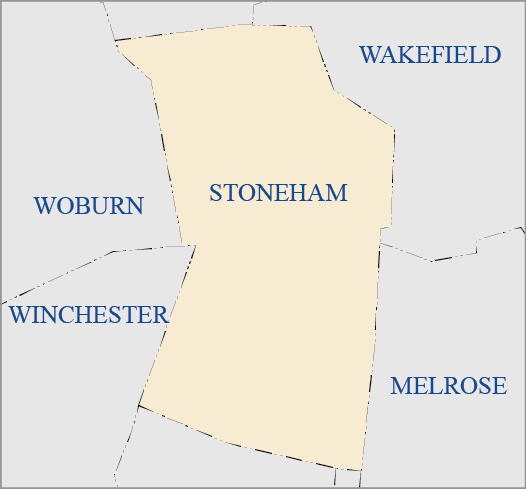
| Category |
Conn |
Coord |
Plan |
TE |
MS/DP |
FS |
Total |
|---|---|---|---|---|---|---|---|
Score |
15 out of 18 |
12 out of 15 |
12 out of 15 |
6 out of 18 |
17 out of 24 |
10 out of 10 |
72 out of 100 |
This project will create a local shuttle service that, will connect Stoneham residents and employees of Stoneham businesses to transportation options in surrounding communities during peak hours and within Stoneham during non-peak hours. The primary goal of this project is to fill gaps in the existing MBTA service network by creating an east-west connection across Stoneham where only north-south MBTA bus service exists today. The Town plans to use a 24-passenger bus that would operate on a 12-hour/day schedule Monday-Friday, with shorter hours on Saturday. During peak hours, the shuttle would stop at defined destinations along the route. During off-peak hours, the shuttle could go off-route based on the needs of riders. This project is funded through the third round of grants available through the MPO’s Community Connections Program.
| Source |
(FFY) 2023 |
2024 |
2025 |
2026 |
2027 |
Total |
|---|---|---|---|---|---|---|
Federal Funds |
$264,151 |
$209,151 |
$164,151 |
--- |
--- |
$637,453 |
Non-Federal Funds |
$66,038 |
$52,288 |
$41,038 |
--- |
--- |
$159,364 |
Total Funds |
$330,189 |
$261,439 |
$205,189 |
--- |
--- |
$796,817 |
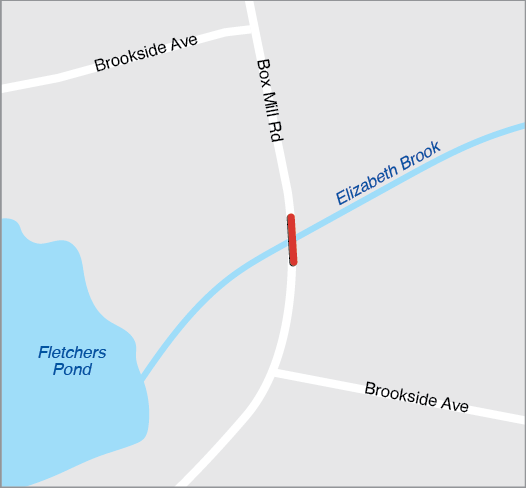
This is a MassDOT-prioritized project and is therefore not directly evaluated using the MPO’s TIP scoring criteria.
Bridge S-29-11, which carries Box Mill Road over Elizabeth Brook, is a structurally deficient bridge. The full replacement will include new substructure, steel beams, and concrete deck. One sidewalk will be added to the structure.
| Source |
(FFY) 2023 |
2024 |
2025 |
2026 |
2027 |
Total |
|---|---|---|---|---|---|---|
Federal Funds |
$2,763,526 |
--- |
--- |
--- |
--- |
$2,763,526 |
Non-Federal Funds |
$690,882 |
--- |
--- |
--- |
--- |
$690,882 |
Total Funds |
$3,454,408 |
--- |
--- |
--- |
--- |
$3,454,408 |
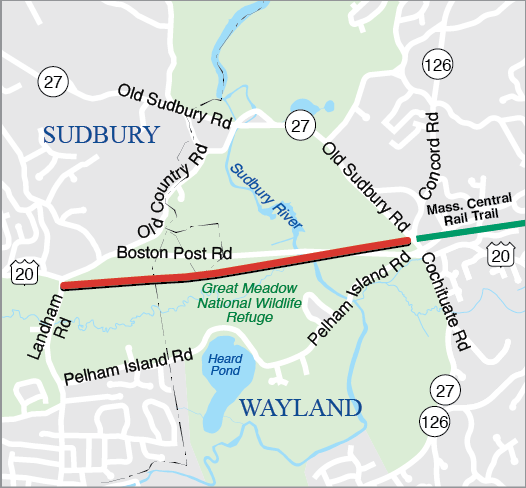
This is a MassDOT-prioritized project and is therefore not directly evaluated using the MPO’s TIP scoring criteria.
This project will extend the Mass Central Rail Trail from its existing terminus at Andrew Road in Wayland to Landham Road in Sudbury, a distance of approximately 1.6 miles.
| Source |
(FFY) 2023 |
2024 |
2025 |
2026 |
2027 |
Total |
|---|---|---|---|---|---|---|
Federal Funds |
--- |
--- |
--- |
--- |
$3,619,201 |
$3,619,201 |
Non-Federal Funds |
--- |
--- |
--- |
--- |
$904,800 |
$904,800 |
Total Funds |
--- |
--- |
--- |
--- |
$4,524,001 |
$4,524,001 |
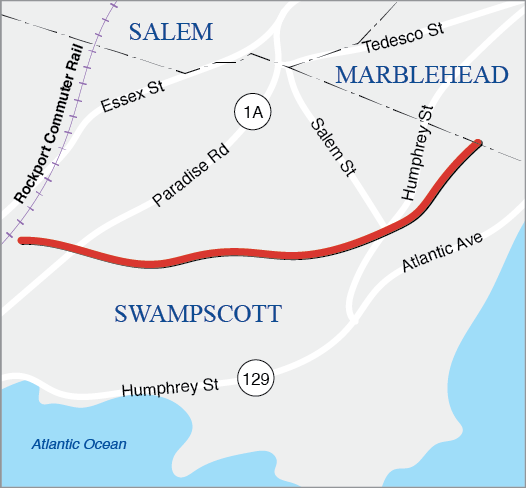
| Category |
Safety |
Sys Pres |
CM/M |
CA/SC |
TE |
EV |
Total |
|---|---|---|---|---|---|---|---|
Score |
13 out of 20 |
5 out of 14 |
18 out of 18 |
12 out of 14 |
7.4 out of 20 |
11 out of 14 |
66.4 out of 100 |
This project will construct a new 2.1-mile-long multi-use linear park running the length of Swampscott and connecting with the existing Marblehead Rail Trail and the larger East Coast Greenway. This project will provide safe, accessible connections to the Town’s schools, recreation areas, MBTA commuter rail station, and natural resources for people walking and bicycling. The project will feature a 10-foot-wide trail with a two-foot sloping shoulder on each side. The trail will cross Paradise Road (Route 1A) with a pedestrian bridge using the existing railroad abutments from the former rail line. Trail amenities will be located at the Swampscott Middle School, including bathrooms, vehicle parking for trail users, bicycle parking, and a public bike repair station.
| Source |
(FFY) 2023 |
2024 |
2025 |
2026 |
2027 |
Total |
|---|---|---|---|---|---|---|
Federal Funds |
--- |
--- |
--- |
--- |
$7,145,600 |
$7,145,600 |
Non-Federal Funds |
--- |
--- |
--- |
--- |
$1,786,400 |
$1,786,400 |
Total Funds |
--- |
--- |
--- |
--- |
$8,932,000 |
$8,932,000 |
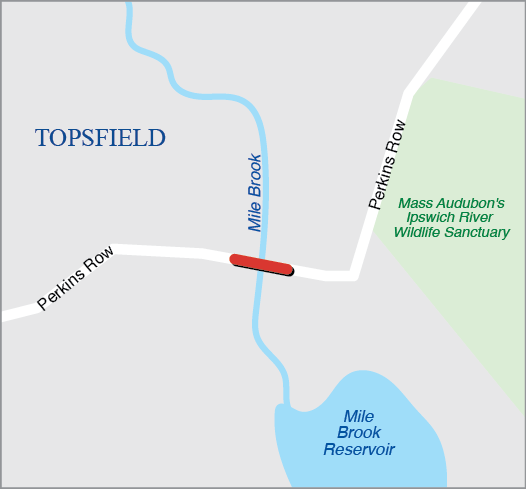
This is a MassDOT-prioritized project and is therefore not directly evaluated using the MPO’s TIP scoring criteria.
This project will replace bridge T-06-013, which carries Perkins Row over Mile Brook in Topsfield.
| Source |
(FFY) 2023 |
2024 |
2025 |
2026 |
2027 |
Total |
|---|---|---|---|---|---|---|
Federal Funds |
--- |
--- |
--- |
$2,606,495 |
--- |
$2,606,495 |
Non-Federal Funds |
--- |
--- |
--- |
$651,624 |
--- |
$651,624 |
Total Funds |
--- |
--- |
--- |
$3,258,119 |
--- |
$3,258,119 |
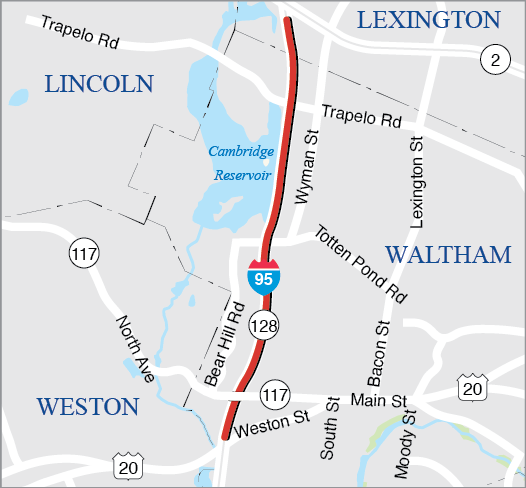
This is a MassDOT-prioritized project and is therefore not directly evaluated using the MPO’s TIP scoring criteria.
This project will resurface Interstate 95 in Waltham between Route 2 and Route 20, a distance of approximately four miles.
| Source |
(FFY) 2023 |
2024 |
2025 |
2026 |
2027 |
Total |
|---|---|---|---|---|---|---|
Federal Funds |
--- |
$14,474,468 |
--- |
--- |
--- |
$14,474,468 |
Non-Federal Funds |
--- |
$1,608,274 |
--- |
--- |
--- |
$1,608,274 |
Total Funds |
--- |
$16,082,742 |
--- |
--- |
--- |
$16,082,742 |
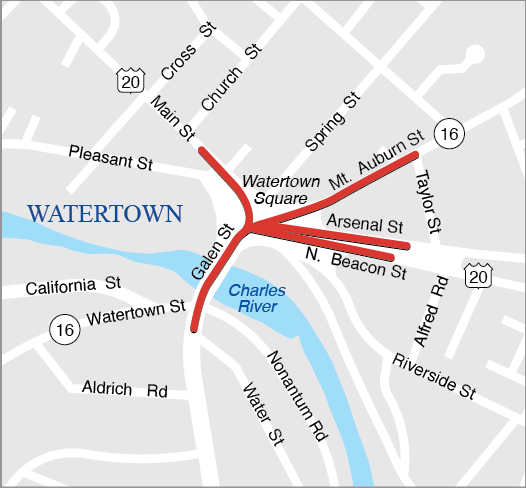
This is a MassDOT-prioritized project and is therefore not directly evaluated using the MPO’s TIP scoring criteria.
This project will make safety improvements to the intersection of Route 16 and Galen Street in Watertown. This location features a 2010–2019 pedestrian crash cluster and a 2017–2019 all-mode crash cluster, making it a high-priority safety improvement location.
| Source |
(FFY) 2023 |
2024 |
2025 |
2026 |
2027 |
Total |
|---|---|---|---|---|---|---|
Federal Funds |
--- |
$2,772,207 |
--- |
--- |
--- |
$2,772,207 |
Non-Federal Funds |
--- |
$308,023 |
--- |
--- |
--- |
$308,023 |
Total Funds |
--- |
$3,080,230 |
--- |
--- |
--- |
$3,080,230 |

| Category |
Conn |
Coord |
Plan |
TE |
MS/DP |
FS |
Total |
|---|---|---|---|---|---|---|---|
Score |
18 out of 18 |
12 out of 15 |
9 out of 15 |
9 out of 18 |
20 out of 24 |
10 out of 10 |
78 out of 100 |
This project will expand upon the existing Pleasant Street Shuttle in Watertown, which launched in September 2021 as a partnership between the Town of Watertown and the Watertown TMA. The service runs along a 1.5-mile stretch of Pleasant Street that has no transit service. The primary goal of the project is to provide peak-hour shuttle services connecting businesses and residential locations to major transit hubs in Watertown and Cambridge. This expansion will allow the existing 60-minute headways to be reduced to 30 minutes and will support the transition of the service to an all-electric vehicle fleet. This project is funded through the third round of grants available through the MPO’s Community Connections Program.
| Source |
(FFY) 2023 |
2024 |
2025 |
2026 |
2027 |
Total |
|---|---|---|---|---|---|---|
Federal Funds |
$350,260 |
$268,347 |
$183,151 |
--- |
--- |
$801,758 |
Non-Federal Funds |
$87,565 |
$67,087 |
$45,788 |
--- |
--- |
$200,440 |
Total Funds |
$437,825 |
$335,434 |
$228,939 |
--- |
--- |
$1,002,198 |
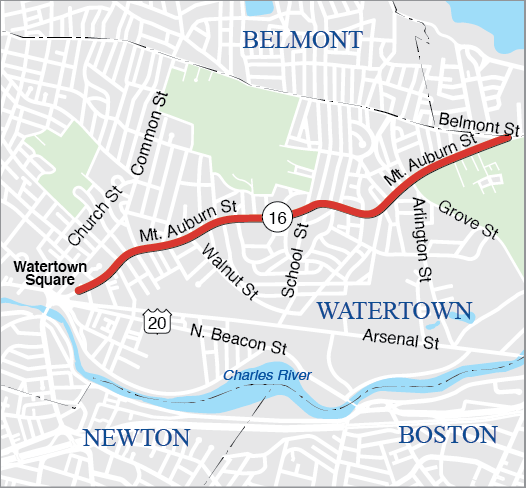
| Category |
Safety |
Sys Pres |
CM/M |
CA/SC |
TE |
EV |
Total |
|---|---|---|---|---|---|---|---|
Score |
18 out of 30 |
14 out of 29 |
18 out of 29 |
12 out of 16 |
3 out of 12 |
10 out of 18 |
75 out of 134 |
The project will reconstruct approximately 9,300 feet of Mount Auburn Street, from the Cambridge city line to the intersection with Summer Street, just east of Watertown Square. The project involves revisions to the roadway geometry, including a roadway diet to reduce the number of lanes; safety improvements; multimodal accommodations, including shared or exclusive bike lanes; improvements to the existing traffic signal equipment; and improved ADA amenities at intersections.
| Source |
(FFY) 2023 |
2024 |
2025 |
2026 |
2027 |
Total |
|---|---|---|---|---|---|---|
Federal Funds |
$19,727,207 |
2,272,862 |
--- |
--- |
--- |
$22,000,070 |
Non-Federal Funds |
$4,681,802 |
568,216 |
--- |
--- |
--- |
$5,250,017 |
Total Funds |
$24,409,009 |
2,841,078 |
--- |
--- |
--- |
$27,250,087 |
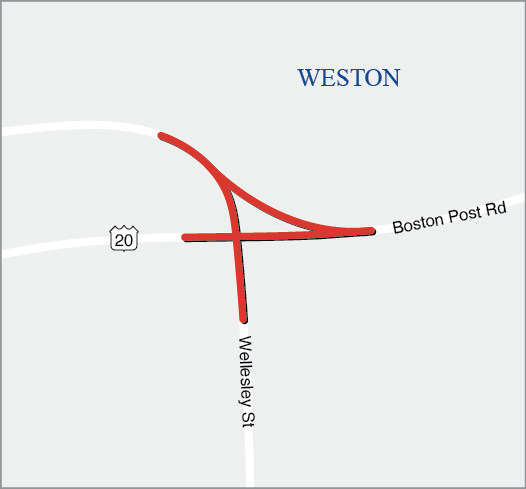
| Category |
Safety |
Sys Pres |
CM/M |
CA/SC |
TE |
EV |
Total |
|---|---|---|---|---|---|---|---|
Score |
15 out of 21 |
9 out of 17 |
10 out of 18 |
8 out of 12 |
5.6 out of 20 |
3 out of 12 |
50.6 out of 100 |
This project aims to address the safety concerns and crash incidents that contribute to the intersection’s inclusion on the state’s HSIP eligibility list as a high-crash location while also seeking to alleviate traffic congestion in the area. The project scope includes the installation of a new traffic signal system, reconfiguring the intersection to address documented safety issues, consolidating pavement area, and the simplification of turning movements. Proposed pedestrian improvements include replacement of sidewalks along the north side of Route 20 and the east side of Boston Post Road. New sidewalk is proposed on the south side of Route 20, the west side of Boston Post Road, and on both sides of Wellesley Street within the immediate intersection limits. The proposed traffic signal system includes protected pedestrian crossings and crosswalks are proposed on all approaches to the intersection. The project also includes the addition of bicycle lanes and improvements to a school bus stop on adjacent Windsor Way.
| Source |
(FFY) 2023 |
2024 |
2025 |
2026 |
2027 |
Total |
|---|---|---|---|---|---|---|
Federal Funds |
--- |
--- |
--- |
$2,413,197 |
--- |
$2,413,197 |
Non-Federal Funds |
--- |
--- |
--- |
$268,133 |
--- |
$268,133 |
Total Funds |
--- |
--- |
--- |
$2,681,330 |
--- |
$2,681,330 |
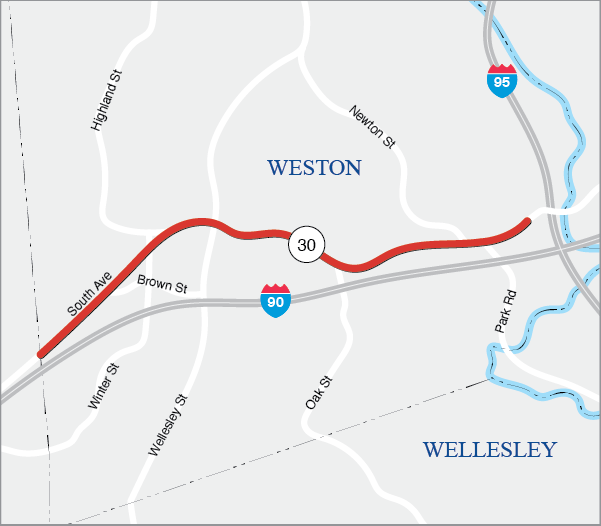
| Category |
Safety |
Sys Pres |
CM/M |
CA/SC |
TE |
EV |
Total |
|---|---|---|---|---|---|---|---|
Score |
11 out of 18 |
10 out of 20 |
10 out of 18 |
9 out of 12 |
6.2 out of 20 |
3 out of 12 |
49.2 out of 100 |
This project will improve pavement and roadway conditions along a 3.7-mile segment of Route 30 and make geometric and safety improvements at intersections along the corridor. A key goal of the project is to create a corridor that better serves all users, especially those who are walking and bicycling. To that end, this project will construct a 10-foot off-road shared-use path along the full length of the project. The path will run along the south side of the roadway from the Natick town line to the intersection at Newton Street, crossing to the north side at Newton Street to continue to the end of the project limits. This path will connect with other proposed bicycle and pedestrian accommodations in the area, including on the Route 30 bridge over the Charles River (project number 110980, funded by the MPO in FFY 2024) and on Route 30 in Newton (project number 610674, funded by MassDOT in FFY 2023).
| Source |
(FFY) 2023 |
2024 |
2025 |
2026 |
2027 |
Total |
|---|---|---|---|---|---|---|
Federal Funds |
--- |
--- |
--- |
$13,622,618 |
--- |
$13,622,618 |
Non-Federal Funds |
--- |
--- |
--- |
$3,405,654 |
--- |
$3,405,654 |
Total Funds |
--- |
--- |
--- |
$17,028,272 |
--- |
$17,028,272 |
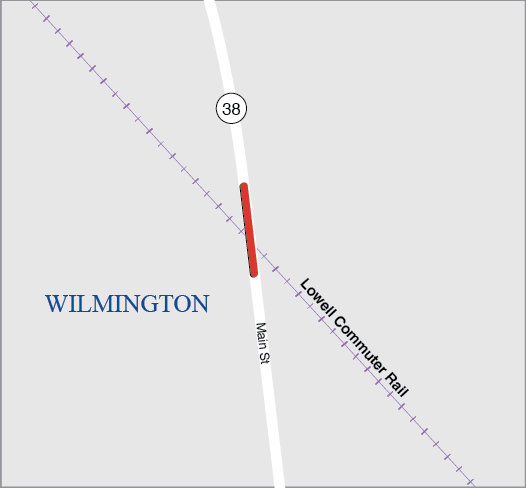
This is a MassDOT-prioritized project and is therefore not directly evaluated using the MPO’s TIP scoring criteria.
This project will replace the bridge that carries Route 38 (Main Street) over the B&M Railroad in Wilmington. This project connects at its northern and southern ends with project number 608051, the Reconstruction of Route 38 (Main Street), from Route 62 to the Woburn city line. This project is funded using $24,644,177 in MPO Regional Target funds in FFY 2025.
| Source |
(FFY) 2023 |
2024 |
2025 |
2026 |
2027 |
Total |
|---|---|---|---|---|---|---|
Federal Funds |
$10,097,950 |
--- |
--- |
--- |
--- |
$10,097,950 |
Non-Federal Funds |
$2,524,487 |
--- |
--- |
--- |
--- |
$2,524,487 |
Total Funds |
$12,662,437 |
--- |
--- |
--- |
--- |
$12,662,437 |
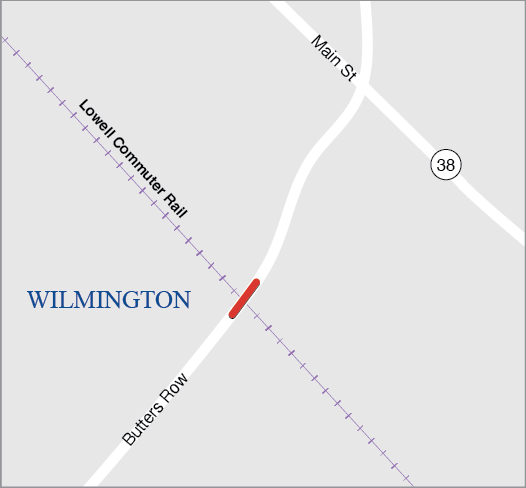
This is a MassDOT-prioritized project and is therefore not directly evaluated using the MPO’s TIP scoring criteria.
This project will replace bridge W-38-003, which carries Butters Row over the MBTA commuter rail tracks.
| Source |
(FFY) 2023 |
2024 |
2025 |
2026 |
2027 |
Total |
|---|---|---|---|---|---|---|
Federal Funds |
$8,180,159 |
--- |
--- |
--- |
--- |
$8,180,159 |
Non-Federal Funds |
$2,045,040 |
--- |
--- |
--- |
--- |
$2,045,040 |
Total Funds |
$10,225,199 |
--- |
--- |
--- |
--- |
$10,225,199 |
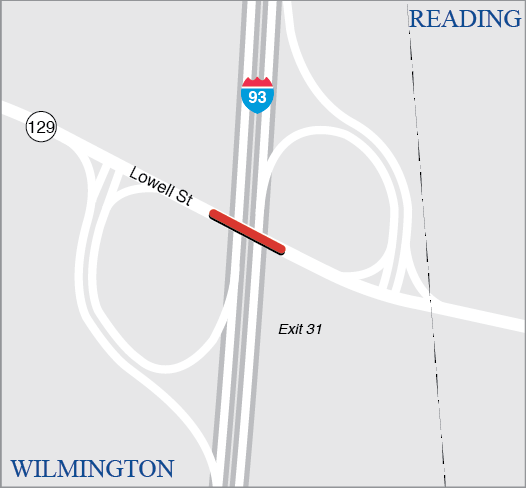
This is a MassDOT-prioritized project and is therefore not directly evaluated using the MPO’s TIP scoring criteria.
This project will replace bridge W-38-029 (2KV), which carries Route 129 (Lowell Street) over Interstate 93.
| Source |
(FFY) 2023 |
2024 |
2025 |
2026 |
2027 |
Total |
|---|---|---|---|---|---|---|
Federal Funds |
--- |
--- |
$12,761,453 |
--- |
--- |
$12,761,453 |
Non-Federal Funds |
--- |
--- |
$3,190,363 |
--- |
--- |
$3,190,363 |
Total Funds |
--- |
--- |
$15,951,816 |
--- |
--- |
$15,951,816 |
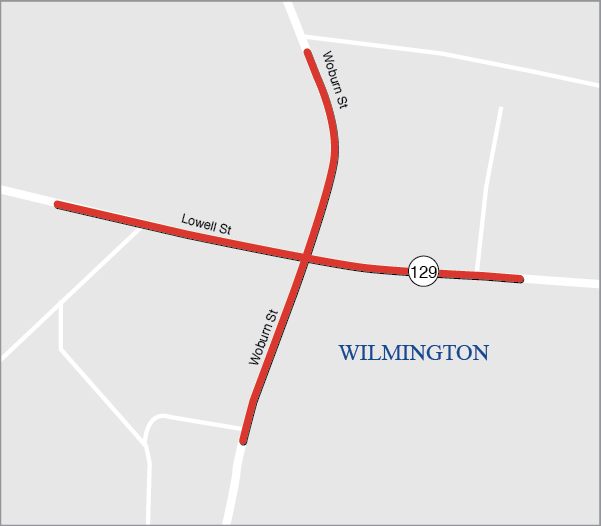
| Category |
Safety |
Sys Pres |
CM/M |
CA/SC |
TE |
EV |
Total |
|---|---|---|---|---|---|---|---|
Score |
13 out of 30 |
12 out of 29 |
16 out of 29 |
9 out of 16 |
1 out of 12 |
2 out of 18 |
53 out of 134 |
This project involves traffic safety and efficiency improvements at the intersection of Lowell Street (Route 129) and Woburn Street. The improvements include geometric modification of the roadway along the eastbound approach of Lowell Street to improve intersection visibility. The construction of new pedestrian signals and crosswalks for all approaches will address current pedestrian safety issues in the intersection. In addition, bicycle lanes will be constructed on both roadways within the project limits.
| Source |
(FFY) 2023 |
2024 |
2025 |
2026 |
2027 |
Total |
|---|---|---|---|---|---|---|
Federal Funds |
$5,283,259 |
--- |
--- |
--- |
--- |
$5,283,259 |
Non-Federal Funds |
$1,158,100 |
--- |
--- |
--- |
--- |
$1,158,100 |
Total Funds |
$6,441,358 |
--- |
--- |
--- |
--- |
$6,441,358 |
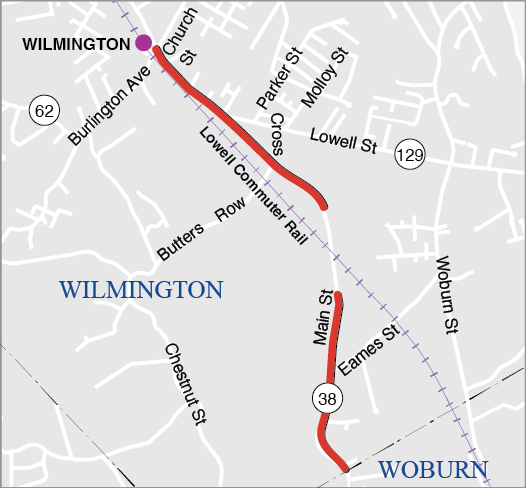
| Category |
Safety |
Sys Pres |
CM/M |
CA/SC |
TE |
EV |
Total |
|---|---|---|---|---|---|---|---|
Score |
15 out of 30 |
12 out of 29 |
13 out of 29 |
10 out of 16 |
1 out of 12 |
8 out of 18 |
59 out of 134 |
This project includes the addition of five-foot bicycle lanes along both sides of the roadway along the Route 38 corridor. Sidewalks will also be provided along both sides of the roadway between Route 62 and Route 129. In addition, improved traffic signals and the reconstruction of turn lanes will enhance pedestrian safety and improve vehicular flow.
| Source |
(FFY) 2023 |
2024 |
2025 |
2026 |
2027 |
Total |
|---|---|---|---|---|---|---|
Federal Funds |
--- |
--- |
$19,815,342 |
--- |
--- |
$19,815,342 |
Non-Federal Funds |
--- |
--- |
$4,828,835 |
--- |
--- |
$4,828,835 |
Total Funds |
--- |
--- |
$24,644,177 |
--- |
--- |
$24,644,177 |
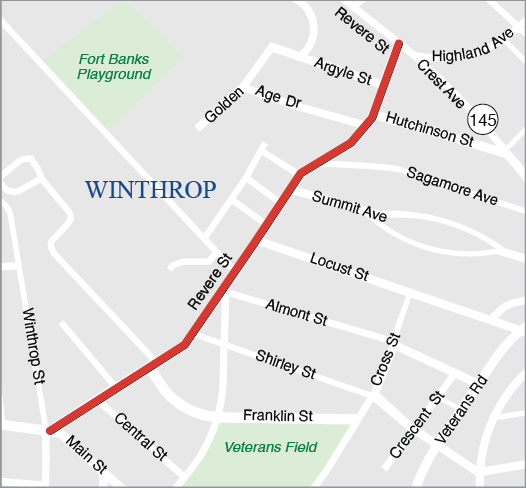
| Category |
Safety |
Sys Pres |
CM/M |
CA/SC |
TE |
EV |
Total |
|---|---|---|---|---|---|---|---|
Score |
11 out of 30 |
14 out of 29 |
12 out of 29 |
8 out of 16 |
4 out of 12 |
5 out of 18 |
54 out of 134 |
This project will include pavement reconstruction and reclamation, sidewalk reconstruction, and intersection improvements at key locations along the corridor. Improvements to the bicycle and pedestrian conditions will be implemented.
| Source |
(FFY) 2023 |
2024 |
2025 |
2026 |
2027 |
Total |
|---|---|---|---|---|---|---|
Federal Funds |
$5,294,367 |
--- |
--- |
--- |
--- |
$5,423,838 |
Non-Federal Funds |
$1,323,592 |
--- |
--- |
--- |
--- |
$1,355,959 |
Total Funds |
$6,617,959 |
--- |
--- |
--- |
--- |
$6,779,797 |
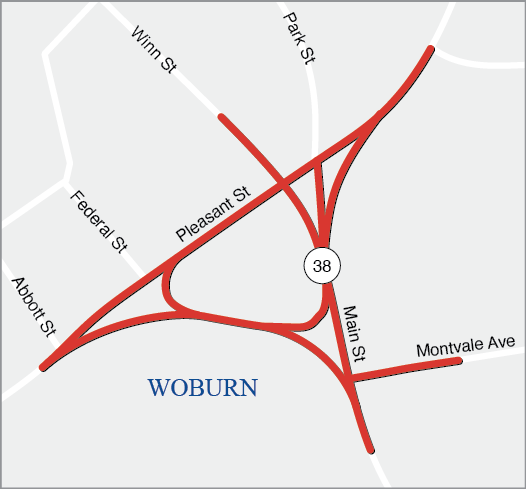
| Category |
Safety |
Sys Pres |
CM/M |
CA/SC |
TE |
EV |
Total |
|---|---|---|---|---|---|---|---|
Score |
22 out of 30 |
15 out of 29 |
16 out of 29 |
10 out of 16 |
4 out of 12 |
8 out of 18 |
75 out of 134 |
The primary goals for this project are to improve safety for drivers, pedestrians, and bicyclists while improving congestion within the Woburn Common area. The project consists of safety and operational improvements and includes the reconfiguration of the Woburn Common rotary to a more traditional configuration. The project will include roadway reconstruction, roadway realignment, sidewalk reconstruction, and the addition of bicycle lanes. One new signal will be added and two existing signals will be replaced. The project will be consistent with Woburn’s adopted Complete Streets policy.
| Source |
(FFY) 2023 |
2024 |
2025 |
2026 |
2027 |
Total |
|---|---|---|---|---|---|---|
Federal Funds |
--- |
--- |
$12,724,320 |
--- |
--- |
$12,724,320 |
Non-Federal Funds |
--- |
--- |
$2,806,080 |
--- |
--- |
$2,806,080 |
Total Funds |
--- |
--- |
$15,530,400 |
--- |
--- |
$15,530,400 |
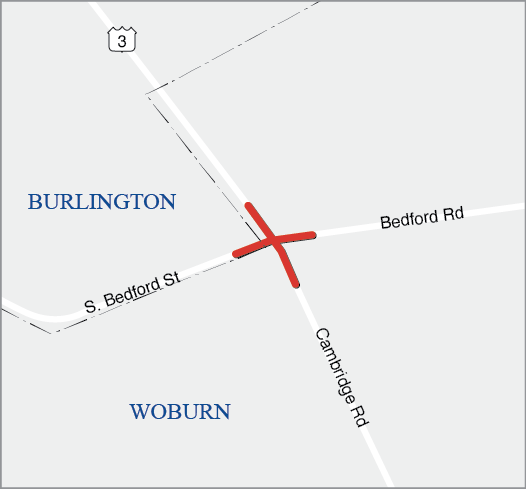
| Category |
Safety |
Sys Pres |
CM/M |
CA/SC |
TE |
EV |
Total |
|---|---|---|---|---|---|---|---|
Score |
9 out of 30 |
11 out of 29 |
19 out of 29 |
7 out of 16 |
2 out of 12 |
4 out of 18 |
52 out of 134 |
The intersection of U.S. Route 3 (Cambridge Street) at South Bedford Street and Bedford Road has been identified as a high-crash location in the Boston region. The existing geometry and traffic operations can often present challenges for motorists, pedestrians, and bicyclists. This project will reconstruct the intersection and all traffic signal equipment. Geometry enhancements will be made to accommodate exclusive turn lanes for all approaches to the intersection. The project will include reconstruction of the sidewalk along the east side of Cambridge Street and both sides of the Bedford Road westbound approach, and new sidewalk will be constructed on the south side of South Bedford Street. Bicycle accommodations consisting of five-foot wide bicycle lanes (with two-foot wide buffers where feasible) will be provided, as will ADA-compliant MBTA bus stops on Cambridge Street.
| Source |
(FFY) 2023 |
2024 |
2025 |
2026 |
2027 |
Total |
|---|---|---|---|---|---|---|
Federal Funds |
--- |
--- |
$1,244,160 |
--- |
--- |
$1,244,160 |
Non-Federal Funds |
--- |
--- |
$311.040 |
--- |
--- |
$311.040 |
Total Funds |
--- |
--- |
$1,555,200 |
--- |
--- |
$1,555,200 |
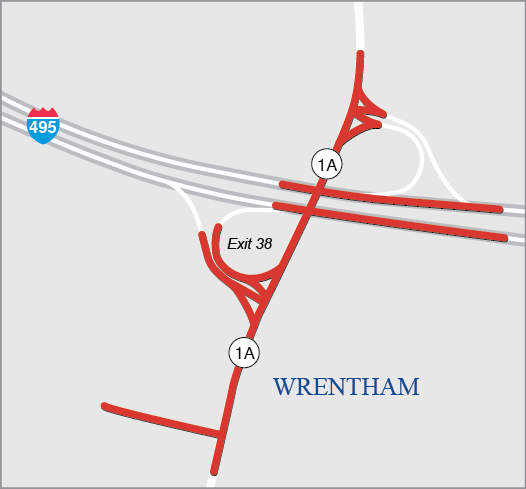
| Category |
Safety |
Sys Pres |
CM/M |
CA/SC |
TE |
EV |
Total |
|---|---|---|---|---|---|---|---|
Score |
23 out of 30 |
11 out of 29 |
12 out of 29 |
9 out of 16 |
0 out of 12 |
0 out of 18 |
55 out of 134 |
This project consists of the construction of ramps at the interchange of Route 1A and Interstate 495 to accommodate increased volumes resulting from development at the interchange. The design may proceed by developers and, depending on cost and scale of development proposals, MassDOT may incorporate ramp construction into a highway project. Future mitigation packages for developers may involve a median island to meet MassDOT’s and the Town of Wrentham’s long-range plan for the interchange.
| Source |
(FFY) 2023 |
2024 |
2025 |
2026 |
2027 |
Total |
|---|---|---|---|---|---|---|
Federal Funds |
--- |
$12,720,307 |
--- |
--- |
--- |
$12,720,307 |
Non-Federal Funds |
--- |
$2,867,577 |
--- |
--- |
--- |
$2,867,577 |
Total Funds |
--- |
$15,587,884 |
--- |
--- |
--- |
$15,587,884 |
A performance-based approach to making transportation investments can help metropolitan planning organizations (MPOs), states, and other entities achieve desired outcomes for the people and places they serve. Performance-based planning and programming (PBPP) applies data and performance management principles to inform decision-making. The purpose of PBPP is to ensure that transportation investment decisions—both for long-term planning and short-term funding—are oriented toward meeting established goals. Performance-based planning and programming activities include the following:
The Boston Region MPO’s PBPP process is shaped by both federal transportation performance management requirements and the MPO’s goals and objectives, which are established as part of the MPO’s Long-Range Transportation Plan (LRTP). This chapter discusses how these two frameworks shape the MPO’s PBPP process and describes the MPO’s current set of performance measures and targets. It also explains how the MPO anticipates the projects included in this Transportation Improvement Program (TIP) will support improvements in various performance areas and make progress toward performance targets.
The Moving Ahead for Progress in the 21st Century Act (MAP-21) directed states, MPOs, and public transportation providers to carry out a performance and outcome-based surface transportation program. These requirements have been continued under the current federal transportation funding law, the Bipartisan Infrastructure Law (BIL). MAP-21 identified seven national goals for the nation’s highway system, which are described in detail in Appendix E. Table 4-1 shows the relationship between these national goal areas and the MPO’s goal areas. The MPO’s goals and related objectives, as approved by the MPO in the LRTP, Destination 2040, are described in more detail in Chapter 1 of this document.
Table 4-1
National and Boston Region MPO Goal Areas
National Goal Area |
Boston Region MPO Goal Areas |
| Safety | Safety |
| Infrastructure Condition | System Preservation and Modernization |
| System Reliability | Capacity Management and Mobility |
| Congestion Reduction | Capacity Management and Mobility |
| Environmental Sustainability | Clean Air and Sustainable Communities |
| Freight Movement/Economic Vitality | Capacity Management and Mobility, Economic Vitality |
| Reduced Project Delivery Delays | Not Applicable |
| Not Applicable | Transportation Equity |
Source: Boston Region Metropolitan Planning Organization staff.
The federal PBPP mandate first established through MAP-21 is also designed to help the nation’s public transportation systems provide high-quality service to all users, including people with disabilities, seniors, and individuals who depend on public transportation.
The US Department of Transportation (USDOT), in consultation with states, MPOs, and other stakeholders, has established measures in performance areas relevant to the aforementioned national goals through a series of federal rulemakings. Table 4-2 lists federally required performance measures for the transit system and Table 4-3 lists federally required performance measures for the roadway system.
Table 4-2
Federally Required Transit Performance Measures
National Goal Area |
Transit Performance Area or Asset Category |
Performance Measures |
Relevant MPO Goal Area |
| Safety | Fatalities |
|
Safety |
| Safety | Injuries |
|
Safety |
| Safety | Safety Events |
|
Safety |
| Safety | System Reliability |
|
Safety |
| Infrastructure Condition | Equipment |
|
System Preservation and Modernization |
| Infrastructure Condition | Rolling Stock |
|
System Preservation and Modernization |
| Infrastructure Condition | Infrastructure |
|
System Preservation and Modernization |
| Infrastructure Condition | Facilities |
|
System Preservation and Modernization |
CFR = Code of Federal Regulations. MPO = metropolitan planning organization. ULB = useful life benchmark. VRM = vehicle-revenue miles.
Sources: National Public Transportation Safety Plan (January 2017), the Public Transportation Agency Safety Plan Rule (Title 49 CFR Part 673), and the Transit Asset Management Rule (49 CFR Part 625).
Table 4-3
Federally Required Roadway Performance Measures
National Goal Area |
Roadway |
Performance Measures |
Relevant MPO Goal Area |
| Safety | Injuries and Fatalities | • Number of fatalities • Fatality rate per 100 million vehicle-miles traveled • Number of serious injuries • Serious injury rate per 100 million vehicle-miles traveled • Number of non-motorized fatalities and non-motorized serious injuries |
Safety |
| Infrastructure Condition | Pavement Condition | • Percent of pavements on the Interstate System in good condition • Percent of pavements on the Interstate System in poor condition • Percent of pavements on the non-Interstate NHS in good condition • Percent of pavements on the non-Interstate NHS in poor condition |
System Preservation and Modernization |
| Infrastructure Condition | Bridge Condition | • Percent of NHS bridges by deck area classified as in good condition • Percent of NHS bridges by deck area classified as in poor condition |
System Preservation and Modernization |
| System Reliability | Performance of the National Highway System | • Percent of the person-miles traveled on the Interstate System that are reliable • Percent of the person-miles traveled on the non-Interstate NHS that are reliable |
Capacity Management/ Mobility |
| System Reliability, Freight Movement and Economic Vitality | Freight Movement on the Interstate System | • Truck Travel Time Reliability Index (for truck travel on Interstate highways) | Capacity Management/ Mobility, Economic Vitality |
| Congestion Reduction | Congestion Mitigation and Air Quality | • Annual hours of peak hour excessive delay per capita (for travel on NHS roadways) • Percentage of non-single-occupant vehicle travel |
Capacity Management/ Mobility |
| Environmental Sustainability | Congestion Mitigation and Air Quality | • Total emissions reduction for applicable pollutants and precursors for CMAQ-funded projects in designated nonattainment and maintenance areas* | Clean Air/Sustainable Communities |
* According to the Federal Highway Administration’s 2021 CMAQ Program performance requirements applicability determination, the Boston Region MPO area contains an area designated as in maintenance for carbon monoxide, so the MPO is currently required to monitor and set targets for this performance measure.
CFR = Code of Federal Regulations. CMAQ = Congestion Mitigation and Air Quality Improvement Program. MPO = metropolitan planning organization. NHS = National Highway System.
Sources: Highway Safety Improvement Program Rule (23 CFR 924), National Performance Management Measures Rule (23 CFR 490), and the Boston Region MPO staff.
These performance measures and relevant performance targets are discussed in more detail later in this chapter.
The MPO’s PBPP process must respond to the federal performance management requirements established in MAP-21, but it can also address other areas that pertain to its federally mandated responsibilities or relate to the MPO’s goals and objectives. For example, federal performance requirements do not specify transportation equity performance measures for states and MPOs to monitor. However, the MPO has established a transportation equity goal and a set of objectives to ensure that all people receive comparable benefits from, and are not disproportionately burdened by, MPO investments, regardless of race, color, national origin, age, income, ability, or sex.
To comply with relevant federal regulations, which are described in Chapter 6 and Appendix E, the MPO systematically addresses the concerns of populations that these regulations protect—referred to here as transportation equity populations—throughout the planning process, including when selecting projects through the TIP process. Regular equity performance monitoring enables the MPO to better understand how transportation equity populations in the region may be affected by transportation investment decisions, so that it can decide whether and how to adjust its investment approach. More details about transportation equity monitoring for projects in the Federal Fiscal Years (FFYs) 2023−27 TIP are included in Chapter 6.
To build a comprehensive PBPP practice, the MPO can also choose to monitor or set targets for additional performance measures, which are not federally required, that apply to its goal areas. For example, while the federally required travel time reliability measures discussed in Table 4-3 apply to the MPO’s Capacity Management and Mobility goal, the MPO may wish to examine measures that account for roadways that are not on the National Highway System (NHS) or other travel modes. Over the coming years, the MPO will examine whether and how to incorporate other performance measures and practices into its PBPP process.
States, MPOs, and public transportation providers integrate federally required performance measures—and other measures, as desired—into their respective PBPP processes, which involve three key phases focused on (1) planning, (2) investing, and (3) monitoring and evaluating performance outcomes.
In the planning phase, agencies set goals and objectives for the transportation system, identify performance measures, and set performance targets that will guide their decision-making. They identify and acquire data and conduct analyses necessary to support these processes. They also outline the frameworks they will use to make decisions in key planning documents.
The Commonwealth of Massachusetts creates performance-based plans, such as the Strategic Highway Safety Plan (SHSP) for improving roadway safety and the Transportation Asset Management Plan (TAMP) for improving infrastructure condition, particularly for NHS roads and bridges. Similarly transit providers—including the Massachusetts Bay Transportation Authority (MBTA), MetroWest Regional Transit Authority (MWRTA), and Cape Ann Transportation Authority (CATA)—create Transit Asset Management (TAM) plans and Public Transportation Agency Safety Plans (PTASPs) that describe the data and processes these agencies will use to address transit state of good repair and safety needs. The Commonwealth is responsible for setting performance targets for the federally required roadway performance measures described in Table 4-3, while transit agencies must set targets for the measures described in Table 4-2.
The Boston Region MPO’s activities in the planning phase include creating a goals-and-objectives framework in its LRTP and other performance-based plans—such as Congestion Mitigation and Air Quality Improvement (CMAQ) Program Performance Plans—as necessary. MPOs integrate elements of state and transit agency performance plans, such as their goals and performance targets, into MPO planning processes. MPOs also establish targets for federally required performance measures. To set these targets, the Boston Region MPO may elect to support performance targets set by the Massachusetts Department of Transportation (MassDOT) or public transit providers (depending on the measure), or it may set separate targets for the MPO’s planning area. MassDOT and the transit agencies will update their performance targets based on defined cycles, which vary for each measure. More information about the update cycles for these measures is included in the FFYs 2023−27 Performance Analysis section of this chapter.
In the investing phase, agencies use the PBPP framework established in the planning phase to create strategies for investing transportation funding. When updating the LRTP, the MPO establishes investment programs and funding guidelines to help direct Regional Target funds to priority areas (see Chapter 2 for details). When updating the TIP, the MPO selects projects that it will fund through these programs. MPO members rely on several sets of information when making these decisions:
Meanwhile, MassDOT, the MBTA, CATA, and MWRTA follow their respective processes to select projects and programs for inclusion in the MassDOT Capital Investment Plan (CIP). The federally funded investments that are included in the CIP are also documented in the MPO’s TIP and in the State Transportation Improvement Program (STIP).
Once the MPO board allocates its Regional Target dollars to specific investments and considers capital programs submitted by MassDOT, MBTA, and the region’s RTAs, it documents the full set of investments for the Boston region in the TIP. The TIP describes links between these short-term capital investment priorities and performance measures and targets. It also discusses, to the extent practicable, how the MPO anticipates these investments will help the MPO achieve its targets. States must provide similar information in their STIPs.
After making plans and investments, agencies take stock of their progress by reviewing and reporting on their performance outputs and outcomes. Activities in the monitoring and evaluating phase include tracking trends, collecting data to understand the results of investment decisions, and comparing targets to actual performance. For example, the MPO can compare information from the TIP about the expected performance outcomes of its investments with information about past and current performance, which is collected for the LRTP, to determine if its investments are helping it make progress towards its goals, objectives, and performance targets. The MPO may also conduct TIP Before-and-After studies to learn more about how the actual outcomes of TIP projects compare to expectations. These evaluation methods allow the MPO to make necessary trade-offs or adjust its investment approach in the future.
In addition to reporting measures, targets, and performance progress in its LRTP, the Boston Region MPO describes performance on various transportation metrics through its Congestion Management Process (CMP) and tools such as the MPO’s Performance Dashboard. MassDOT reports performance targets and progress to the Federal Highway Administration (FHWA) through an online reporting tool, through the STIP and other required reports, and on the MassDOT Performance Management Tracker website (massdottracker.com). Public transit providers report their targets and performance progress information to the Federal Transit Administration (FTA), including through the National Transit Database (NTD).
To support the activities discussed above, federal transportation agencies require states, public transit operators, and MPOs to coordinate with one another and to share information and data to ensure consistency across processes. In Massachusetts, these coordination responsibilities are outlined in the 2019 Performance-Based Planning and Programming Agreement between MassDOT, Massachusetts MPOs and transportation planning organizations, the MBTA, and RTAs operating in Massachusetts.
Staff from Massachusetts MPOs, MassDOT staff, and other stakeholders coordinate on PBPP implementation through the Transportation Program Managers Group, including through its subcommittee on performance measures. For performance measures that states and MPOs track at the Boston MA-NH-RI Urbanized Area (UZA) level, coordination responsibilities are documented in the 2018 Boston MA-NH-RI UZA Memorandum of Understanding.4-1 The Boston Region MPO is also a signatory to the Providence RI-MA UZA and the Worcester MA-CT UZA memoranda of understanding—these agreements define intergovernmental coordination responsibilities and activities that may support PBPP.
This section discusses investments in the FFYs 2023−27 TIP and how they may relate to elements of the MPO’s PBPP framework, including the MPO’s goals and performance measures and targets. For each goal area, existing performance targets are identified and information on relevant trends, performance measures, TIP investments, and related planning activities is provided. These descriptions generally focus on investments of the MPO’s Regional Target funds, although they may also describe MassDOT or transit agency-funded investments, where applicable. Information specific to the MPO’s Transportation Equity goal area is included in Chapter 6 and details about investments that will be made by the MPO, MassDOT, the MBTA, CATA, and MWRTA are included in Chapter 3. Appendix A includes a table summarizing the impacts each Regional Target project is expected to have on performance areas discussed in this chapter.
One of the MPO’s goals is that transportation by all modes will be safe. The MPO has committed to investing in projects and programs that aim to reduce the number and severity of crashes for all modes, and the number of serious injuries and fatalities occurring on the transportation system. Similarly, the Massachusetts SHSP includes a long-term goal to move “towards zero deaths” by eliminating fatalities and serious injuries on the Commonwealth’s roadways.4-2
The Massachusetts SHSP is a statewide, coordinated plan that addresses requirements for the federal Highway Safety Improvement Program (HSIP) and provides a comprehensive framework for improving safety on all public roads in the Commonwealth. It outlines interim and long-term goals for improving safety performance and identifies strategies and policies for addressing safety emphasis areas. The Commonwealth’s Bicycle Transportation and Pedestrian Transportation Plans also include initiatives and actions intended to make walking and biking safer.4-3
Similar to the SHSP, the major transit providers in the Boston region—the MBTA, MWRTA, and CATA—produce PTASPs that describe how they will implement safety management systems (SMS).4-4 SMS is a “formal, top-down, organization-wide data-driven approach to managing safety risks and assuring the effectiveness of safety risk mitigations [that] includes systematic procedures, practices, and policies for managing risks and hazards.”4-5 Transit providers support SMS through safety management policies, safety risk management strategies, safety assurance methods (which include performance monitoring), and safety promotion (including training and communication practices). These PTASPs also describe the performance targets these agencies set for measures outlined in the National Public Transportation Safety Plan.
The Commonwealth of Massachusetts and the Boston Region MPO track crashes, fatalities, and injuries involving motor vehicles using information from the Massachusetts Crash Data System and the National Highway Traffic Safety Administration’s (NHTSA’s) Fatality Analysis and Reporting System (FARS). These data inform the targets the Commonwealth and the MPO must set each calendar year (CY) for five federally required roadway safety performance measures, which are also listed in Table 4-3:
These measures pertain to fatalities and serious injuries from traffic incidents and apply to all public roads. Values for these measures are expressed as five-year rolling annual averages. States and MPOs update targets for these measures annually. When establishing targets for these measures, the MPOs in Massachusetts can elect to support targets the Commonwealth has set or they can set separate targets for their respective MPO regions.
The Commonwealth set its most current set of roadway safety performance targets to reflect a CY 2018–22 rolling annual average, as required by FHWA. When setting these targets, the Commonwealth considered the following factors:
Table 4-4 shows the Commonwealth’s CY 2022 roadway safety performance targets and reiterates the Commonwealth’s long-term targets. MPO memoranda describing the Commonwealth’s safety targets from prior years are available at bostonmpo.org/performance-archive.
Table 4-4
Massachusetts Safety Performance Targets
Performance Measure |
CY 2022 Target |
MA Long-Term Target |
| Number of Fatalities | 340.00 | 0.00 |
| Fatality Rate (per 100M VMT) | 0.56 | 0.00 |
| Number of Serious Injuries | 2,504.00 | 0.00 |
| Serious Injury Rate (per 100M VMT) | 4.11 | 0.00 |
| Number of Nonmotorized Fatalities and Serious Injuries | 471.00 | 0.00 |
* These targets are expressed as five-year rolling annual averages.
CY = calendar year. M = million. MA = Massachusetts. MPO = metropolitan planning organization. VMT = vehicle-miles traveled.
Sources: Federal Highway Administration, Commonwealth of Massachusetts, Boston Region MPO staff.
Figures 4-1 through 4-5 display actual and draft data, projections, and CY 2022 targets for Massachusetts for each of the roadway safety performance measures. These figures show information that was available in spring and summer 2021, when the Commonwealth was setting CY 2022 targets. In February 2022, the Boston Region MPO reviewed and voted to support the Commonwealth’s CY 2022 roadway safety performance targets. This approach reflects the way the MPO will need to collaborate with the Commonwealth on safety strategies to reduce fatalities and injuries in the Boston region, which include education campaigns and driver behavior laws, in addition to the infrastructure investments the MPO may make. Actual and draft data about safety outcomes in the Boston region are also shown in these figures.
Figure 4-1 shows data, projections, and the Commonwealth’s CY 2022 target for the number of fatalities. As shown in this chart and in Figure 4-2, five-year rolling averages for fatality-oriented measures at both the Massachusetts level and the Boston region level through 2020 have decreased following a spike in fatalities in 2016. When developing projections and CY 2022 targets in spring and summer 2021, the Commonwealth chose not to incorporate fatality data from 2020, given the effects of the COVID-19 pandemic and related responses on travel behavior. Instead, the Commonwealth assumed that the number of fatalities from motor vehicle crashes that would occur in 2021 would equal the number that occurred in 2019 (336 fatalities). Next, the Commonwealth projected that fatalities would decrease by 2.5 percent between 2021 and 2022, to 328 fatalities. The Commonwealth set this percentage change because it reflected a reasonable but desirable percent change in annual fatalities. Using these projections, finalized fatality data for 2018, and draft data for 2019, the Commonwealth set a target average for 2018–22 of 340 fatalities. As previously mentioned, this target has been set to meet federal roadway safety performance requirements, but the Commonwealth has an overarching goal of zero fatalities and injuries on Massachusetts’ roadways.
Figure 4-1
Number of Fatalities (Massachusetts Statewide and Boston Region)
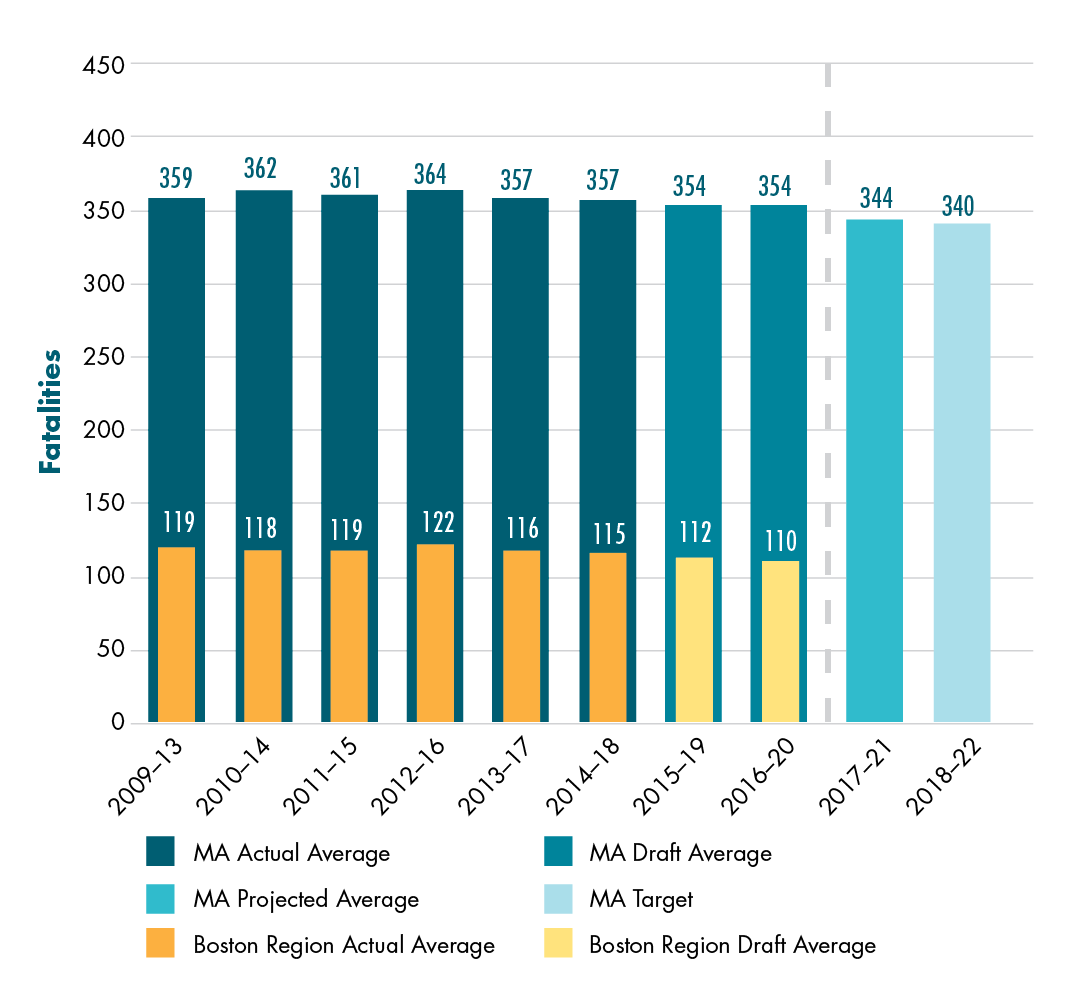
Notes: Values reflect five-year rolling annual averages and have been rounded to the nearest integer. The 2015–19 and 2016–20 averages were calculated in spring 2021 using draft data for 2019 and 2020.
MA = Massachusetts. MPO = metropolitan planning organization.
Sources: National Highway Traffic Safety Administration Fatality Analysis and Reporting System, Massachusetts Department of Transportation, and Boston Region MPO staff.
The Commonwealth estimated fatality rates per 100 million VMT using actual, estimated, or projected values for fatalities, as previously discussed, along with recent and projected values for VMT. Because of the pandemic and related responses, VMT decreased in CY 2020 compared to prior years, though the Commonwealth anticipated that 2021 and 2022 VMT values would be higher, reflecting a gradual return to pre-pandemic levels of travel. Figure 4-2 shows data and projections pertaining to the fatality rate per 100 million VMT, including the Commonwealth’s target 2018–22 average of 0.56 fatalities per 100 million VMT.
Figure 4-2
Fatality Rate per 100 Million VMT (Massachusetts Statewide and Boston Region)
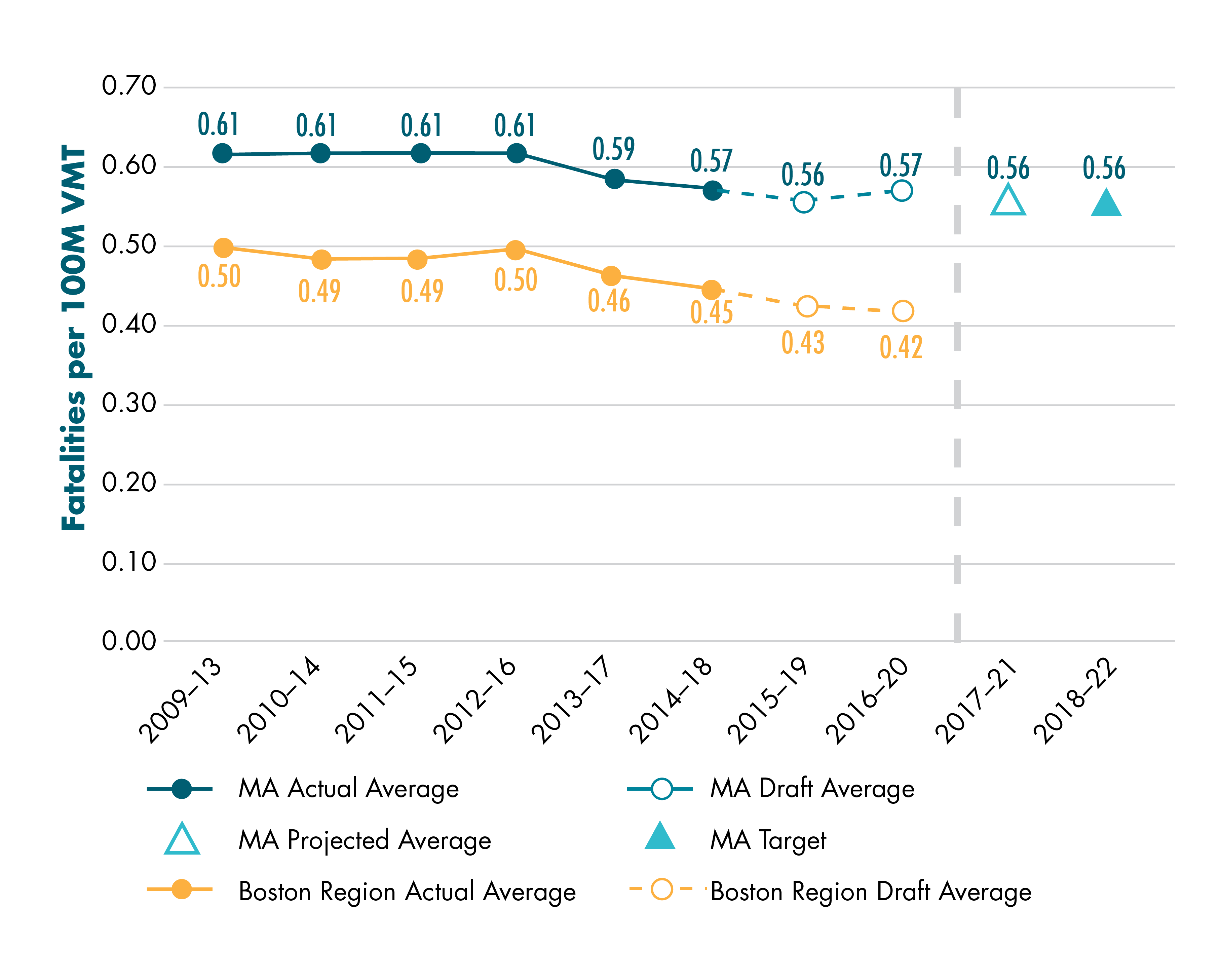
Notes: Values reflect five-year rolling annual averages and have been rounded to the hundredths decimal place. The 2015–19 and 2016–20 averages were calculated in spring 2021 using draft data for 2019 and 2020. MassDOT plans to revisit 2018 VMT data for future target-setting activities.
MA = Massachusetts. MPO = metropolitan planning organization. VMT = vehicle-miles traveled.
Sources: National Highway Traffic Safety Administration Fatality Analysis and Reporting System, Massachusetts Department of Transportation, and Boston Region MPO staff.
Figure 4-3 shows data, projections, and the Commonwealth’s CY 2022 target for the number of serious injuries. As shown in the chart and in Figure 4-4, five-year rolling averages for the serious injury-oriented measures have decreased over time at both the Massachusetts level and the Boston region level. To meet federal requirements, MassDOT updated its definition of serious injuries that are recorded in the Commonwealth’s Crash Data System (CDS) as of January 2019. This data change may have affected the count of serious injuries for 2019, and some local agencies are still transitioning to the new definition. The number of serious injuries that occurred in 2020, which was lower than previous years, was likely affected by the pandemic and related travel behavior changes. Given the circumstances affecting these 2019 and 2020 serious injury data, the Commonwealth assumed a three percent decrease in serious injuries between 2018 and 2021, and another four percent decrease between 2021 and 2022. These values reflect reasonable but desirable changes in annual serious injuries. Based on these calculations, the Commonwealth set a target 2018–22 average of 2,504 serious injuries.
Figure 4-3
Number of Serious Injuries (Massachusetts Statewide and Boston Region)
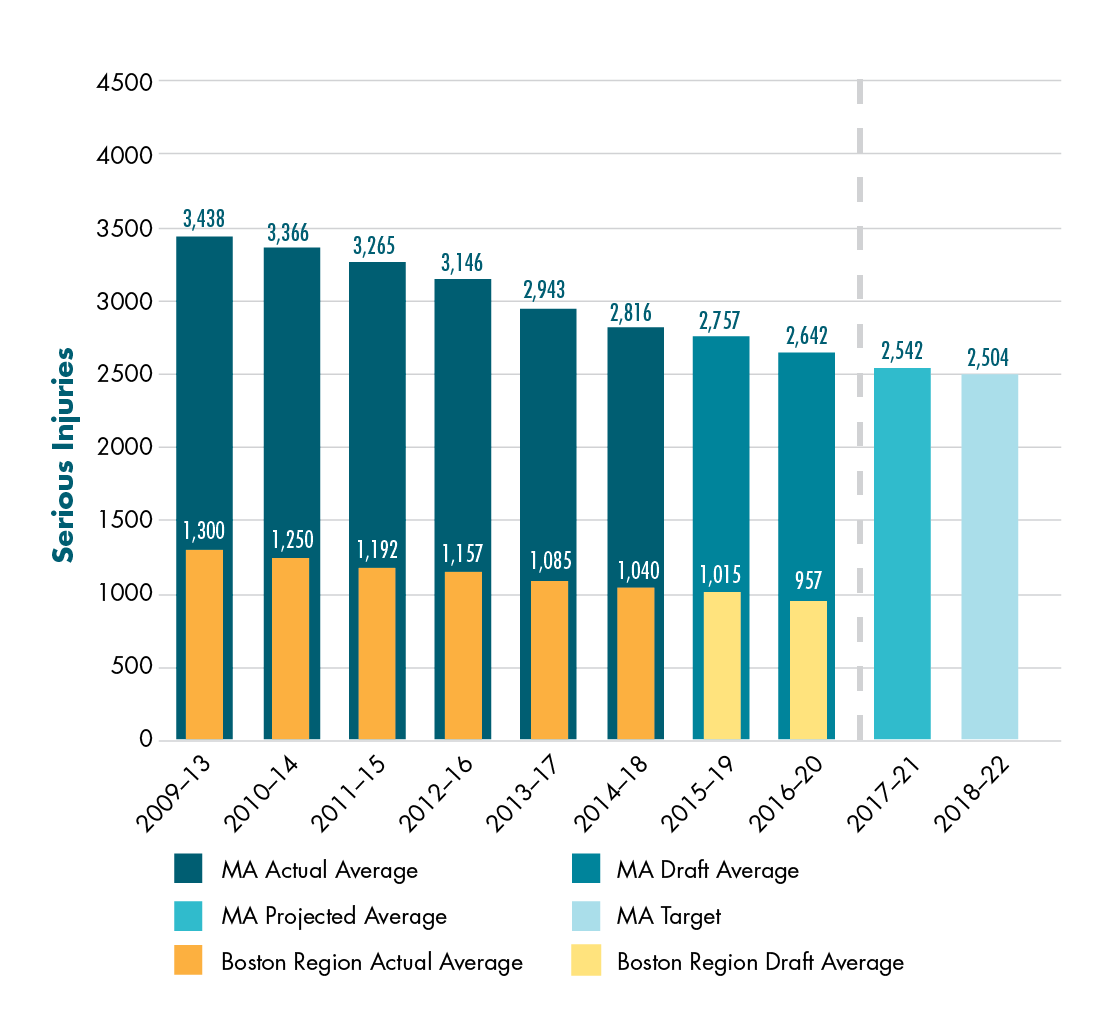
Notes: Values reflect five-year rolling annual averages and have been rounded to the nearest integer. The 2015–19 and 2016–20 averages were calculated in spring 2021 using draft data for 2019 and 2020.
MA = Massachusetts. MPO = metropolitan planning organization. VMT = vehicle-miles traveled.
Sources: Massachusetts Department of Transportation and Boston Region MPO Staff.
Figure 4-4 shows data and projections pertaining to the serious injury rate per 100 million VMT, as well as the Commonwealth’s target 2018–22 average of 4.11 serious injuries per 100 million vehicle-miles traveled.
Figure 4-4
Serious Injury Rate per 100 Million VMT
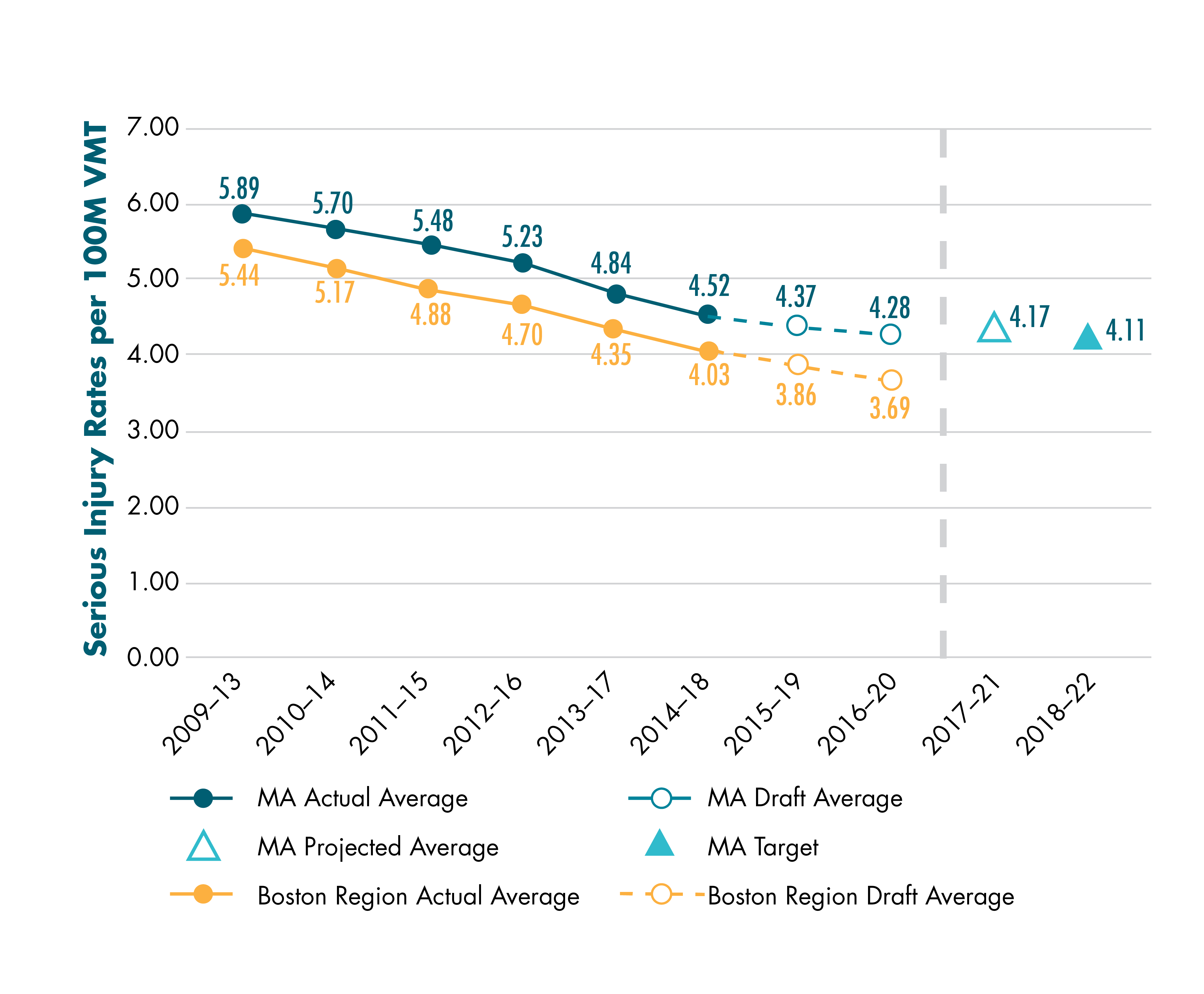
Notes: Values reflect five-year rolling annual averages and have been rounded to the nearest integer. The 2015–19 and 2016–20 averages were calculated in spring 2021 using draft data for 2019 and 2020.MassDOT plans to revisit 2018 VMT data for future target-setting activities.
MA = Massachusetts. MPO = metropolitan planning organization. VMT = vehicle-miles traveled.
Sources: Massachusetts Department of Transportation and Boston Region MPO staff.
Figure 4-5 shows data, projections, and the CY 2022 target for the number of nonmotorized fatalities and serious injuries. This category includes fatalities and serious injuries of people who walk, bicycle, skate, or use wheelchairs or other mobility devices. 4-6 When developing this target, the Commonwealth considered fluctuations in the annual number of nonmotorized fatalities and nonmotorized serious injuries, including the reduction in these crash outcomes that occurred in 2020. The Commonwealth assumed that the number of nonmotorized fatalities and serious injuries in 2021 would equal the 2017–19 average and assumed that this 2021 value would decrease by two percent between 2021 and 2022 (a reasonable but desirable change). Using these calculations, the Commonwealth set a target average for 2018–22 of 471 nonmotorized fatalities and serious injuries.
Figure 4-5 shows recent decreases in the five-year rolling average of nonmotorized fatalities and serious injuries for both Massachusetts and the Boston region. However, on average, the Boston region has made up a larger share of Massachusetts’ nonmotorized fatalities than it has of total fatalities, and it has made up a larger share of Massachusetts’ nonmotorized serious injuries than it has of total serious injuries. This safety performance area in particular should be addressed through coordinated planning, investment, and strategy implementation between MassDOT, the Boston Region MPO, the region’s municipalities, and other stakeholders.
Figure 4-5
Number of Nonmotorized Fatalities and Serious Injuries (Massachusetts Statewide and Boston Region)
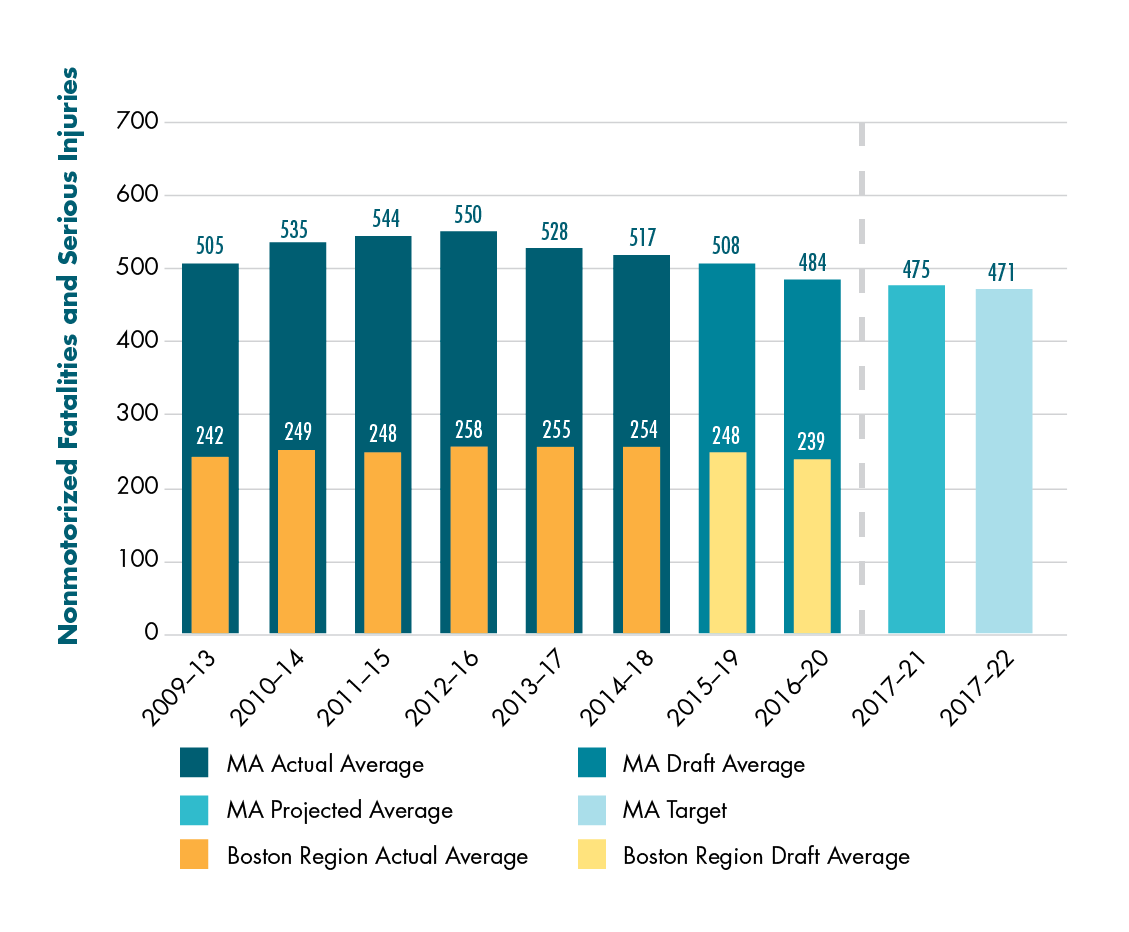
Notes: Values reflect five-year rolling annual averages and have been rounded to the nearest integer. The 2015–19 and 2016–20 averages were calculated in spring 2021 using draft data for 2019 and 2020.
MA = Massachusetts. MPO = metropolitan planning organization. VMT = vehicle-miles traveled.
Sources: Massachusetts Department of Transportation and Boston Region MPO staff.
By electing to support the Commonwealth’s roadway safety targets, the MPO agreed to plan and program projects so that they contribute to achieving those targets. Anticipating the ability of transportation projects to reduce fatalities and serious injuries from motor-vehicle crashes is a challenge, as crashes may be a consequence of many factors other than infrastructure condition, such as driver behavior—including seatbelt use, driver distraction, or intoxication—and weather conditions. When investing its Regional Target funds, the MPO aims to identify projects likely to have maximum safety benefits by using its TIP project selection criteria, which account for crash activity within the project area and the types of safety countermeasures included in the proposed project. As part of its most recent criteria update, the MPO has tailored safety criteria for each of its investment programs. For more detail on these criteria, see Appendix A.
When conducting project evaluations, the MPO considers crash rates within the vicinity of projects and the Equivalent Property Damage Only (EPDO) value associated with those crashes. The EPDO index assesses the severity of crashes by assigning weighted values to crashes involving fatalities, injuries, and property damage. MassDOT has recently adjusted its formula for calculating EPDO to significantly increase the weights for crashes involving fatalities or injuries.4-7
All the corridor and intersection improvement projects included in the MPO’s Regional Target Program include safety countermeasures or features that the MPO expects will improve safety for motorists, bicyclists, and pedestrians. The MPO's roadway investments in its Intersection Improvements, Complete Streets, and Major Infrastructure programs are expected to support safety improvements on roadways supporting multiple travel modes. Meanwhile, its Bicycle Network and Pedestrian Connections projects will support safety for those traveling by nonmotorized means by providing separated facilities for pedestrians and bicyclists.
The MPO also examines whether projects would improve safety at MassDOT-identified HSIP crash cluster locations. MassDOT identified crash clusters using a procedure for processing, standardizing, matching, and aggregating locations and data for crashes that have occurred at intersections.4-8 MassDOT’s HSIP clusters are those that ranked in the top five percent of crash clusters within each regional planning agency area based on EPDO values. MassDOT created a set of HSIP clusters that include all crashes involving motor vehicles, as well as sets of clusters that reflect motor-vehicle crashes that involved bicyclists or pedestrians. Projects in locations with HSIP clusters are eligible for funding through MassDOT’s HSIP program.
Table 4-5 shows values for MPO staff-identified metrics that relate to how FFYs 2023–27 Regional Target-funded corridor, intersection, and bicycle and pedestrian projects may address safety performance; similar tables for other MPO goal areas appear throughout this chapter.4-9 Table 4-5 shows that many of these projects are located in areas that overlap with HSIP clusters. The MPO expects that this combination of safety countermeasures and improvements focused on priority locations will help the MPO and the Commonwealth progress towards reducing fatalities and serious injuries on the roadway network. Table A-2 in Appendix A summarizes the impacts each Regional Target project is expected to have on performance areas discussed throughout this chapter, including safety performance.
Table 4-5
Regional Target Projects: Roadway Safety Performance Metrics
Metric |
Value |
| Regional Target projects that address all-mode HSIP clusters1 | 14 projects |
| All-mode HSIP cluster locations addressed by Regional Target projects1 | 25 locations |
| Regional Target projects that address HSIP Pedestrian clusters2 | 9 projects |
| HSIP pedestrian cluster locations addressed by Regional Target projects2 | 13 locations |
| Regional Target projects that address HSIP bicycle clusters2 | 5 projects |
| HSIP bicycle cluster locations addressed by Regional Target projects2 | 6 locations |
| Project areas where fatal crashes have occurred3 | 0 areas |
| Project areas where injury crashes have occurred3 | 36 areas |
Note: The group of projects reflected in this table does not include Community Connections investments or Transit Modernization investments.
1 All-mode HSIP clusters are based on crash data from 2017 to 2019.
2 HSIP bicycle clusters and HSIP pedestrian clusters are based on data from 2010 to 2019.
3 Analysis of crashes in Regional Target project areas is based on crash data from 2017 to 2019.
HSIP = Highway Safety Improvement Program. MassDOT = Massachusetts Department of Transportation. MPO = metropolitan planning organization.
Sources: Massachusetts Crash Data System, Massachusetts Department of Transportation, and the Boston Region MPO.
The projects in the FFYs 2023–27 TIP programmed by MassDOT, summarized in Chapter 3, will also support safety and are expected to reduce fatalities and serious injuries on the region’s roadways. The Reliability and Modernization programs included in MassDOT’s CIP focus on maintaining and upgrading infrastructure, which will help make travel safer on the region’s roadways. MassDOT’s Intersection Improvements, Roadway Improvements, Roadway Reconstruction (which funds Safe Routes to School projects), and Safety Improvements programs most directly address safety considerations, though its various bridge and pavement improvement programs may also improve safety by supporting asset maintenance and state of good repair. Moreover, MassDOT’s Bicycle and Pedestrian projects may reduce nonmotorized fatalities and injuries by improving separated facilities for bicyclists and pedestrians.
As previously mentioned, the National Public Transportation Safety Plan details performance measures for which transit agencies subject to the PTASP rule must set targets. These measures, which are also listed in Table 4-6, include the following4-10 :
The FTA provides transit agencies with flexibility to set their targets to meet the specific context of their transit service. These agencies can choose (1) the reporting timeframe they use (calendar, fiscal, or NTD reporting year), (2) the VRM denominator values for the rate measures, and (3) the methodologies for picking target values. Transit agencies revisit their performance targets when updating their PTASPs each year.
MPOs have their own responsibilities pertaining to transit safety, as outlined in the PTASP rule (49 CFR Part 673) and the Statewide and Nonmetropolitan Transportation Planning and Metropolitan Transportation Planning rule, which defines MPOs’ and states’ planning and performance management responsibilities. In particular, MPOs must set regional targets for these transit safety performance measures in coordination with relevant transit agencies and states. MPOs document these targets in the LRTPs and TIPs and can consider proposed transit investments in the context of how they may improve transit safety.
The Boston Region MPO updated its set of transit safety performance targets on March 31, 2022. This 2022 set includes the MBTA’s, MWRTA’s, and CATA’s safety targets and presents each agency’s targets separately to reflect how each agency accounted for the factors that will affect safety outcomes in its service area. These factors include the characteristics of the local operating environments and contexts and the agency’s planned investments, policies, and safety-management activities.
The MBTA monitors performance and sets federally required targets for four modes: heavy rail (Red, Orange, and Blue Lines), light rail (Green Line and the Mattapan High Speed Line), bus, and The RIDE paratransit system. Based on CY 2018–20 averages, the MBTA runs approximately 23,036,000 VRM of service on its heavy rail system; 5,681,000 VRM on its light rail system; 22,882,000 VRM on its bus network; and 13,443,000 VRM for The RIDE. The MBTA’s commuter rail network and ferry service are not subject to these FTA requirements and are addressed outside of the PTASP process.
Table 4-6 shows past averages for the federally required transit safety measures for MBTA heavy rail, light rail, bus, and The RIDE, based on data provided by the MBTA. These averages reflect safety data from CYs 2018 to 2020.
Table 4-6
Past Safety Performance Data for
MBTA Transit Services (CYs 2018–20 Averages)
MBTA Mode |
Average Fatalities |
Average Fatality Rate1 |
Average Injuries |
Average Injury Rate1 |
Average Safety Events |
Average Safety Event |
Average System Reliabilty Value2 |
| Heavy Rail | 0.00 | 0.00 | 199.00 | 8.62 | 24.00 | 1.04 | 47,166.00 |
| Light Rail | 0.00 | 0.00 | 86.00 | 15.00 | 32.00 | 5.69 | 8,017.00 |
| Bus | 1.00 | 0.06 | 330.00 | 14.29 | 122.00 | 5.32 | 28,300.00 |
| The RIDE | 0.00 | 0.00 | 27.00 | 1.95 | 27.00 | 2.03 | 51,733.00 |
Notes: This table reflects data available at the time the MBTA developed its targets.
1 Fatality, injury, and safety event rates are expressed per one million VRM. Rate values have been rounded to the nearest hundredth.
2 The system reliability measure is expressed as mean VRM traveled per major mechanical failure.
CY = calendar year. MBTA = Massachusetts Bay Transportation Authority. MPO = metropolitan planning organization. VRM = vehicle-revenue miles.
Source: MBTA and the Boston Region MPO staff.
The MBTA’s safety performance targets for CY 2022 are shown in Table 4-7. When setting targets, the MBTA varied its approach by measure:
Table 4-7
MBTA CY 2022 Safety Performance Targets
MBTA Mode |
Fatalities Target |
Fatality Rate Target1 |
Injuries Target |
Injury Rate Target1 |
Safety Events Target |
Safety Event Target1 |
System Reliability Target2 |
| Heavy Rail | 0.00 | 0.00 | 195.00 | 8.46 | 23.00 | 1.00 | 47,500.00 |
| Light Rail | 0.00 | 0.00 | 84.00 | 14.70 | 31.00 | 5.58 | 7,500.00 |
| Bus | 0.00 | 0.00 | 324.00 | 14.00 | 120.00 | 5.21 | 25,000.00 |
| The RIDE3 | 0.00 | 0.00 | 27.00 | 1.91 | 26.00 | 1.99 | 60,000.00 |
1 Fatality, injury, and safety event rates are expressed per one million VRM. Rate values have been rounded to the nearest hundredth.
2 The system reliability measure is expressed as mean VRM traveled per major mechanical failure.
3 The injuries target for The RIDE remains the same as past averages due to rounding.
CY = calendar year. MBTA = Massachusetts Bay Transportation Authority. MPO = metropolitan planning organization. VRM = vehicle-revenue miles.
Source: MBTA and the Boston Region MPO staff.
CATA monitors safety performance and sets federally required targets for its fixed-route bus service and its demand response service. According to averages calculated using state fiscal years (SFYs) 2017–21 data, CATA’s demand response system runs about 125,000 VRM annually, and its fixed-route bus system runs about 245,000 VRM annually.4-13 Table 4-8 provides SFY 2017–21 averages for the fatality, injury, safety event, and system reliability measures for CATA’s fixed-route bus and demand response systems. MPO staff gathered this information from CATA as well as from the NTD’s Monthly Modal Time Series data files (for fatalities, injuries, and safety events), its Major Safety Events time series data files (for safety events), its Annual Database Vehicle Maintenance files (for major mechanical failures), and its Monthly Module Adjusted Data Release (for VRM).4-14
Table 4-8
Past Safety Performance Data for CATA
Transit Services (SFY 2017–21 Averages)
CATA Mode |
Average Fatalities |
Average Fatality Rate1 |
Average Injuries |
Average Injury Rate1 |
Average Safety Events |
Average Safety Event Rate1 |
Average System Reliabilty Value2 |
| Fixed- Route Bus | 0.00 | 0.00 | 0.80 | 0.37 | 0.60 | 0.28 | 72,781.31 |
| Demand Response | 0.00 | 0.00 | 0.00 | 0.00 | 0.20 | 0.15 | 124,718.00 |
Note: Values have been rounded to the nearest hundredth.
1 Fatality, injury, and safety event rates are expressed per one hundred thousand VRM.
2 The system reliability measure is expressed as mean VRM traveled per major mechanical failure.
CATA = Cape Ann Transportation Authority. MPO = metropolitan planning organization. SFY = state fiscal year. VRM = vehicle-revenue miles.
Sources: CATA, the National Transit Database, and the Boston Region MPO staff.
Table 4-9 provides a summary of CATA’s SFY 2022 performance targets, which cover the period from July 2021 to June 2022. Rate targets are expressed per one hundred thousand VRM. In general, CATA used past data and averages as the basis for determining its transit safety performance targets for SFY 2022. When developing targets related to safety events, CATA also accounted for the number of preventable accidents that occurred on its systems in SFY 2021 (10 on its fixed-route system, and four on its demand response system), in addition to incidents reported to the NTD. Preventable accidents, which are distinct from NTD-defined safety events, are defined by MassDOT as “those accidents in which the transit driver is typically deemed responsible or partly responsible for the occurrence of the accident.”4-15
Table 4-9
CATA SFY 2022 Safety Performance Targets
CATA Mode |
Fatalities Target |
Fatality Rate Target1 |
Injuries Target |
Injury Rate Target1 |
Safety Events Target |
Safety Event Target1 |
System Reliabilty Target2 |
| Fixed- Route Bus | 0.0 | 0.0 | 1.0 | 0.5 | 2.5 | 1.5 | 70,000.0 |
| Demand Response | 0.0 | 0.0 | 1.0 | 0.5 | 1.5 | 1.0 | 135,000.0 |
Note: Values have been rounded to the nearest tenth.
1 Fatality, injury, and safety event rates are expressed per one hundred thousand VRM.
2 The system reliability measure is expressed as mean VRM traveled per major mechanical failure.
CATA = Cape Ann Transportation Authority. SFY = state fiscal year. MPO = metropolitan planning organization. VRM = vehicle-revenue miles.
Source: CATA and the Boston Region MPO staff.
Like CATA, MWRTA monitors performance and sets federally required targets for fixed-route bus service and demand response services. According to averages calculated using SFYs 2017–21 data, MWRTA’s demand response system runs about 909,000 VRM annually, and its fixed-route bus system runs about 1,149,000 VRM annually.4-16 Table 4-10 shows SFY 2017–21 averages for the federally required transit safety measures for MWRTA’s transit services. MPO staff gathered this information from the NTD’s Monthly Modal Time Series data files (for fatalities, injuries, and safety events), its Major Safety Events time series data files (for safety events), its Annual Database Vehicle Maintenance files (for major mechanical failures), and its Monthly Module Adjusted Data Release (for VRM).4-17
Table 4-10
Past Safety Performance Data for
MWRTA Transit Services (SFYs 2017–21 Averages)
MWRTA Mode |
Average Fatalities |
Average Fatality Rate1 |
Average Injuries |
Average Injury Rate1 |
Average Safety Events |
Average Safety Event Rate1 |
Average System Reliabilty Value2 |
| Fixed- Route Bus | 0.00 | 0.00 | 0.00 | 0.00 | 0.60 | 0.05 | 101,030.13 |
| Demand Response | 0.00 | 0.00 | 0.60 | 0.06 | 1.40 | 0.14 | 145,324.63 |
Note: Values have been rounded to the nearest hundredth.
1 Fatality, injury, and safety event rates are expressed per one hundred thousand VRM.
2 The system reliability measure is expressed as mean VRM traveled per major mechanical failure.
MPO = metropolitan planning organization. MWRTA = MetroWest Regional Transit Authority. SFY = state fiscal year. VRM = vehicle-revenue miles.
Sources: MWRTA, the National Transit Database, and the Boston Region MPO staff.
Table 4-11 provides a summary of MWRTA’s SFY 2022 performance targets, which include fatality, injury, and safety event rates expressed per one hundred thousand VRM. MWRTA set its transit safety performance targets by reviewing historic safety data for its fleet and by planning to operate as safely as possible and by proactively addressing hazards as they are identified. MWRTA’s review of past data also accounted for the number of preventable accidents on its system in recent years. On its fixed-route system, MWRTA had 16 preventable accidents in SFY 2019, 10 in SFY 2020, and nine in SFY 2021. On its demand response system, it had 18 preventable accidents in SFY 2019, 10 in SFY 2020, and three in SFY 2021. MWRTA also considered the risk potential for different types of injuries on its systems when setting targets.
Table 4-11
MWRTA SFY 2022 Safety Performance Targets
MWRTA Mode |
Fatalities Target |
Fatality Rate Target1 |
Injuries Target |
Injury Rate Target1 |
Safety Events Target |
Safety Event Target1 |
System Reliability Target2 |
| Fixed- Route Bus | 0.00 | 0.00 | 12.00 | 1.00 | 18.00 | 1.50 | 75,000.00 |
| Demand Response | 0.00 | 0.00 | 8.00 | 1.00 | 12.00 | 1.50 | 75,000.00 |
Note: Values have been rounded to the nearest hundredth.
1 Fatality, injury, and safety event rates are expressed per one hundred thousand VRM.
2 The system reliability measure is expressed as mean VRM traveled per major mechanical failure.
MPO = metropolitan planning organization. MWRTA = MetroWest Regional Transit Authority. SFY = state fiscal year. VRM = vehicle-revenue miles.
Source: MWRTA and the Boston Region MPO.
During FFY 2022, the MBTA, MWRTA, and CATA plan to make a number of investments that may enhance transit safety performance, which could support their ability to meet current performance targets. The MBTA plans to overhaul locomotives and to improve facilities to support safety performance, including Oak Grove, Symphony, and Winchester Stations; the parking garages at Braintree and Quincy Adams Stations; Worcester’s Union Station; Wollaston Station and the Quincy Center Garage. It also plans to improve power and signal systems and rail infrastructure, particularly through its Green Line Train Protection project, which involves the installation of equipment for a train-monitoring system that will determine allowable separation and prevent vehicles from passing a red signal. Other safety-related MBTA investments include those in its Bridge and Tunnel Program, such as replacement of several bridges, including the Gloucester and Saugus drawbridges, and inspection and rehabilitation of MBTA tunnels.
Also during FFY 2022, CATA will use its federal and state dollars to fund preventative maintenance activities and capital maintenance items. MWRTA will replace revenue vehicles and invest in improvements to its Blandin terminal facility and the operations center at the commuter rail station in Framingham, which it manages and maintains under contract with the MBTA. These types of investments help keep RTA assets in a state of good repair, which in turn support safe and reliable transit service.
Undesirable safety outcomes on transit systems—such as fatalities, injuries, collisions or other unsafe events—can result from a variety of factors, such as human error and asset condition. As previously mentioned, the Safety Management Systems (SMS) that transit agencies implement rely upon a combination of strategies and processes, some of which relate to transit asset management (TAM). For example, the asset condition data that agencies collect and the analyses they perform as part of TAM can help identify potential safety issues, assess risks, and develop proactive responses. Meanwhile, safety risk assessment and monitoring can inform the amount of resources transit agencies put towards TAM and the way they prioritize specific assets for repair or replacement.4-18
MassDOT and the transit agencies in the Boston region account for safety when selecting projects for capital investment programs, including the TIP. MassDOT includes safety as part of its Reliability priority area and sizes investment programs to support MBTA and RTA asset condition based on data on performance and asset condition. Safety issues are also considered at the level of individual investments. For example, members of the MBTA Safety team review all candidate projects to determine whether they may address documented existing or potential safety hazards, safety regulatory mandates, or corrective actions.
The Boston Region MPO’s FFYs 2023–27 Regional Target investments include improvements at the MBTA’s Lynn Station, which serves bus and commuter rail passengers and at the MBTA’s Forest Hills Station, which serves Orange Line, bus, and commuter rail passengers. These projects are funded through the MPO’s Transit Modernization investment program. The Lynn Station improvements include reconstruction of the existing rail platform, construction of two new elevators, new stairways, and lighting upgrades among other improvements. The Forest Hills Station improvements include construction of one new elevator; replacement of three existing elevators; accessibility improvements, such as compliant ramps and accessible restrooms; and upgrades to life safety infrastructure, wayfinding, signage, and the station roof. These improvements support safe conditions within these stations, which may support improved safety outcomes for MBTA modes.
In addition to these station improvements, MPO-funded corridor and intersection projects can also help improve safety outcomes for bus and paratransit services by making the region’s roadways safer for all users. The MPO has also set aside $5.5 million per year in its Transit Modernization investment program starting in FFY 2025. While the MPO continues to work with MassDOT and the region’s transit agencies to define the scope of this program, in October 2020 the MPO established baseline transit safety evaluation criteria for this program, which mirror the evaluation criteria used by the MBTA. More details about these criteria are included in Appendix A.
The FFYs 2023–27 TIP also specifies the MBTA’s, MWRTA’s, and CATA’s planned capital investments, which support improvements in safety outcomes, asset condition, and system reliability. Because of the timing of these investments, they are not expected to affect the MPO’s current transit safety performance targets; however, they are expected to help improve performance on these measures over time. In addition to funding Lynn Station and Forest Hills Station improvements along with the Boston Region MPO, the MBTA plans to improve a number of its stations, as described in the System Preservation and Modernization section of this chapter. Other Blue Line improvements will include rebuilding the Long Wharf emergency egress and improving track and tunnel infrastructure and communication rooms.
In addition to these investments, the MBTA will overhaul hybrid and compressed-natural-gas buses, Blue Line vehicles, and streetcar-type vehicles that serve the Mattapan High Speed Line; and it will fund maintenance for components of Red, Orange, and Blue Line vehicles. It will continue to support an ongoing overhaul program for its ferryboats. It also plans to improve rail infrastructure, particularly through its Green Line Train Protection project. Other planned MBTA investments include those in its Bridge and Tunnel Program, which will support bridge design, repair, inspection, rehabilitation, and replacement. This program also supports inspection and rehabilitation of tunnels systemwide. Collectively, these projects will help improve safety on multiple MBTA modes.
CATA and MWRTA also plan to make investments that will support safety. CATA will continue to use its federal and state dollars to fund preventative maintenance activities, improve its administration and maintenance facility, and purchase new revenue vehicles to replace those that have reached the end of their useful life. Similarly, MWRTA will continue to purchase replacement vehicles and invest in improvements to its Blandin terminal facility and the intermodal center at the commuter rail station in Framingham. MWRTA’s planned facilities investments during the FFYs 2023–27 include a new body shop to support efficient and cost-effective repair of its vehicles. Transit agency investments are also discussed in the System Preservation and Modernization Performance section of this chapter and additional details about these investments are available in Chapter 3.
Going forward, the MPO will work with its planning partners and other stakeholders to better understand and measure safety performance and to invest in projects that will reduce fatalities, injuries, and other negative safety outcomes as much as possible. In the future, the MPO will
Another of the MPO’s goals is to maintain and modernize the transportation system and plan for its resiliency. System preservation and modernization policies for the Boston region apply to bridges, pavement, sidewalks, and transit system assets. They address existing maintenance and state-of-good-repair needs, necessary updates to infrastructure to meet customer needs, and preparations for existing or future extreme conditions such as sea level rise and flooding.
The MPO’s Regional Target projects support asset condition improvements, which complement MassDOT’s and transit agencies’ more extensive state-of-good-repair and modernization projects. MassDOT uses information from its internal asset management systems to guide decisions about asset maintenance and modernization and considers investment priorities from its TAMP.4-19 The TAMP is a federally required risk-based asset management plan that includes asset inventories, condition assessments, and investment strategies to improve the condition and performance of the NHS, particularly its bridges and pavements. Similarly, transit agencies that receive FTA funding must produce TAM plans that describe transit system assets and their condition, along with the tools and investment strategies these agencies will use to improve these assets.4-20
To meet federal performance monitoring requirements, states and MPOs must track and set performance targets for the condition of bridges on the NHS, a network that includes the Interstate Highway System and other roadways of importance to the nation’s economy, defense, and mobility.
As noted in Table 4-3, FHWA bridge condition performance measures include the following:
These performance measures classify NHS bridge condition as good or poor based on the condition ratings of three bridge components: the deck, the superstructure, and the substructure. The lowest rating of the three components determines the overall bridge condition. The measures express the share of NHS bridges in a certain condition by deck area, divided by the total deck area of NHS bridges in the applicable geographic area (calculated for state or MPO region).
Table 4-12 shows performance baselines for NHS bridge condition in Massachusetts and the Boston region, which were calculated around the time that the Commonwealth set its initial targets in 2018. Using 2017 data, MassDOT determined that Massachusetts had 2,246 NHS bridges. MassDOT analyzed those bridges to understand their current condition with respect to the federal bridge-condition performance measures. In 2018, the Boston Region MPO performed a similar analysis on the 859 NHS bridges in the region at that time. According to these baseline values, the Boston region had a larger share of NHS bridge deck area considered to be in good condition and a slightly smaller share of NHS bridge deck area considered to be in poor condition, compared to Massachusetts overall.
Table 4-12
NHS Bridge Condition Baselines for Massachusetts and the Boston Region
Geographic Area |
Total NHS Bridges |
Total NHS Bridge Deck Area (square feet) |
Percent of NHS Bridge Deck Area in Good Condition |
Percent of NHS Bridge Deck Area in PoorCondition |
| Massachusetts1 | 2,246 | 29,457,351 | 15.2% | 12.4% |
| Boston Region2 | 859 | 14,131,094 | 19.2% | 11.8% |
1 Massachusetts baseline data is based on a MassDOT analysis conducted in 2018.
2 Boston region comparison data is based on a Boston Region MPO analysis conducted in 2018.
Massachusetts Department of Transportation = MassDOT. MPO = metropolitan planning organization. NHS = National Highway System.
Sources: MassDOT and the Boston Region MPO staff.
States must set performance targets for these NHS bridge and pavement condition measures at two-year and four-year intervals. Table 4-13 shows the baseline Massachusetts value discussed in Table 4-12 and MassDOT’s current NHS bridge performance targets, which it established in 2018. The two-year target reflects conditions as of the end of CY 2019, and the four-year target reflects conditions as of the end of CY 2021. These targets reflect the bridge condition MassDOT anticipated based on historic trends and planned bridge investments. As shown in the table, MassDOT anticipated that there would be a small increase in the share of NHS bridge deck area in good condition by the end of CY 2021, while it expected that the share of NHS bridge deck area in poor condition in CY 2021 would be slightly lower than the baseline.
Table 4-13 also shows 2019 bridge condition values that appear in MassDOT’s TAMP. The Massachusetts TAMP reported that as of 2019, Massachusetts had 2,263 bridges on the NHS, which had a combined deck area of approximately 29,660,000 square feet.4-21 These values account for changes in the total number and deck area of NHS bridges since MassDOT calculated its baseline values using 2017 data, which may be a function of bridge improvement activities or other factors. It states that “approximately 44 percent (2,263 bridges) of the Massachusetts National Bridge Inventory (NBI) are on the NHS; however, due to the geometric requirements of the higher speed and multilane facilities typified by the NHS, over 70 percent of the bridge area is located on the NHS.”4-22 The overwhelming majority of Massachusetts’ NHS bridges, by count, were owned by MassDOT (approximately 96 percent), followed by municipalities (three percent), and a combination of the MBTA, Massachusetts Port Authority (Massport), and the Massachusetts Department of Conservation and Recreation (DCR) (less than one percent). Using 2020 data from the MassDOT Highway Division Bridge Inspection Management System, MPO staff produced similar estimates pertaining to the 862 NHS bridges in the Boston region at that time (which account for changes in NHS bridge count and deck area since baseline values were calculated in 2018). Most of these bridges were owned by MassDOT (96 percent), about four percent were owned by municipalities, and less than one percent were owned by other entities. The MassDOT or municipally owned NHS bridges in the Boston region had a combined deck area of approximately 14,123,000 square feet, which accounted for 48 percent of NHS bridge deck area in Massachusetts.
Finally, Table 4-13 shows MassDOT’s long-term targets for these NHS bridge condition measures, which can be viewed as state-of-good-repair targets.4-23 In its 2019 TAMP, MassDOT also set a long-term target of less than 10 percent for the percent of NBI bridges statewide whose overall condition would be considered poor. USDOT has established 10 percent as a threshold for NHS bridge deck area that is in poor condition, and departments of transportation for states that exceed that threshold must direct a defined minimum amount of National Highway Performance Program (NHPP) funding toward improving NHS bridges. Because more than 10 percent of Massachusetts NHS bridge deck area has been in poor condition, MassDOT continues to program this minimum amount.
Table 4-13
Massachusetts NHS Bridge Condition Targets
Federally Required Bridge Condition Performance Measure |
Baseline |
2019 Value* |
Two-Year Target |
Four-Year Target |
MA Long Term Target |
Percent of NHS Bridges [by deck area] that are in good condition |
15.2% |
16.1% |
15.0% |
16.0% |
>18% |
Percent of NHS Bridges [by deck area] that are in poor condition |
12.4% |
12.5% |
13.0% |
12.0% |
< 10% |
* The 2019 values for bridge condition are as of July 1, 2019. These values are published in the 2019 MassDOT Transportation Asset Management Plan.
MassDOT = Massachusetts Department of Transportation. MPO = metropolitan planning organization. NHS = National Highway System.
Sources: MassDOT and the Boston Region MPO staff.
MPOs are required to set four-year NHS bridge performance targets by either electing to support state targets or setting separate quantitative targets for the region. The Boston Region MPO elected to support MassDOT’s four-year targets for these measures in November 2018. This approach reflects the ways that each entity supports NHS and other bridge improvements in the Boston region. The MPO’s Regional Target program typically makes modest contributions to bridge improvements in the Boston region, while the MassDOT Bridge Program remains the region’s primary funding source for replacement or rehabilitation of substandard bridges.
As with NHS bridges, USDOT’s performance-management framework requires states and MPOs to monitor and set targets for the condition of pavement on NHS roadways. According to the 2020 Massachusetts’ Road Inventory Year End Report, 10,468 lane-miles (about 14 percent of statewide lane mileage) are part of the NHS.4-24 This includes 3,190 lane-miles on the Interstate System and 7,277 lane miles of non-Interstate NHS roadways. All Interstate roadways in Massachusetts are owned by MassDOT, which also owns 4,493 lane-miles (62 percent) of non-Interstate NHS roadways. Of the 2,781 lane-miles remaining, 2,567 lane-miles (92 percent) are owned by municipalities, while another 214 lane-miles (eight percent) are owned by a combination of DCR, Massport, state institutions (e.g., colleges and universities), and the federal government.
Within the Boston region, 3,706 lane-miles (16 percent all of roadway lane-miles) are part of the NHS. Of these, 1,170 lane-miles (32 percent) are on the Interstate System, which is owned by MassDOT. Of the 2,536 non-Interstate NHS roadway lane-miles, 1,223 lane-miles (48 percent) are owned by MassDOT, 1,104 lane-miles (44 percent) are owned by municipalities, and 207 lane miles (eight percent) are owned by other entities.
Applicable federal performance measures for NHS pavements, which are also listed in Table 4-3, include the following:
The Interstate performance measures classify Interstate pavements as in good or poor condition based on the pavements’ International Roughness Index (IRI) value and one or more pavement distress metrics (cracking and/or rutting and faulting) depending on the pavement type (asphalt, jointed concrete, or continuous concrete). FHWA sets thresholds for each metric that determine whether the metric value is good, fair, or poor, along with thresholds that determine whether the pavement segment as a whole is considered to be in good or poor condition. Non-Interstate NHS pavements are subject to the same thresholds for IRI values. As of 2020, states are required to collect both IRI data and values for complementary distress metrics for non-Interstate NHS pavements, which will be incorporated into future performance monitoring.
MassDOT tracks the condition of roadways in Massachusetts, including NHS network, through its Pavement Management Program.
In 2018, MassDOT established performance targets for these NHS pavement condition performance measures. As with the NHS bridge condition performance targets, the two-year target reflects conditions as of the end of CY 2019, and the four-year target reflects conditions as of the end of CY 2021. While MassDOT has collected IRI data in past years, these federally required performance measures also require other types of distress data that have not previously been required as part of pavement-monitoring programs.4-25 At the time of target setting, MassDOT noted that setting targets for these pavement-condition measures is challenging given the lack of complete historic data. MassDOT’s approach when setting targets was to use past pavement indicators to identify trends and to set conservative targets. Table 4-14 shows MassDOT’s performance targets for these measures along with baseline data as of 2017 and updated data as of early 2019.
Table 4-14
Massachusetts NHS Pavement Condition Targets
Federally Required Pavement Condition Performance Measure1 |
2017 |
2019 |
Two-Year Target |
Four-Year Target |
| Percent of Interstate Highway System pavements that are in good condition1 | 74.2% | 70.1% | 70.0% | 70.0% |
| Percent of Interstate Highway System pavements that are in poor condition | 0.1% | 0.3% | 4.0% | 4.0% |
| Percent of non-Interstate NHS pavements that are in good condition | 32.9% | 32.9%3 | 30.0% | 30.0% |
| Percent of non-Interstate NHS pavements that are in poor condition | 31.4% | 31.4%3 | 30.0% | 30.0% |
1 For the first federal performance monitoring period (CY 2018–21), the Federal Highway Administration only required states to report four-year targets for pavement condition on the Interstate Highway System. MassDOT developed both two-year and four-year targets for internal consistency.
2 The 2019 values for pavement condition are as of January 1, 2019. These values are published in the 2019 MassDOT Transportation Asset Management Plan (2019).
3These values reflect the International Roughness Index only.
CY = calendar year. MassDOT = Massachusetts Department of Transportation. MPO = metropolitan planning organization. NHS = National Highway System.
Sources: MassDOT and the Boston Region MPO staff.
As with NHS bridge condition performance measures, MPOs are required to set four-year Interstate and non-Interstate NHS pavement-condition performance targets by either supporting state targets or setting separate quantitative targets for the region. The Boston Region MPO elected to support MassDOT’s four-year targets for these NHS pavement-condition measures in November 2018. The MPO will work with MassDOT to meet these targets through its Regional Target investments. This approach reflects the ways that each entity supports NHS and other pavement improvements in the Boston region. The MPO’s policy has been to not use Regional Target funds for projects that only resurface pavement. MassDOT’s pavement-improvement programs, along with its other corridor and intersection improvement programs, provide the majority of funding for pavement improvements in the Boston region. However, the MPO does fund roadway reconstruction projects that include pavement improvements in addition to other design elements, and through this process the MPO will work with MassDOT to make progress towards these NHS pavement-condition targets.
When prioritizing capital investments for the TIP, the MPO uses its project-evaluation criteria to assess how well each project funded with Regional Target dollars may help maintain or modernize the Boston region’s roadway infrastructure. The MPO’s criteria award points to projects that improve substandard bridges, pavement, sidewalks, and signals, or that improve the network’s ability to support emergency response and respond to extreme conditions.4-26 In October 2020, the MPO adopted an updated set of project selection criteria that
More information about the MPO’s current TIP criteria is available in Appendix A.
Table 4-15 displays metrics that describe how the MPO’s FFYs 2023–27 Regional Target projects are expected to improve infrastructure on the region’s roadways. MPO staff developed estimated values for these metrics using available data from MassDOT’s Bridge Inventory and Road Inventory files; project proponent information such as functional design reports; results from TIP project evaluations; and other sources. The MPO expects that these FFYs 2023–27 investments will help make progress towards statewide NHS bridge and pavement condition targets and will also help improve the overall condition of the region’s roadways and bridges and address resiliency needs.
Table 4-15
Regional Target Projects: Roadway System Preservation and Modernization Performance Metrics
Metric |
Value |
| Bridge structures improved | 9 structures |
| NHS bridge structures improved | 6 structures |
| New bridge structures to be constructed | 5 structures |
| Lane-miles of substandard pavement improved1 | 78 lane-miles |
| Lane-miles of substandard NHS pavement improved1 | 44 lane-miles |
| Miles of substandard sidewalk improved | 35 miles |
| Projects that improve emergency response | 25 projects |
| Projects that improve the ability to respond to extreme weather or climate conditions | 17 projects |
| Transit stations improved | 2 stations |
Note: Community Connections projects do not include system preservation and modernization elements and are not included in this table.
1 Substandard pavement and sidewalk designations are based on data provided by MassDOT and project proponents and on MPO assessments conducted for TIP evaluations. The estimated lane-miles of substandard NHS pavement improved is based on the pavement condition assessment for the project and the MPO’s assessment of the portion of the project on the NHS. The IRI thresholds used to classify pavement are based on TIP criteria approved in October 2020: less than 95 (good), 95 to 170 (fair or substandard), greater than 170 (poor or substandard).
FFY = federal fiscal year. IRI = International Roughness Index. MassDOT = Massachusetts Department of Transportation. MPO = metropolitan planning organization. NHS = National Highway System.
Source: MassDOT and the Boston Region MPO staff.
Many of MassDOT’s FFYs 2023–27 TIP investments address bridge and pavement condition. Through its bridge-related programs and earmark or discretionary sources, MassDOT’s will fund 44 projects that will improve or replace 75 bridge structures, 48 of which are NHS bridge structures. This includes a project to rehabilitate the Commonwealth Avenue (Route 30) bridge over the Charles River, which is jointly funded by MassDOT and the Boston Region MPO.
In addition to the bridge investments, MassDOT will fund continued work to improve the Sumner Tunnel beneath Boston Harbor. Meanwhile, MassDOT’s Interstate pavement investments will improve pavement on Interstate 93 in Boston, Canton, Medford, Milton, Quincy, Randolph, Reading, Somerville, Stoneham, Winchester, and Woburn. Meanwhile, its non-Interstate pavement investments includes eight projects that will improve pavements on MassDOT-owned NHS roadways in 11 Boston region municipalities. Overall, these projects are expected to help MassDOT make progress toward its NHS bridge and pavement performance targets by addressing condition gaps identified in its 2019 TAMP, as well as generally improve the bridge and pavement condition in the Boston region.
Chapter 3 describes the funding that MassDOT will commit to the projects in the Boston region. Projects in MassDOT’s other Reliability and Modernization programs—including its Intersection Improvements, Roadway Improvements, Roadway Reconstruction, and Safety Improvements programs—include elements that will improve pavement and roadway infrastructure condition in the Boston region.
Through its Transit Asset Management rule, which focuses on achieving and maintaining a state of good repair for the nation’s transit systems, FTA requires transit agencies to submit progress reports and updated performance targets for federally required TAM performance measures. These relate to transit rolling stock, nonrevenue service vehicles, facilities, and rail fixed-guideway infrastructure. Transit agencies develop these performance targets based on their most recent asset inventories and condition assessments, along with their capital investment and procurement expectations, which are informed by their TAM plans.The MBTA, MWRTA, and CATA share their asset inventory and condition data and their performance targets with the Boston Region MPO, so that the MPO can monitor and set TAM targets for the Boston region. The MPO revisits its targets in these performance areas each year when updating its TIP.
The following sections discuss the MPO’s current performance targets (adopted in March 2022) for each of the TAM performance measures, which are listed in Table 4-2. These performance targets reflect the MBTA’s, CATA’s, and MWRTA’s SFY 2022 TAM performance targets (for July 2021 through June 2022). After consulting with the MBTA, CATA, and MWRTA, MPO staff has aggregated or reorganized some target information provided by these transit agencies for particular asset subgroups. When compared to SFY 2021 performance, the SFY 2022 TAM targets described in Tables 4-16 through 4-19 may reflect changes in the overall number of assets in each transit category, past or planned asset replacement or repair, other factors depending on the asset type, or a combination of these factors. These performance values and targets may also reflect some recent updates to data or the reclassification of assets into different categories.
FTA’s TAM performance measure for evaluating whether rolling stock (vehicles that carry passengers) and equipment vehicles (service support, maintenance, and other nonrevenue vehicles) are in a state of good repair is the percent of vehicles that meet or exceed their useful life benchmark (ULB). This performance measure uses vehicle age as a proxy for state of good repair (which may not necessarily reflect actual asset condition or performance), with the goal being to bring this value as close to zero as possible. FTA defines ULB as “the expected lifecycle of a capital asset for a particular transit provider’s operating environment, or the acceptable period of use in service for a particular transit provider’s operating environment.”4-27 For example, FTA’s default ULB value for a bus is 14 years.4-28 For its SFY 2022 targets, the MBTA has used FTA default ULBs for all vehicle types except for paratransit autos and vans, some articulated buses, and some light rail vehicles, which are measured using MBTA-defined ULBs. The MWRTA uses FTA default ULBs for vans and equipment vehicles (excluding automobiles) and uses ULBs from MassDOT’s Fully Accessible Vehicle Guide for its cutaway vehicles and automobiles.4-29 CATA uses useful life criteria as defined in FTA Circular 5010.1E (Award Management Requirements) for ULB values for its vehicles.4-30
Table 4-16 describes SFY 2021 baselines and the MPO’s SFY 2022 targets for rolling stock. As shown below, the MBTA, CATA, and MWRTA are improving performance for a variety of rolling-stock-vehicle classes. Transit agencies can make improvements on this measure by expanding their rolling-stock fleets or replacing vehicles within those fleets.
Table 4-16
SFY 2021 Performance and SFY 2022 Targets for Transit Rolling Stock
|
|
|
SFY 2021 Performance |
SFY 2022 Targets |
||||||
|---|---|---|---|---|---|---|---|---|---|
| Agency |
Asset Type |
Number of Vehicles |
Number of Vehicles |
Percent of Vehicles |
Expected Number of Vehicles |
Expected Number of Vehicles |
Target Percent of Vehicles |
||
| MBTA | Buses1 | 1,198 | 300 | 25% | 1,210 | 300 | 25% | ||
| MBTA | Light Rail Vehicles1 | 227 | 0 | 0% | 223 | 0 | 0% | ||
| MBTA | Vintage Trolleys2 | 7 | 7 | 100% | 7 | 7 | 100% | ||
| MBTA | Heavy Rail Vehicles | 472 | 252 | 53% | 494 | 252 | 51%* | ||
| MBTA | Commuter Rail Locomotives | 102 | 24 | 24% | 102 | 20 | 20%* | ||
| MBTA | Commuter Rail Coaches | 401 | 33 | 8% | 401 | 33 | 8% | ||
| MBTA | Ferry Boats3 | 3 | 0 | 0% | 3 | 0 | 0% | ||
| MBTA | Paratransit Vehicles4 | 674 | 264 | 39% | 728 | 138 | 19%* | ||
| CATA | Buses | 8 | 2 | 25% | 8 | 2 | 25% | ||
| CATA | Cutaway Vehicles5 | 21 | 0 | 0% | 21 | 0 | 0% | ||
| CATA | Trolleys (simulated)6 | 2 | 2 | 100% | 2 | 2 | 100% | ||
| MWRTA | Automobiles7 | 8 | 8 | 100% | 0 | 0 | 0%* | ||
| MWRTA | Vans8 | 3 | 0 | 0% | 8 | 0 | 0% | ||
| MWRTA | Cutaway vehicles 5,7 | 104 | 13 | 13% | 104 | 26 | 25% | ||
* The SFY 2022 target anticipates improved performance compared to SFY 2021 performance.
1 The ULBs for the Neoplan AN460L articulated bus fleet and Type 7 light rail vehicle fleet have been updated since the previous report due to life-extending overhauls.
2 MBTA vintage trolleys are used on the Ashmont-Mattapan High Speed Line.
3 One of the MBTA’s four ferryboats will be out of active service and in overhaul into SFY 2023.
4 The MBTA’s The RIDE paratransit vehicle data and target reflect automobiles and vans.
5 The NTD defines a cutaway vehicle as a vehicle in which a bus body is mounted on a van or light-duty truck chassis, which may be reinforced or extended. CATA uses these vehicles to provide fixed-route and demand response service.
6 Simulated trolleys, also known as trolley-replica buses, have rubber tires and internal combustion engines, as opposed to steel-wheeled trolley vehicles or rubber-tire trolley buses that draw power from overhead wires.
7 MWRTA uses cutaway vehicles to provide fixed-route and demand response service. Automobiles have been removed from MWRTA’s rolling stock inventory.
8 MWRTA’s vans are used to provide demand response service.
CATA = Cape Ann Transportation Authority. MBTA = Massachusetts Bay Transportation Authority.
MPO = metropolitan planning organization. MWRTA = MetroWest Regional Transit Authority. NTD = National Transit Database. SFY = state fiscal year. ULB = Useful Life Benchmark.
Source: CATA, MBTA, MWRTA, and Boston Region MPO staff.
The MBTA’s planned SFY 2022 investments in revenue vehicles include ongoing replacements for the bus fleet and The RIDE paratransit fleet, the continuation of its ferryboat overhaul program, commuter rail locomotive and coach overhauls, and continued procurement of Red and Orange Line (heavy rail) vehicles and Green Line Type 9 vehicles. During FFY 2022, MWRTA will receive federal funds to replace cutaway revenue vehicles.
Table 4-17 shows SFY 2021 baselines and the MPO’s SFY 2022 targets for transit-equipment vehicles. MPO staff has aggregated targets for nonrevenue vehicle subtypes for each of the three transit agencies. Similar to transit rolling stock, transit agencies can make improvements on these measures by expanding their fleets or replacing vehicles within those fleets. The MBTA notes that some of its equipment vehicles are stored indoors and used sporadically, and therefore can perform adequately even well beyond their ULBs. Also, the MBTA’s nonrevenue vehicle program focuses on replacing the vehicles that have the highest impact on service, including those used for winter response and track maintenance, which may not always be the oldest vehicles in the fleet.
Table 4-17
SFY 2021 Performance and SFY 2022 Targets
for Equipment (Nonrevenue Vehicles)
|
|
|
SFY 2021 Performance |
SFY 2022 Targets |
||||
|---|---|---|---|---|---|---|---|
| Agency |
Asset Type |
Number of Vehicles |
Number of Vehicles |
Percent of Vehicles |
Expected Number of Vehicles |
Expected Number of Vehicles |
Target Percent of Vehicles |
| MBTA | All Equipment | 1,561 | 289 | 19% | 1,527 | 328 | 21% |
| CATA | All Equipment | 3 | 3 | 100% | 3 | 3 | 100% |
| MWRTA | All Equipment | 10 | 5 | 50% | 10 | 5 | 50% |
CATA = Cape Ann Transportation Authority. MBTA = Massachusetts Bay Transportation Authority. MPO = metropolitan planning organization. MWRTA = MetroWest Regional Transit Authority. SFY = state fiscal year. ULB = Useful Life Benchmark.
Source: CATA, MBTA, MWRTA, and Boston Region MPO staff.
The MBTA’s planned SFY 2022 investments in non-revenue vehicles include procurement of truck or rubber tire vehicles to support South Coast Rail and replacement of some aging vehicles in the Transit Police fleet.
FTA assesses the condition for passenger stations, parking facilities, and administrative and maintenance facilities to determine if they are in a state of good repair by using the FTA Transit Economic Requirements Model (TERM) scale, which generates a composite score based on assessments of facility components. Facilities with scores below three are considered to be in marginal or poor condition (though this score is not a measure of facility safety or operational performance). The goal is to bring the share of facilities that meet this criterion to zero. Infrastructure projects focused on individual systems may improve performance gradually, while more extensive facility improvement projects may have a more dramatic effect on a facility’s TERM scale score.
Table 4-18 shows SFY 2021 measures and the MPO’s SFY 2022 targets for MBTA, CATA, and MWRTA facilities.
Table 4-18
SFY 2021 Performance and SFY 2022 Targets for Facilities
|
|
|
SFY 2021 Performance |
SFY 2022 Targets |
|
|||||
|---|---|---|---|---|---|---|---|---|---|
| Agency |
Asset Type |
Number of Facilities |
Number of Facilities Rated Less than 3 on the FTA’s Term Scale |
Percent of Facilities |
Expected Number of Facilities |
Expected Number of Facilities Rated Less than 3 on the FTA’s Term Scale |
Target Percent of Facilities Rated Less than 3 on the FTA’s Term Scale |
||
| MBTA | Passenger/ Parking Facilities1,2,3 |
386 | 32 | 8% | 390 | 30 | 8% | ||
| MBTA | Administrative/ Maintenance Facilities1,3 | 420 | 207 | 45% | 420 | 184 | 44%* | ||
| CATA | Administrative/Maintenance Facilities | 1 | 0 | 0% | 1 | 0 | 0% | ||
| MWRTA | Administrative/Maintenance Facilities | 1 | 0 | 0% | 1 | 0 | 0% | ||
* The SFY 2022 target anticipates improved performance compared to SFY 2021 performance.
1 The MBTA reports performance targets for facilities with a baseline consistent assessment, and continues to undertake physical condition assessments for all facilities.
2 The SFY 2022 targets for Passenger and Parking Facilities account for the consolidation of four existing Green Line passenger facilities into two new stations in late 2021, as well as the opening of six new stations associated with the Green Line Extension in spring 2022.
3 In response to FTA guidance, the SFY 2021 measure and SFY 2022 target reflect an expanded accounting of facilities compared to previous years, now including pump rooms and other facility assets that are sections of a larger facility.
CATA = Cape Ann Transportation Authority. FTA = Federal Transit Administration. MBTA = Massachusetts Bay Transportation Authority. MPO = metropolitan planning organization. MWRTA = MetroWest Regional Transit Authority. SFY = State Fiscal Year. TERM= Transit Economic Requirements Model.
Source: CATA, MBTA, MWRTA, and Boston Region MPO staff.
The MBTA’s activities in SFY 2022 to improve facilities include rehabilitating the Braintree and Quincy Adams garages; improving commuter rail stations, including Natick Center and Winchester Center Stations; implementing the Green Line Extension and B Branch Station Consolidation project; and making ongoing improvements to bus and rail facilities. CATA will continue to maintain and improve its facility, while MWRTA will continue to improve and enhance its Blandin terminal and the operations center at the commuter rail station in Framingham.
Table 4-19 describes SFY 2021 baselines and SFY 2022 targets for infrastructure condition, specifically rail fixed-guideway condition. The MBTA is the only transit agency in the Boston region with this asset type. The performance measure that applies to these assets is the percentage of track that is subject to performance or speed restrictions. The MBTA samples the rack segments with speed restrictions throughout the year. These performance restrictions reflect the condition of track, signal, and other supporting systems, which the MBTA can improve through maintenance, upgrades, and replacement and renewal projects. Again, the goal is to bring the share of MBTA track systems subject to performance restrictions to zero.
Table 4-19
SFY 2021 Performance and SFY 2022
MBTA Targets for Infrastructure (Fixed Guideway)
|
|
SFY 2021 Performance |
SFY 2022 Targets |
||||
|---|---|---|---|---|---|---|
| Asset Type | Number of Miles | Number of Miles with Performance Restrictions | Percent of Miles with Performance Restrictions | Expected Number of Miles | Expected Number of Miles with Performance Restrictions | Target Percent of Miles with Performance Restrictions |
| MBTA Transit Fixed Guideway1,2 | 130.23 | 4.53 | 3% | 134.53 | 2.90 | 2%* |
| MBTA Commuter Rail Fixed Guideway | 663.84 | 24.75 | 4% | 663.84 | 15.50 | 2%* |
Note: For this performance measure, the term “miles” refers to “directional route miles,” which represents the miles managed and maintained by the MBTA with respect to each direction of travel (for example, northbound and southbound), and excludes nonrevenue tracks such as yards, turnarounds, and storage tracks. The baseline and target percentages represent the annual average number of miles meeting this criterion over the 12-month reporting period.
* The SFY 2022 target anticipates improved performance compared to SFY 2021 performance.
1 The MBTA’s Transit Fixed Guideway information reflects light rail and heavy rail fixed guideway networks.
2 The SFY 2022 target for transit fixed guideway includes the 4.3 new miles of light rail route miles associated with the Green Line Extension project.
MBTA = Massachusetts Bay Transportation Authority. MPO = metropolitan planning organization. SFY = state fiscal year.
Source: CATA, MBTA, MWRTA, and Boston Region MPO staff.
The MBTA’s SFY 2022 fixed-guideway infrastructure investments include continued implementation of the Positive Train Control and the Automated Train Control projects; Red and Orange Line track work, Green Line Extension and D Branch track improvements; and ongoing investment on the Framingham/Worcester, Newburyport/Rockport, and Haverhill commuter rail lines. Per the Federal Railroad Administration, Positive Train Control is a processor-based and communication based system capable of automatically controlling train speeds and movements should a train operator fail to take appropriate action for the conditions at hand.
Many types of transit investments may affect the TAM vehicle, facility, and fixed-guideway performance measures described in the previous section, because these investments may either improve or replace assets already included in transit agency inventories, or because they may expand those inventories. These investments may improve assets gradually over time by upgrading specific asset subsystems, or they may generate more dramatic changes in performance by overhauling or replacing assets.
The FFYs 2023–27 TIP includes a variety of transit infrastructure improvement initiatives, funded both by the MPO’s Regional Targets and dollars that the MBTA, MWRTA, and CATA program in coordination with MassDOT. Many of the MBTA and CATA investments appear in the priority investment lists these agencies include in their TAM plans. Because of the timing of these investments, they are not expected to affect the MPO’s current (SFY 2022) TAM performance targets; however, they are expected to help improve performance on the TAM measures over time.
During FFYs 2023 to 2027, the MBTA will be investing in vehicles to replace or expand its fleets through its Revenue Vehicles and Bus Programs. These procurements will support more efficient, reliable, and sustainable operations and include the following:
As mentioned in the Safety Performance section of this chapter, the MBTA will also overhaul hybrid and compressed-natural-gas (CNG) buses, Blue Line vehicles, and streetcar-type vehicles that serve the Mattapan High Speed Line. It will continue to support an ongoing overhaul program for its ferryboats. It will also fund activities and procurements to keep its commuter rail locomotives and coaches to ensure that these fleets are resilient and in a state of good repair. Finally, it will allocate funds to planning for future fleet procurements.
Meanwhile, CATA plans to purchase several buses, including both body-on-chassis and low-floor buses, to replace those that have reached the end of their useful life. The MWRTA plans to purchase cutaway vehicles to replace vehicles that have reached the end of their useful life. Expected purchases include CNG-powered vehicles and electric vehicles. MWRTA will also continue pursuing opportunities to migrate its demand response fleet to fully electric vehicles. Collectively, these investments will help improve the condition of the fleets and make progress with respect to the TAM rolling stock performance measure.
During FFYs 2023 to 2027, the MPO will provide Regional Target funding to support improvements to the Lynn and Forest Hills MBTA stations. Many elements of the Lynn Station project will improve its state of good repair, including reconstruction of the existing rail platform, construction of two new elevators, new stairways, and upgraded lighting. This project also includes repairs to the viaduct to the northeast of the station. The Forest Hills Station improvements include elevator replacements, construction of a new elevator and stair tower, accessibility upgrades, platform repairs, and station brightening and wayfinding.
During this timeframe, investments through the MBTA’s Stations and Facilities program will improve specific subsystems or components of facilities, or they will make more extensive repairs or upgrades to bring the facilities into a state of good repair and address ADA accessibility, safety, or other needs. In addition to providing planning funding for the Lynn Station improvements and funding Forest Hills Station improvements along with the MPO, the MBTA will make improvements at
The MBTA will also invest in its administration and maintenance facilities, including by
While MWRTA’s and CATA’s administration and maintenance facilities are currently in a state of good repair, these agencies will continue to maintain and upgrade those facilities during FFYs 2023 to 2027. CATA plans to repave the parking lot of its maintenance and operations facility. MWRTA plans to improve its Blandin Hub facility—including its amenities, back entrance, and support equipment. It plans to invest in a new garage and body shop at that location and enhance the facility’s ability to maintain and manage vehicles. MWRTA will integrate solar energy arrays where possible throughout these projects. MWRTA will fund improvements and enhancements for the intermodal center at the commuter rail station in Framingham. It also plans to fund construction of a parking garage adjacent to this intermodal center, which will be added to its facility inventory in future years.
The MBTA’s investments in track signals and systems through its Signals and System Upgrade Program during FFYs 2023 to 2027 will, over time, help reduce the need for performance restrictions on fixed guideways. Projects that address this area include the following:
Other planned MBTA investments during FFYs 2023 to 2027 include those in its Bridge and Tunnel Program, which will support bridge design, repair, inspection, rehabilitation, and replacement, along with tunnel inspection and rehabilitation. For example, this program will support the rehabilitation of the Longfellow Bridge Approach Viaduct, as well as the replacement of the North Station Draw 1 Bridge and the East Street Bridge that carries the Franklin commuter rail line in Dedham. The MBTA will also fund several systemwide initiatives intended to improve the resiliency and state-of-good-repair of its assets, including culvert inspection and rating activities; tunnel flood mitigation, which will harden these assets against storm surges, precipitation, and sea level rise; and ongoing implementation of its Asset Management Program.
Meanwhile, CATA will invest in shop equipment, software, other capital maintenance items, while MWRTA will invest in bus support equipment, capital maintenance items, and information technology infrastructure. In addition, both agencies will also be funding improvements to their fare-collection systems.
Additional refinements may be made to MBTA, CATA, and MWRTA programming after MassDOT’s CIP is finalized in summer 2022. For example, the MBTA may pursue funding through federal loan programs to support other projects. Also, CATA and MWRTA coordinate with MassDOT’s Rail and Transit Division to maintain vehicle condition in a state of good repair through competitive grant applications, including to the Commonwealth’s Community Transit Grant Program. The Rail and Transit Division awards funding, including FTA 5310 funds, through this program on an annual basis; award announcements are typically made in the third quarter of the calendar year. Vehicle purchases and other investments supported by this program may improve transit condition in the Boston region.
As mentioned previously, in addition to investing in the Lynn and Forest Hills Stations, the MPO has set aside $5.5 million per year in its Transit Modernization investment program starting in FFY 2025. While the MPO continues to work with MassDOT and the region’s transit agencies to define the scope of this program, in October 2020 the MPO established baseline transit system preservation and modernization evaluation criteria for this program. These include criteria that award points for
The MPO’s updated criteria for corridor and intersection projects also award points that improve or modernize transit supporting infrastructure. More details about these criteria are included in Appendix A. These new criteria will support the MPO as it explores opportunities to invest in maintaining transit assets in a state of good repair and in modernization in future years.
The MPO will continue to work to improve the links between transportation investments and system preservation and modernization, and will coordinate with MassDOT, the MBTA, MWRTA, and CATA, and other stakeholders on that process. This work may include the following activities:
The MPO’s capacity management and mobility goal focuses on using existing facility capacity more efficiently and increasing transportation options. The MPO’s objectives in this area encompass a variety of modes and aspects of mobility, including access to and the accessibility of different transportation modes, connectivity between modes and systems, and support for reliable travel and congestion mitigation. Much of the Boston region is densely developed, which creates both opportunities and challenges to addressing these access, reliability, and congestion mitigation needs.
Several different planning processes come together to address capacity management and mobility performance, issues, and needs. Through its CMP, the MPO does extensive analysis of congestion and mobility constraints in the region. The MPO also produces periodic CMAQ Performance Plans and progress reports to address requirements related to the federal Congestion Mitigation and Air Quality Improvement Program; these describe other congestion-oriented measures and targets.4-31 The MPO combines this work with ongoing system-level analyses that support its long-range planning, which are documented in its LRTP Needs Assessment. MassDOT conducts its own analyses of mobility performance and needs, which it documents in modal plans such as its Freight Plan, Bicycle Transportation Plan, and Pedestrian Transportation Plan, its Congestion in the Commonwealth report and accompanying studies, and its MassDOT Performance Management Tracker tool.4-32 Meanwhile, the MBTA tracks and analyzes mobility metrics and uses these to support planning processes, such as such as those supporting Focus40, its current long-term investment plan.4-33 The exchange and integration of these plans help agencies in the Boston region coordinate to improve mobility across modes.
The MPO examines a variety of different metrics to understand congestion and mobility issues, several of which are discussed below.
Table 4-3 highlights several federally required performance measures pertaining to the NHS system, including measures related to infrastructure condition and travel reliability. FHWA requires states and MPOs to monitor and set targets for two performance measures that pertain to all travelers on NHS roadways:
These measures capture (1) whether travel times on an NHS segment are consistent (reliability); and (2) the extent to which NHS users’ travel may be affected by those conditions (percent of person miles). Several component metrics make up this measure:
States and MPOs identify the person-miles of travel for each NHS segment and divide the total person-miles on the relevant NHS network that are reliable by the total person-miles on the relevant NHS network. To support this analysis, FHWA provides travel-time and traffic-volume data as part of the National Performance Management Research Data Set (NPMRDS), in which travel-time data are reported by traffic messaging channel (TMC) segments. These data, along with a set of analysis tools, are available through the Regional Integrated Transportation Information System (RITIS), which is developed and maintained by the Center for Advanced Transportation Technology Laboratory at the University of Maryland. MassDOT has obtained access to the RITIS platform and grants access to MPOs and transportation planning organizations in the Commonwealth.
States are required to set two-year and four-year targets for these measures. In 2018, MassDOT calculated baselines and established targets for these measures for the Massachusetts Interstate and non-Interstate NHS networks. When establishing baseline values, MassDOT only examined NPMRDS travel-time data from CY 2017 because the NPMRDS from prior years was assembled using different data collection methods and has some different features. MassDOT considered FHWA guidance and recommendations for establishing initial targets with this limited historic data, and it set initial targets for Massachusetts equal to CY 2017 baseline values.4-35
Table 4-20 shows MassDOT’s CY 2017 baselines and two-year and four-year targets for these measures. The Boston Region MPO, like all MPOs, was required to establish four-year targets for these measures by either supporting state targets or setting its own quantitative targets for the Boston region. In 2018, the MPO board voted to support the state’s four-year targets. As noted in previous sections, MassDOT owns and manages the Interstate network in Massachusetts and implements strategies to improve its performance. As with the roadway safety performance targets previously discussed, this approach reflects the way the Commonwealth and the MPO will need to collaborate to make and keep the non-Interstate NHS in the region reliable. Some relevant strategies include designing and funding roadway infrastructure improvements and supporting signal retiming, which fall under the purview of both the MPO and MassDOT. Others include regulating vehicle volumes using approaches such as ramp metering or managed lanes, which would fall under the Commonwealth’s purview.
Table 4-20 also shows CY 2017 baselines for the Boston region’s Interstate and non-Interstate NHS networks for comparison. As the table shows, the Boston region’s share of reliable person-miles traveled on its Interstate and non-Interstate NHS networks was lower than statewide values for Massachusetts in 2017.
Table 4-20
Baseline Values and Targets for Travel Time Reliability
Network |
Measure |
Cumulative Traffic |
2017 Measure |
Two-Year Target |
Four-Year Target |
| Massachusetts—Interstate Highway System | Percent of person-miles on the Interstate Highway System that are reliable |
1,150 | 68.0% | 68.0% | 68.0% |
| Massachusetts—Non-Interstate NHS System | Percent of person-miles on the non-Interstate NHS that are reliable |
5,257 | 80.0% | 80.0% | 80.0% |
| Boston Region—Interstate Highway System1 | Percent of person-miles on the Interstate Highway System that are reliable |
354 | 47.2% | N/A | N/A |
| Boston Region—Non-Interstate NHS System1 | Percent of person-miles on the non-Interstate NHS that are reliable |
1,799 | 69.0% | N/A | N/A |
Note: The two-year target reflects conditions as of the end of CY 2019, and the four-year target reflects conditions as of the end of CY 2021.
1 The baseline values for the Boston region that are shown in this table were calculated in 2018.
CY = calendar year. MPO = metropolitan planning organization. N/A = not applicable. NHS = National Highway System.
Sources: National Performance Management Research Data Set, Cambridge Systematics, Massachusetts Department of Transportation, and the Boston Region MPO staff.
Figure 4-6 shows the change in the percent of person-miles on the Interstate Highway System that were reliable for both Massachusetts and the Boston region between 2017 and 2021. Figure 4-7 shows the change in the percent of person-miles on the non-Interstate NHS for the same time period and geographies. As shown in the charts, the travel time reliability measures for the Interstate Highway System and the non-Interstate NHS in Massachusetts were better than the Commonwealth’s two-year and four-year targets. The share of reliable person-miles on the NHS network increased significantly in 2020 for both the Boston region and Massachusetts as a whole, primarily because of reduced travel in response to the COVID-19 pandemic, though the percentage of reliable person-miles dropped for both geographies in 2021 as travel increased. As the region and the Commonwealth adjust to post-pandemic travel patterns and levels of demand, the MPO will work with the Commonwealth, municipalities, and other stakeholders to support reliable travel on the NHS and other roadways.
Figure 4-6
Performance Values and Targets for the Percent of Person-Miles that are Reliable on the Interstate Highway System (Massachusetts Statewide and Boston Region)
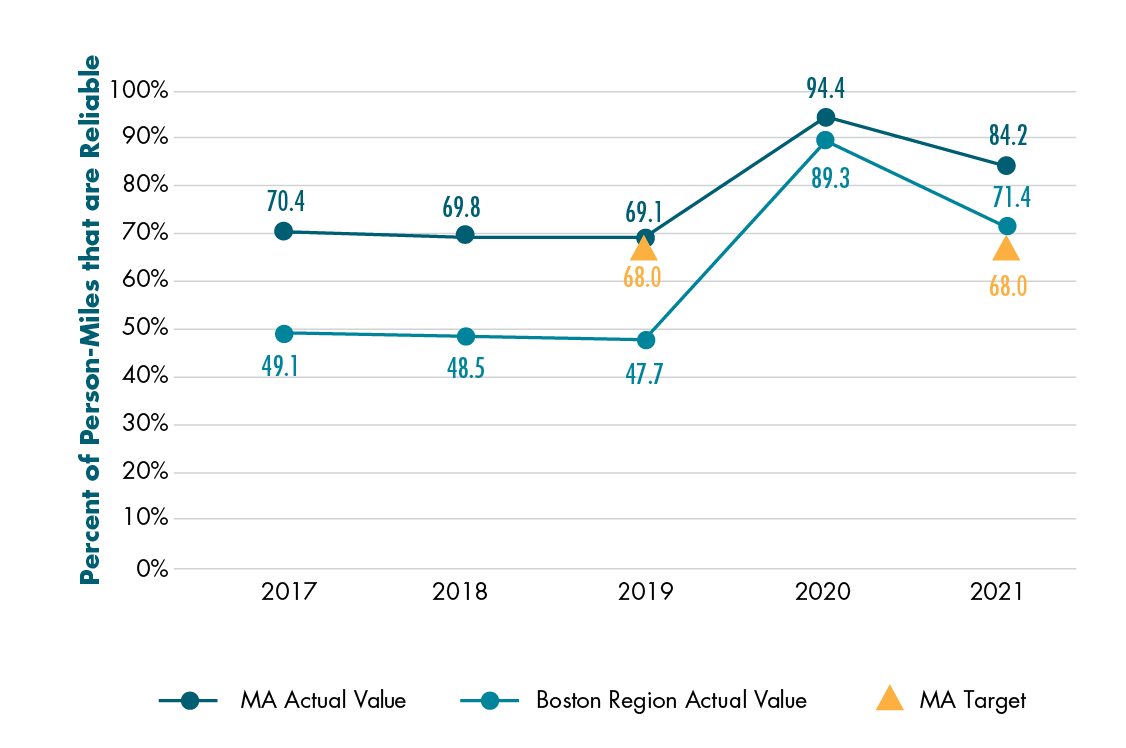
Note: The number of municipalities in the Boston Region MPO area decreased from 101 to 97 in 2018. This change may have affected 2017 values calculated using the RITIS platform in April 2022 as compared to baselines determined when targets were initially set in 2018.
MPO = metropolitan planning organization. RITIS = Regional Integrated Transportation Information System.
Sources: National Performance Management Research Data Set and the Boston Region MPO staff.
Figure 4-7
Performance Values and Targets for the Percent of Person-Miles that are Reliable on the Non-Interstate NHS (Massachusetts Statewide and Boston Region)
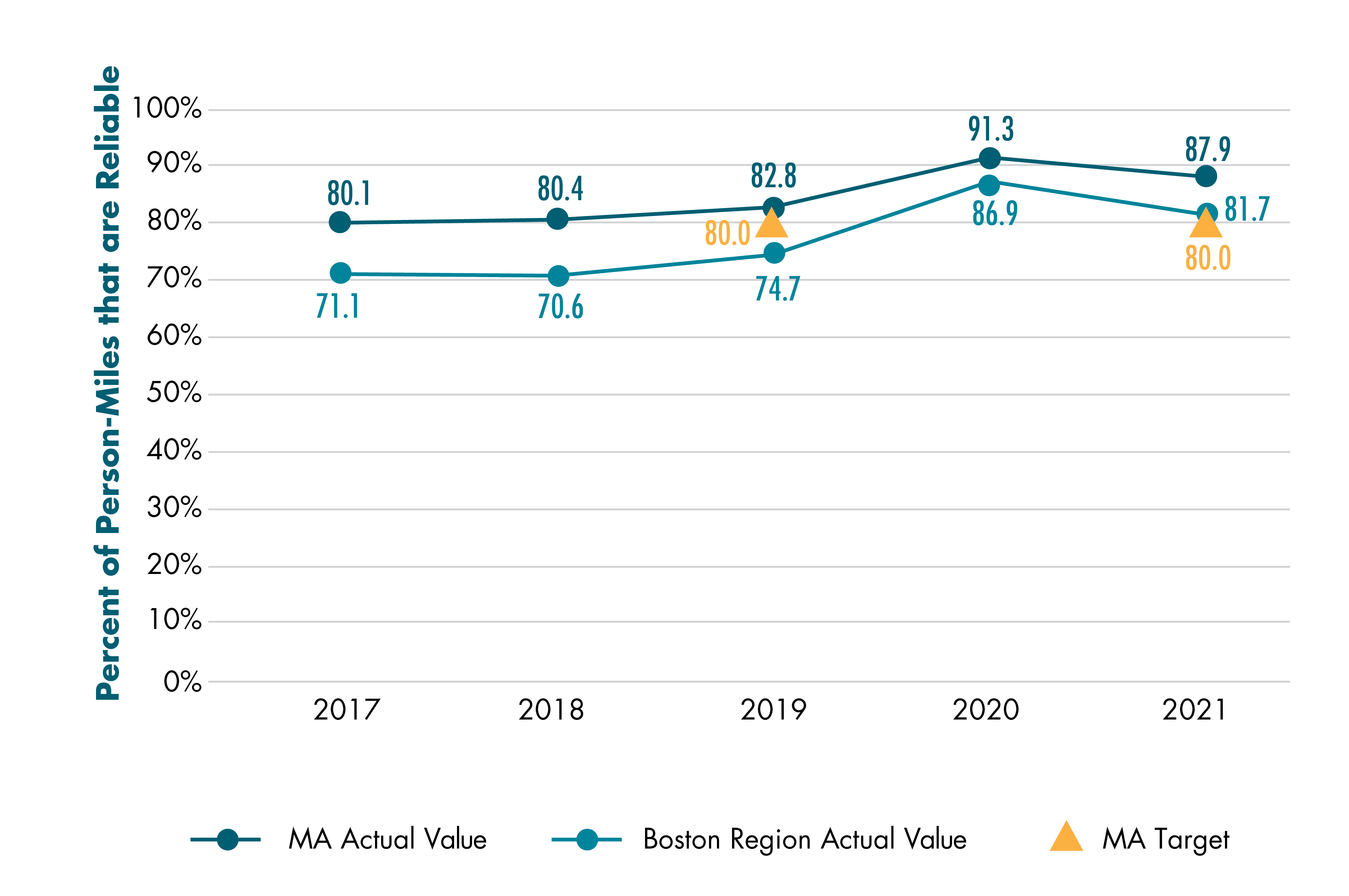
Note: The number of municipalities in the Boston Region MPO area decreased from 101 to 97 in 2018. This change may have affected 2017 values calculated using the RITIS platform in April 2022 as compared to baselines determined when targets were initially set in 2018.
MPO = metropolitan planning organization. NHS = National Highway System. RITIS = Regional Integrated Transportation Information System.
Sources: National Performance Management Research Data Set, Massachusetts Department of Transportation, and the Boston Region MPO staff.
FHWA requires states and MPOs to track truck travel time reliability on the Interstate System to better understand the performance of the nation’s freight system. The applicable measure in this case is the Truck Travel Time Reliability Index (TTTR). Like the LOTTR, this measure compares longer (95th percentile) truck travel times to average (50th percentile) truck travel times. The greater the difference between these two travel times on an Interstate segment, the less reliable truck travel on that segment is considered to be. For each Interstate segment, states and MPOs calculate TTTR values for different day-and-time periods and weight the segment length by the maximum applicable TTTR value.4-36 They then sum these weighted segment lengths for all Interstate segments and divide that total value by the length of the full Interstate network for the applicable geographic area. Like segment-specific TTTR values, the greater this aggregate value is, the more unreliable the network is with respect to truck travel.
In 2018, MassDOT calculated baseline TTTR Index values and established performance targets using CY 2017 truck travel-time data included in the NPMRDS. As with the all-vehicle travel time reliability targets, MassDOT set its two-year and four-year targets equal to the CY 2017 baseline. Table 4-21 displays these values. MPOs are required to set four-year targets for this measure, and the Boston Region MPO board voted to support MassDOT’s four-year TTTR Index target in 2018. Table 4-21 also includes the Boston region’s CY 2017 baseline index value. As the table shows, the Boston region’s TTTR baseline value is higher than the one for Massachusetts, indicating that truck travel times on the region’s Interstate highway network have been generally less reliable than on Massachusetts’s full Interstate network.
Table 4-21
Baseline Values and Targets for Truck Travel Time Reliability
Network |
Measure |
Cumulative Traffic |
2017 Measure |
Two-Year Target |
Four-Year Target |
| Massachusetts—Interstate Highway System | Truck Travel Time Reliability Index | 1,150 | 1.85 | 1.85 | 1.85 |
| Boston Region—Interstate Highway System1 | Truck Travel Time Reliability Index | 354 | 2.55 | N/A | N/A |
Note: The two-year target reflects conditions as of the end of CY 2019, and the four-year target reflects conditions as of the end of CY 2021.
1 The baseline values for the Boston region that are shown in this table were calculated in 2018.
CY = calendar year. MPO = metropolitan planning organization. N/A = not applicable.
Sources: National Performance Management Research Data Set, Cambridge Systematics, the Massachusetts Department of Transportation, and the Boston Region MPO staff.
Figure 4-8 shows the change in TTTR Index values for Interstate Highway System for both Massachusetts and the Boston region between 2017 and 2021. As shown in the charts the TTTR values measures for the Interstate Highway System in Massachusetts were better than the Commonwealth’s two-year and four-year targets. As with the metrics capturing the share of reliable person-miles on the NHS, TTTR values improved for both Massachusetts and the Boston region in 2020, although values increased for both geographies in 2021. Performance monitoring will enable the Commonwealth, the MPO, and other stakeholders to respond to post-pandemic changes in truck travel time reliability.
Figure 4-8
Performance Values and Targets for Truck Travel Time Reliability on the Interstate Highway System (Massachusetts Statewide and Boston Region)
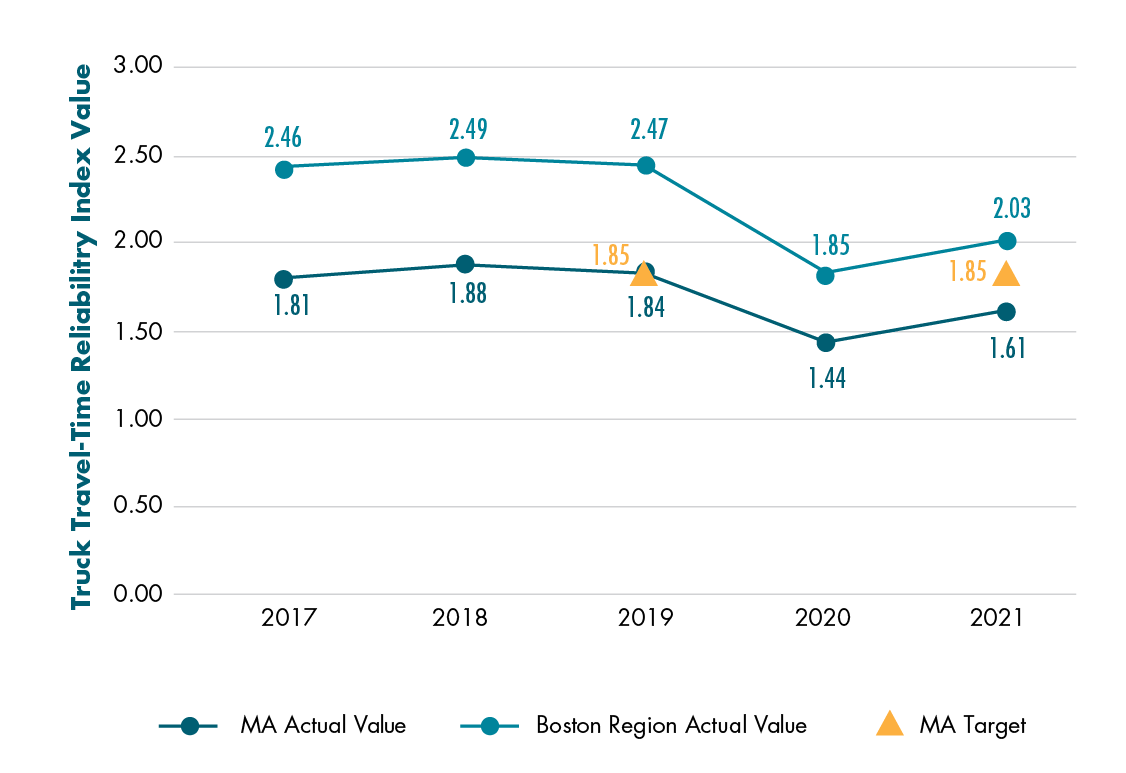
Note: The number of municipalities in the Boston Region MPO area decreased from 101 to 97 in 2018. This change may have affected 2017 values calculated using the RITIS platform in April 2022 as compared to baselines determined when targets were initially set in 2018.
MPO = metropolitan planning organization. RITIS = Regional Integrated Transportation Information System.
Sources: National Performance Management Research Data Set, Massachusetts Department of Transportation, and the Boston Region MPO staff.
MassDOT and the Boston Region MPO also examine mobility using measures they must monitor to meet CMAQ requirements. These measures are designed to help FHWA, states, and MPOs better understand the impacts of CMAQ investments, which are intended to contribute to air quality improvements and provide congestion relief. CMAQ performance measures related to traffic congestion apply to urbanized areas (UZAs) that contain geographic areas designated as nonattainment areas because they do not meet the US Environmental Protection Agency (EPA) standards for criteria air pollutants and precursors from mobile sources.4-37 The measures also apply to geographic areas, designated as maintenance areas, that have a history of being in nonattainment and are thus required to maintain air quality monitoring and standard conformity processes.
States must be involved in setting targets for CMAQ traffic performance measures if (1) they have mainline highways on the NHS that cross part of a UZA with a population of more than one million; and (2) that UZA contains part of a nonattainment or maintenance area for relevant criteria pollutants. Similarly, MPOs must participate in target setting for the traffic congestion measures if (1) the region contains mainline highways on the NHS that cross part of a UZA with a population of more than one million; and (2) the part of the MPO area that overlaps the UZA contains part of a nonattainment or maintenance area for relevant criteria pollutants. Massachusetts and the Boston Region MPO each meet these respective criteria and, therefore, must be involved in monitoring and setting targets for traffic congestion performance measures for the Boston MA-NH-RI UZA, which encompasses several MPO areas in eastern Massachusetts, New Hampshire, and Rhode Island. Agencies in each UZA that are responsible for these traffic congestion measures set two-year and four-year targets.
The first of these CMAQ traffic congestion measures is annual hours of peak hour excessive delay (PHED) per capita, which estimates the excessive delay experienced by a UZA’s population from travel on the NHS during peak periods. States and MPOs calculate this measure using several component metrics:
The PHED per capita measure is calculated at the Boston MA-NH-RI UZA level by multiplying the hours of excessive delay during peak periods by the number of travelers during peak periods, and then dividing that total by the UZA population.
To understand baseline performance and set targets for this measure, MassDOT and the New Hampshire Department of Transportation (NH DOT) worked with analysts at Cambridge Systematics and, using 2017 NPMRDS data, calculated annual hours of PHED per capita for travel on the NHS in their respective portions of the Boston MA-NH-RI UZA.4-40 In 2018, the agencies in the Boston MA-NH-RI UZA that are subject to CMAQ performance monitoring requirements—MassDOT, NH DOT, the Boston Region MPO, and the Northern Middlesex Council of Governments (NMCOG)—established two-year and four-year targets that maintain this 2017 baseline value for the annual hours of PHED per capita measure, as shown in Table 4-22.
Table 4-22
Baseline Value and Targets for Annual Hours of Peak Hour Excessive Delay Per Capita in the Boston MA-NH-RI UZA
Geographic Area |
Massachusetts and New |
Boston MA-NH-RI UZA Population (MA and NH only)1 |
2017 Measure Value (Baseline) |
Two-Year Target |
Four-Year Target -21)2 |
Boston MA-NH-RI Urbanized Area |
80,053,183 |
4,371,476 |
18.30 |
18.30 |
18.30 |
1 Cambridge Systematics aggregated 2012–16 American Community Survey population estimates from the US Census Bureau at the block group level to estimate the population for the portion of the UZA in Massachusetts and New Hampshire, and then inflated this estimate for 2017 by applying information on expected population growth in the Boston Metropolitan Statistical Area between 2016 and 2017.
2 The two-year target reflects conditions as of the end of CY 2019, and the four-year target reflects conditions as of the end of CY 2021.
CY = calendar year. FHWA = Federal Highway Administration. MA = Massachusetts. MPO = metropolitan planning organization. NH = New Hampshire. PHED = peak hours of excessive delay. RI = Rhode Island. UZA = urbanized area.
Sources: National Performance Management Research Data Set, US Census Bureau, FHWA, the Massachusetts Department of Transportation, the New Hampshire Department of Transportation, Cambridge Systematics, and the Boston Region MPO staff.
MassDOT’s 2018 and 2019 estimates of PHED per capita in the Boston MA-NH-RI UZA show increases compared to the baseline value of 18.3 hours of delay per capita from 2017 (22.9 hours per person in 2018 and 25.2 in 2019). As previously mentioned, the initial value and targets for this measure were calculated with a limited amount of historic data, given differences between the NPMRDS data that were available for 2017 compared to 2016 and earlier. Also, MassDOT staff notes that several data-related factors may affect these more recent estimates. For example, the segments included on the NHS network in the NPMRDS vary from set to set, which affects the amount of excessive delay that states and MPOs can account for in their calculations.
While congestion may have increased in the Boston MA-NH-RI UZA in 2018 and 2019, the aforementioned data issues complicate any analysis of trends. Also, the COVID-19 pandemic, along with related public and private sector responses, has impacted travel behavior on all modes in since Spring 2020. Given these circumstances and uncertainty, when revisiting targets in 2020, the agencies in the Boston MA-NH-RI UZA maintained the existing four-year performance target of 18.3 hours of PHED per capita.
States and MPOs that meet applicability criteria for CMAQ performance requirements must also monitor and set targets for the share of non-single-occupant-vehicle (non-SOV) travel. This measure is calculated at the UZA level. The percent of non-SOV travel performance measure describes the extent to which people are using alternatives to single-occupancy vehicles to travel and, thus, helping to reduce traffic congestion and air pollution from mobile sources.
Collectively, MassDOT, NH DOT, the Boston Region MPO, and NMCOG use American Community Survey (ACS) data from the US Census Bureau to estimate the percent of workers ages 16 and older who commuted to work using an option other than driving alone. These ACS five-year period estimates are rolling annual averages. When these agencies first established targets for this measure in 2018, they examined changes in the percentage of workers using non-SOV commuting options in the Boston MA-NH-RI UZA between 2012 (2008–12 ACS estimate) and 2016 (2012–16 ACS estimate). These data showed an increase in use of non-SOV commuting options over time. MassDOT calculated a linear trend line using these values for the Boston MA-NH-RI UZA and used that trend line to project expected values as of the end of CY 2019 (the expected 2015–19 ACS estimate) and CY 2021 (the expected 2017–21 ACS estimate). These initial targets are described in the MPO’s 2018 CMAQ Performance Plan.4-41
In 2020, MassDOT, NH DOT, the Boston Region MPO, and NMCOG revisited the targets for the percent of non-SOV travel measure. These agencies examined 2013–17 and 2014–18 ACS data and found that the values reported in the data for these years were higher than the projections they made when setting initial targets. Because of this, they suggested that averages for CY 2019 and CY 2021 would exceed the performance targets established in 2018.
When revisiting existing targets, these agencies considered that the COVID-19 pandemic, along with related public and private sector responses, affected 2020 travel patterns across modes and would likely have impacts on travel in 2021 as well. Fluctuations in SOV traffic volumes, transit ridership, and carpool, taxi, and rideshare travel introduce some uncertainty. However, some changes, such as increased teleworking, may complement the ongoing investments by MassDOT, NH DOT, the Boston Region MPO, the NMCOG, and other agencies in the Boston MA-NH-RI UZA in projects that encourage travelers to use alternatives to SOVs when traveling to work and other destinations. Also, the five-year rolling average value associated with the four-year target (2017–21) will capture increases in non-SOV travel prior to 2020, even if uncertainties affect travel choices in 2020 and 2021.
Given the aforementioned updated data points and assumptions, MassDOT and NH DOT—in consultation with the Boston Region MPO and NMCOG staff—updated the Boston MA-NH-RI UZA’s four-year performance target for the percent of non-SOV travel measure from 35.1 percent to 35.8 percent. The Boston Region MPO formally adopted this revised target in November 2020. Figure 4-9 shows past values and projections, updated actual values and projections, and initial and adjusted performance targets for this measure. Using 2016–20 ACS estimates related to modes used to commute to work, MPO staff estimated that the share of non-SOV travel to work in the Boston MA-NH-RI UZA is 36.9 percent, which is higher than the value that MassDOT, NH DOT, Boston Region MPO, and NMCOG staff projected for that timeframe.4-42 This increase compared to the projected value may be due in part to the increase in remote work during the COVID-19 pandemic in 2020.
Figure 4-9
Performance Values and Targets for the Percent of Non-SOV Travel in the Boston MA-NH-RI UZA
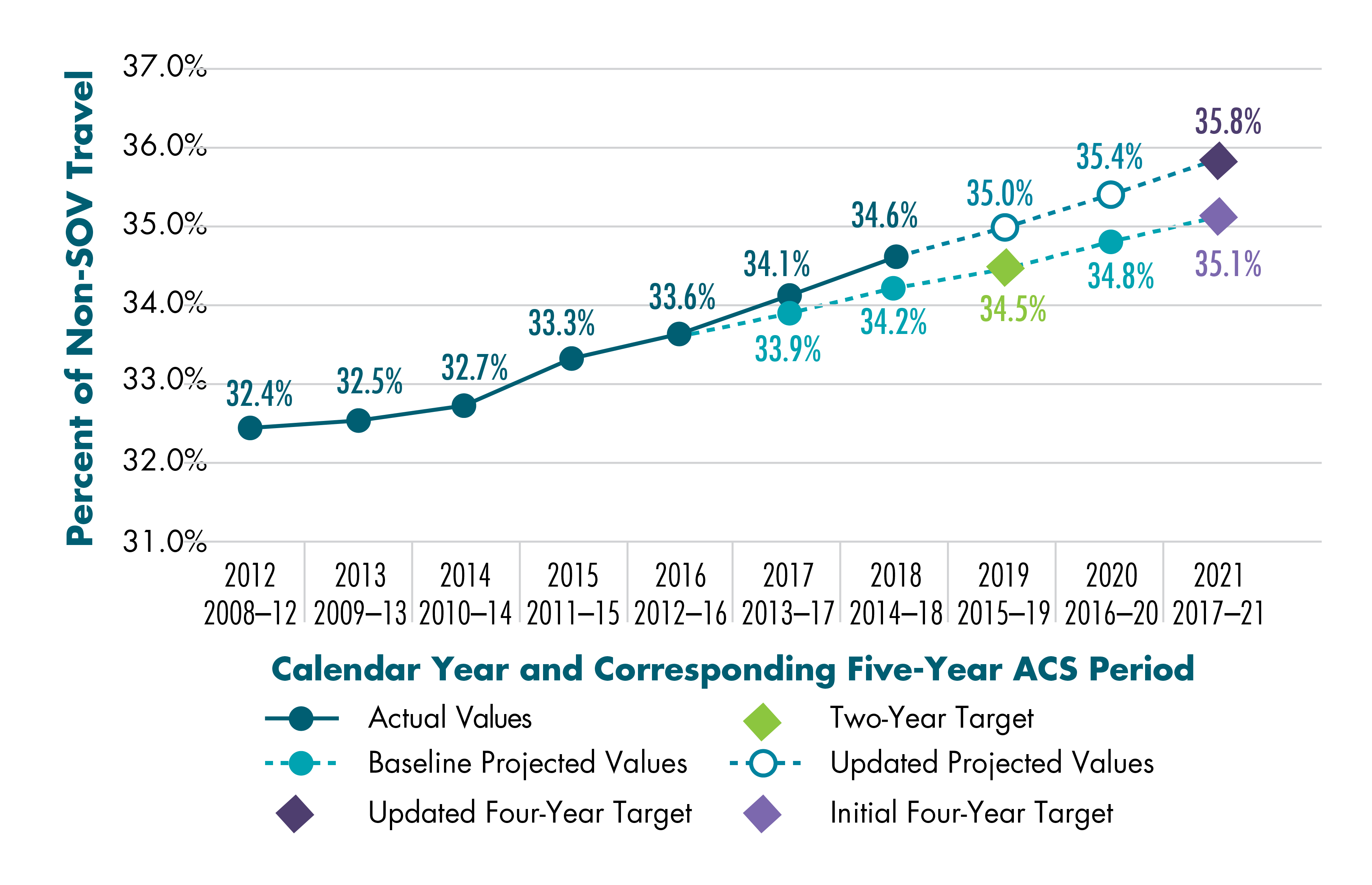
Notes: Values in this figure reflect five-year rolling averages for the percent of non-SOV travel to work for workers ages 16 and older. This chart was developed in September 2020.
ACS = American Community Survey. MA = Massachusetts. MPO = metropolitan planning organization. NH = New Hampshire. Non-SOV = non-single-occupancy vehicle. RI = Rhode Island. UZA = urbanized area.
Sources: US Census Bureau, ACS Five-Year Estimates (Table DP03, “Selected Economic Characteristics”); the Massachusetts Department of Transportation; the New Hampshire Department of Transportation; and the Boston Region MPO staff.
Table 4-23 lists the baseline and performance targets for the percent of non-SOV travel measure.
Table 4-23
Performance Values and Targets for the Percent of Non-SOV Travel in the Boston MA-NH-RI UZA
Geographic Area |
Baseline Value (CYs 2012–16 average) |
Two-Year Target (CYs 2015–19 average) |
Projected Two-Year Value (CYs 2015–19 average) |
Adjusted Four-Year Target (CYs 2017–21 average) |
Boston MA-NH-RI UZA |
33.6% |
34.5% |
35.0% |
35.8% |
Note: Values in this table reflect five-year rolling averages for the percent of non-SOV travel to work.
ACS = American Community Survey. CY = calendar year. MA = Massachusetts. MPO = metropolitan planning organization. N/A = not applicable. NH = New Hampshire. Non-SOV = non-single-occupancy vehicle. RI = Rhode Island. UZA = urbanized area.
Sources: US Census Bureau, ACS Five-Year Estimates (Table DP03, “Selected Economic Characteristics”); the Massachusetts Department of Transportation; the New Hampshire Department of Transportation; and the Boston Region MPO staff.
The MPO seeks to make investments that help manage capacity on the transportation network and improve mobility options for travelers in a variety of ways, including the following:
When prioritizing projects for funding with Regional Target dollars, the MPO uses evaluation criteria to assess how well each project expands transportation options and mode choice and how it supports mobility. These sets of criteria have included, and continue to include, items that award points to projects that enhance bicycle and pedestrian accommodations and connections to transit, and that support truck movement. The MPO’s criteria prior to October 2020 granted points to projects that reduced vehicle congestion and delay for transit vehicles. In October 2020, the MPO adopted an updated set of project selection criteria that
The MPO’s Community Connections investment program, which funds first- and last-mile solutions, community transportation, and other related projects, has its own set of evaluation criteria. These criteria focus on connectivity to transit and key destinations and supporting shifts in travel to non-SOV modes.
By electing to support the Commonwealth’s targets for federally required reliability measures and agreeing to the Boston MA-NH-RI UZA targets for the federally required annual hours of PHED per capita and non-SOV travel measures, the MPO agrees to plan and program projects so that they contribute to achieving those targets. It can be challenging to anticipate how transportation projects may affect these performance measures, as they track outcomes that are not only affected by transportation investments but also traveler choices and demand, among other factors. The MPO developed estimates for MPO staff-identified project-related metrics to see how its Regional Target roadway projects could improve the transportation system in ways that contribute to more reliable, less congested travel on the NHS or that encourage more non-SOV travel:
Table 4-24 summarizes these estimates for Regional Target corridor, intersection, bicycle and pedestrian, and Community Connections projects. MPO staff developed estimated values for these metrics using available data from functional design reports and other materials provided by project proponents; results from the MPO’s TIP evaluations; 2019 NPMRDS data available in the RITIS platform; and other sources. These estimates aggregate changes in vehicle hours of delay using project-level information on vehicle volumes and changes in delay times at intersections from project improvements.
Table 4-24
Regional Target Projects: Capacity Management and Mobility Performance Metrics
Metric |
Value |
| Projects that overlap unreliable NHS segments and that will improve roadway signalization or geometry2 | 12 projects |
| Projects that overlap any NHS segments and that will improve roadway signalization or geometry1,2 | 19 projects |
| Net reduction in vehicle hours of delay per day2,3 | 11,000 hours reduced per day |
| Net reduction in vehicle hours of delay per day for projects that overlap the NHS2,3 | 7,800 hours reduced per day |
| Miles of new sidewalks added | 11 miles |
| Lane-miles of new bicycle accommodations and shared-use paths | 52 lane-miles |
| Number of new transit services4 | 4 transit services |
| Number of expanded transit services4 | 4 transit services |
| Number of new bikeshare stations | 9 stations |
| Projects that improve intermodal connections or access to transit | 38 projects |
1 The MPO staff identified reliable and unreliable segments on the NHS using the 2019 NPMRDS data in the RITIS platform and federal travel time reliability performance thresholds.
2 These metrics exclude Community Connections and Transit Modernization projects.
3 These aggregate estimates of reductions in vehicle hours of delay exclude Project 606226–Reconstruction of Rutherford Avenue in Boston, and 607981–McGrath Boulevard Construction. These two projects were included in the air quality modeling results for the Destination 2040 recommended plan. Project S12694–NewMo Microtransit Service Expansion is counted separately from Project S12125–Newton Microtransit Service. These aggregate estimates are based on projected future conditions for project locations and have been rounded to the nearest hundred.
4 Project S12694–NewMo Microtransit Service Expansion is counted separately from Project S12125–Newton Microtransit Service.
MPO = metropolitan planning organization. NHS = National Highway System. NPMRDS = National Performance Management Research Data Set. RITIS = Regional Integrated Transportation Information System.
Source: Boston Region MPO staff.
During FFYs 2023–27, the MPO will fund two projects near Interstate highways: the construction of Interstate-495/Route 1A Ramps in Wrentham and a bridge replacement on Route 30 over the Charles River in Newton and Weston (near the Interstate 90 and 95 Interchange, a bottleneck identified in MassDOT’s current Freight Plan).4-43 These projects include signal, structure, and roadway geometry improvements that may help improve truck mobility and travel time reliability. Meanwhile, the MPO’s investment in transit state-of-good-repair improvements at Lynn Station and Forest Hills Station may make transit a more attractive travel option and encourage increases in non-SOV travel.
The FFYs 2023–27 TIP also includes funding that is not yet programmed for Community Connections projects in FFYs 2024–27 and for the Transit Modernization Program in FFYs 2025–27. Future projects in the Transit Modernization Program will help encourage non-SOV travel by upgrading transit assets, which may support better service and make transit a more attractive travel option. Similarly, future projects in the Community Connections program will encourage non-SOV travel by addressing first- and-last-mile needs. Increases in non-SOV travel may in turn make roadways less congested and more reliable.
MassDOT, MBTA, and RTA projects, which are described in Chapter 3, also address capacity management and mobility in the Boston region and may also support improvements on federally required reliability, congestion, and non-SOV travel performance measures. In particular, MassDOT’s nine Bicycle and Pedestrian projects enhance, connect, or expand the region’s bicycle and pedestrian networks, which support non-SOV travel and the High Comfort Bike network described in the Massachusetts Bicycle Transportation Plan. Its eleven Safe Routes to School projects will improve bicycling and walking conditions and thereby encourage students to take non-SOV modes to get to school. MassDOT’s Intersection Improvement Program includes nine projects which may address delay and congestion. Four of its Roadway Reconstruction projects will implement improvements at freight bottlenecks identified in MassDOT’s Freight Plan, including
Meanwhile, MBTA and RTA investments enhance the region’s transit systems and make them attractive alternatives to SOV travel, which may in turn help reduce congestion and improve reliability. For example, the MBTA has set aside funding to support the construction of bus priority infrastructure, such as side or center-running bus lanes, transit signal priority (TSP) implementation, and bus stop upgrades. Meanwhile, both CATA and MWRTA will upgrade their fare collection technologies, and MWRTA will implement electric sign boards at high-demand locations to expand rider access to digital tools, which will improve riders’ experiences using transit.
The MPO will continue to work with MassDOT, the MBTA, the region’s RTAs, other transit service providers, and other stakeholders in the region to improve capacity management and mobility performance. These activities may include the following:
The MPO aims to support clean air and sustainable communities in the Boston region by creating an environmentally friendly transportation system. It pursues this goal by investing in projects that reduce greenhouse gases (GHGs) and other pollutants generated by the transportation sector and minimizing negative environmental impacts from the system.
The MPO recognizes that GHG emissions contribute to climate change. If climate change trends continue as projected, the conditions in the Boston region will include a rise in sea level coupled with storm-induced flooding, and warmer temperatures that would affect the region’s infrastructure, economy, human health, and natural resources. The Commonwealth of Massachusetts is responding to this challenge by taking action to reduce the GHGs produced in the state, including those generated by the transportation sector. To that end, Massachusetts passed its Global Warming Solutions Act (GWSA), which requires reductions of GHGs by 2020, and further reductions by 2050, relative to 1990 baseline conditions. To meet GWSA requirements, the MPO works with MassDOT and other stakeholders to anticipate the GHG impacts of projects included in the TIP, specifically by examining additions or reductions in carbon dioxide (CO2). More details on the MPO’s GHG tracking and evaluation processes are included in Appendix B.
Transportation projects may also help reduce other air pollutants and precursors and support reductions in CO2, volatile organic compounds (VOCs), nitrogen oxides (NOx) and carbon monoxide (CO) by improving traffic flow and bicycle and pedestrian travel. The Boston Region MPO contains a maintenance area for CO in Waltham and also is required to track VOCs and NOx to meet EPA requirements. (More detailed information about the MPO’s air quality status and related requirements is available in Chapter 5.)
The MPO tracks the air quality benefits of transportation projects to identify projects that may be eligible for CMAQ funds. It describes these CMAQ-funded projects in its CMAQ Performance plans and progress reports; these documents include performance targets for the annual PHED per capita and share of non-SOV travel measures described in the previous section, along with targets for the amount of applicable emissions the MPO expects will be reduced because of CMAQ-funded projects in air quality non-attainment or maintenance areas in the region. The MPO must note how it expects its CMAQ-funded projects to support improvements with respect to relevant performance measures, which reinforces the connection between planning, investments, and expected performance outcomes.
The federally required CMAQ emissions reduction measure, identified in Table 4-3, is the total emissions reduction for applicable pollutants and precursors for CMAQ-funded projects in designated nonattainment and maintenance areas. FHWA requires states and MPOs subject to these CMAQ performance management requirements to establish a baseline for this measure by identifying emissions reductions associated with any CMAQ-funded projects programmed in air quality nonattainment or maintenance areas between FFY 2014 and FFY 2017. These states and MPOs were also required to set two-year and four-year targets for the emissions reductions expected from CMAQ-funded projects programmed in nonattainment or maintenance areas.
In the Boston Region MPO’s case, this CMAQ emissions performance measure would capture the anticipated CO emissions reductions from any CMAQ-funded projects that the MPO has programmed specifically in the carbon monoxide maintenance area in Waltham.4-44 Table 4-25 shows the Boston Region MPO’s baseline and target values for this measure. Neither the MPO nor MassDOT programmed any CMAQ-funded projects in Waltham during FFYs 2014 to 2017. When targets were set in 2018, the MPO’s TIP did not reflect any CMAQ-funded projects programmed in Waltham from FFYs 2018 to 2021. Neither the MPO nor MassDOT ultimately programmed CMAQ-funded projects in Waltham during this time period. The FFYs 2023–27 TIP will provide CMAQ funding for the NewMo Expansion project in FFYs 2023–25, and this project will enable riders to connect to destinations in Waltham. While emissions reductions from this project would not help to achieve current performance targets, they may affect future target-setting and performance monitoring activities.
Table 4-25
Baseline Value and Targets for Emissions Reduction from CMAQ Projects in the Boston Region
Performance Measure |
FFYs 2014–17 Measure Value (Baseline) |
Two-Year Target |
Four-Year Target |
Daily kilograms of carbon monoxide emissions reduction from CMAQ projects in Boston region nonattainment or maintenance areas |
0 |
0 |
0 |
CMAQ = Congestion Mitigation and Air Quality Improvement. FFY = federal fiscal year. MPO = metropolitan planning organization.
Source: Boston Region MPO staff.
The MPO uses evaluation criteria to assess the projected transportation-related emissions reductions from projects that are candidates for Regional Target funding, both for CO2 and other air quality pollutants and precursors, among other environmental considerations. Transportation projects can support reductions in CO2, VOCs, NOx, and CO by improving traffic flow and providing alternatives to SOV travel, including bicycle, walking, and transit options.
Table 4-26 displays the CO2 and other emissions reductions the MPO expects from projects it has programmed using its Regional Target funds. MPO staff estimates emissions for projects using MassDOT’s air quality analysis worksheets for each project type and the EPA’s Motor Vehicle Emission Simulator (MOVES) emission factors.
Table 4-26
Regional Target Projects: Clean Air and Sustainable Communities Performance Metrics
Metric |
Value |
| Annual kilograms of CO2 reduced | 11,162,500 kilograms |
| Annual kilograms of other emissions (VOCs, NOx, and CO) reduced | 23,700 kilograms |
Note: These aggregate emission reduction estimates exclude Project 606226–Reconstruction of Rutherford Avenue in Boston, and 607981–McGrath Boulevard Construction. These two projects were included in the air quality modeling results for the Destination 2040 recommended plan.These aggregate estimates are based on projected future conditions for project locations and have been rounded to the nearest hundred. CO = carbon monoxide. CO2 = carbon dioxide. MPO = metropolitan planning organization. NOx = nitrogen oxide. VOC = volatile organic compounds.
Source: Boston Region MPO staff.
As previously mentioned, the FFYs 2023–27 TIP also includes funding that has not yet been programmed for Community Connections projects in FFYs 2024–27 and for the Transit Modernization Program in FFYs 2025–27. Future projects in the Transit Modernization Program will help reduce emissions by encouraging non-SOV travel or by changing the amount or type of energy these assets use. Similarly, future projects in the Community Connections program will encourage non-SOV travel and emissions reductions by addressing first- and last-mile needs.
MassDOT, MBTA, and RTA projects and programs also support improvements to air quality and the environment. For example, as described in Chapter 3, both the MBTA and MWRTA’s capital programs include investments to electrify their vehicle fleets and upgrade their facilities to meet the needs of those vehicles. Appendix B provides more detailed information and assessments of the GHG impacts of MassDOT, MBTA, CATA, and MWRTA projects and programs. MassDOT sets separate CMAQ emissions reduction performance targets and tracks the relationship between its projects and those targets.4-45
The GWSA and FHWA’s CMAQ performance management requirements create frameworks that reinforce coordination between the MPO, MassDOT, and the region’s transit providers as they make investments to support clean air and sustainable communities. Future performance activities in this area may include the following:
The MPO seeks to ensure that the Boston region’s transportation network provides a strong foundation for economic vitality. Transportation investments can support economic vitality in a variety of ways, such as by supporting freight movement, improving connections to key freight and economic development sites, and supporting compact development. The MPO’s approach to addressing freight needs is guided in large part by MassDOT’s Freight Plan, which identifies key freight facilities and needs, strategies to improve freight movement, and priority projects.
The Metropolitan Area Planning Council’s (MAPC) regional plan also shapes the MPO’s approach to pursuing economic vitality goals. The recently adopted MetroCommon 2050 plan outlines MAPC’s mobility goal for the region in 2050, which is that “traveling around Metro Boston is safe, affordable, convenient, and enjoyable.”4-46 Several subgoals are relevant to economic vitality:
MAPC’s 2020-2025 Comprehensive Economic Development Strategy also outlines the goal that “everyone in the region is able to access jobs, goods, and services close to their homes via affordable transportation options, with shorter commutes and fewer transfers.”4-47
To support Metrofuture, the previous regional plan, MAPC worked with its state-level partners at the Executive Office of Housing and Economic Development (EOHED) and the Executive Office of Energy and Environmental Affairs (EOEEA), as well as municipalities, to identify locations throughout the region appropriate for building housing stock and siting employers. These agencies identified improvements needed to support the outcomes planned for these local, regional, and state-level priority development areas, and this work helps MAPC, the MPO, and state agencies to respond with their investments and technical assistance.
States and MPOs track the federally required truck travel time reliability measure for the Interstate Highway System, listed in Table 4-3, by using the Truck Travel Time Reliability Index. This measure has the most direct implications for the MPO’s capacity management and mobility goal area; however, this measure is also relevant to the Boston region’s economic vitality. For more details about this measure and associated targets, see the Capacity Management and Mobility Performance section of this chapter.
When evaluating TIP projects using its TIP criteria, the MPO assesses how well each project serves areas identified for economic development by state, regional, and local planning entities, such as priority sites designated under Massachusetts Chapter 43D, Massachusetts Opportunity Zones, and transit stations. The MPO also examines whether and how projects in its Complete Streets, Intersection Improvements, Major Infrastructure, and Transit Modernization programs serve areas with a relatively high density of existing development or that provide affordable housing. These assessments are based on MAPC-provided information on targeted development sites and project relationships to areas of concentrated development, along with Commonwealth data and project data from functional design reports and other sources. For the Community Connections program, MPO staff award some points to projects based the extent to which they connect to activity hubs and residential developments, addressing first- and last-mile needs. Table 4-27 provides some highlights of how Regional Target-funded projects in this TIP address economic vitality.
Table 4-27
Regional Target Projects: Economic Vitality Performance Metrics
Metric |
Value |
| Projects that improve access to sites targeted for development |
33 projects |
| Projects that serve existing employment and population centers1 | 32 projects |
| Community Connections projects that connect to activity hubs and residential developments | 11 projects |
1 This metric excludes projects in the MPO’s Community Connections program.
MPO = metropolitan planning organization.
Source: Boston Region MPO staff.
MAPC’s regional land use plan and economic vitality initiatives, USDOT’s freight directives, and MassDOT’s freight planning will all influence strategies that the MPO uses to monitor economic vitality performance going forward. The MPO’s ongoing freight planning work will also play an important role in this process. Future activities may include the following:
Figure 4-10 highlights some of the ways that the MPO’s FFYs 2023–27 Regional Target-funded projects support improved performance in the MPO’s various goal areas.
Figure 4-10
FFYs 2023–27 TIP Target Program: Projects by the Numbers
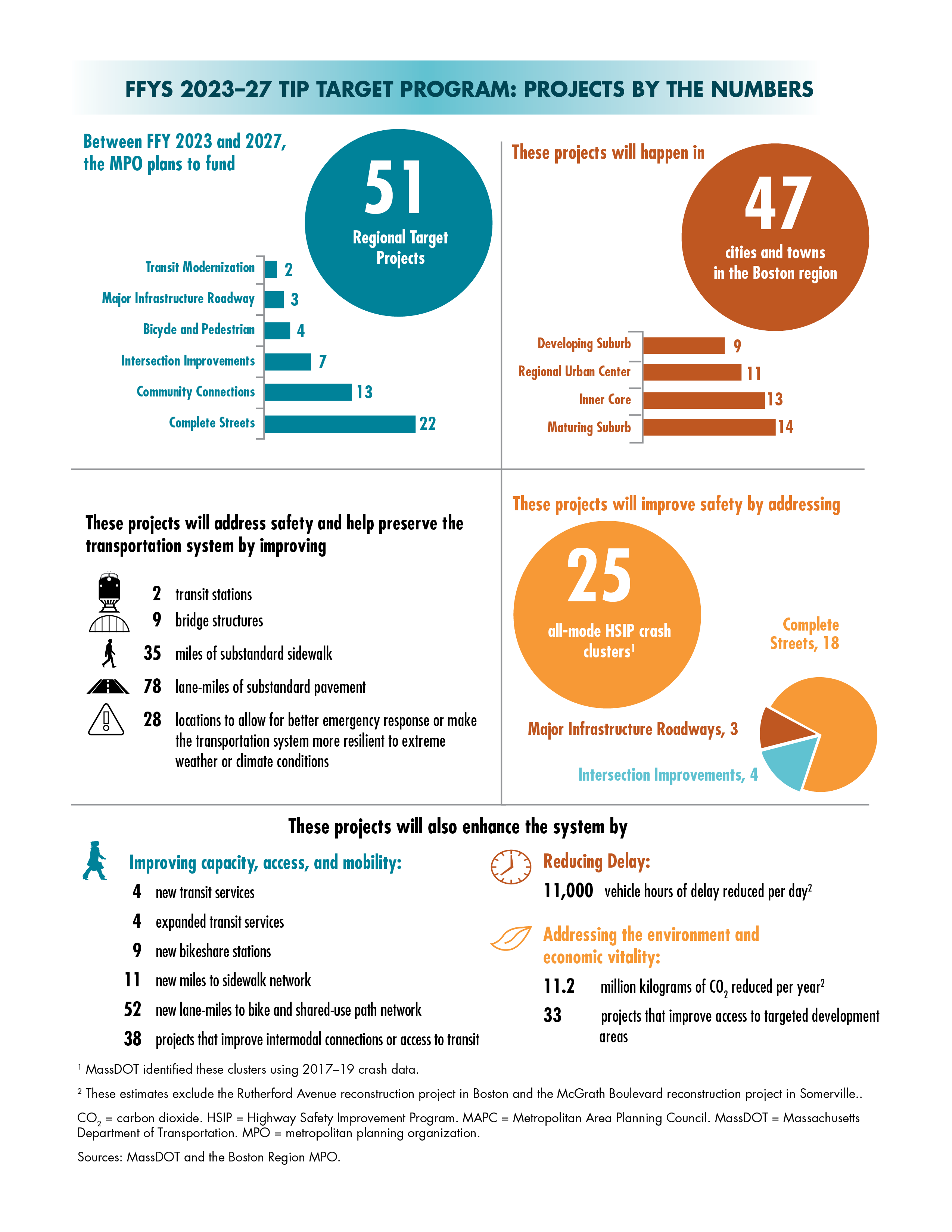
The three key phases in the MPO’s PBPP process—planning, investing, and monitoring and evaluating—were discussed earlier in this chapter. Within this framework, the MPO’s TIP relates primarily to the first two phases, focusing on the relationship between the goals and objectives and performance requirements in the MPO’s planning framework and ways the MPO will invest its capital dollars in upcoming federal fiscal years. Other MPO activities relate more directly to the monitoring and evaluation phase of PBPP:
The Commonwealth and the region’s transit agencies also have reporting and evaluation responsibilities. MassDOT and the Commonwealth’s Executive Office of Public Safety and Security report roadway safety target information annually to FHWA and NHTSA. MassDOT reports other statewide performance targets and related information to FHWA on a biennial basis via FHWA’s Performance Management Form. The MBTA, MWRTA, and CATA must report their asset inventory and condition data to the NTD and provide information about the progress that has been made with respect to performance measures and targets as compared to previous reports. These transit agencies also regularly report data about safety outcomes to the NTD, and their annual reviews of their PTASPs and safety targets also create opportunities for them to evaluate their performance.
Going forward, the MPO will incorporate the results of these reports and evaluations to use in its future planning and investment activities. These activities may include identifying new ways to bring information about performance into the MPO’s LRTP and TIP development processes, such as by updating project selection criteria or providing information through other means. This work would help the MPO develop scenarios to explore how various transportation investments made through the LRTP could support various goals and performance areas. Over time, the MPO expects that activities like these will help ensure that the MPO’s investments are helping to meet its vision and goals for the region’s transportation system.
4-1 Urbanized Areas are defined by the US Census Bureau to represent the urban cores of metropolitan areas. The Boston MA-NH-RI UZA includes the 97 municipalities in the Boston Region MPO and includes portions of neighboring MPOs in eastern Massachusetts, New Hampshire, and Rhode Island.
4-2 Massachusetts Department of Transportation, Massachusetts Strategic Highway Safety Plan (2018), pg. I, accessed March 8, 2022.
www.mass.gov/doc/massachusetts-shsp-2018/download
4-3 The Commonwealth of Massachusetts’ 2019 Bicycle Transportation Plan is available at www.mass.gov/service-details/bicycle-plan, and the 2019 Pedestrian Transportation Plan is available www.mass.gov/service-details/pedestrian-plan.
4-4 MBTA, CATA, and MWRTA 2021 PTASPs are available on the March 31, 2022, page of the MPO meeting calendar. See www.bostonmpo.org/calendar/day/20220331.
4-5 MBTA, MBTA Transit Safety Plan (June 3, 2021), pg. 13.
4-6 For this reporting cycle, the Commonwealth has adjusted its inclusion criteria for nonmotorists by excluding the nonmotorist type “not reported.” By manually inspecting crash data, the Commonwealth found that many people in this category were not actually bicyclists or pedestrians but bystanders (such as people who were in a building when it was struck by a vehicle).
4-7 Commonwealth of Massachusetts, “Highway Safety Improvement Program,” accessed March 25, 2022.
www.mass.gov/service-details/highway-safety-improvement-program
4-8 For more information, see MassDOT’s 2017 Top Crash Location Report (September 2020). www.mass.gov/doc/2017-top-crash-locations-report/download
4-9 The content of these tables is based on the project design information that was available to MPO staff when the FFYs 2023–27 TIP document was developed. Project extents and features may change as projects advance through the design development and review process.
4-10 For more information about the definitions of these performance measures—including deaths, injuries, or events that may be excluded from totals—see Boston Region MPO Staff, "Transit Safety Performance Targets—2022 Update" (March 31, 2022). https://www.ctps.org/data/calendar/pdfs/2022/MPO_0331_Memorandum_Transit_Safety_Targets.pdf.
4-11 MBTA, MBTA Transit Safety Plan (Revision 1), pg. 34.
4-12 MBTA, MBTA Transit Safety Plan (Revision 1), pg. 36.
4-13 MPO staff calculated these VRM estimate using the NTD’s January 2022 Monthly Module Adjusted Data release, available at www.transit.dot.gov/ntd/data-product/monthly-module-adjusted-data-release.
4-14 Specific data sources include the March 7, 2022, Monthly Modal Time Series file (available at data.transportation.gov/Public-Transit/Monthly-Modal-Time-Serievs/5ti2-5uiv, the March 7, 2022, Major Safety Events file (available at www.data.transportation.gov/Public-Transit/Major-Safety-Events/9ivb-8ae9), the 2016-20 Annual Database Vehicle Maintenance files (available at www.transit.dot.gov/ntd/ntd-data), and the January 2022 Monthly Module Adjusted Data Release file (available at www.transit.dot.gov/ntd/data-product/monthly-module-adjusted-data-release.
4-15 Massachusetts Department of Transportation, Tracker 2017: MassDOT’s Annual Performance Report, pg. 50, accessed March 17, 2022.
www.mass.gov/doc/2017-annual-performance-report/download.
4-16 MPO staff calculated these VRM estimates using the NTD’s January 2022 Monthly Module Adjusted Data release, available at www.transit.dot.gov/ntd/data-product/monthly-module-adjusted-data-release">www.transit.dot.gov/ntd/data-product/monthly-module-adjusted-data-release.
4-17 Specific data sources include the March 7, 2022, Monthly Modal Time Series file (available at data.transportation.gov/Public-Transit/Monthly-Modal-Time-Series/5ti2-5uiv), the March 7, 2022, Major Safety Events file (available at data.transportation.gov/Public-Transit/Major-Safety-Events/9ivb-8ae9), the 2016-20 Annual Database Vehicle Maintenance files (available at www.transit.dot.gov/ntd/ntd-data) and the January 2022 Monthly Module Adjusted Data Release file (https://www.transit.dot.gov/ntd/data-product/monthly-module-adjusted-data-release).
4-18 Federal Transit Administration, “Nexus of Transit Asset Management and Safety Management Systems” accessed April 28, 2022. https://www.transit.dot.gov/sites/fta.dot.gov/files/docs/regulations-and-guidance/safety/public-transportation-agency-safety-program/117291/nexus-transit-asset-management-and-safety-management-systems.pdf
4-19 Massachusetts Department of Transportation, Transportation Asset Management Plan (September 2019), accessed April 13, 2022.
www.mass.gov/doc/2019-transportation-asset-management-plan/download
4-20 The MBTA’s, CATA’s, and MWRTA’s 2018 TAM Plans are available on the March 21, 2019, page of the MPO meeting calendar (www.ctps.org/calendar/day/20190321).
4-21 Federal guidelines for bridge performance monitoring define bridges using National Bridge Inspection standards, which define a bridge as a structure with a span length of over 20 feet.
4-22 Massachusetts Department of Transportation, Transportation Asset Management Plan (2019), pg. 8.
4-23 Massachusetts Department of Transportation, Transportation Asset Management Plan (2019), pg. 18.
4-24 The roadway mileage values discussed in this section are from this report: Massachusetts Department of Transportation, 2020 Massachusetts Roadway Inventory Year End Report (July 2021), pgs. 54, 55, 58 59, and 64, accessed April 23, 2021.
www.mass.gov/doc/2020-road-inventory-year-end-report/download
These values exclude unaccepted roads, which are open to public travel (and some private ways) but that have not been formally accepted by a city or town as part of its jurisdiction.
4-25 MassDOT continues to measure pavement quality and to set statewide short-term and long-term targets in the MassDOT Performance Management Tracker using the Pavement Serviceability Index (PSI), which is a different index than IRI.
4-26 Under the TIP project selection criteria used before October 2020, staff awarded points to projects that were expected to improve a facility’s ability to function in instances of flooding; protect a facility from sea level rise; strengthen infrastructure against seismic activity; address critical transportation infrastructure; protect freight network elements; or implement hazard mitigation or climate adaptation plans. Staff also awarded points to projects that were expected to improve evacuation or diversion routes or to improve access routes to or near emergency support locations. The MPO’s current TIP evaluation criteria, which are described in Appendix A, also include elements focused on emergency response and resiliency, with an increased emphasis on regional coordination and nature-based solutions, as well as maintaining connections to an expanded set of critical facilities.
4-27 Federal Transit Administration, “Performance Management” (January 8, 2020), accessed April 12, 2022.
www.transit.dot.gov/PerformanceManagement
4-28 Federal Transit Administration, “Default Useful Life Benchmark Cheat Sheet” (October 2021), accessed April 12, 2022.
www.transit.dot.gov/TAM/ULBcheatsheet
4-29 Massachusetts Department of Transportation, MassDOT Fully Accessible Vehicle Guide: An Overview of Accessible Vehicle Specifications (May 2020), accessed February 28, 2022.
www.mass.gov/doc/massdot-fully-accessible-vehicle-guide/download
4-30 FTA, FTA Circular 5010.E “Award Management Requirements” (July 16, 2018), accessed February 28, 2022.
www.transit.dot.gov/regulations-and-guidance/fta-circulars/award-management-requirements-circular-50101e
4-31 The MPO’s CMAQ Performance Plans and progress reports are available at bostonmpo.org/performance.
4-32 The 2017 Massachusetts Freight Plan is available at www.mass.gov/service-details/freight-plan. MassDOT’s 2019 Congestion in the Commonwealth report and accompanying studies are available at www.mass.gov/service-details/congestion-in-the-commonwealth.
4-33 The MBTA’s Focus40 plan is available at www.mbtafocus40.com.
4-34 States and MPOs must calculate LOTTR values for four time periods: weekdays from 6:00 AM to 10:00 AM, weekdays from 10:00 AM to 4:00 PM, weekdays from 4:00 PM to 8:00 PM, and weekend days from 6:00 AM to 8:00 PM.
4-35 FHWA, “Frequently Asked Questions: Target Setting,” accessed April 26, 2021. www.fhwa.dot.gov/tpm/faq.cfm#targ.
4-36 States and MPOs must calculate TTTR Index Values for five time periods: weekdays from 6:00 AM to 10:00 AM, weekdays from 10:00 AM to 4:00 PM, weekdays from 4:00 PM to 8:00 PM, weekend days from 6:00 AM to 8:00 PM, and all days from 8:00 PM to 6:00 AM.
4-37 A precursor is a chemical compound that reacts with other chemical compounds in the presence of solar radiation to form pollutants.
4-38 FHWA requires state DOTs and MPOs to use 60 percent of the posted speed limit for the segment or 20 miles per hour, whichever is greater, for the threshold speed.
4-39 FHWA requires states and MPOs to use the period from 6:00 AM to 10:00 AM to represent the morning peak period, but it allows these agencies to choose either 3:00 PM to 7:00 PM or 4:00 PM to 8:00 PM to represent the evening peak period. MassDOT and NH DOT selected the period from 3:00 PM to 7:00 PM to represent the evening peak period for the Boston MA-NH-RI UZA.
4-40 Rhode Island was not included in the calculation of this measure because it does not include any portion of the Boston MA-NH-RI UZA’s NHS network. See FHWA’s Applicability Determination: CMAQ Traffic Congestion and CMAQ On-Road Mobile Source Emissions Measures (23 CFR 490.707 and 490.807), and Change Log: Applicability Determination for CMAQ Measures,” May 22, 2018.
4-41 Boston Region MPO staff, “Boston Region MPO Baseline CMAQ Performance Plan (2018)” (October 1, 2018). www.ctps.org/data/pdf/programs/performance/2018-PBPP-Boston-MPO-CMAQ-Performance-Plan.pdf.
4-42 The estimated margin of error for this non-SOV travel value is +/- 0.3 percent. The Boston MA-NH-RI UZA boundaries are based on the 2010 Census designation.
4-43 Massachusetts Department of Transportation. Massachusetts Freight Plan. April 2018. Page 2-15. Accessed April 11, 2022, at www.mass.gov/files/documents/2018/09/04/Freight%20Plan508.pdf.
4-44 FHWA regularly assesses the CMAQ performance management requirements that apply to states and MPOs. FHWA conducted its most recent assessment in 2021, at which time the MPO was only subject to emissions performance management requirements for its carbon monoxide maintenance area in Waltham.
4-45 An On-Road Mobile Source Emissions Reductions Report for Massachusetts is available at www.fhwa.dot.gov/tpm/reporting/state/emissions.cfm?state=Massachusetts.
4-46 For more information about MetroCommon 2050, visit metrocommon.mapc.org.
4-47 Metropolitan Area Planning Council, 2020-2025 Comprehensive Economic Development Strategy, 2021, page 5. Accessed on April 9, 2022, at www.mapc.org/wp-content/uploads/2021/02/Final-CEDS-022521.pdf.
This chapter documents the latest Transportation Improvement Program (TIP) air quality conformity determination for the 1997 Ozone National Ambient Air Quality Standards (NAAQS) and carbon monoxide (CO) NAAQS in the Boston Region Metropolitan Planning Organization (MPO) area. It covers the applicable conformity requirements according to the latest regulations, regional designation status, legal considerations, and federal guidance.
The 1990 Clean Air Act Amendments (CAAA) require MPOs within nonattainment and maintenance areas to perform air quality conformity determinations prior to the approval of Long-Range Transportation Plans (LRTPs) and TIPs, and at such other times as required by regulation. CAAA Section 176(c) (Title 42, United States Code [USC], Section 7506 [c]) requires that federally funded or approved highway and transit activities are consistent with (“conform to”) the purpose of the State Implementation Plan (SIP). Conformity to the purpose of the SIP means that Federal Highway Administration (FHWA) and Federal Transit Administration (FTA) funding and approvals are given to highway and transit activities that
The United States Environmental Protection Agency’s (EPA) transportation conformity rules establish the criteria and procedures for determining whether metropolitan transportation plans, TIPs, and federally supported highway and transit projects conform to the SIP (Title 40, Code of Federal Regulations [CFR], Parts 51.390 and 93).
A nonattainment area is one that the EPA has designated as not meeting certain air quality standards. A maintenance area is a nonattainment area that now meets the standards and has been redesignated as maintaining the standard. A conformity determination is a demonstration that plans, programs, and projects are consistent with the SIP for attaining the air quality standards. The CAAA requirement to perform a conformity determination ensures that federal approval and funding go to transportation activities that are consistent with air quality goals.
The Commonwealth of Massachusetts was previously classified as a nonattainment area for ozone and was divided into two nonattainment areas. The Eastern Massachusetts ozone nonattainment area included Barnstable, Bristol, Dukes, Essex, Middlesex, Nantucket, Norfolk, Plymouth, Suffolk, and Worcester counties. The Western Massachusetts ozone nonattainment area included Berkshire, Franklin, Hampden, and Hampshire counties. With these classifications, the 1990 CAAA required the Commonwealth to reduce its emissions of volatile organic compounds (VOCs) and nitrogen oxides (NOx), the two major precursors to ozone formation, to achieve attainment of the ozone standard.
The 1970 Clean Air Act defined a one-hour NAAQS for ground-level ozone. The 1990 CAAA further classified degrees of nonattainment of the one-hour standard based on the severity of the monitored levels of the pollutant. The Commonwealth of Massachusetts was classified as being in serious nonattainment of the one-hour ozone standard and was required to achieve attainment by 1999. The attainment date was later extended, first to 2003 and a second time to 2007.
In 1997, the EPA proposed a new eight-hour ozone standard that replaced the one-hour standard, effective June 15, 2005. Scientific research had shown that ozone could affect human health at lower levels and over longer exposure times than one hour. The new standard was challenged in court and, after a lengthy legal battle, the courts upheld it. The new standard was finalized in June 2004. The new eight-hour standard is 0.08 parts per million (ppm) averaged over eight hours, and this level is not to be exceeded more than once per year. With this new standard, nonattainment areas were again further classified based on the severity of the eight-hour values. Massachusetts was classified as being in moderate nonattainment for the eight-hour standard and again was separated into two nonattainment areas—Eastern Massachusetts and Western Massachusetts.
In March 2008, the EPA published revisions to the eight-hour ozone NAAQS, establishing a level of 0.075 ppm (Volume 73, Federal Register [FR], page 16438; March 27, 2008). In 2009, EPA announced it would reconsider this standard because it fell outside of the range recommended by the Clean Air Scientific Advisory Committee. However, EPA did not take final action on the reconsideration, keeping the standard as 0.075 ppm.
After reviewing data from Massachusetts monitoring stations, EPA sent a letter on December 16, 2011, proposing that only Dukes County be designated as nonattainment for the new proposed 0.075 ppm ozone standard. The Commonwealth of Massachusetts concurred with these findings.
On May 21, 2012, the final rule (77 FR 30088) was published in the Federal Register. This rule defined the 2008 NAAQS as 0.075 ppm, the standard that was promulgated in March 2008. A second rule (77 FR 30160) published on May 21, 2012, revoked the 1997 ozone NAAQS effective one year after the July 20, 2012, effective date of the 2008 NAAQS.
Also, on May 21, 2012, the Federal Register published the air quality designation areas for the 2008 NAAQS. Dukes County was the only area in Massachusetts designated as a nonattainment area. All other Massachusetts counties were designated as attainment/unclassified for the 2008 standard.
On March 6, 2015, EPA published the final rulemaking, “Implementation of the 2008 National Ambient Air Quality Standards (NAAQS) for Ozone: State Implementation Plan Requirements; Final Rule” (80 FR 12264), effective April 6, 2015. This rulemaking confirmed the removal of transportation conformity to the 1997 ozone NAAQS and the replacement with the 2008 ozone NAAQS, which actually set a stricter level of allowable ozone concentration than the 1997 standards and classified Massachusetts (except for Dukes County) as attainment/unclassifiable.
However, on February 16, 2018, the United States Court of Appeals for the District of Columbia Circuit in South Coast Air Quality Mgmt. District v. EPA (“South Coast II,” 882 F.3d 1138) held that transportation conformity determinations must be made in areas that were designated either as nonattainment or maintenance areas for the 1997 ozone NAAQS and attainment for the 2008 ozone NAAQS when the 1997 ozone NAAQS was revoked.
On November 29, 2018, EPA issued Transportation Conformity Guidance for the South Coast II Court Decision (EPA-420-B-18-050, November 2018), which addressed how transportation conformity determinations could be made in these areas. According to the guidance, both Eastern and Western Massachusetts, along with several other areas across the country, were defined as orphan nonattainment areas—areas that were designated as nonattainment areas for the 1997 ozone NAAQS at the time of its revocation (80 FR 12264, March 6, 2015) and as attainment areas for the 2008 ozone NAAQS in EPA’s original designation rule for this NAAQS (77 FR 30160, May 21, 2012). As of February 16, 2019, conformity determinations are required in these areas.
After February 16, 2019, as a result of the court ruling and the subsequent federal guidance, transportation conformity for the 1997 NAAQS—intended as an anti-backsliding measure—now applies to both Massachusetts orphan areas. Therefore, a conformity determination was made for the 1997 ozone NAAQS in all of the Massachusetts MPOs’ FFYs 2020–40 LRTPs. This conformity determination was finalized in July 2019, following all of the MPOs’ endorsements of their LRTPs, and approved by the Massachusetts Divisions of FHWA and FTA on October 15, 2019. This conformity determination continues to be valid for the Boston Region MPO’s FFYs 2023–27 TIP, and Massachusetts’ s 2023–27 State Transportation Improvement Program, as each is developed from the conforming 2020–40 LRTPs.
The transportation conformity regulation in 40 CFR § 93.109 sets forth the criteria and procedures for determining conformity. The conformity criteria for TIPs and LRTPs include a demonstration of fiscal constraint (§ 93.108), a basis on the latest planning assumptions (§ 93.110), use of the latest emissions model (§ 93.111), consultation (§ 93.112), provision for the timely implementation of transportation control measures (TCMs) (§ 93.113[b] and [c]), and consistency with an emissions budget and/or interim emissions tests (§ 93.118 and/or § 93.119).
For the 1997 ozone NAAQS areas, transportation conformity for TIPs and LRTPs for the 1997 ozone NAAQS can be demonstrated without a regional emissions analysis, per 40 CFR § 93.109(c). This provision states that the regional emissions analysis requirement applies one year after the effective date of EPA’s nonattainment designation for a NAAQS and until the effective date of revocation of such NAAQS for an area. The 1997 ozone NAAQS revocation was effective on April 6, 2015, and the court for South Coast II upheld the revocation. As no regional emission analysis is required for this conformity determination, there is no requirement to use the latest emissions model, budget, or interim emissions tests.
Therefore, transportation conformity for the 1997 ozone NAAQS for the Boston Region MPO’s FFYs 2023–27 TIP can be demonstrated by showing that the remaining requirements in 40 CFR § 93.109 have been met. The following requirements regarding the use of the latest planning assumptions, consultation, timely implementation of TCMs, and fiscal constraint are defined in Section 2.4 of that guidance and are addressed in the following sections.
The requirement to use the latest planning assumptions in 40 CFR § 93.110 generally applies to regional emissions analyses. In the areas subject to the 1997 ozone NAAQS, the use of latest planning assumptions requirement applies to assumptions about TCMs in an approved SIP. (See the section titled Timely Implementation of Transportation Control Measures below).
The consultation requirements in 40 CFR § 93.112 for interagency consultation and public consultation were addressed. Interagency consultation was conducted with FHWA, FTA, EPA Region 1, the Massachusetts Department of Environmental Protection (DEP), and the other Massachusetts MPOs on March 6, 2019, to discuss the latest conformity-related court rulings and resulting federal guidance. Regular and recurring interagency consultations have been held on (at least) an annual schedule, with the most recent conformity consultation held on April 27, 2022. Ongoing consultation is conducted in accordance with the following items:
Public consultation was conducted consistent with planning rule requirements in 23 CFR § 450. Title 23 CFR § 450.324 and 310 CMR 60.03(6)(h) requires that the development of the TIP, LRTP, and related certification documents provide an adequate opportunity for public review and comment. Section 450.316(b) also establishes the outline for MPO public engagement programs. The Boston Region MPO's Public Engagement Plan was formally adopted in October 2014 and amended in October 2021 and is available at https://www.ctps.org/public_involvement. The Public Engagement Plan ensures that the public will have access to the TIP and LRTP and all supporting documentation, provides for public notification of the availability of the TIP and LRTP and the public's right to review the document and comment thereon, and provides a 21-day public review and comment period prior to the adoption of the TIP and LRTP and related certification documents.
The public comment period for this conformity determination commenced on May 2, 2022. All comments received during the 21-day public comment period have been incorporated into this TIP. This process allowed sufficient opportunity for public comment and for the MPO board to review the draft document. The public comment period closed on May 23, 2022, and the Boston Region MPOP endorsed this air quality conformity determination on May 26, 2022. These procedures comply with the associated federal requirements.
TCMs were submitted to EPA as SIP revisions in 1979 and 1982, and as part of the Central Artery/Tunnel (CA/T) project. The TCMs in the 1979 and 1982 submissions were accomplished through construction of ongoing projects or implementation of ongoing programs.
The TCMs submitted as part of the mitigation for the CA/T project have been documented in the Destination 2040 LRTP as recommended or completed projects, except for the Fairmount Line Improvement Project and the Green Line Extension.
MassDOT works with the DEP to implement TCMs documented in the SIP. The Boston Region MPO will continue to include relevant projects in the LRTP and TIP, including those projects implemented to provide equal or better emissions outcomes when the primary TCMs do not meet deadlines, until the process for completing all active TCMs has concluded. When the process has been completed, the MPO will amend the LRTP and future TIPs and their conformity determinations to document any changes (including any interim projects or programs).
The status of the TCMs has been updated in the SIP Transit Commitments Status Report, which MassDOT submitted to DEP in August 2021. For a detailed description of the status of these projects, please visit the MassDOT website at https://www.mass.gov/doc/state-implementation-plan-transit-commitments-2021-status-report/download.
As part of the status report, MassDOT indicated that it is no longer reporting on the Red Line/Blue Line Connector Design, Blue Line Platform Lengthening and Station Modernization, the Greenbush Commuter Rail Restoration, the Construction of 1,000 Parking Spaces, and the Fairmount Line Improvement Project. All of those projects have been completed and MassDOT believes that the relevant commitments have been met. Therefore, information on those projects is not included in this chapter. The only project remaining is the Green Line Extension to Somerville and Medford. Information on this project is as follows:
The Green Line Extension project is a 4.7-mile light rail line, which will extend the current Green Line service from a relocated Lechmere Station in East Cambridge to a terminus at College Avenue in Medford, with a spur to Union Square in Somerville. This project is moving forward with a cost estimate of $2.289 billion. Funding came from a combined $1.99 billion in federal and state funds and pledged contributions totaling approximately $296 million from the Cities of Cambridge and Somerville ($75 million), the Boston Region MPO ($157.1 million), and MassDOT ($64.3 million through Special Obligation Bonds). Since the status report was submitted, Cambridge and Somerville were refunded their full $75 million in November 2021.
In early 2017, the MBTA initiated a procurement process for a design-build entity to design and construct the project. In November 2017, approval was received to execute a design-build contract with Green Line Extension contractors. The notice to proceed under the contract was issued in December 2017. The FTA obligated an initial portion ($100 million) of the Capital Investment Grant funds for the project in December 2017, under the 2015 Full Funding Grant Agreement. Additional funds have since followed. The contract with Green Line Extension contractors is in the amount of $999.7 million.
The primary goals of the project are to improve corridor mobility, boost transit ridership, improve regional air quality, ensure equitable distribution of transit services, and support opportunities for sustainable development in Cambridge, Somerville, and Medford. In addition to the light rail service on two new branches extending from Lechmere Station to Union Square Station and College Avenue Station, the project includes the construction of a vehicle maintenance facility and a multiuse path.
By filing an Expanded Environmental Notification Form, procuring multiple design consultants, and publishing both Draft and Final Environmental Impact Reports, MassDOT met the first four interim milestones associated with the Green Line Extension project. Since those filings, MassDOT has committed substantial resources to the Green Line Extension project, a top transportation priority of the Commonwealth and the largest expansion of the MBTA rapid transit system in decades. The project then transitioned from the planning and environmental review phases to the design, engineering, and construction phases, and the tasks associated with programming federal funding began.
The timeline for overall project completion, however, has been substantially delayed. In the 2011 SIP Status Report, MassDOT reported that the Green Line Extension project would not meet the legal deadline for completion by December 31, 2014. The delay triggered the requirement to provide interim emission reduction offset projects and measures for the period of the delay (beginning January 1, 2015). Working with the Central Transportation Planning Staff, MassDOT and the MBTA calculated the value for reductions of non-methane hydrocarbons, CO, and NOx that would be equal to or greater than the reductions projected to result from the operation of the Green Line Extension during the period of the delay, as specified in the SIP regulation.
In June 2012, MassDOT released a list of potential mitigation ideas received from the public that could be used as offset measures. In the summer and fall of 2012, MassDOT elicited public comments on these potential measures. Then the MBTA created an internal working group to determine a final portfolio of interim mitigation measures to implement by December 31, 2014, the legal deadline for the implementation of the Green Line Extension.
This work resulted in a recommendation to implement the following three interim mitigation measures, which collectively would meet the emissions reduction target for the project:
The Petition to Delay was submitted to the DEP on July 22, 2014, and expanded further on the analysis and determination of the interim offset measures. In a letter dated July 16, 2015, the DEP conditionally approved MassDOT's request to delay the Green Line Extension project and the implementation of the above interim mitigation measures. Both the 2014 Petition to Delay and the July 2015 Conditional Approval are available on MassDOT's website. Interim offset measures will remain in place for as long as is necessary.
The Green Line Extension to Union Square opened for service on March 21, 2022, and the extension to Medford is scheduled to open for service in Summer 2022.
Funding Source: The Commonwealth, FTA via the Full Funding Grant Agreement, and the Boston Region MPO
Transportation conformity requirements in 40 CFR § 93.108 state that TIPs and LRTPs must be fiscally constrained so as to be consistent with the United States Department of Transportation’s metropolitan planning regulations (23 CFR part 450). The Boston Region MPO’s FFYs 2023–27 TIP is consistent with the required fiscal constraints, as demonstrated in Chapter 3.
The requirement to perform a conformity determination for CO for several cities in the Boston region has expired. On April 1, 1996, the EPA classified the cities of Boston, Cambridge, Chelsea, Everett, Malden, Medford, Quincy, Revere, and Somerville as in attainment (in compliance) for CO emissions. Subsequently, a CO maintenance plan was set up through the Massachusetts SIP to ensure that emission levels did not increase. While the maintenance plan was in effect, past TIPs and LRTPs included an air quality conformity analysis for these communities. As of April 1, 2016, however, the 20-year maintenance period for this CO maintenance area expired and transportation conformity is no longer required for this pollutant in these communities. This ruling is documented in a letter from the EPA dated May 12, 2016.
The requirement to perform a conformity determination for CO for the city of Waltham has also expired. On April 22, 2002, the EPA classified Waltham as being in attainment for CO emissions. Subsequently, an EPA-approved CO limited maintenance plan was set up through the Massachusetts SIP to ensure that emission levels did not increase. While the maintenance plan was in effect, past TIPs and LRTPs included an air quality conformity determination against a “budget test” (using “hot spot” analyses as needed at the project level) for Waltham. As of April 22, 2022, however, the 20-year maintenance period for this CO area expired and transportation conformity is no longer required for this pollutant in this municipality. This ruling is documented in a letter from EPA dated April 26, 2022
In summary and based on the entire process described above, the Boston Region MPO has prepared this conformity determination for the 1997 ozone NAAQS in accordance with EPA’s and the Commonwealth of Massachusetts’ latest conformity regulations and guidance. This conformity determination process demonstrates that the FFYs 2023–27 TIP meets the Clean Air Act and Transportation Conformity Rule requirements for the 1997 ozone NAAQS, and has been prepared following all the guidelines and requirements of these rules during this period.
Therefore, the implementation of the Boston Region MPO’s FFYs 2023–27 TIP is consistent with the air quality goals of, and in conformity with, the Massachusetts SIP.
The Boston Region Metropolitan Planning Organization (MPO) monitors how the transportation projects it funds, as a group, affect the region’s most vulnerable populations and those who have been disproportionately affected by the transportation system. This monitoring helps ensure that these populations are not disproportionately burdened by or receive disproportionately fewer benefits from MPO-funded projects. This chapter provides the results of analyses conducted for monitoring projects funded with Regional Target funds, in the federal fiscal years (FFYs) 2023–27 Transportation Improvement Program (TIP).6-1 It also includes an overview of the transportation equity (TE) component of the project evaluation process as it has changed in recent years.
In response to federal mandates, the MPO considers six demographic groups to be TE populations—populations that are covered by federal directives and that have been disproportionately underserved and burdened by the transportation system. These mandates include Title VI of the Civil Rights Act of 1964; the Americans with Disabilities Act of 1990; Executive Order 13166—Improving Access to Services for Persons with Limited English Proficiency; and the Age Discrimination Act of 1975. (More information on these mandates can be found in Appendix E.) TE populations include people who identify as a minority, people with low-incomes, people with limited English proficiency (LEP), older adults, young people, and people with disabilities.6-2
The MPO’s TE goal shapes the MPO’s approach to improving transportation outcomes for TE populations. The TE goal is to ensure that all people receive comparable benefits from, and are not disproportionately burdened by, MPO investments, regardless of race, color, national origin, age, income, ability, or sex. The MPO’s practices to achieve this goal are shaped by the various federal nondiscrimination and environmental justice laws and regulations. In addition, the MPO strives to go beyond these federal requirements to meet the transportation needs and address disproportionately high and adverse effects of existing transportation investments experienced by TE populations in the Boston region.
As part of this work, the MPO analyzes TIP projects individually upon intake prior to being selected for funding (during the project evaluation process), as well as the group of projects that are selected for Regional Target funding (by conducting equity analyses). These reviews allow the MPO to assess how the projects perform relative to the MPO’s TE goal, as well as progress in improving transportation outcomes for TE populations. The remainder of this chapter describes the review processes for Regional Target-funded projects in the FFYs 2023–27 TIP.
The FFYs 2023–27 TIP marks a change in terms of the demographic data that were used to evaluate projects and conduct equity analyses. For project evaluations, staff updated all demographic data with the latest demographic data available. Minority data came from the 2020 Census, while all other TE population data were from the 2015–19 American Community Survey (ACS). Age data from the 2020 Census are scheduled to be released later in 2022; therefore, ACS data were used for the youth and older adult populations. In the future these data will be updated with 2020 Census data.
In addition, project evaluations no longer rely on transportation analysis zones (TAZs) as the geographic unit of analysis; census block groups are the basis instead. Scores for projects evaluated both in the FFYs 2022–26 and FFYs 2023–27 TIP cycles will have changed, reflecting the new data. For the equity analyses described in this chapter, 2016–20 ACS data were available and used for all TE populations except the minority population, which was based on 2020 Census data.
In October 2020, the MPO approved a new set of project evaluation criteria for each of the six MPO goal areas, including the TE goal area (see Chapter 2). These criteria were used to evaluate projects proposed for funding in the FFYs 2022–26 and FFYs 2023–27 TIPs. This section describes the project evaluation process for transportation equity. (See Appendix A for project scores.)
The TE evaluation criteria for all investment programs other than Community Connections are integrated into the other goal areas rather than existing as a stand-alone set of criteria. (However, the TE equity component for each project score was calculated and can be found in Appendix A.) This structure allows the MPO to evaluate projects based not only on the TE populations who live near the project, but also on the expected impacts of the projects on these populations. The TE score as a percentage of a project’s maximum possible score is about 20 percent. The TE evaluation is a three-step process, as described below.
Step 1: Determine the impacts of each project using the scores for selected evaluation criteria in the other goal areas.
Project impacts are identified through the evaluation criteria in the Safety, Capacity Management and Mobility, Clean Air and Sustainable Communities, and System Preservation goal areas. A subset of these criteria was selected to be equity criteria, based on existing transportation needs identified through public engagement. These criteria are shown in Table 6-1, along with their maximum scores.
Table 6-1
Criteria for Transportation Equity Scoring
| Investment Program | Criteria | Maximum Points (with Equity Multiplier)1 | |||
| Bicycle Network and Pedestrian Connections Program | Complete Streets Program | Intersection Improvements Program | Major Infrastructure Program | ||
| Capacity Management and Mobility | Reduces transit passenger delay | N/A | 4 (8) | 4 (8) | 4 (8) |
| Invests in new transit assets | N/A | 2 (4) | 2 (4) | 2 (4) | |
| Improves pedestrian network/ADA accessibility | 9 (18) | 4 (8) | 4 (8) | 4 (8) | |
| Improves bicycle network | 9 (18) | 4 (8) | 4 (8) | 4 (8) | |
| Clean Air and Sustainable Communities | Reduces transportation-related emissions (CO, VOCs, and PM2.5) | 6 (12) | 5 (10) | 5 (10) | 5 (10) |
| Safety | Improves pedestrian safety | 7 (14) | 3 (6) | 4 (8) | 3 (6) |
| Improves bicycle safety | 7 (14) | 3 (6) | 4 (8) | 3 (6) | |
| Project addresses severe-crash location | N/A | 3 (6) | 3 (6) | 3 (6) | |
| System Preservation | Incorporates resiliency elements into design | 5 (10) | 5 (10) | 5 (10) | 5 (10) |
| Improves existing transit assets | N/A | 2 (4) | 2 (4) | 2 (4) | |
| Improves connectivity to critical facilities | 2 (4) | 1 (2) | 1 (2) | 1 (2) | |
| Improves existing pedestrian facilities | 5 (10) | 3 (6) | 3 (6) | 3 (6) | |
1 Points include applicable bonus points.
ADA = Americans with Disabilities Act. CO = carbon monoxide. N/A = not applicable. PM = particulate matter. VOC = volatile organic compound.
Step 2: Calculate the project’s “equity multiplier.”
Equity multipliers are assigned to each project based on the share of each TE population in the project area (within one-half mile) relative to the regionwide average. For each project area the following steps are taken:
Step 2a: Calculate the percent of the population that belongs to each TE population within the project area.
Step 2b: Determine the equity index for each TE population. The equity index is derived from the distribution of each TE population across the Boston region. For example, Figure 6-1 below is a histogram of the distribution of the minority population across all the block groups in the Boston region. The Y-axis shows the number of block groups, and the X-axis shows the percent of the population in those block groups who identify as a minority. It also shows the regionwide average, as well as where certain standard deviations (SD) above and below the average fall.
The SD measures the variation of the population across the region. A lower SD indicates that values are clustered around the average—people with disabilities, and the youth and older adult populations share this characteristic. A higher SD indicates that values are more dispersed—the minority and low-income populations, and people with LEP share this characteristic.
Figure 6-1
Distribution of the Minority Population in the MPO Region
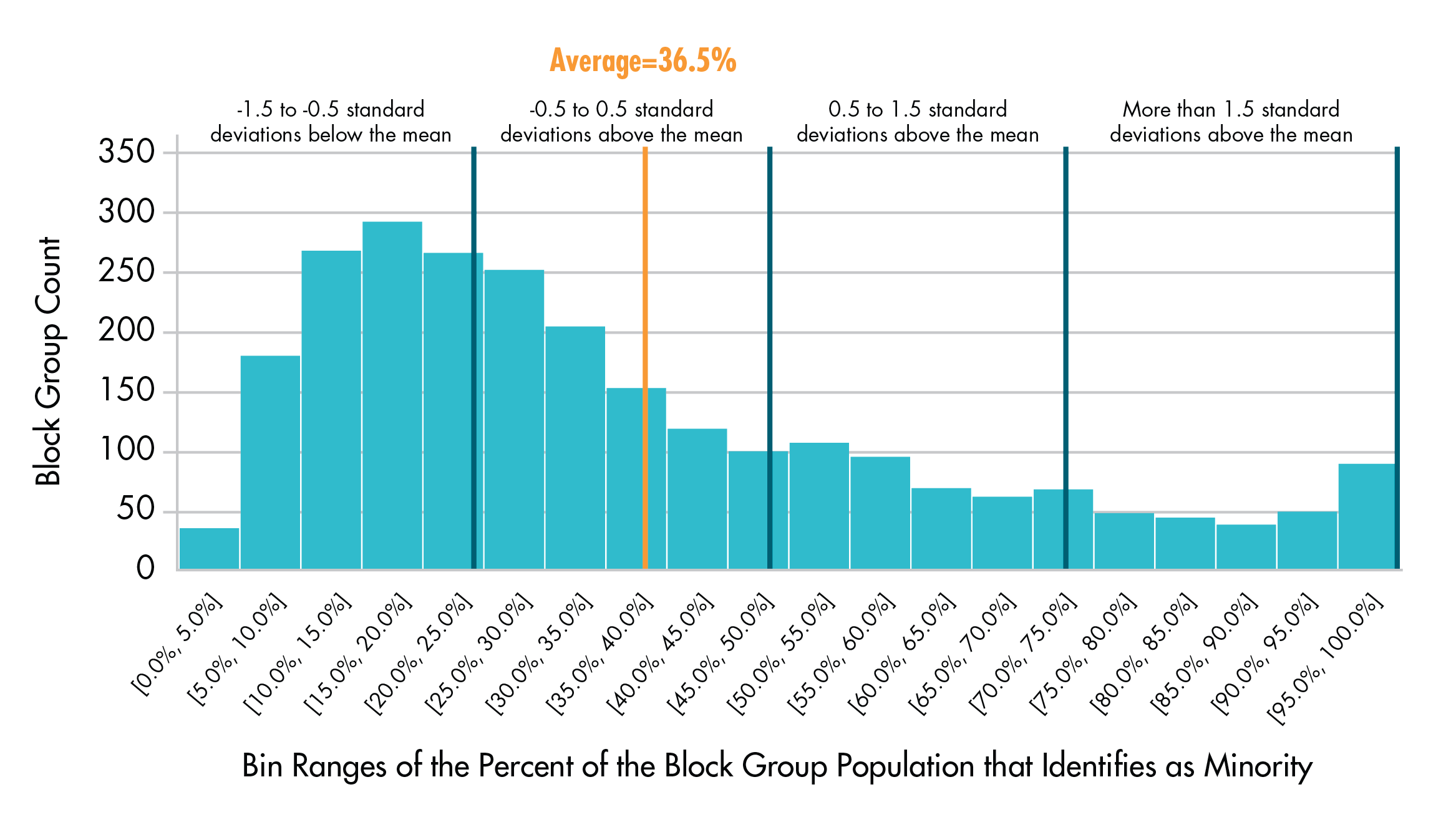
US Census Bureau and Boston Region MPO.
Step 2c: The percent of the total population that belongs to each TE population in the project area is compared to the SD categorization as shown above. For example, a project area in which ten percent of the population identifies as minority would fall between -1.5 and -0.5 SDs below the average. Each SD range has an equity index associated with it. Table 6-2 shows the indices associated with each SD range for all six TE populations.
Table 6-2
Equity Index Look-up Table: Project Investment Programs
| Equity Population | Less than -1.5 SDs from the Average | -0.5 to -1.5 SDs from the Average | -0.5 to 0.5 SDs from the Average | 0.5 to 1.5 SDs from the Average | Greater than 1.5 SDs from the Average |
| Minority population | 0.0 | 2.0 | 4.0 | 6.0 | 8.0 |
| Low-income population | 0.0 | 2.0 | 4.0 | 6.0 | 8.0 |
| People with LEP | 0.0 | 1.0 | 2.0 | 3.0 | 4.0 |
| People with disabilities | 0.0 | 0.5 | 1.0 | 1.5 | 2.0 |
| Older adult population | 0.0 | 0.5 | 1.0 | 1.5 | 2.0 |
| Youth population | 0.0 | 0.5 | 1.0 | 1.5 | 2.0 |
Source: Boston Region MPO.
Step 2d: The indices for each of the TE populations are added up to obtain a final index value. The highest index a project can receive is 26 (the sum of the values in the far-right column).
Step 2e: Finally, the equity index is matched with its corresponding multiplier using the table below.
Table 6-3
Equity Multiplier Look-up Table
| If Equity Index is Equal or Greater Than… | …And Less Than… | The Project’s Multiplier is… |
| 0.0 | 1.0 | 0.0 |
| 1.0 | 6.0 | 1.25 |
| 6.0 | 15.0 | 1.5 |
| 15.0 | 20.0 | 1.75 |
| 20.0 | 27.0 | 2.0 |
Source: Boston Region MPO.
Step 3: Calculate the final scores.
The scores calculated in Step 1 are multiplied by the project’s equity multiplier to get the final score for the criteria identified in Table 6-1.
This process achieves several results:
Note that with each new census and ACS dataset that are released, SDs are recalculated.
Community Connections projects are scored in the same way as described above, except that there is no multiplier to calculate and apply to other criteria scores. Instead, an index is calculated as described in Steps 2a–2d, above. The final step is to match the index with its corresponding TE score as shown in Table 6-4.
Table 6-4
Equity Index Look-up Table: Community Connections
| If Project Equity Index is Greater than… | …And Less Than… | The Project Score is… |
| 0 | 1 | 0 |
| 1 | 6 | 3 |
| 6 | 11 | 6 |
| 11 | 16 | 9 |
| 16 | 21 | 12 |
| 21 | 27 | 18 |
Source: Boston Region MPO.
As required by federal regulations, the MPO assesses the impacts of all Regional Target-funded projects, as a group, in each TIP on TE populations.6-3 These analyses help the MPO to better understand the extent to which investments help the MPO meet its TE goal. This information will inform future changes or updates to MPO work and decision-making. As new tools are identified and analyses are developed, they will be added to subsequent TIPs.
In the FFYs 2023–27 TIP, the MPO has left unprogrammed Regional Target funds for projects which have not yet been identified. As a standard practice, the MPO reserves funds for these programs with the expectation that they will be allocated when projects are ready to be funded. Specifically, $6.7 million for the Community Connections and $19.5 million for the Transit Modernization investment programs have been left unprogrammed. Except for the funding distribution analysis, the equity analyses in this chapter do not account for these funds. Additionally, the analyses in this chapter do not include roadway projects in the region that are funded by the Massachusetts Department of Transportation or public transit projects funded by regional transit authorities.
Table 6-5 shows the total number of people in the Boston region who belong to each TE population, as well as the percentage of each TE population relative to the Boston region’s population. Values from the FFYs 2022-26 TIP are also shown as a comparison.
Table 6-5
Transportation Equity Populations in the Boston Region
| TE Population Group | MPO Region Population | Percent of the Total Population | ||
| FFYs 2022–26 TIP | FFYs 2023–27 TIP | FFYs 2022–26 TIP | FFYs 2023–27 TIP | |
| Minority population | 870,459 | 1,223,835 | 28.2% | 36.5% |
| Low-income population | 683,548 | 674,215 | 23.0% | 20.1% |
| People with LEP | 308,770 | 375,848 | 10.6% | 11.2% |
| People with disabilities | 306,776 | 342,552 | 10.0% | 10.2% |
| Older adult population | 206,578 | 232,286 | 6.7% | 6.9% |
| Youth population | 636,761 | 634,550 | 20.6% | 18.9% |
Note: To calculate the TE population values, the population in each block group was controlled to the total 2020 census population count and then summed to get the total TE population in the Boston region.
FFY = federal fiscal year. LEP = limited English proficiency. TE = transportation equity. TIP = Transportation Improvement Program.
Sources: US Census Bureau.
Figures 6-2 to 6-7 show the percent of each TE population throughout the Boston region. In general, the minority population, people with low incomes, and people with LEP tend to live closer to or in Boston. On the other hand, people aged 75 or older, people 17 or younger, and people with disabilities are dispersed throughout the region.
Figure 6-2
Percentage of the Minority Population in the Boston Region
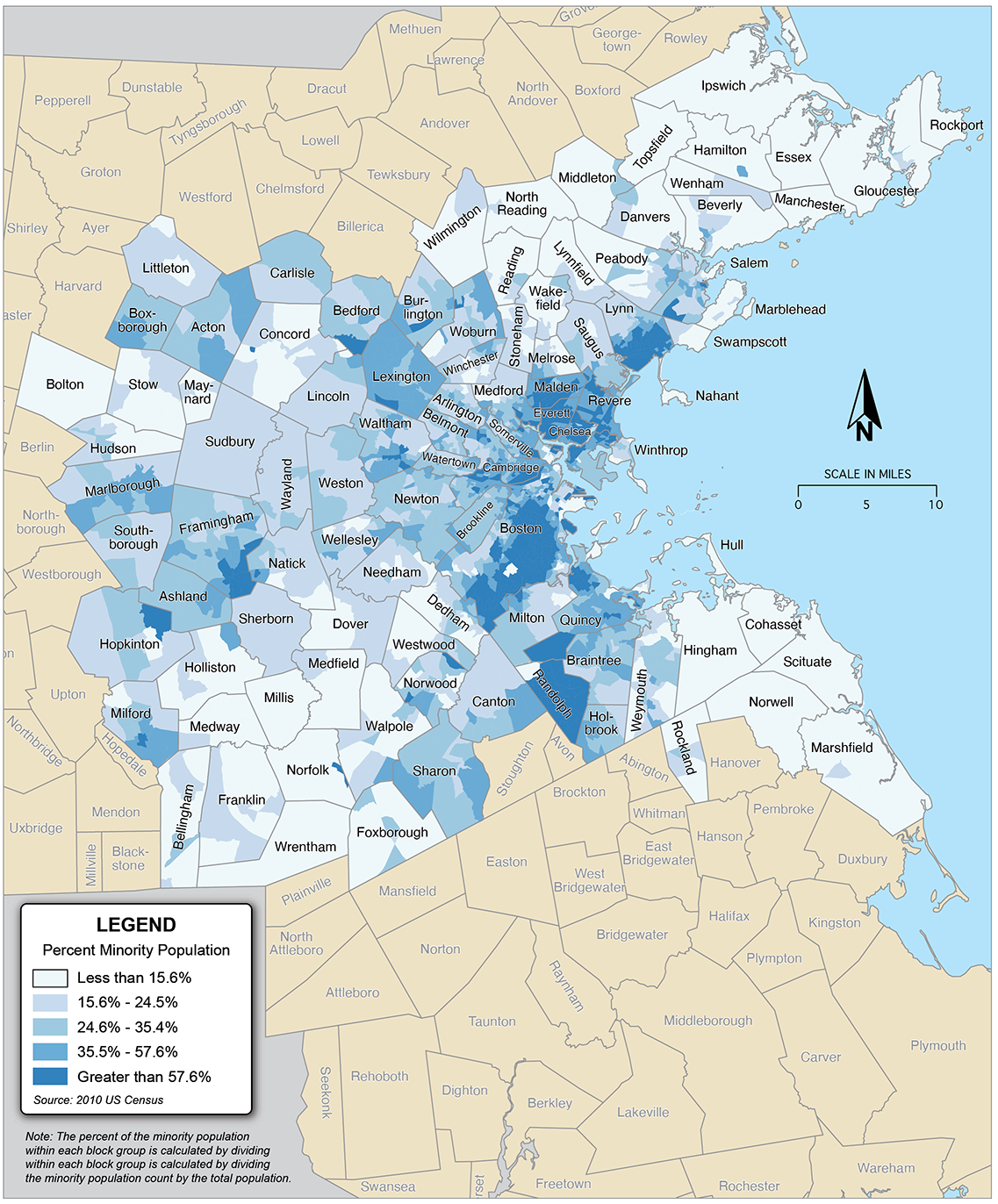
Figure 6-3
Percentage of the Low-income Population in the Boston Region
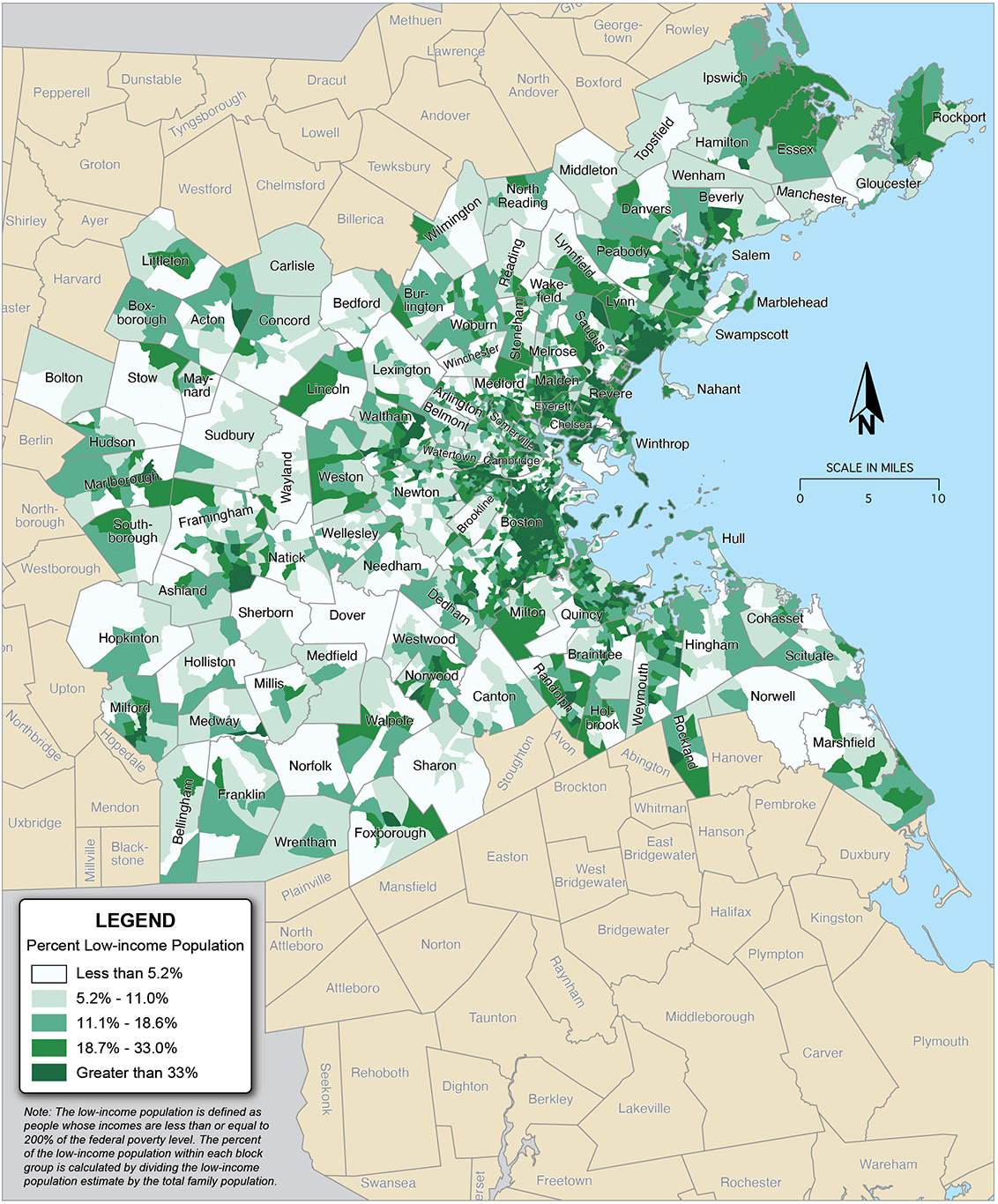
Figure 6-4
Percentage of People with Limited English Proficiency in the Boston Region
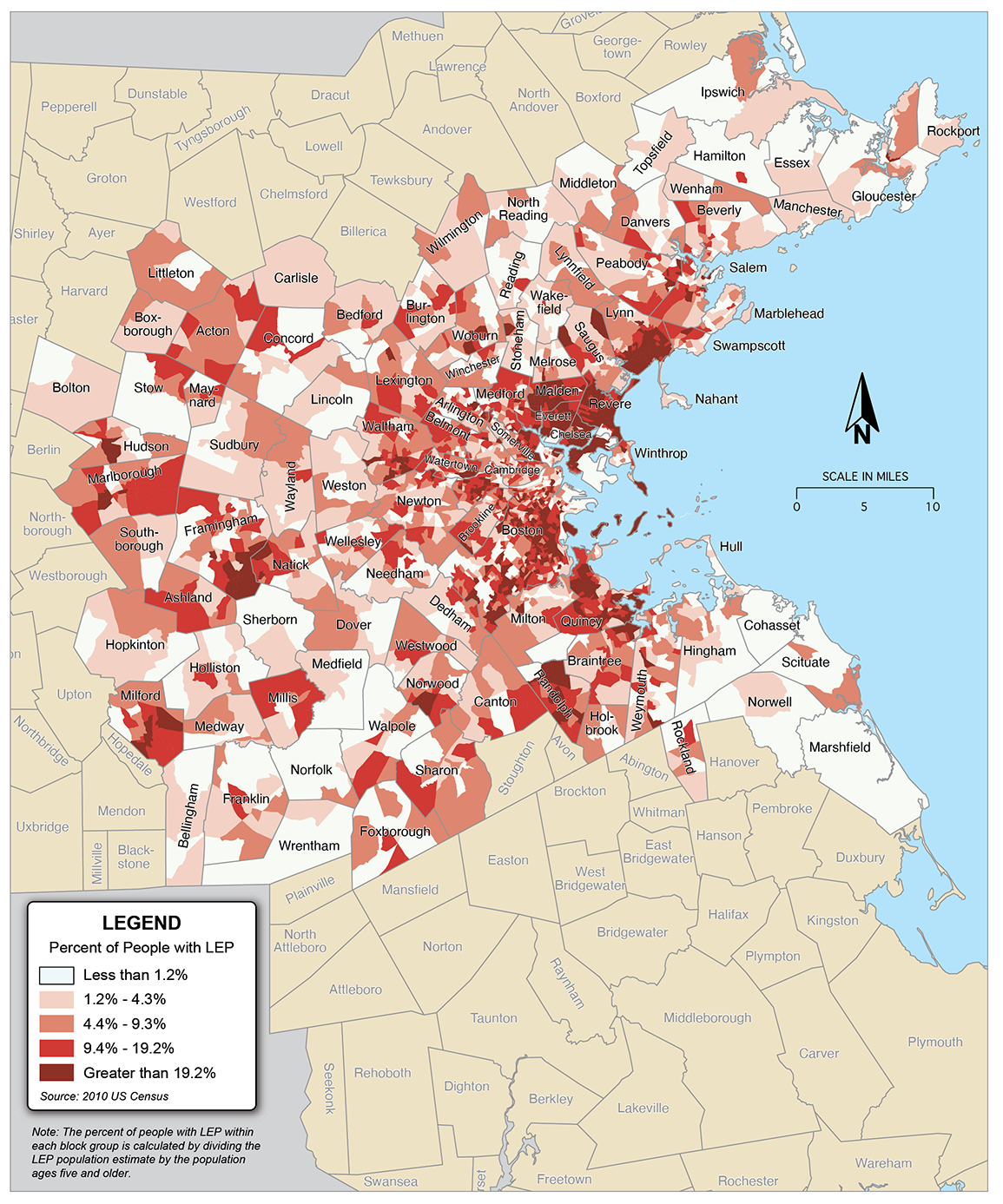
Figure 6-5
Percentage of People with Disabilities in the Boston Region
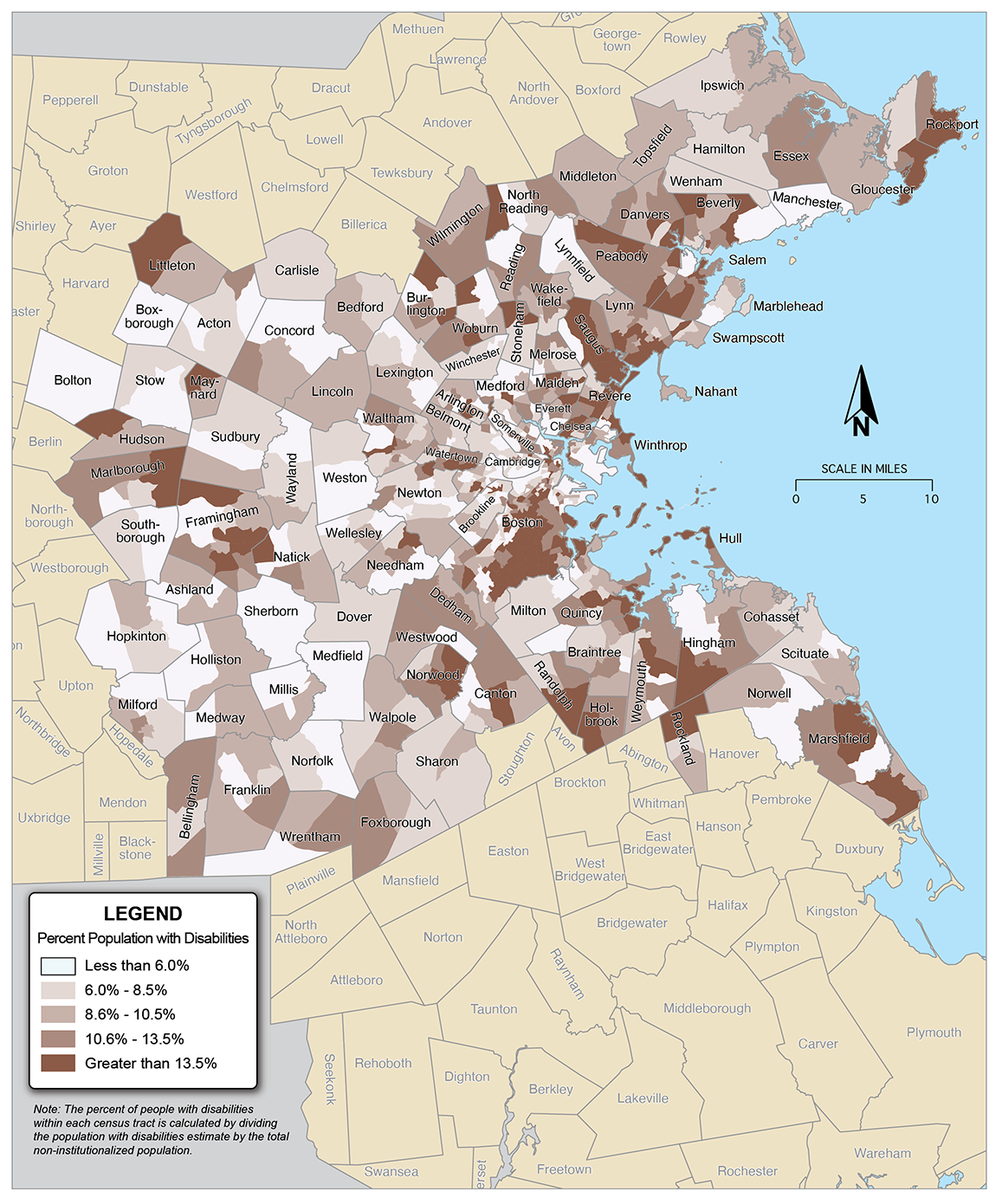
Figure 6-6
Percentage of Older Adults in the Boston Region
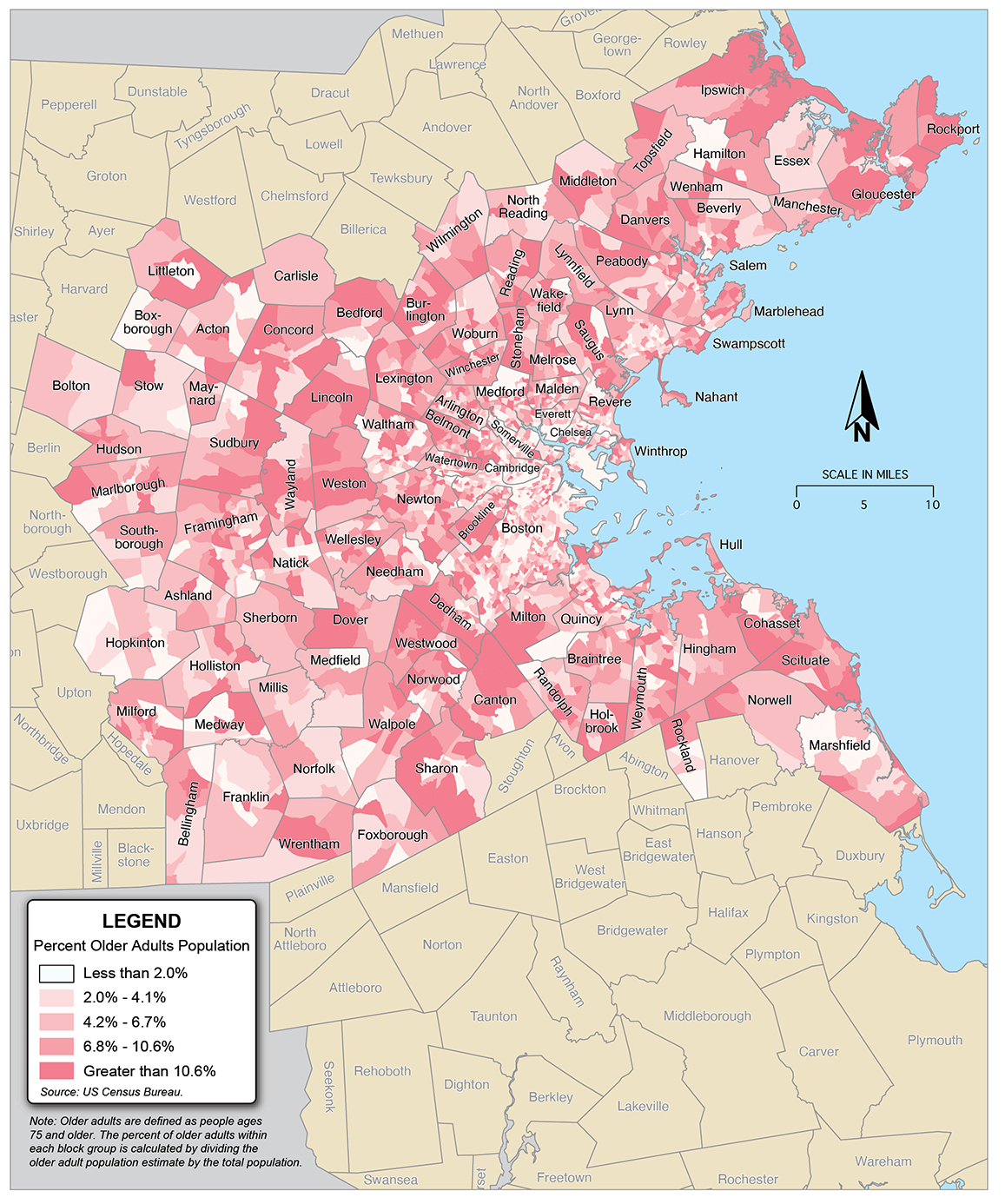
Figure 6-7
Percentage of Youth Population in the Boston Region
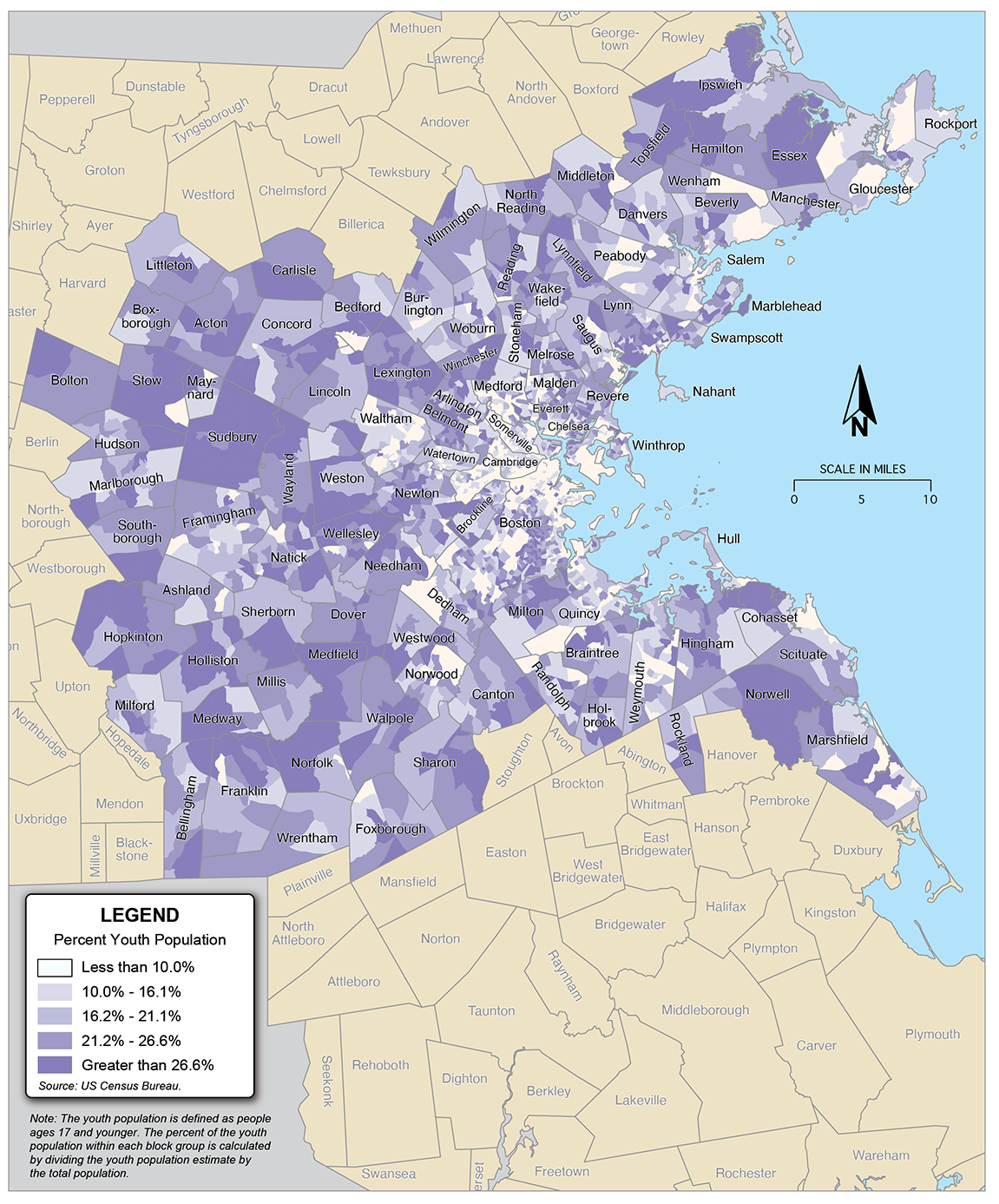
The analyses in this section assess which TE populations will likely be served or impacted by Regional Target-funded projects. Affected populations are considered those who live in close proximity, defined as one-half mile from project extents. Geographic proximity is an approximation that helps determine who is likely to use and be impacted by a project. For some projects, such as those in the Bicycle Network and Pedestrian Connections and Complete Streets Programs, this measure is a reasonable representation as these projects are often designed and located in such a way so as to serve local residents. For other projects, such as those in the Major Infrastructure Program, this may be a less accurate representation, given that many users of these types of roadways or public transit lines live outside of the half-mile boundary. Some impacts, however, are local regardless of investment program, such as pollution from carbon monoxide (CO) and other transportation-related emissions. Despite drawbacks, geographical analyses are a readily available approximation of who may be most served and affected by projects funded by the MPO.
Table 6-6 shows the TE populations likely to be served or impacted by MPO Regional Target projects, compared to their shares of the Boston region population. For all TE populations, the percentage of the total population served that belongs to each TE population is within one percentage point of their respective shares of the region’s population. For the minority population, the percent of the population served or impacted is four points greater than their share of the region’s population. This shows that the Regional Target projects are not underserving TE populations relative to their representation in the region. This is one indicator that the MPO is meeting its TE goal as stated in the 2019 Long-Range Transportation Plan (LRTP). However, this analysis does not identify the specific benefits or burdens that may result these projects on TE populations.
Table 6-6
Transportation Equity Populations Served or Impacted by Regional Target Projects
| TE Population Group | Regionwide Population | Population Served | Percentage of Total Population Served | Percentage of Regionwide Population |
| Minority population | 1,223,835 | 278,341 | 39.4% | 36.5% |
| Low-income population | 674,215 | 147,568 | 21.4% | 20.1% |
| People with LEP | 375,848 | 79,880 | 11.5% | 11.2% |
| People with disabilities | 342,552 | 70,085 | 9.9% | 10.2% |
| Older adult population | 232,286 | 45,609 | 6.5% | 6.9% |
| Youth population | 634,550 | 132,508 | 18.8% | 18.9% |
Note: As is its usual practice, the MPO has left some funds unallocated in the outer years of the TIP, and this analysis does not reflect those funds.
This table also does not include the Bridge Rehabilitation of Commonwealth Avenue over the Charles River project (110980) as it was evaluated by the Massachusetts Department of Transportation (MassDOT).
LEP = limited English proficiency. TE = transportation equity.
Sources: US Census Bureau, 2015–17 MBTA Systemwide Passenger Survey, and Boston Region MPO.
Figure 6-8 shows the percentage of TE populations served or impacted (out of the entire population served or impacted) by Regional Target projects in the FFYs 2018–22, 2019–23, 2020–24, 2021–25, 2022–26, and 2023–27 TIPs. (Note that the youth population was added and that the low-income definition changed to its current definition starting in the FFYs 2022–26 TIP; therefore data are shown for these populations starting with the FFYs 2022–26 TIP.) The results show that the percent of TE populations served or impacted have continued to be on par with their respective shares of the Boston region’s population. For the minority population in particular, the percentage has been several percentage points above the regionwide average in every TIP since FFYs 2018–22. For the youth population, the percentage was below its share of the region’s population in the FFYs 2022–26 TIP but is now on par in the FFYs 2023–27 TIP.6-4
Figure 6-8
Change in the Percentage of Transportation Equity Populations Served or Impacted by Regional Target Projects
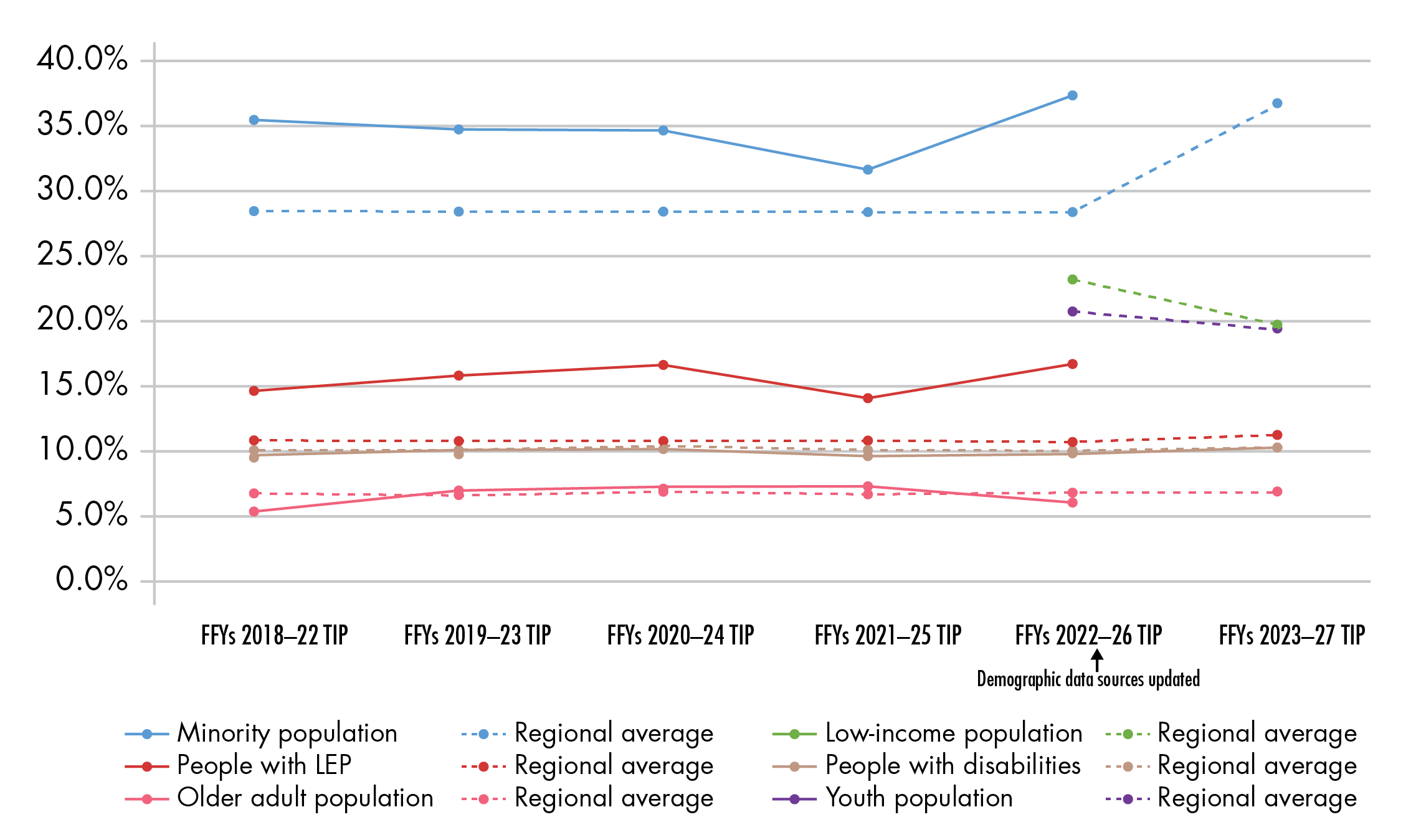
Notes: People aged 17 or younger were not considered among the TE population until the FFYs 2022–26 TIP. Additionally, starting in the FFYs 2022–26 TIP, the low-income population was defined based on poverty status. (Formerly it was based on household income; this is not shown in the figure as it cannot be compared with the current low-income definition. For information about the data for the FFYs 2018–22, 2019–23, 2020–24, and 2021–25 TIPs, see the respective documents.
As is its usual practice, the MPO has left some funds unallocated in the outer years of each TIP, and this analysis does not reflect those funds. This figure also does not include the Bridge Rehabilitation of Commonwealth Avenue over the Charles River project (110980) as it was evaluated by MassDOT.
FFY = federal fiscal year.
LEP = limited English proficiency. TE = transportation equity. TIP = Transportation Improvement Program.
Sources: US Census Bureau, 2015–17 MBTA Systemwide Passenger Survey, and Boston Region MPO.
Figure 6-9 shows the percentage of TE populations likely to be served or impacted (out of the entire population served or impacted) for each investment program in the FFYs 2023–27 TIP. Some TE populations are likely to benefit from or be impacted by projects in certain investment programs. For example, approximately 19 percent of the population served or impacted by Complete Streets projects are expected have LEP; this percentage is significantly higher than the LEP share of the Boston region’s population, which is 11.2 percent. However, people with LEP are underserved by projects in the Bicycle and Pedestrian Network Connections investments program, with only 6.5 percent of the total population served.
Figure 6-9
Percent of Transportation Equity Populations Served or Impacted by Regional Target Projects by Investment Program
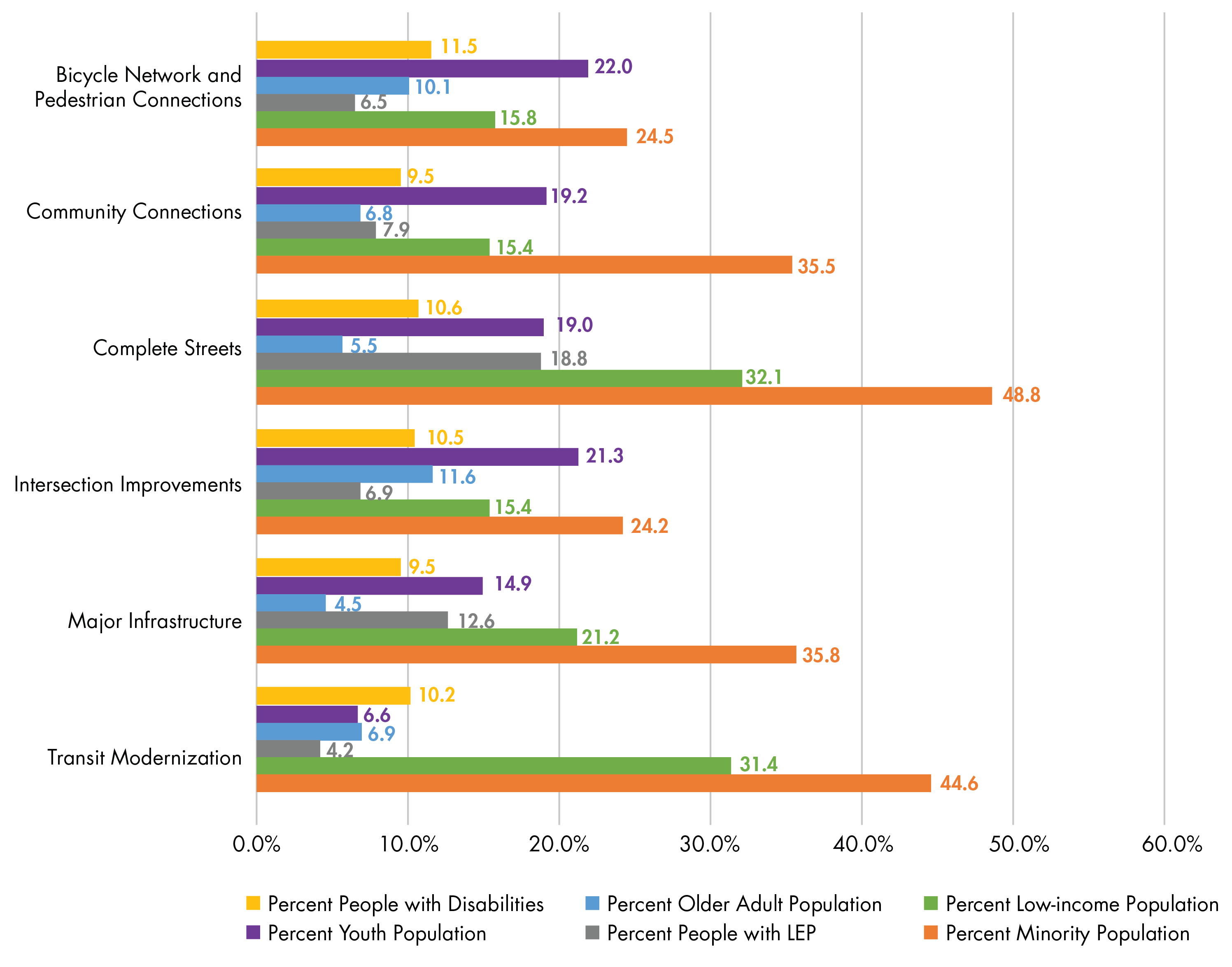
Notes: As is its usual practice, the MPO has left some funds unallocated in the outer years of the TIP, and this analysis does not reflect those funds. This figure also does not include the Bridge Rehabilitation of Commonwealth Avenue over the Charles River project (110980) as it was evaluated by MassDOT.
LEP = limited English proficiency. TIP = Transportation Improvement Program.
Sources: US Census Bureau, 2015–17 MBTA Systemwide Passenger Survey, and Boston Region MPO.
Figure 6-10 shows the projected combined reduction in emissions from CO, volatile organic compounds (VOC), and nitrogen oxides (NOx) that would result from the implementation of Regional Target projects, in the aggregate, for TE populations and their non-TE counterparts. Reductions are reported in kilograms per 1,000 people and are shown for the FFYs 2021–25, 2022–26, and 2023–27 TIPs. The changes shown are for each TIP and are not cumulative across all TIPs.
In the FFYs 2021–25 TIP, only the older adult population was likely to receive greater emission reductions than their non-TE counterpart, while in the FFYs 2022–26 TIP this was the case for only older adults and people with disabilities. However, in the FFYs 2023–27 TIP, reductions in emissions are likely to be greater for people with disabilities, the youth population, the older adult population, and the low-income population than for their non-TE counterparts. People with LEP and the minority population are likely to continue to receive less of a reduction of emissions compared their non-TE counterparts; however, that difference is likely to be less than it was in previous TIPs. These results show that the MPO is making progress toward reducing emissions disparities for some TE populations; however, future funding should ensure that the minority population and people with LEP in particular benefit at least as much or more from the emissions reductions resulting from Regional Target projects as their non-TE counterparts.
Figure 6-10
Reduction in Carbon Monoxide, Volatile Organic Compounds, and Nitrogen Oxide Emissions per 1,000 People
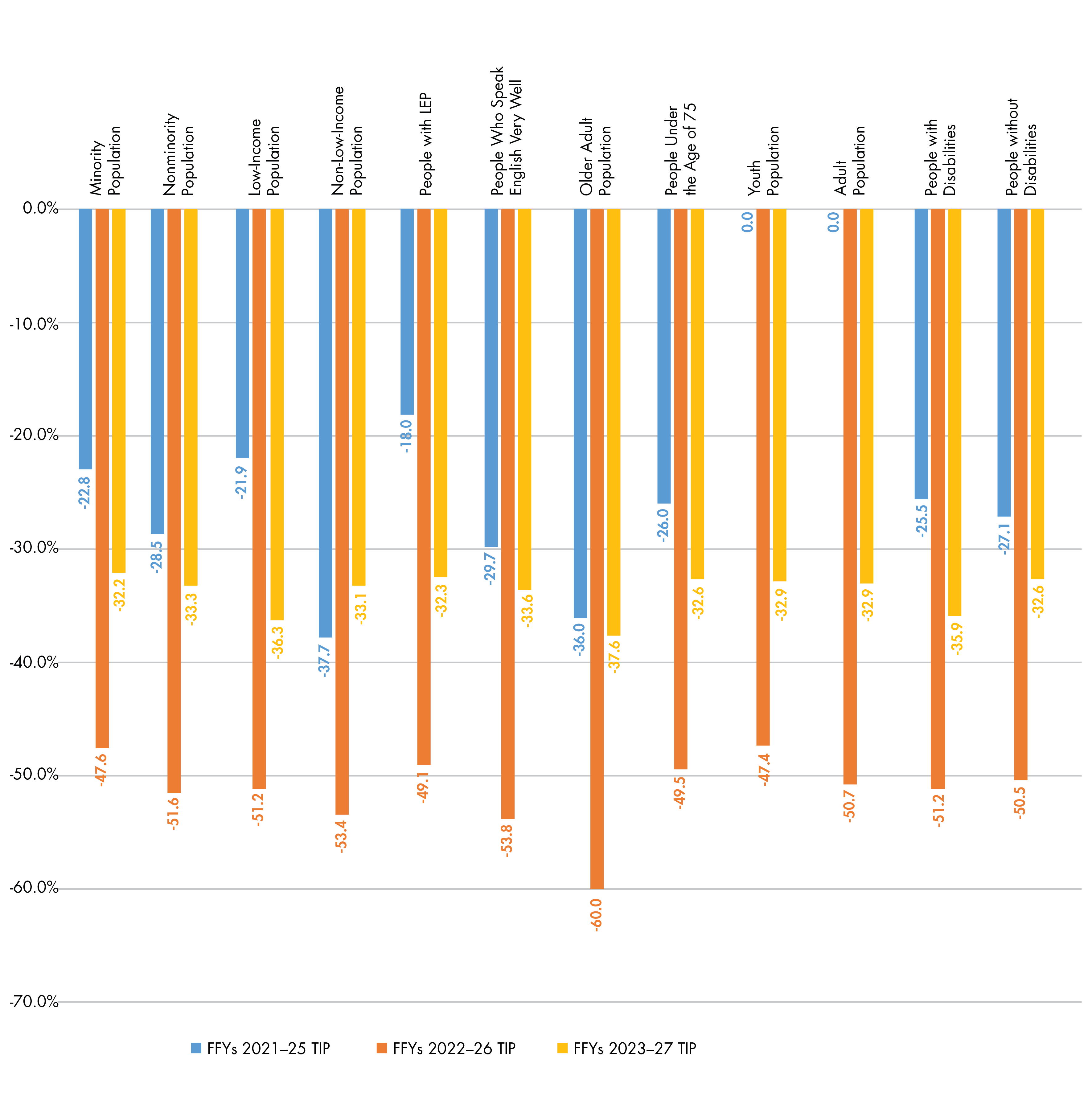
Notes: As is its usual practice, the MPO has left some funds unallocated in the outer years of the TIP, and this analysis does not reflect those funds. This table does not include the Bridge Rehabilitation of Commonwealth Avenue over the Charles River project (110980) as it was evaluated by MassDOT. It also does not include the McGrath Boulevard project (607981) since air quality was assessed as part of the LRTP and not with CMAQ analyses.
The youth population was not considered a TE population prior to the FFYs 2022–26 TIP.
CO = carbon monoxide. CMAQ = Congestion Mitigation and Air Quality. FFY = federal fiscal year. LEP = limited English proficiency. N/A = not applicable. NOx = nitrogen oxide. TIP = Transportation Improvement Program. TE = transportation equity. VOC = volatile organic compounds.
Source: US Census Bureau, 2015–17 MBTA Systemwide Passenger Survey, and Boston Region MPO’s Congestion Mitigation and Air Quality analyses.
The results of the analyses reported in this section show how Regional Target funds are distributed to projects serving TE populations based on the percentage of the population served by the Regional Target-funded projects. The MPO has programmed approximately $645 million in Regional Target funding in the FFYs 2023–27 TIP. Like the geographical analyses shown above, this funding distribution analysis assumes that funds allocated to TE populations indicate a benefit. While the MPO strives to ensure that projects selected for funding provide significant transportation improvements to and mitigate potential burdens on TE populations, the complexity of projects and their varied impacts limit the degree to which these outcomes can be ensured.
Table 6-7 shows the percent of funding allocated in the FFYs 2023–27 TIP to Regional Target projects, in the aggregate, that are expected to serve or impact TE populations compared to the share of each TE population within the Boston region. Except for the older adult population, all TE populations will receive a smaller share of funding relative to their share of the regionwide population. The share of TE populations served or impacted is on par or greater than their respective share of the Boston region population (see Table 6-6), which suggests that projects that are expected to serve or impact TE populations are generally smaller projects or projects that will receive a small amount of funding. This does not mean that projects are not providing significant benefits to TE populations, as more funding does not necessarily mean more benefits. While the MPO strives to ensure that projects selected for funding provide significant transportation improvements to and mitigate potential burdens on TE populations, the complexity of projects and their varied impacts limit the degree to which these outcomes can be ensured. More detailed analyses of specific impacts are required to better understand the benefits and burdens TE populations may experience from Regional Target projects, as well as the relationship between funding levels and project benefits.
Table 6-7
Percent of Funding Allocated to Transportation Equity Populations
| TE Population | Percentage of Funding Allocated | Percentage of Regionwide Population |
| Minority population | 30.9% | 36.5% |
| Low-income population | 18.8% | 20.1% |
| People with LEP | 10.0% | 11.2% |
| People with disabilities | 9.9% | 10.2% |
| Older adult population | 7.5% | 6.9% |
| Youth population | 18.2% | 18.9% |
Notes: As is its usual practice, the MPO has left some funds unallocated in the outer years of the TIP, and this analysis does not reflect those funds.
This table does not include the Bridge Rehabilitation of Commonwealth Avenue over the Charles River project as it was evaluated by MassDOT.
LEP = limited English proficiency. TE = transportation equity. TIP = Transportation Improvement Program.
Sources: US Census Bureau, 2015–17 MBTA Systemwide Passenger Survey, and Boston Region MPO.
Figure 6-11 shows the percentage of funding allocated to Regional Target projects that are expected to serve or impact TE populations for the FFYs 2019–23, 2020–24, 2021–25, 2022–26, and 2023–27 TIPs. These data are shown relative to each TE population’s share of their population in the Boston region. Over the past five TIPs, the share of funding allocated to TE populations is approximately level to their share of the Boston region population, except for the minority population. Funding for the minority population has consistently been several percentage points below their share of the region’s population. As described above, funding is only an approximate measure of whether Regional Target projects will likely serve or benefit TE populations, though in general the MPO strives to provide equal or greater funding to TE populations.
Figure 6-11
Change in the Percentage of Funding Allocated to Transportation Equity Populations
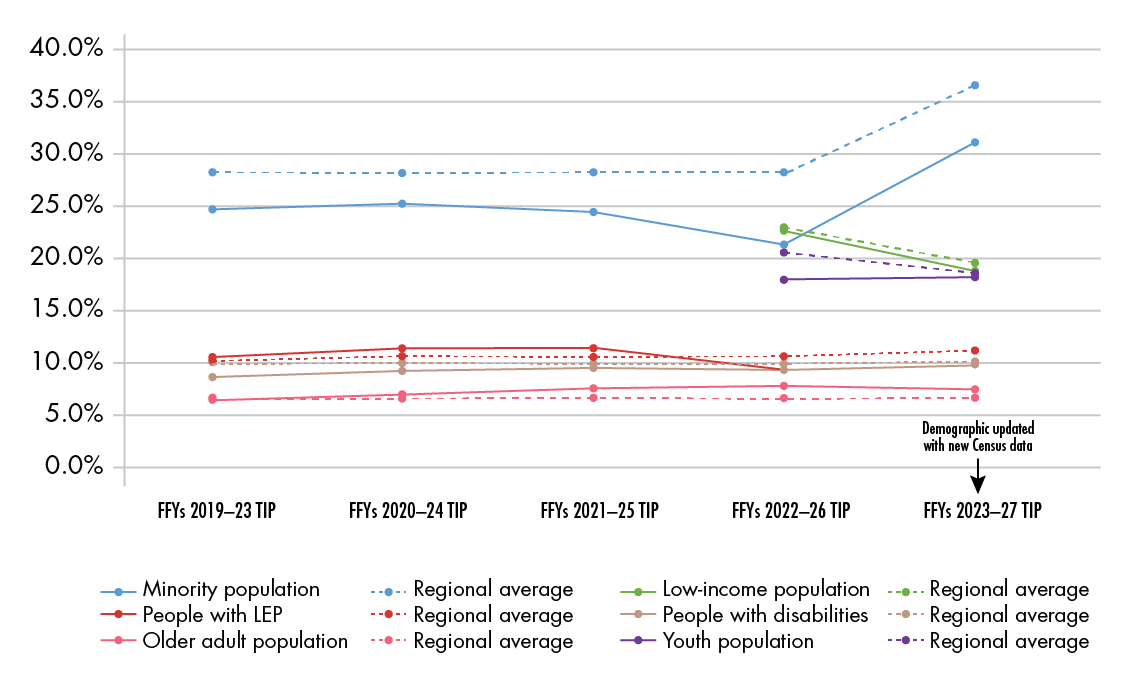
Notes: People ages 17 or younger were not considered as a TE population until the FFYs 2022–26 TIP. Additionally, starting in the FFYs 2022–26 TIP, people with low incomes were defined based on their poverty status for their family size. (Formerly it was based on household income; this is not shown in the figure as it cannot be compared with the current low-income definition.) For more information about the data for the FFYs 2019–23, 2020–24, and 2021–25 TIPs, see the respective documents.
As is its usual practice, the MPO has left some funds unallocated in the outer years of the TIP, and this analysis does not reflect those funds. This figure does not include the Bridge Rehabilitation of Commonwealth Avenue over the Charles River project (110980) as it was evaluated by MassDOT.
FFY = federal fiscal year. LEP = limited English proficiency. TE = transportation equity. TIP = Transportation Improvement Program.
Sources: US Census Bureau, 2015–17 MBTA Systemwide Passenger Survey, and Boston Region MPO.
The MPO will continue to explore more sophisticated methods of identifying specific impacts of projects funded with Regional Target dollars and evaluating, as a group, their benefits and burdens on TE populations. MPO staff has developed a similar analysis for the MPO’s Long-Range Transportation Plan (LRTP) and will continue to refine the analyses. Development of the LRTP analysis will inform further analyses of TIP equity performance. Much of this work will likely involve accessibility analyses and analyses of health impacts. Staff anticipates continuing to track the results of these analyses over time and enhancing them each year.
6-1 Regional Target funds are those federal funds provided to MPOs that are programmed for projects at the discretion of each MPO. The Boston Region MPO typically receives about $110 million each year in Regional Target funds. This amount has increased about $130 million for the five years of the FFYs 2023–27 TIP due to an increase in federal funding.
6-2 TE populations are identified using Decennial Census and American Community Survey data and are defined as follows:
6-3 The following sources for the TE populations were used for the analyses in this section:
FFYs 2022–26 TIP and earlier:
Minority population: US Census Bureau; 2010 Decennial Census Redistricting Data (P.L. 94-171), Table P2: Hispanic or Latino, and Not Hispanic or Latino by Race; generated by CTPS; using data.census.gov.
Low-income population: US Census Bureau; 2010–14 American Community Survey, Table C17002: Ratio of Income to Poverty Level in the Past 12 Months; generated by CTPS; using data.census.gov.
People with limited English proficiency: US Census Bureau; 2010–14 American Community Survey, Table B16004: Age by Language Spoken at Home by Ability to Speak English for the Population 5 Years and Older; generated by CTPS; using data.census.gov.
People with disabilities: US Census Bureau; 2010–14 American Community Survey, Table B18101: Sex by Age by Disability Status; generated by CTPS; using data.census.gov.
Older adults and youth population: US Census Bureau; 2010 Census, Table P12: Sex by Age; generated by CTPS; using data.census.gov.
FFYs 2023–27 TIP:
Minority population: US Census Bureau; 2020 Decennial Census Redistricting Data (P.L. 94-171), Table P2: Hispanic or Latino, and Not Hispanic or Latino by Race; generated by CTPS; using data.census.gov.
Low-income population: US Census Bureau; 2016–20 American Community Survey, Table C17002: Ratio of Income to Poverty Level in the Past 12 Months; generated by CTPS; using data.census.gov.
People with limited English proficiency: US Census Bureau; 2016–20 American Community Survey, Table B16004: Age by Language Spoken at Home by Ability to Speak English for the Population 5 Years and Older; generated by CTPS; using data.census.gov.
People with disabilities: US Census Bureau; 2016–20 American Community Survey, Table B18101: Sex by Age by Disability Status; generated by CTPS; using www.data.census.gov.
Older adult and youth population: US Census Bureau; 2016–20 American Community Survey, Table B18101: Sex by Age; generated by CTPS; using data.census.gov.
6-4 Starting in the FFYs 2022–26 TIP, the methodology for determining the population within a half-mile of projects was updated. A half mile is now measured along the roadway network (excluding limited access highways) rather than as-the-crow-flies, as was done in previous TIPs.